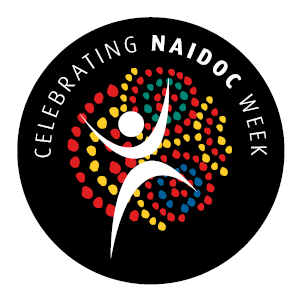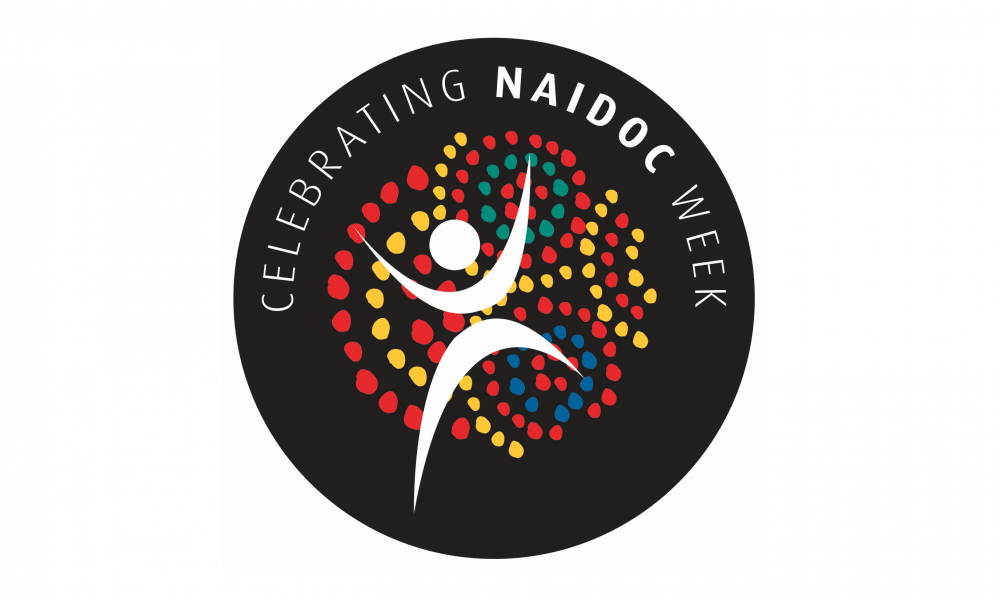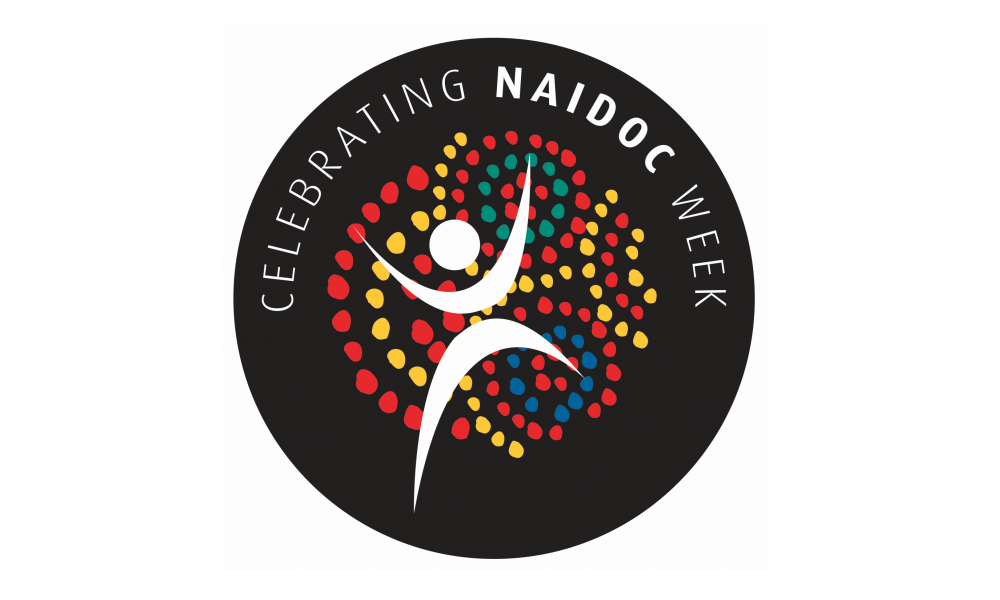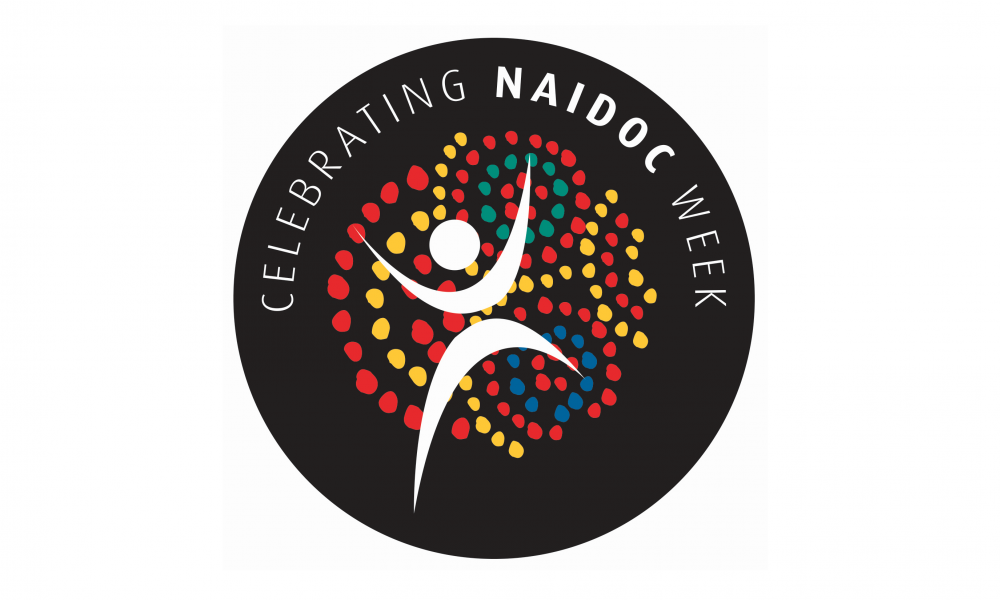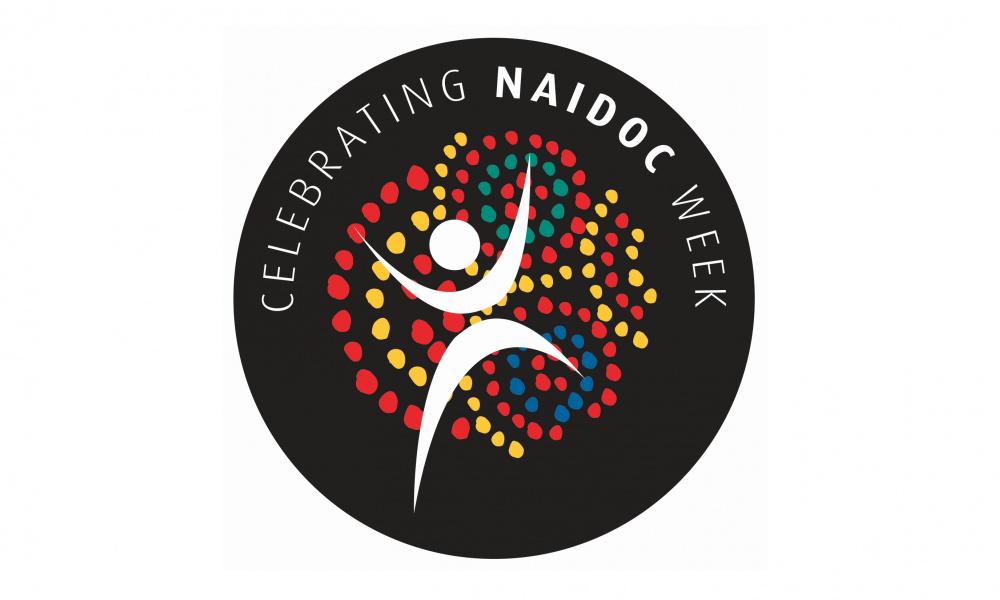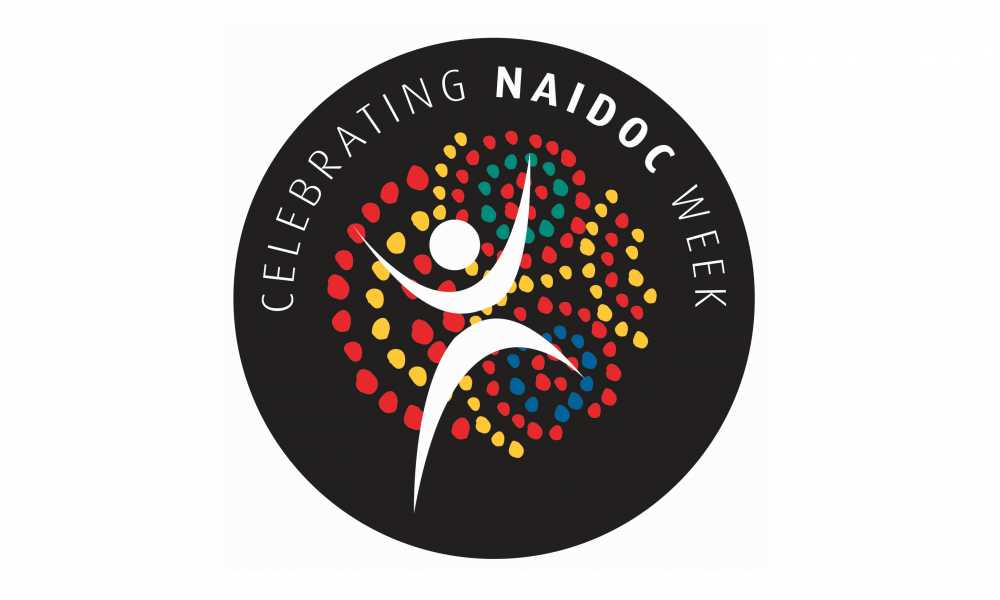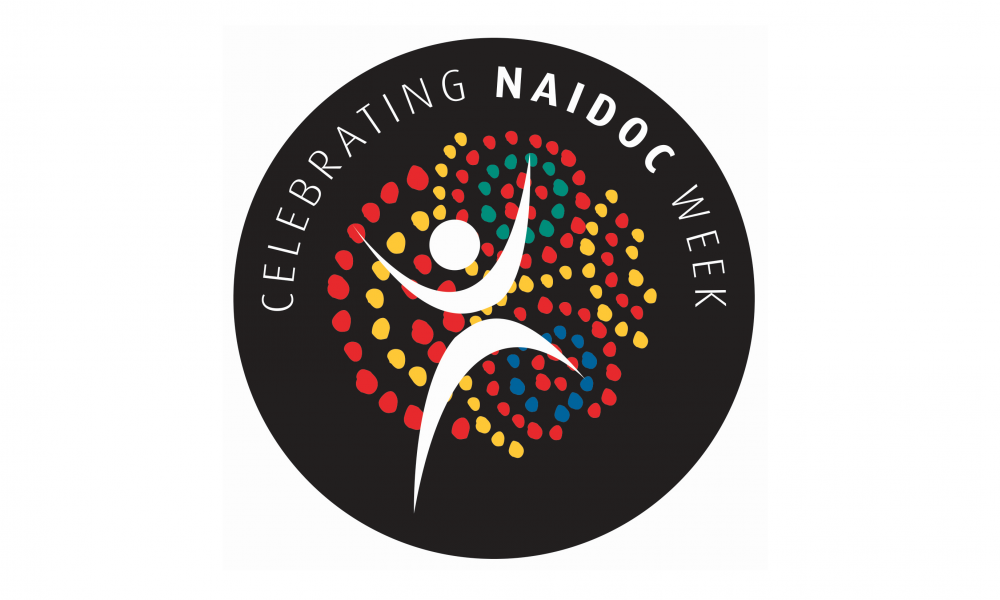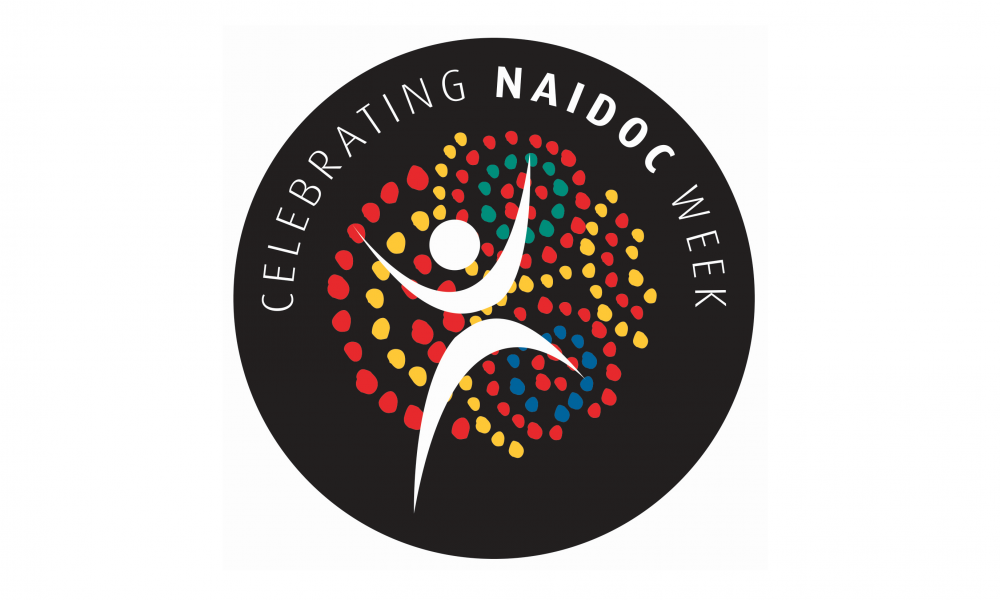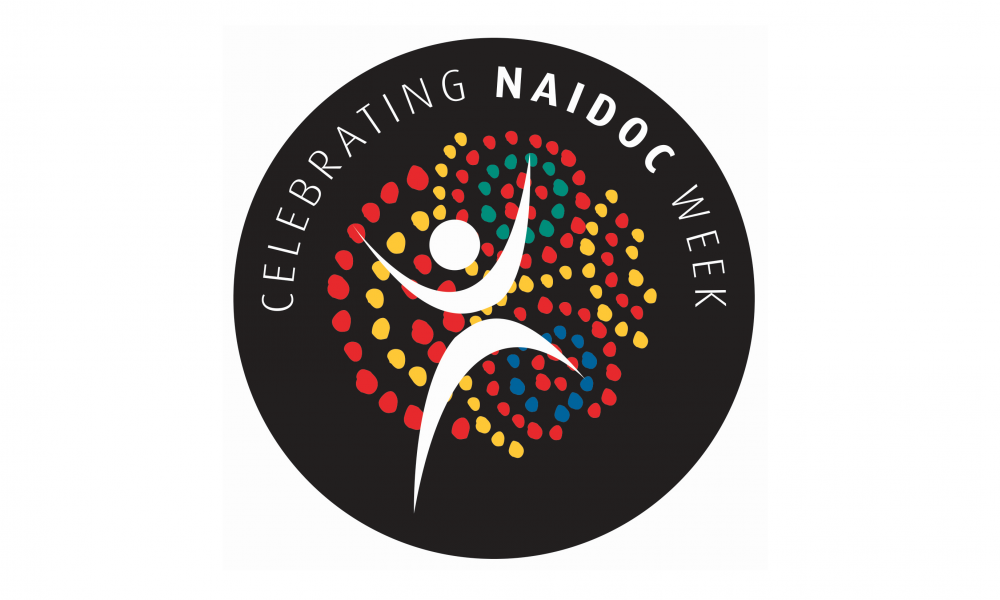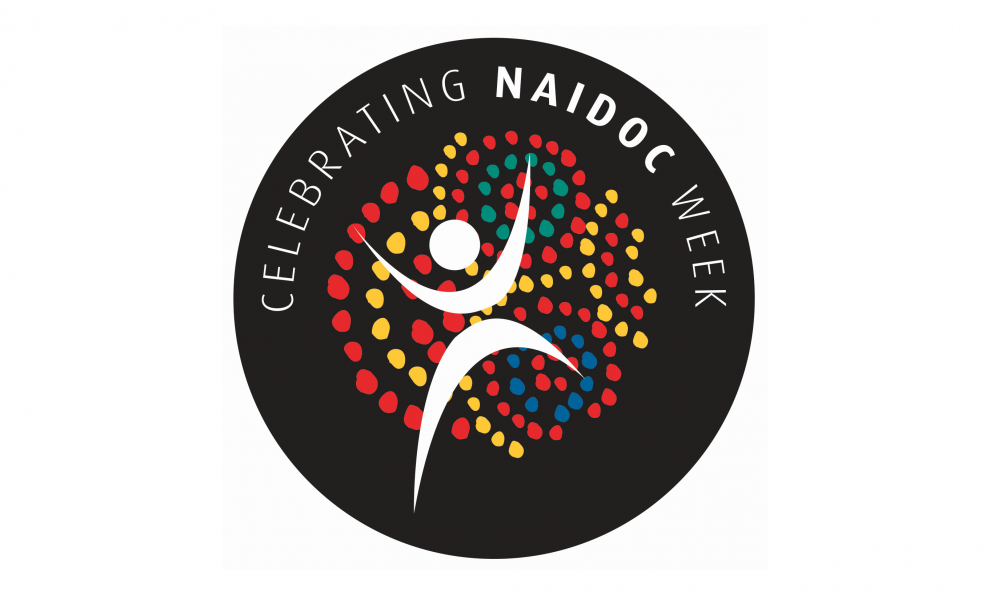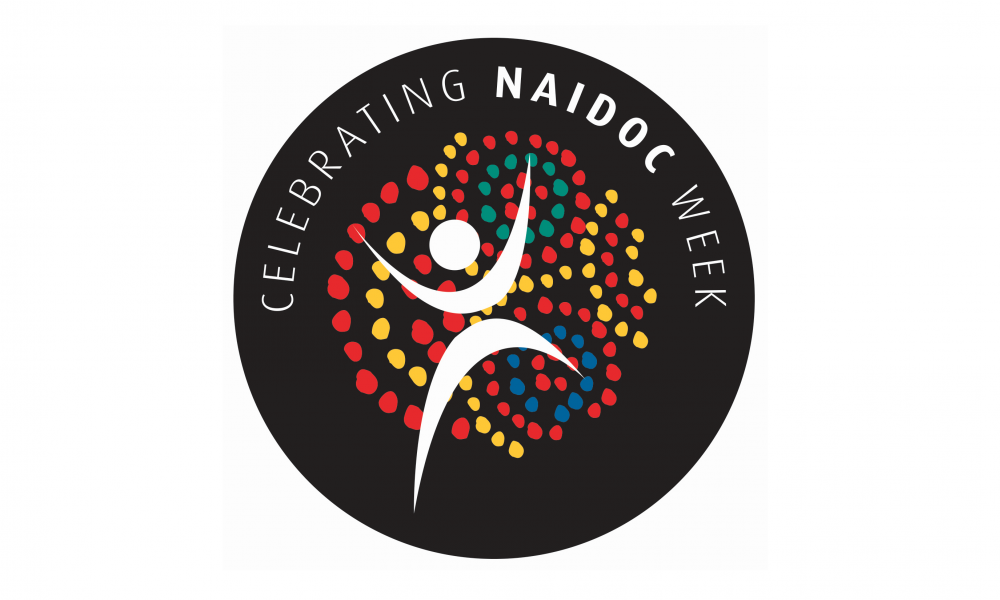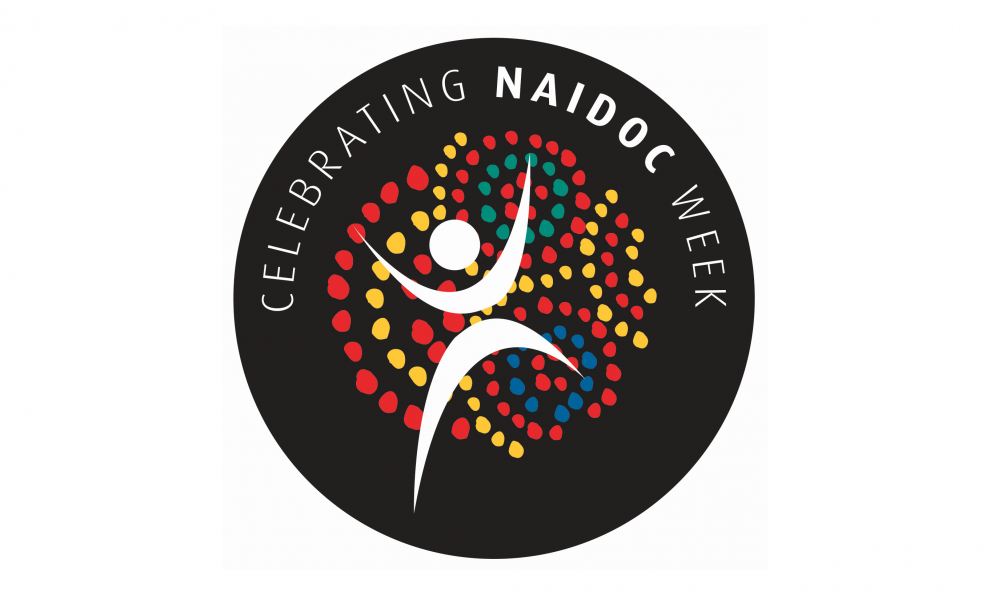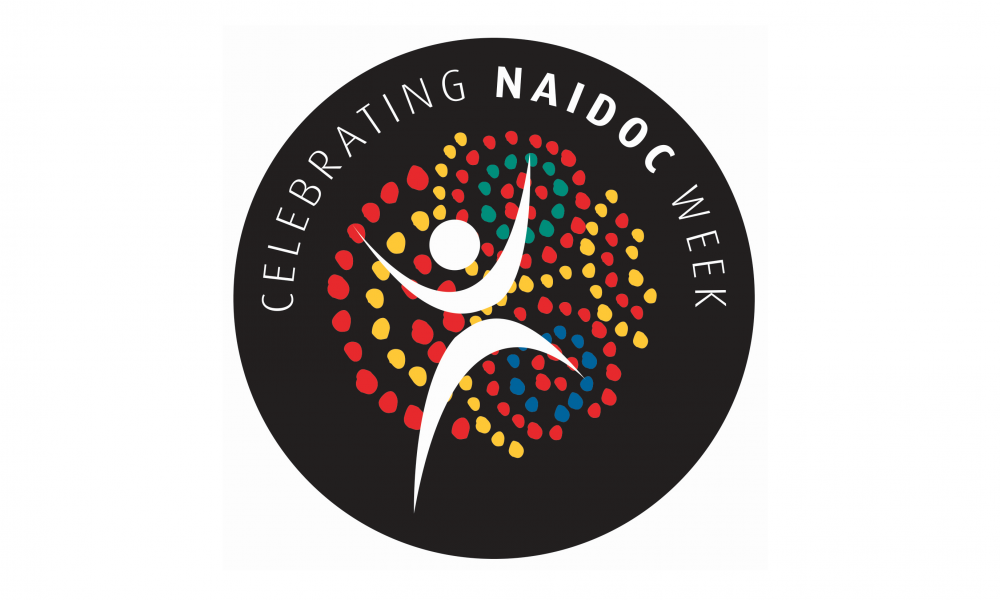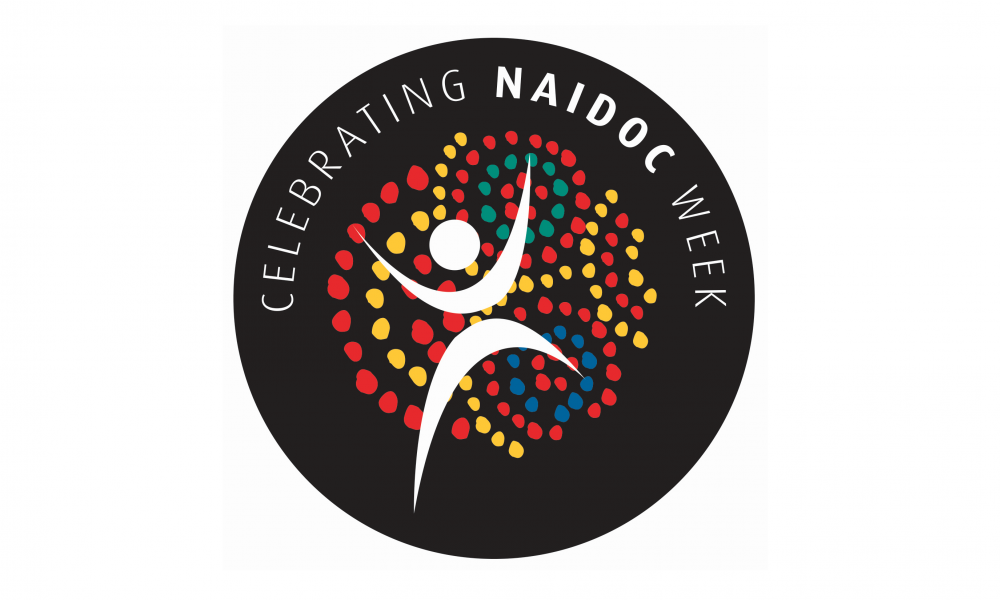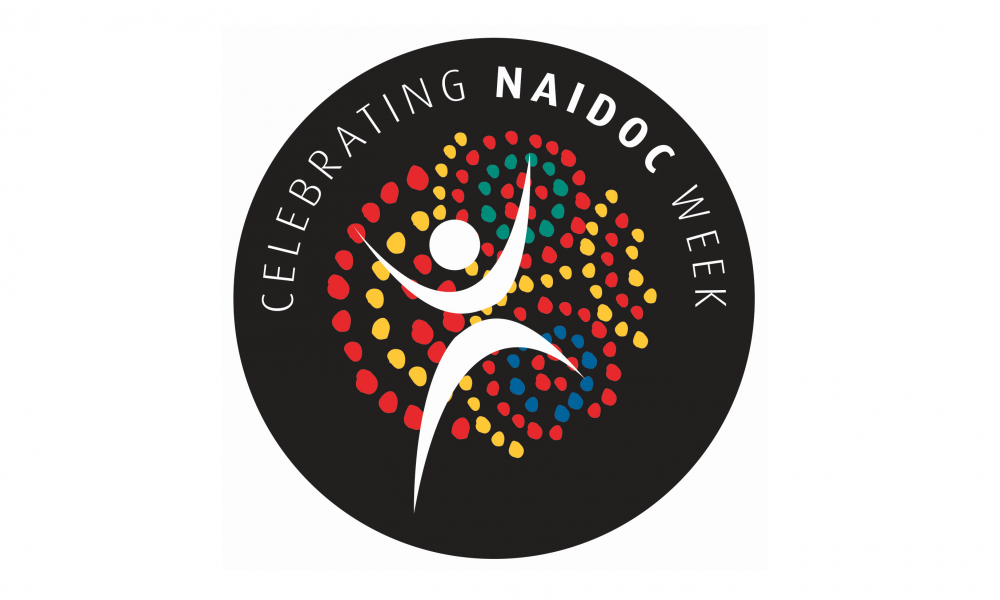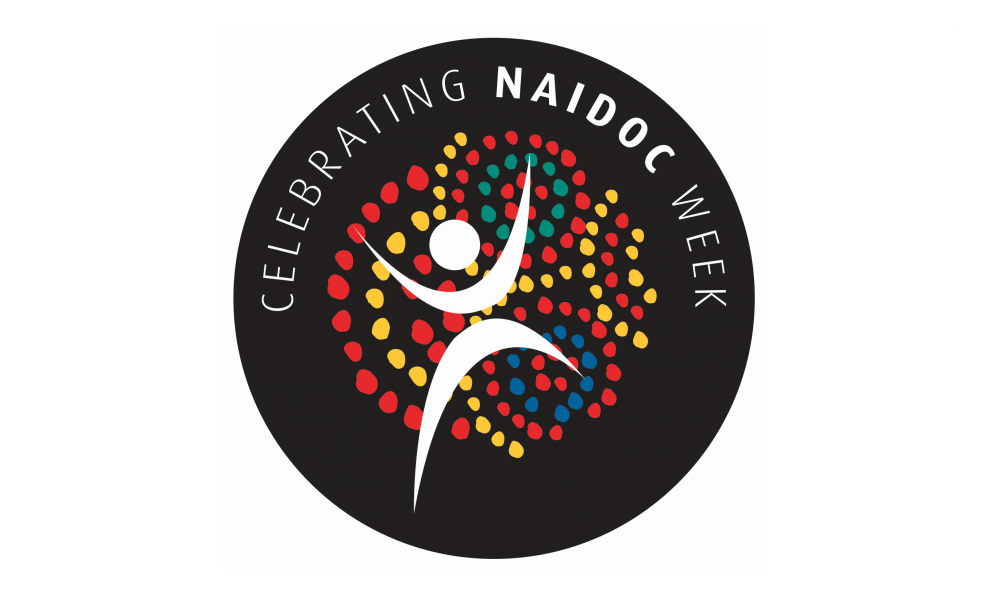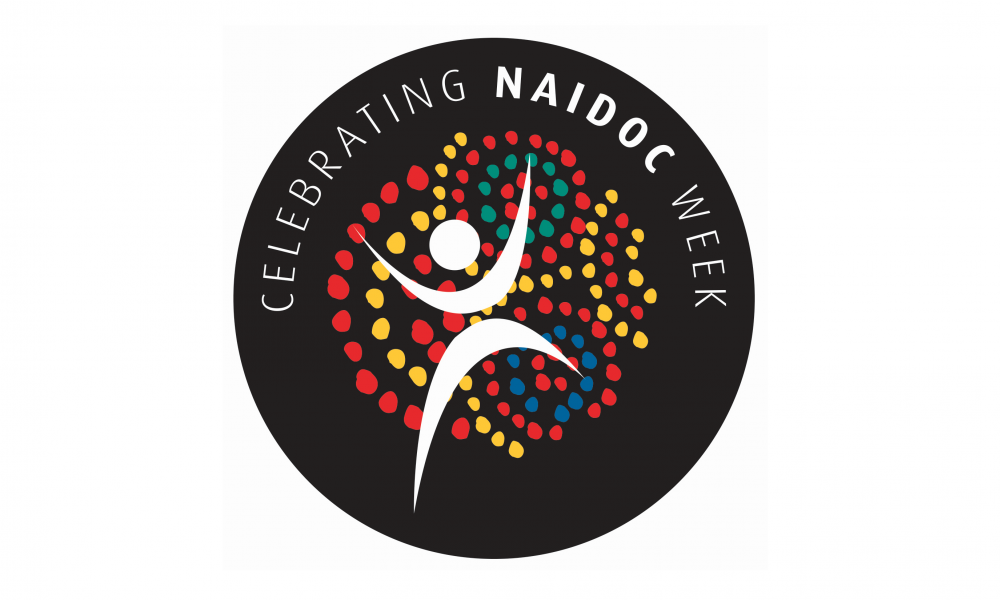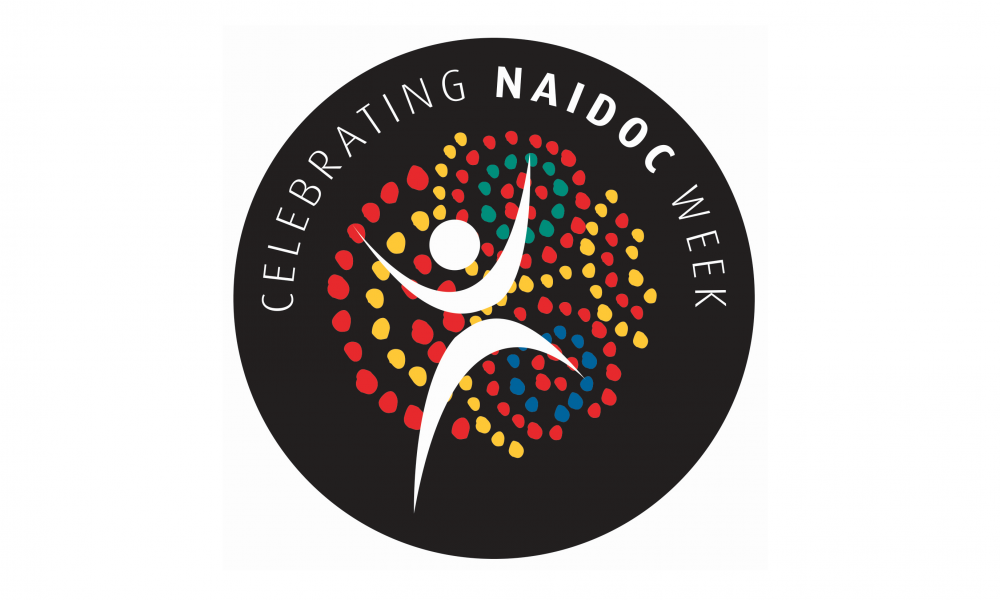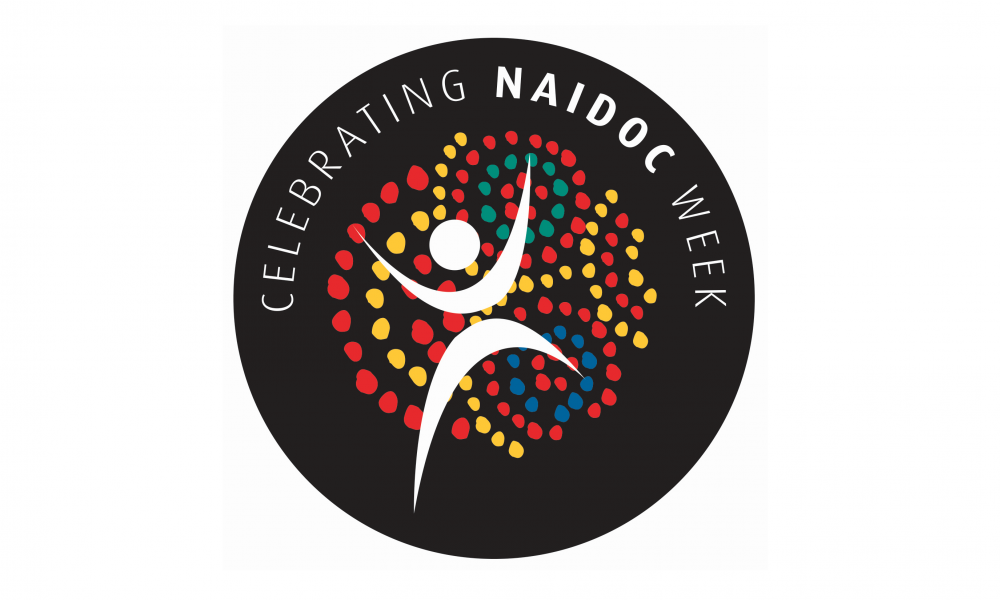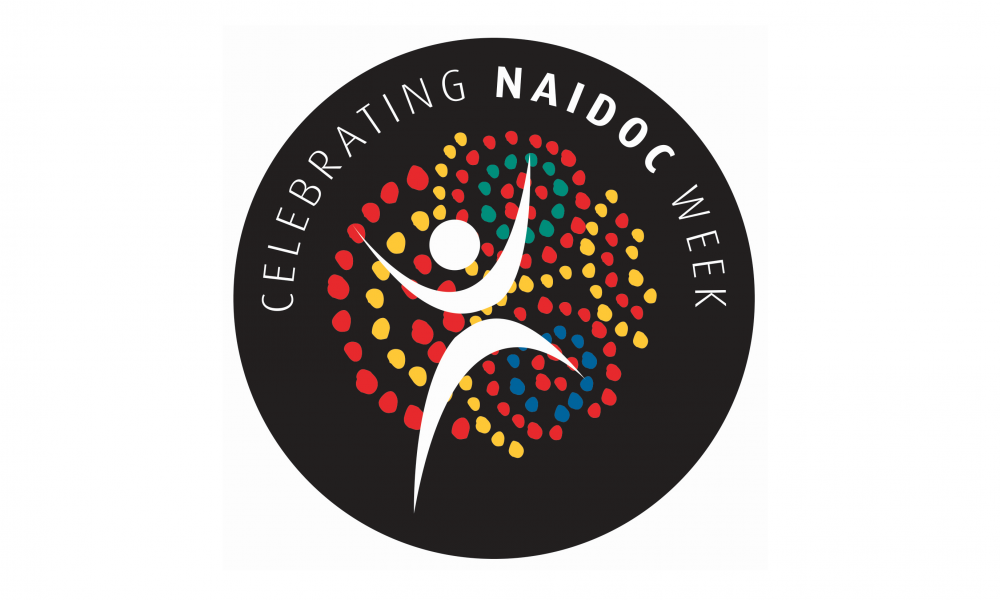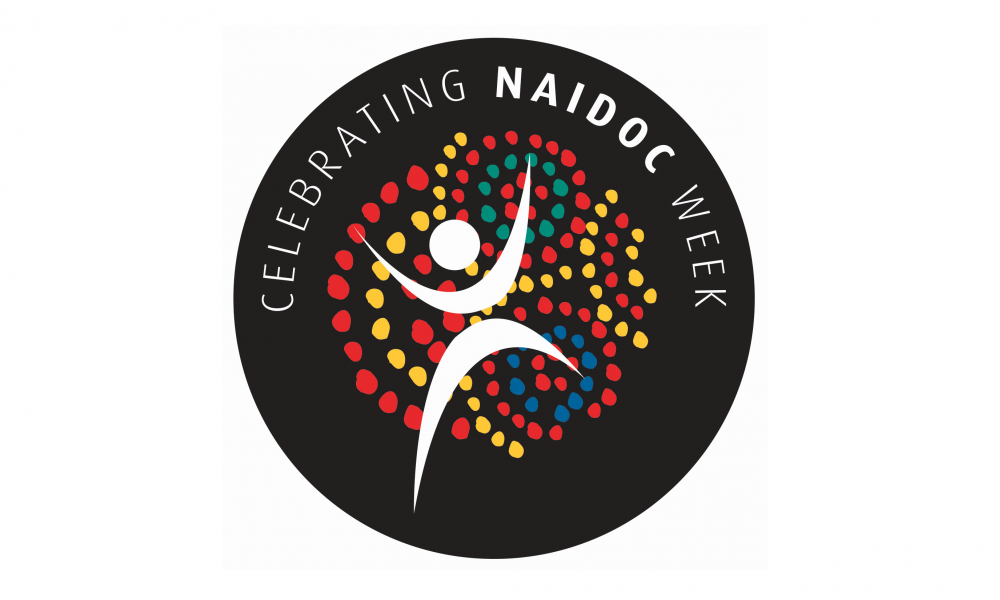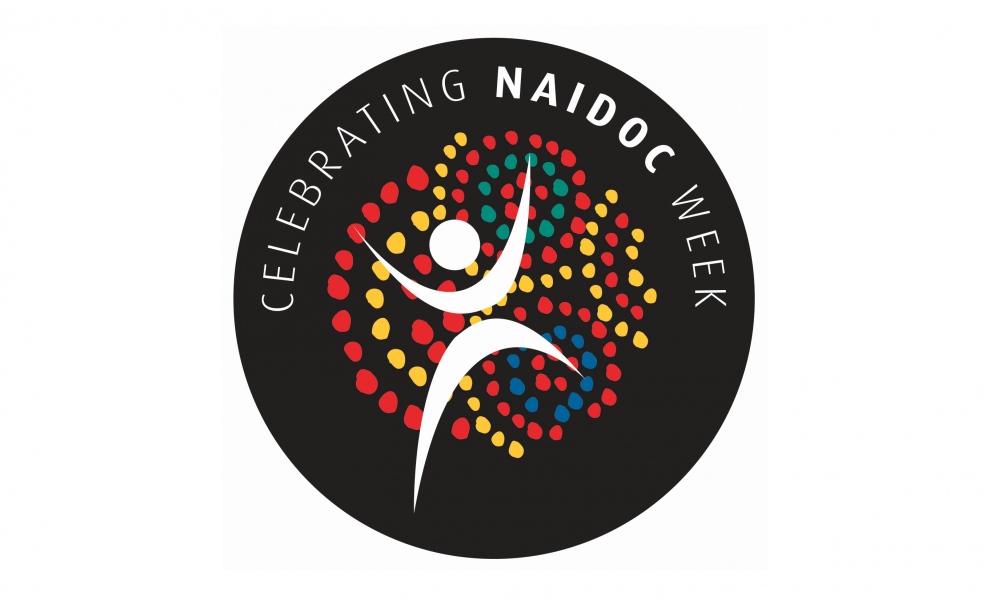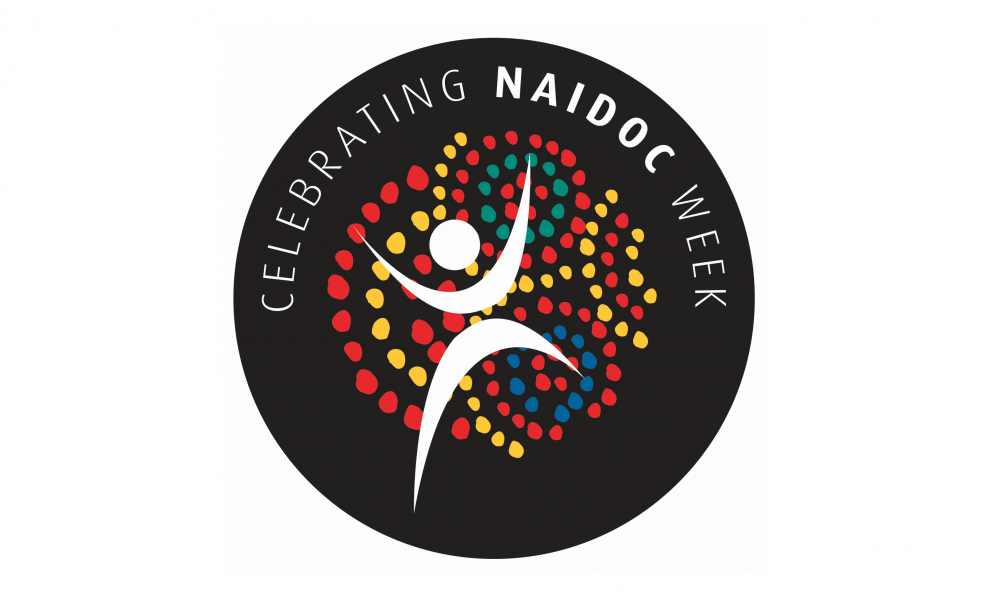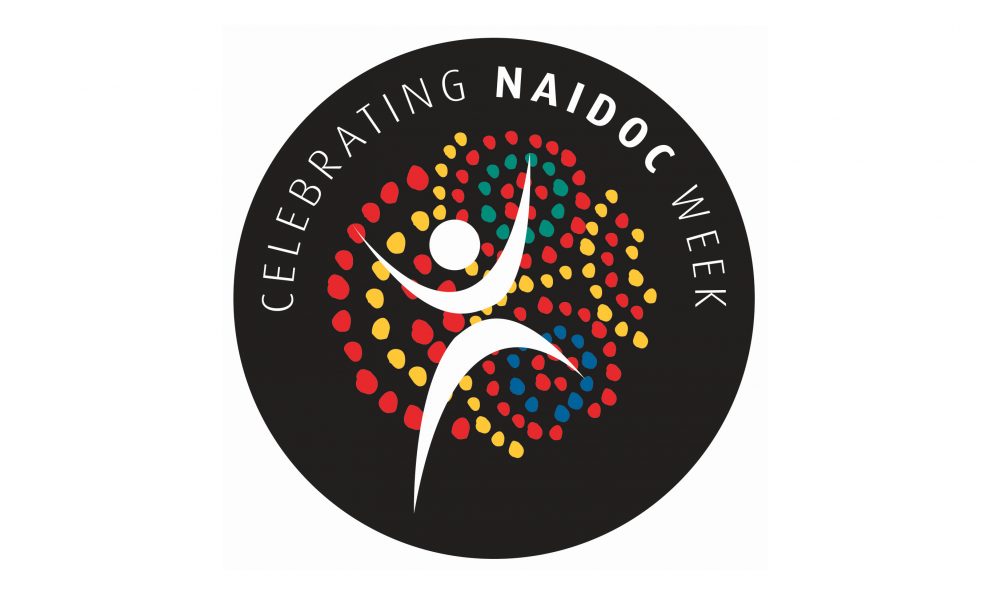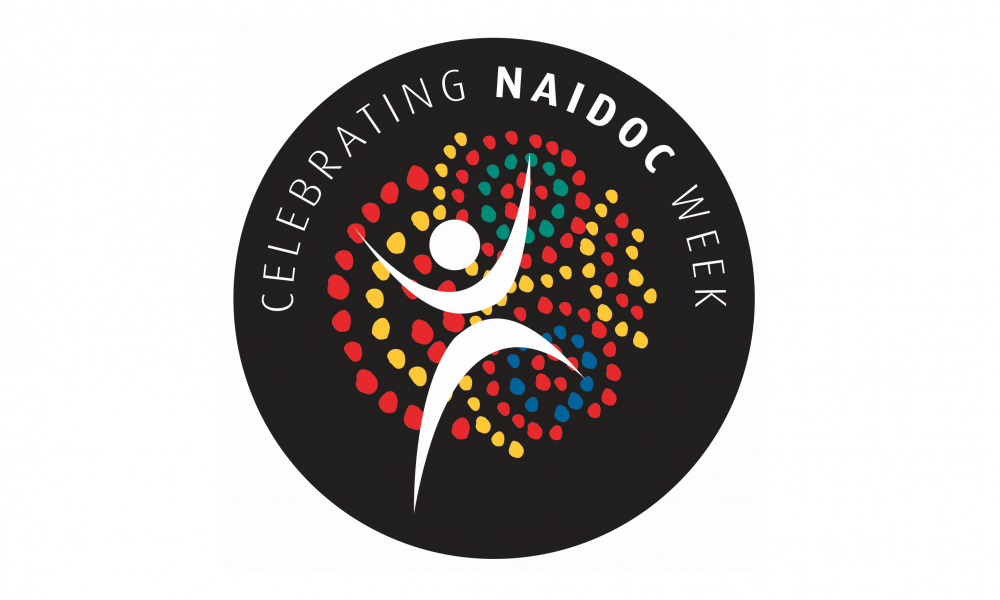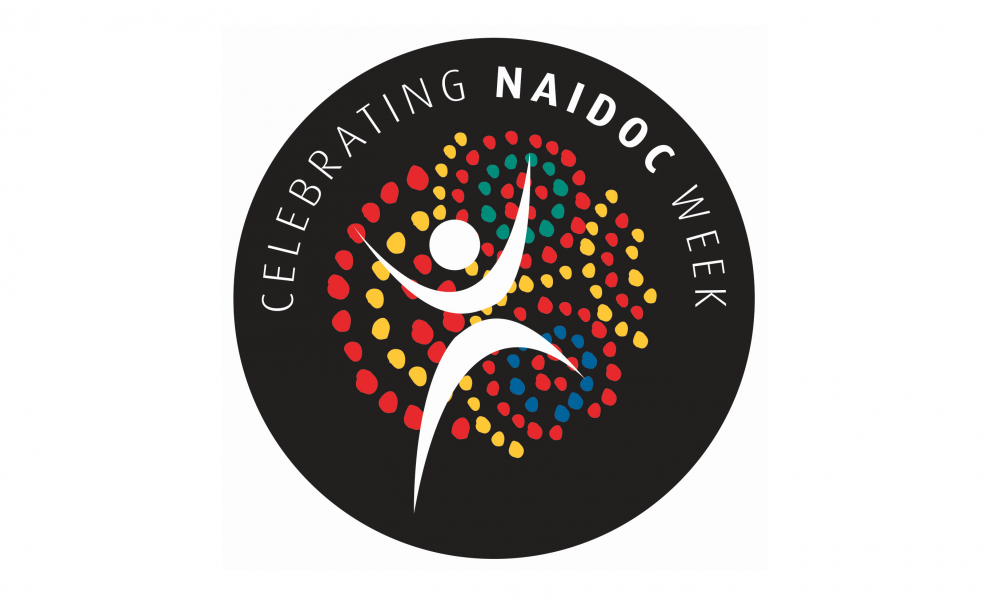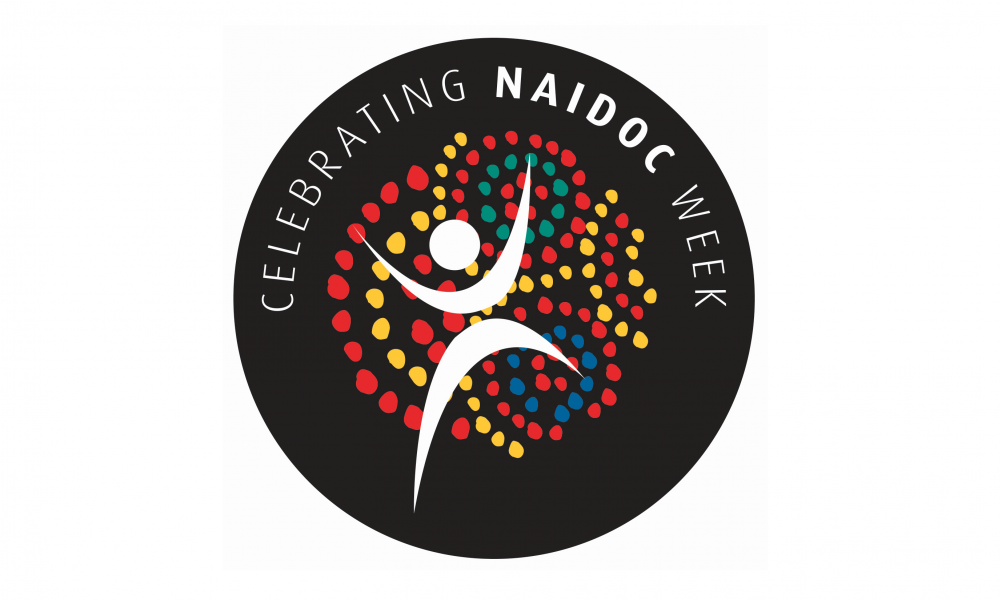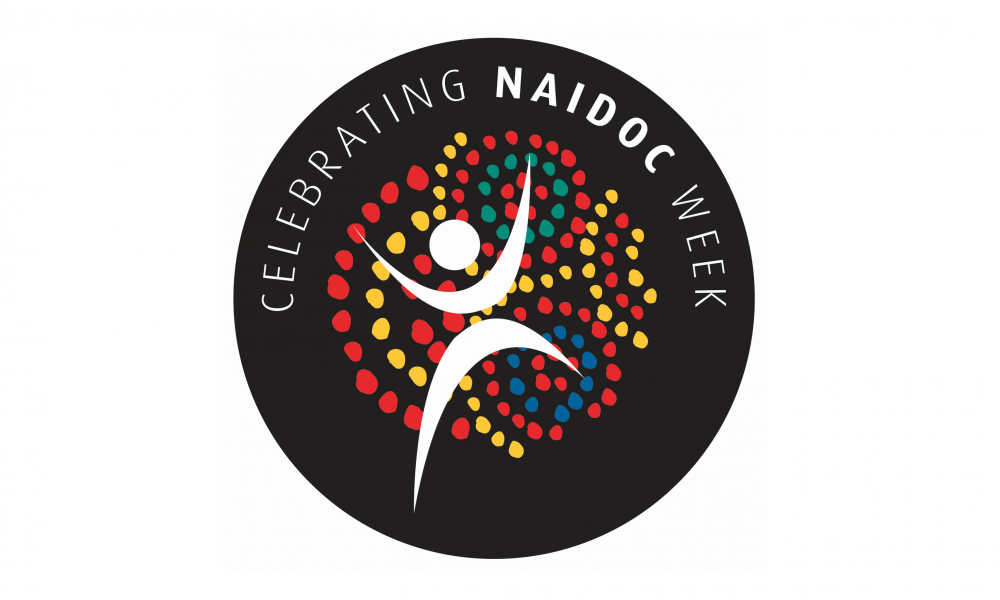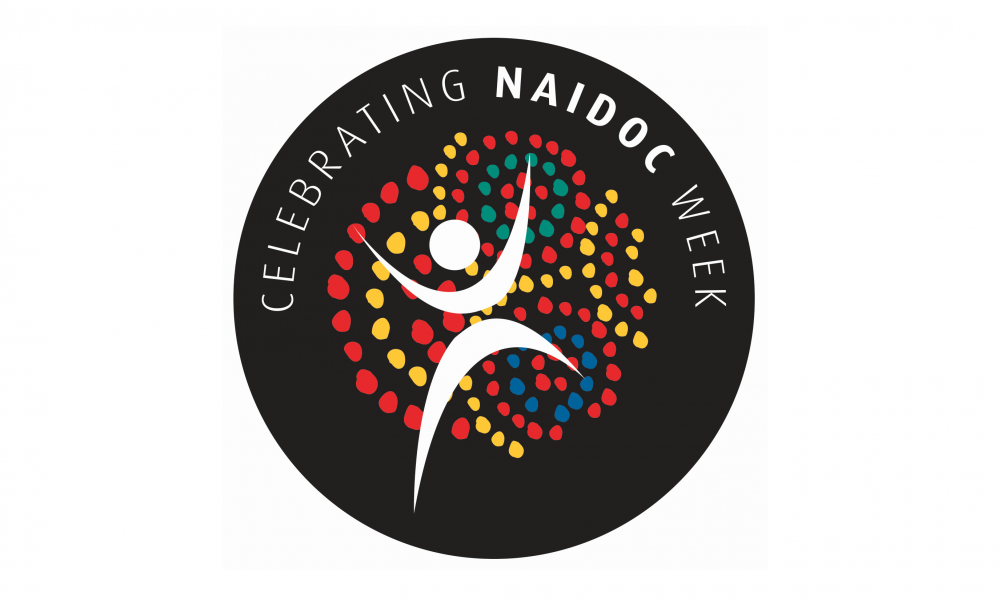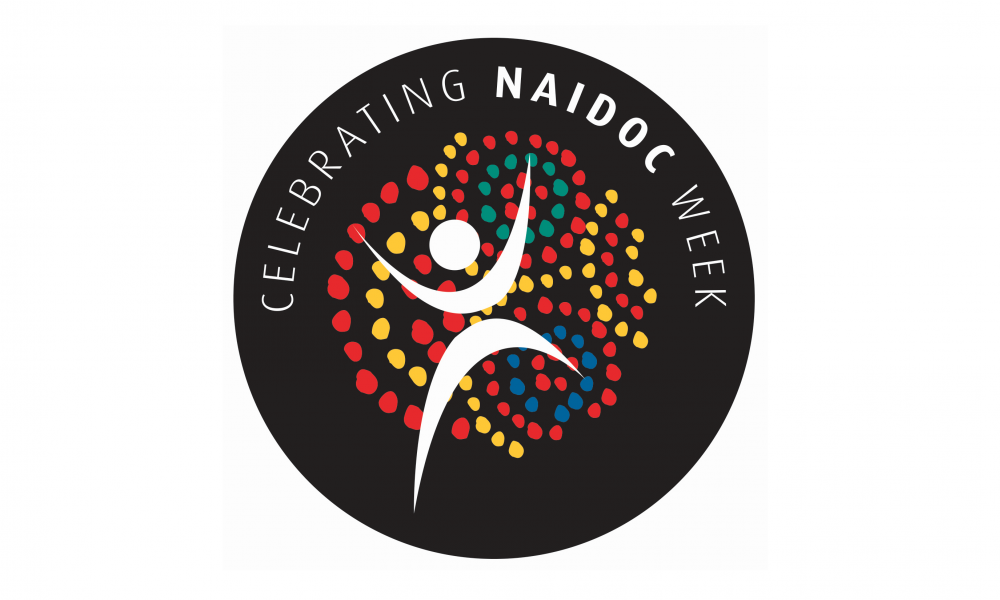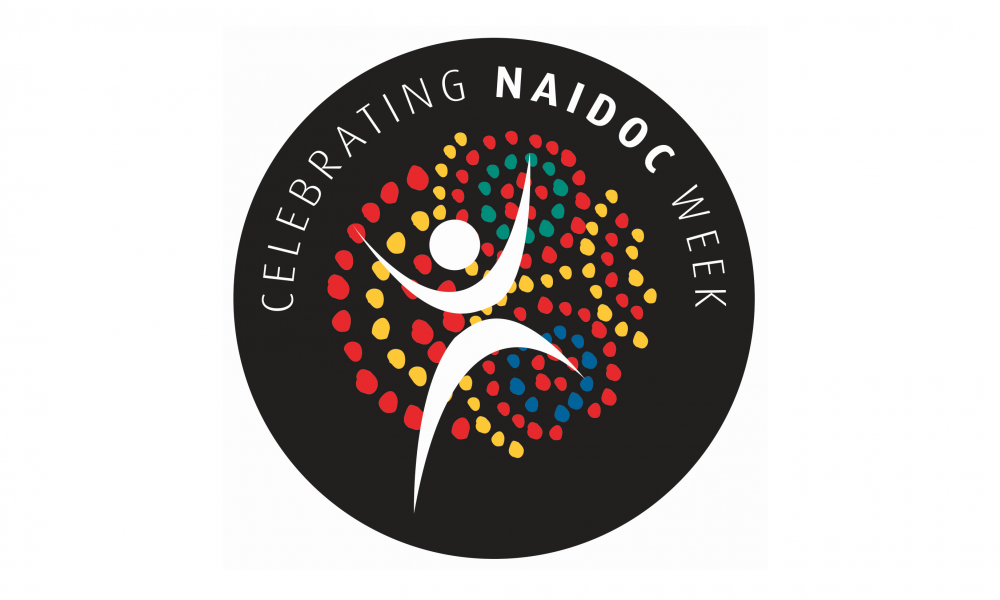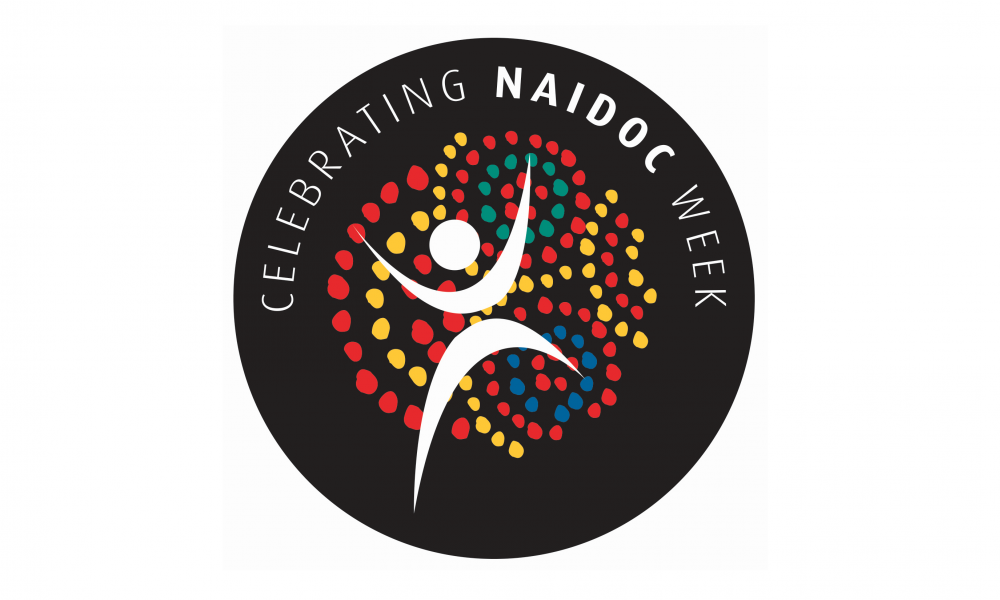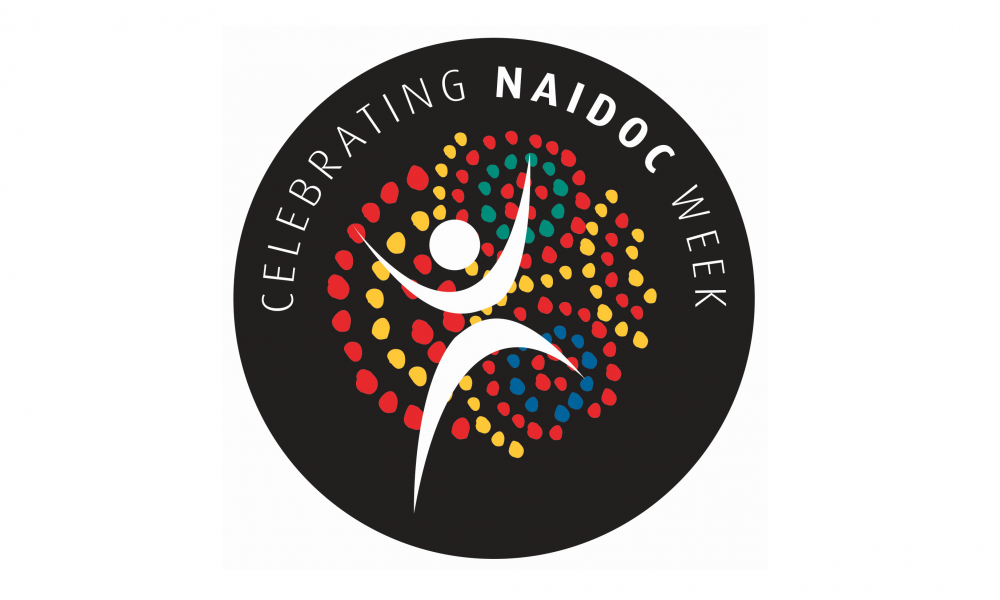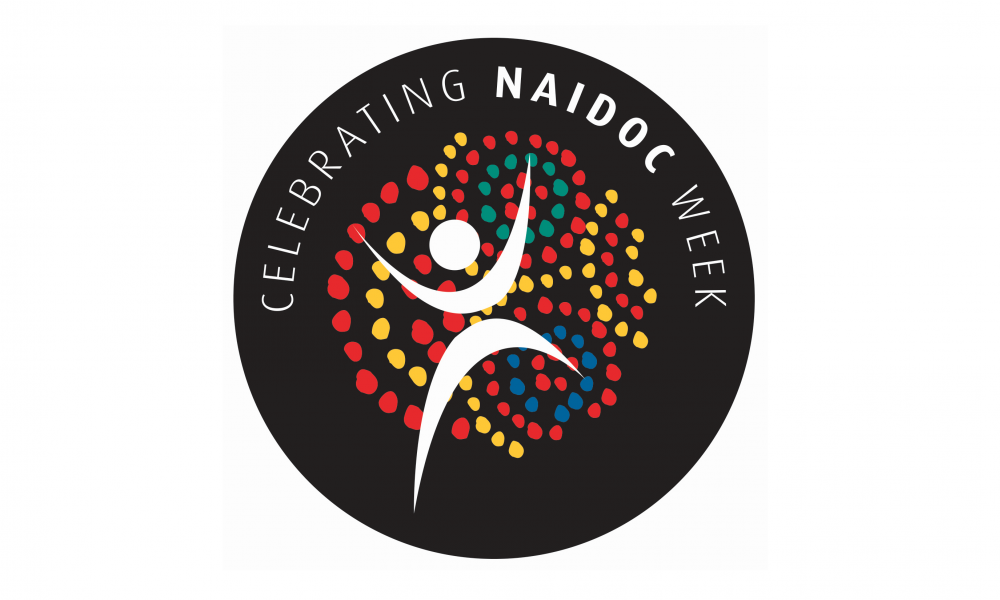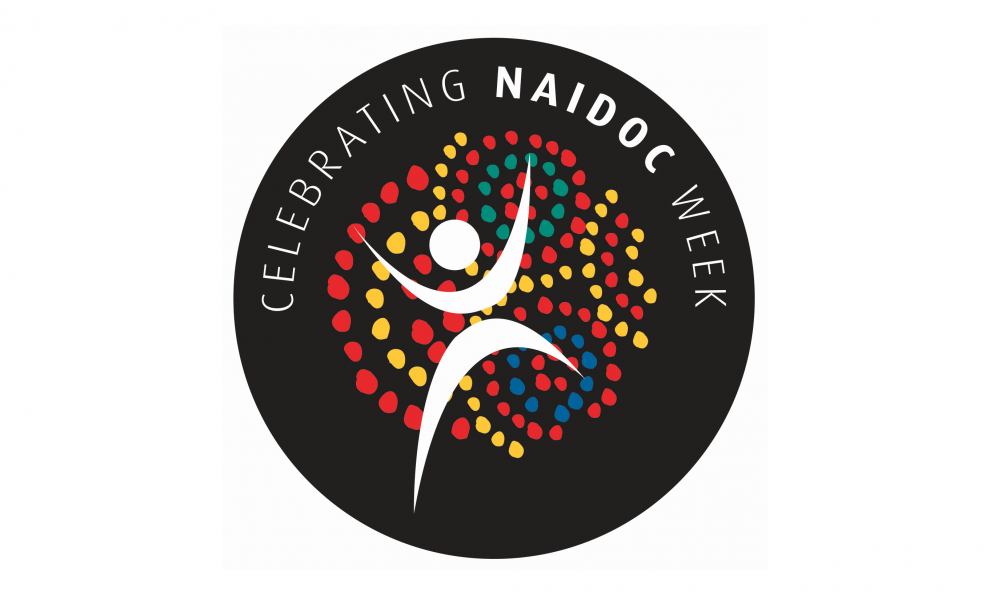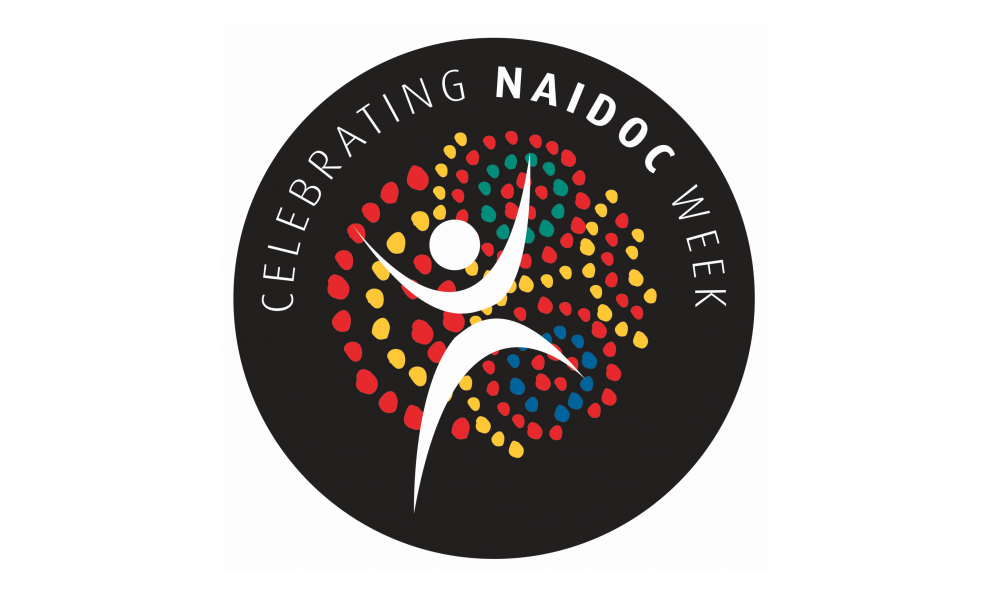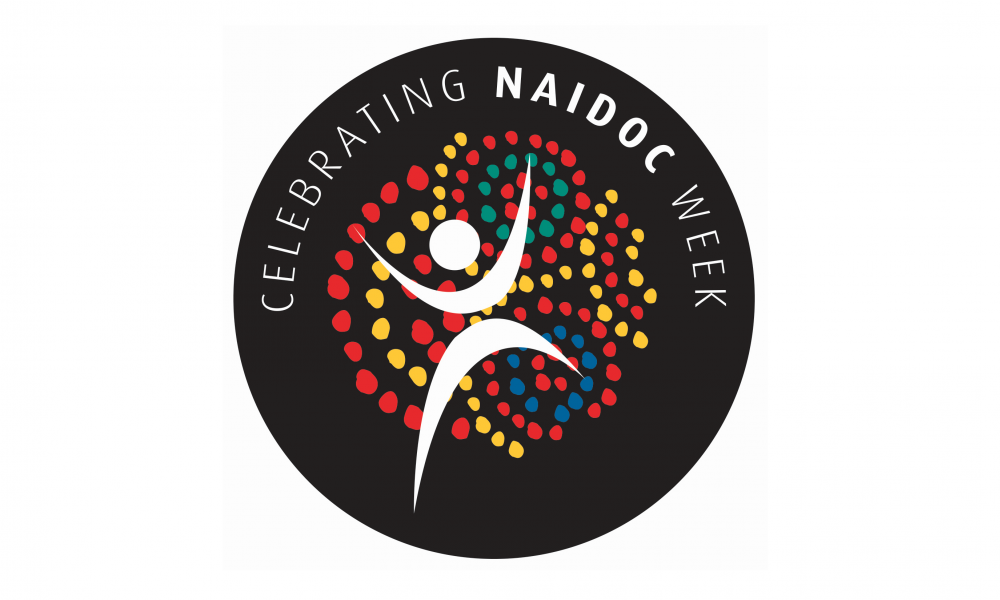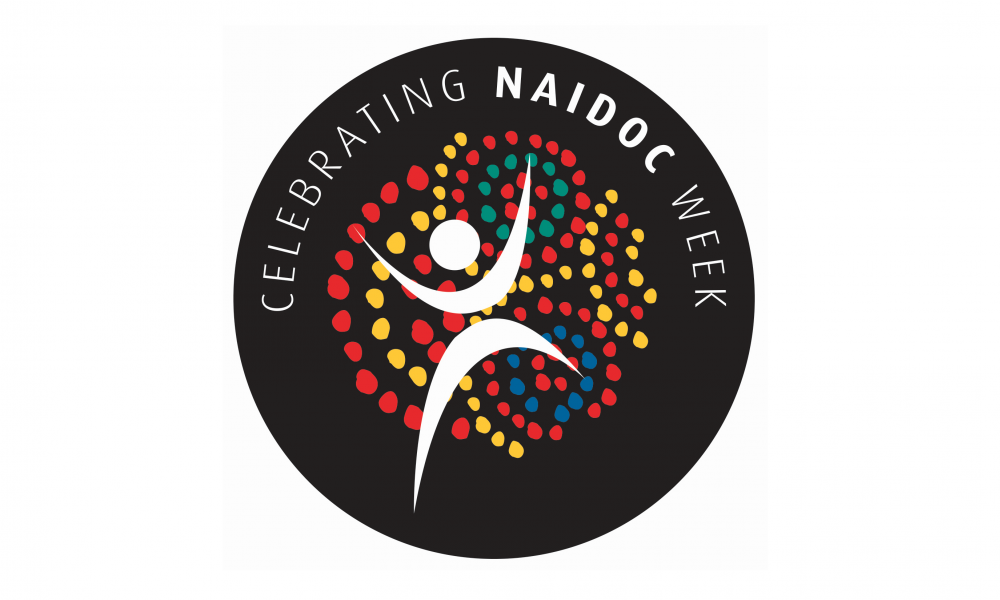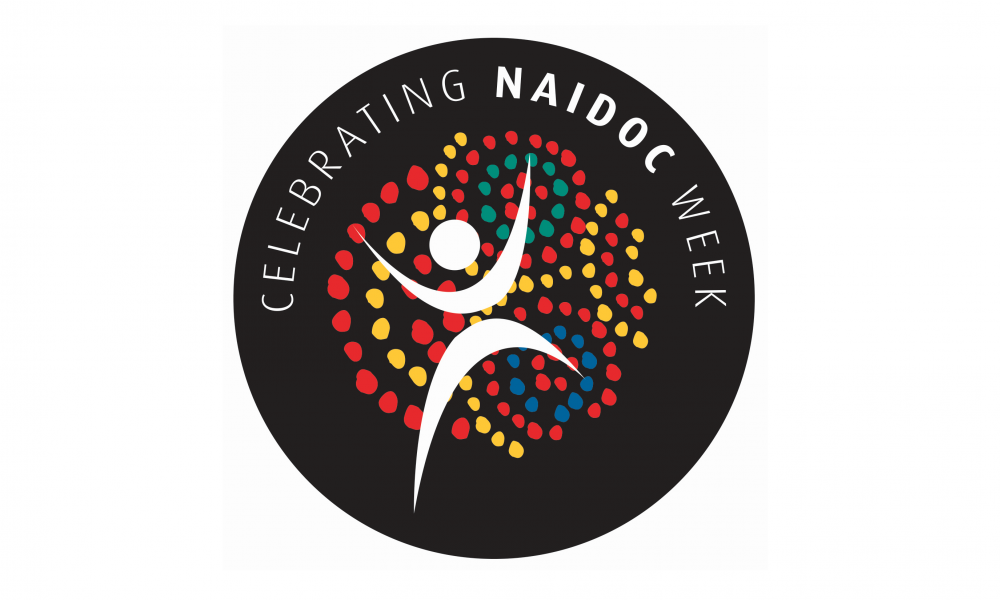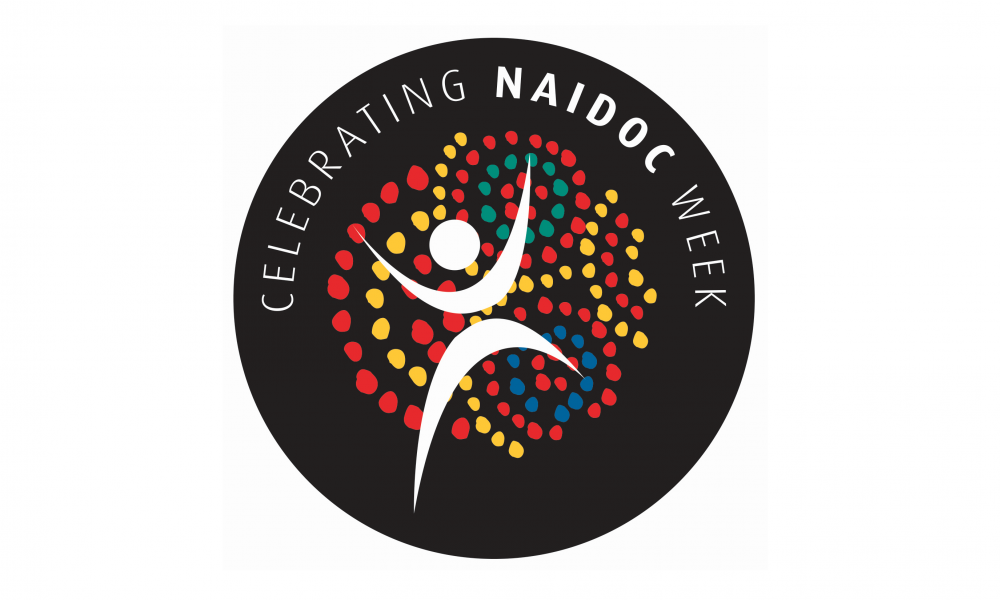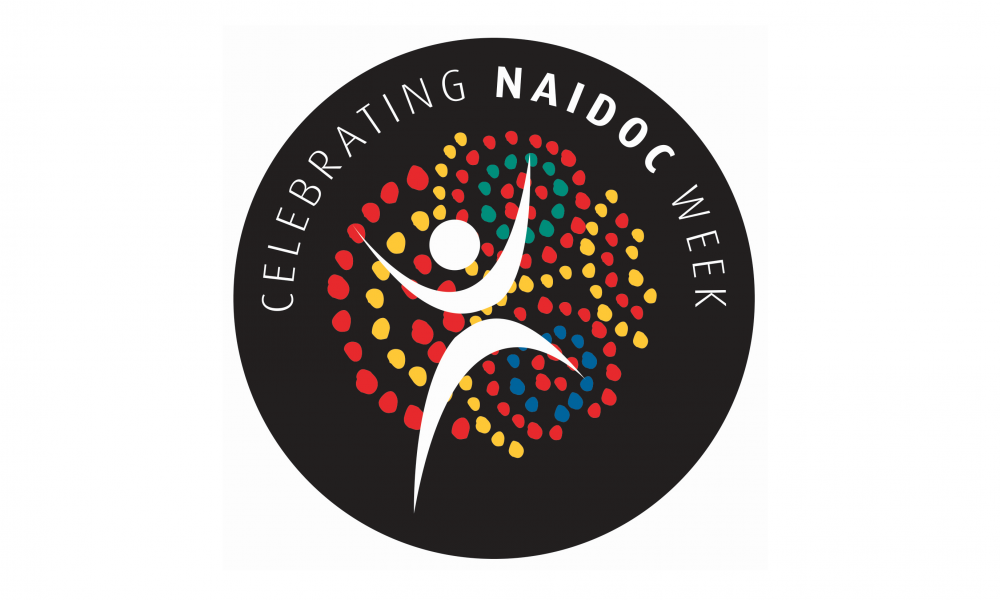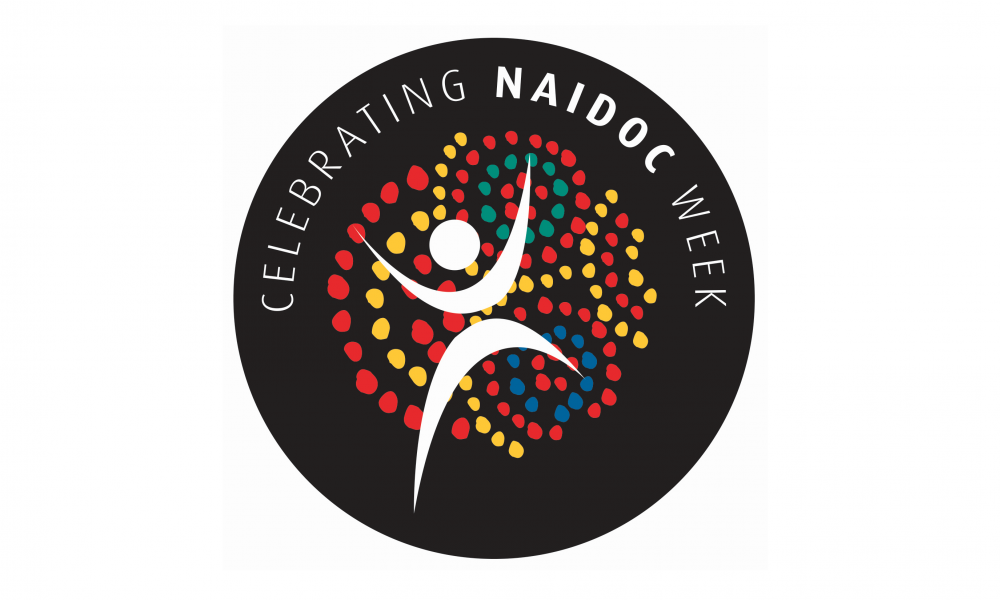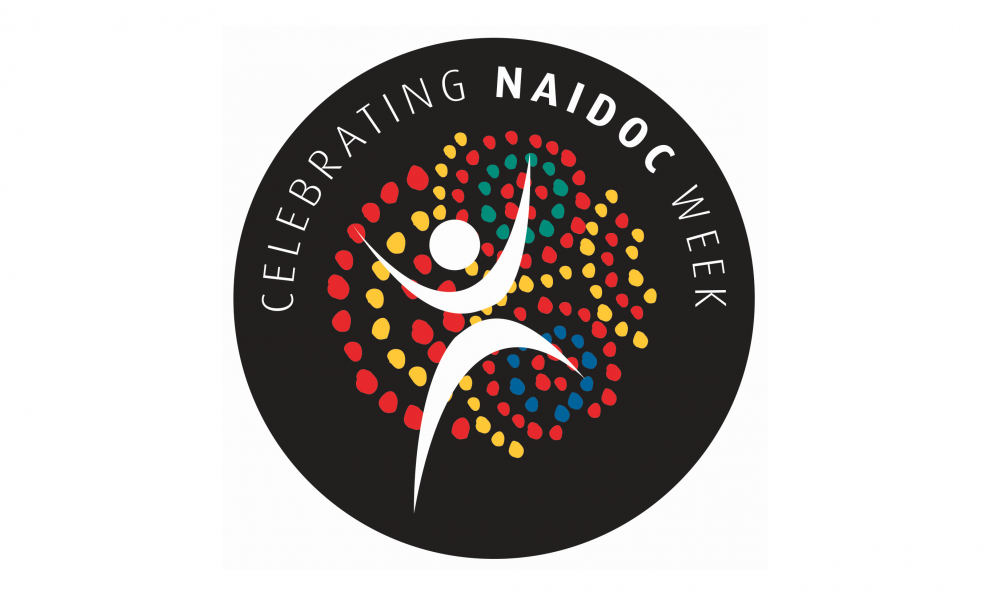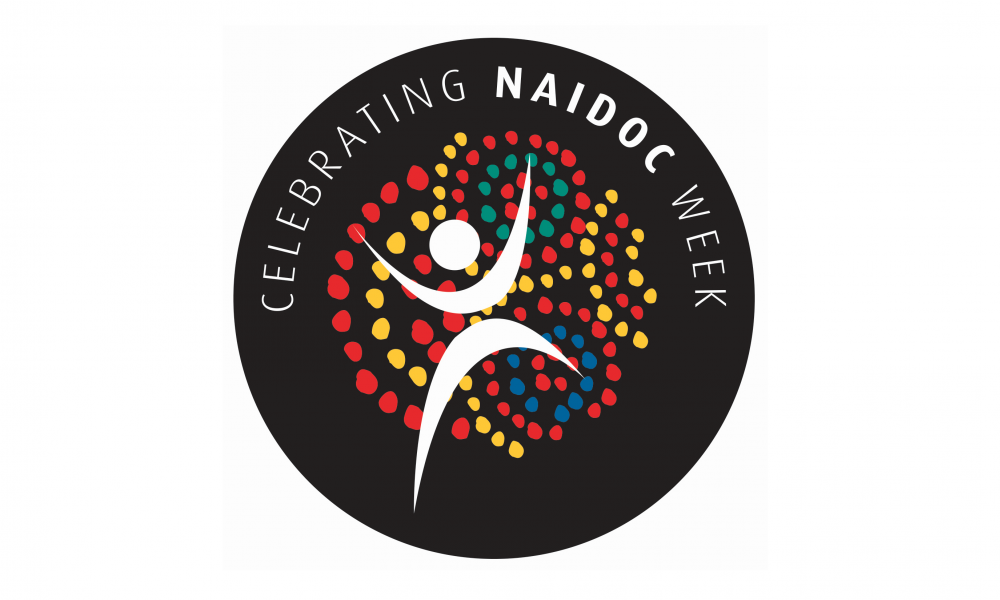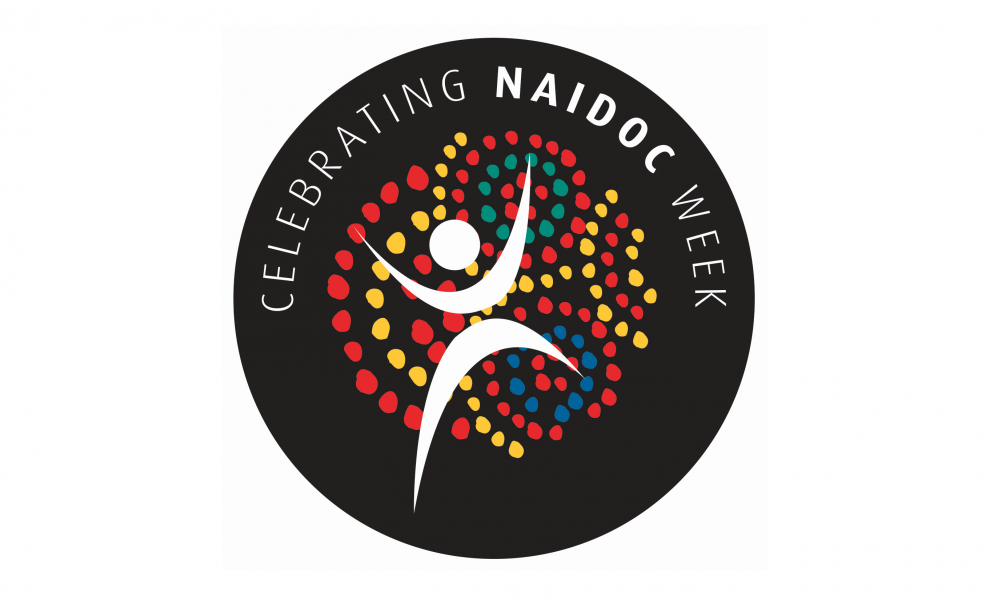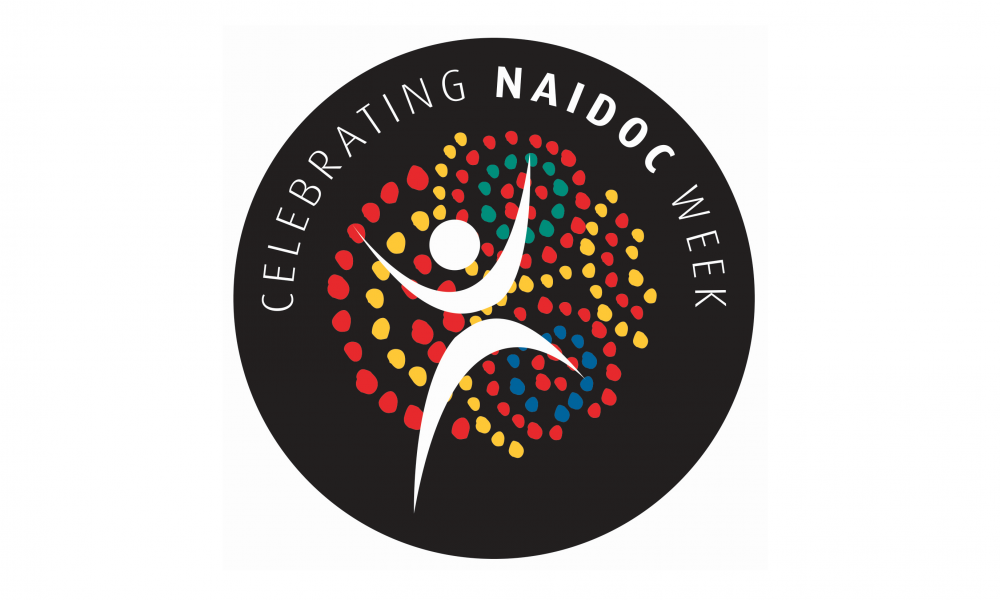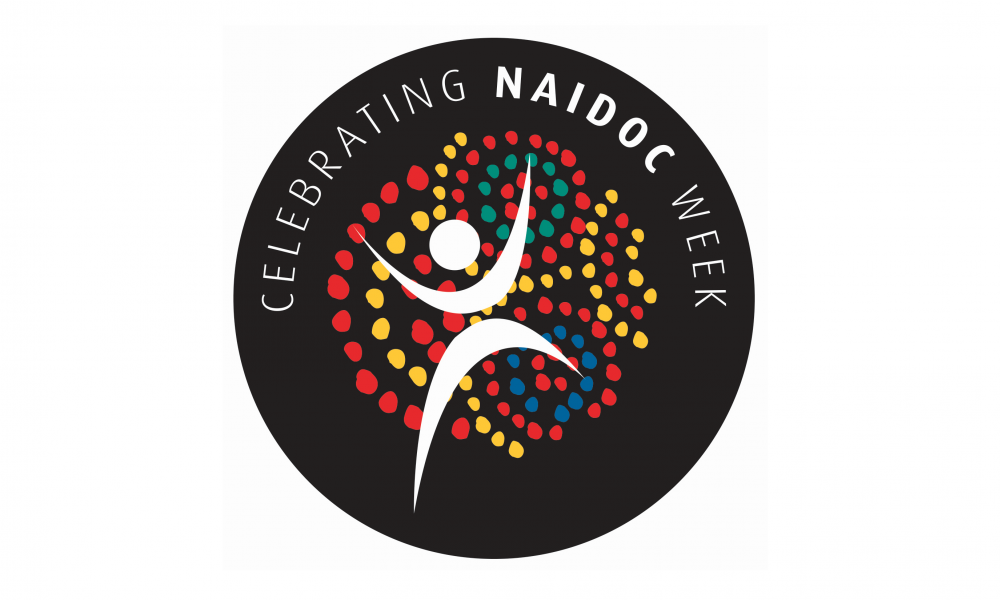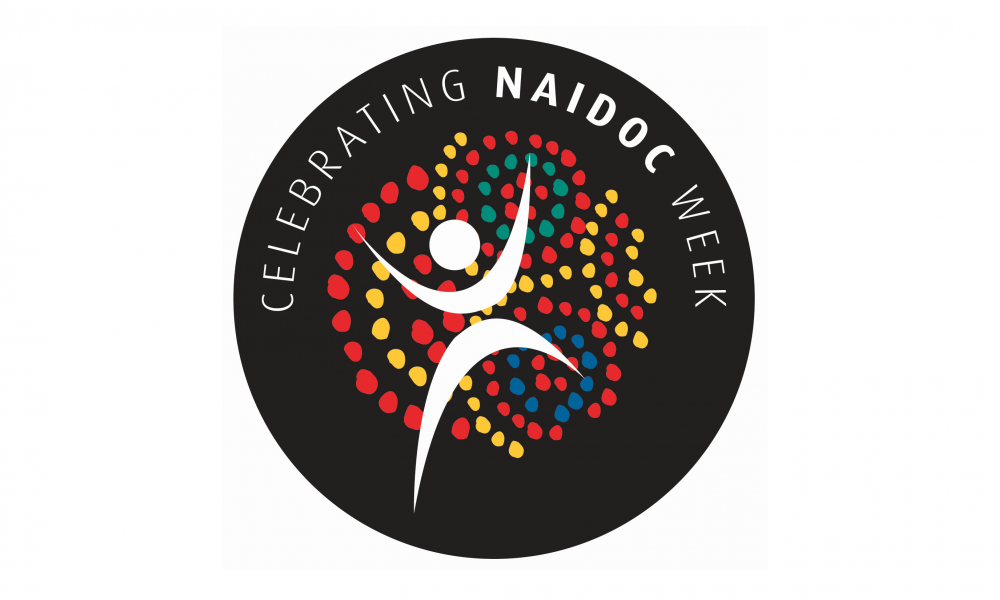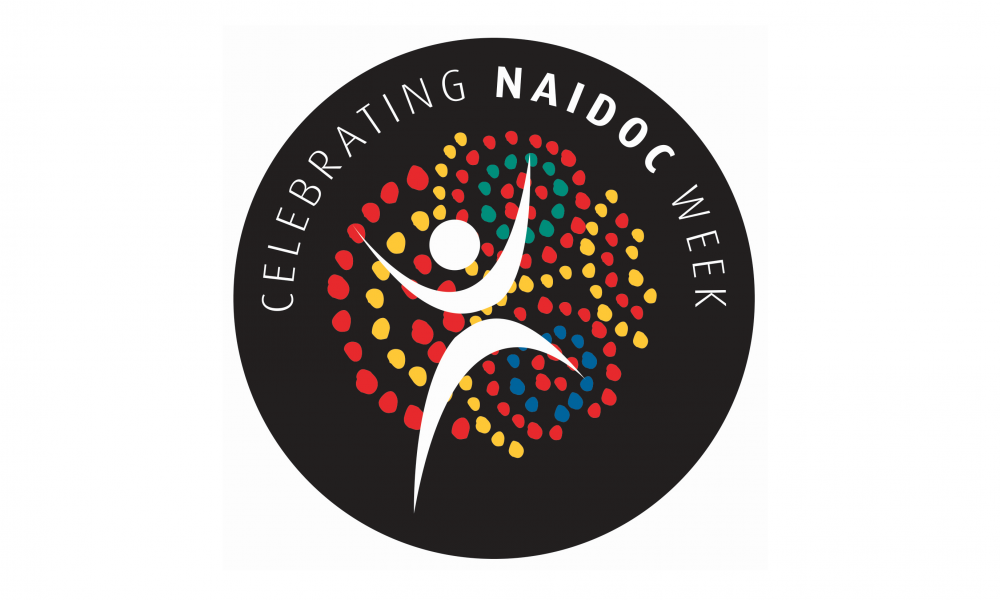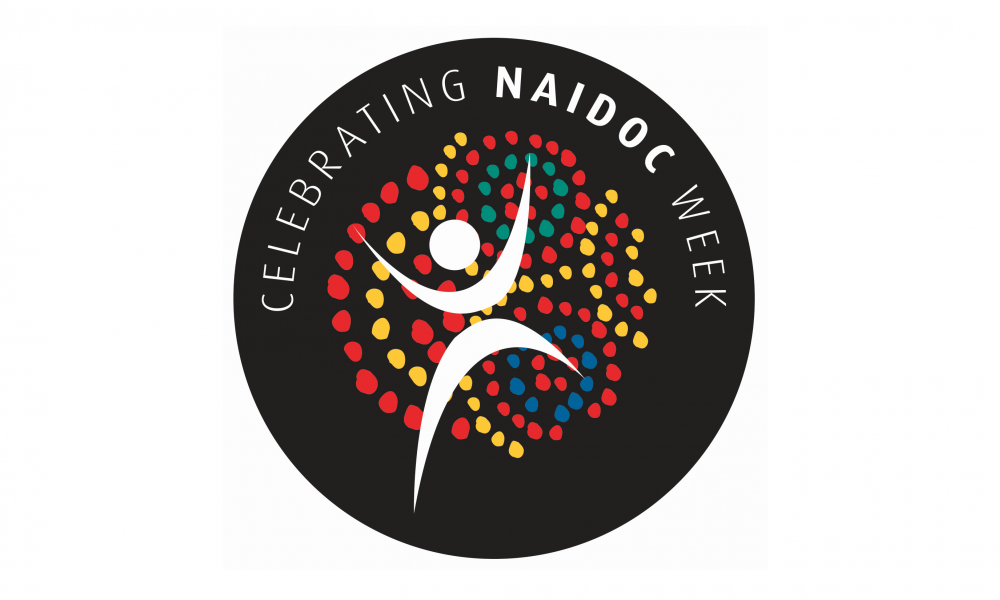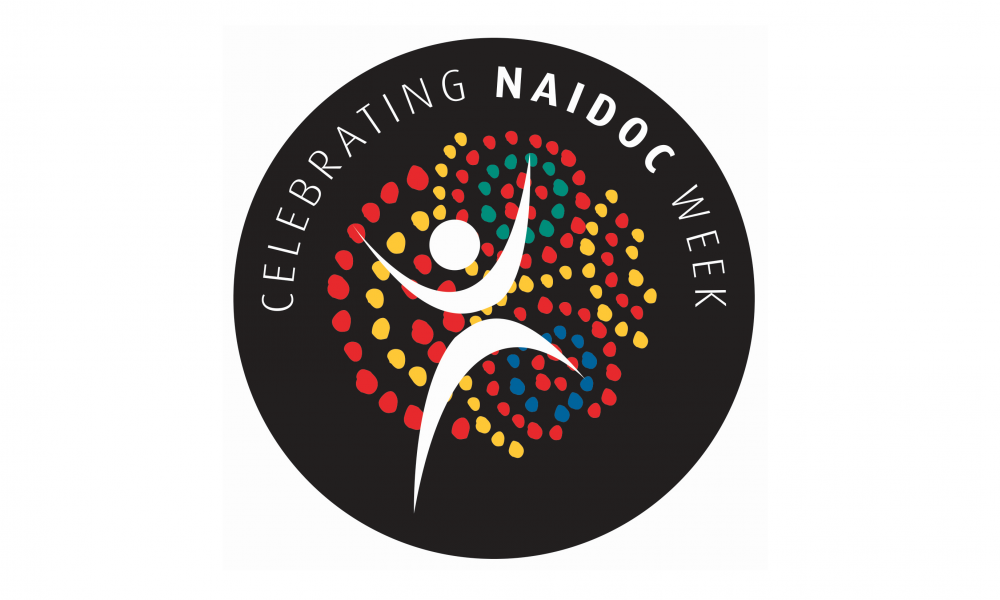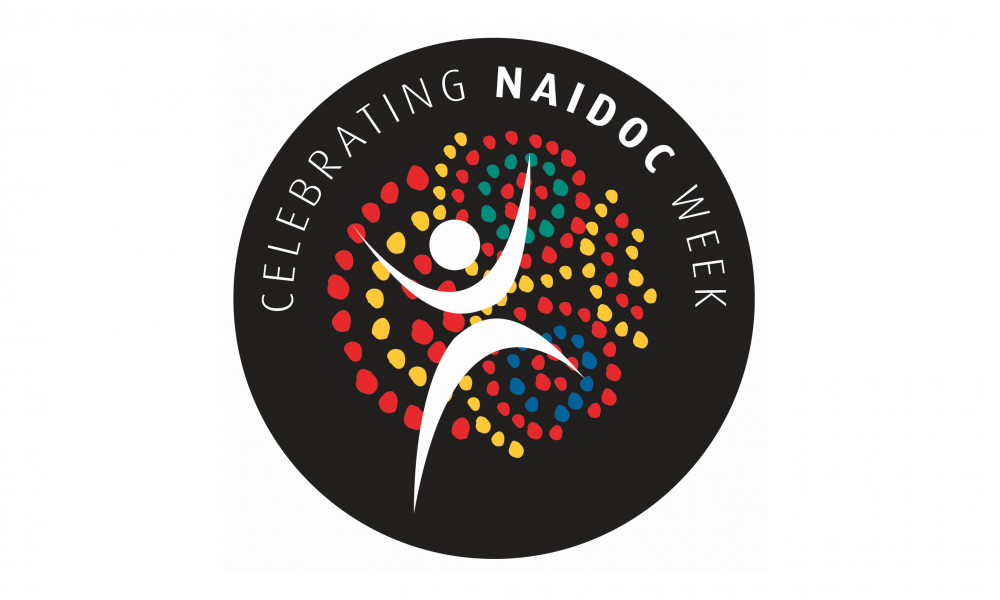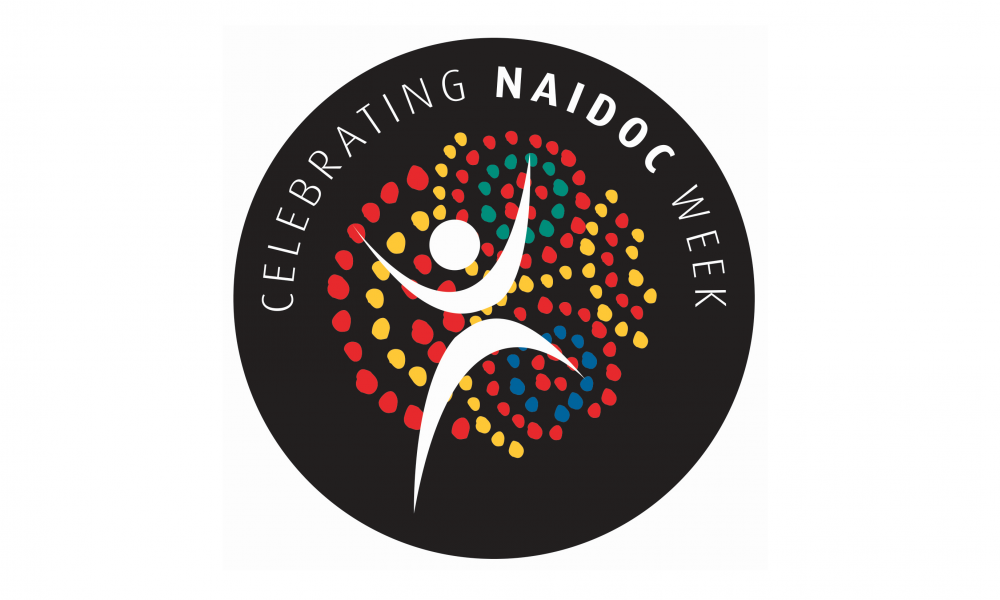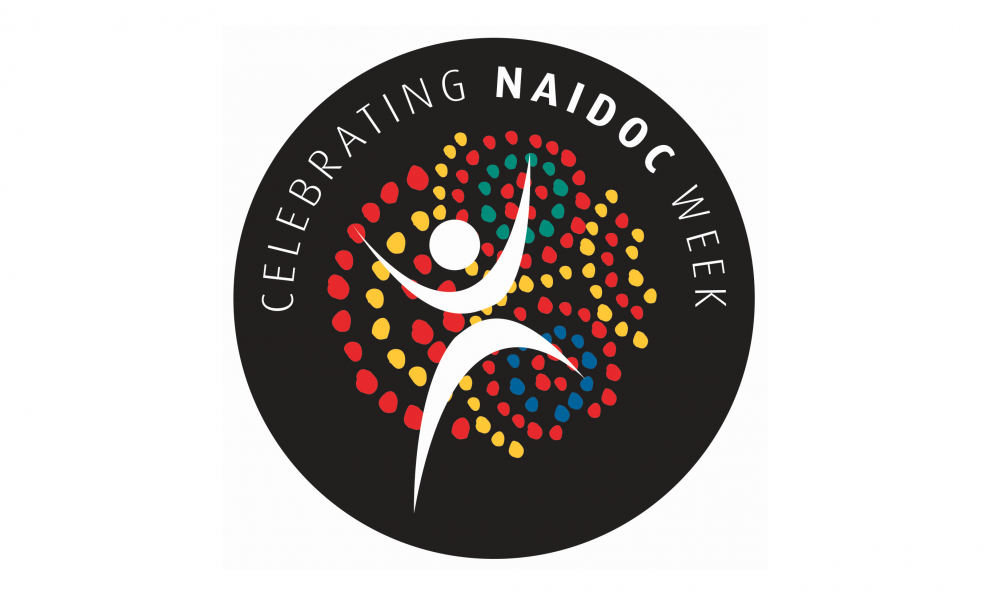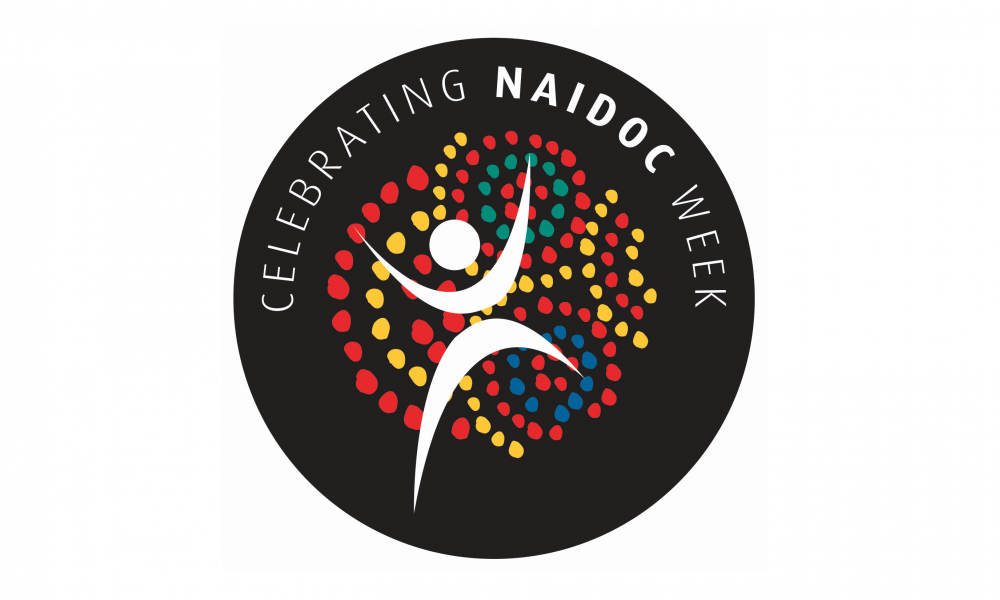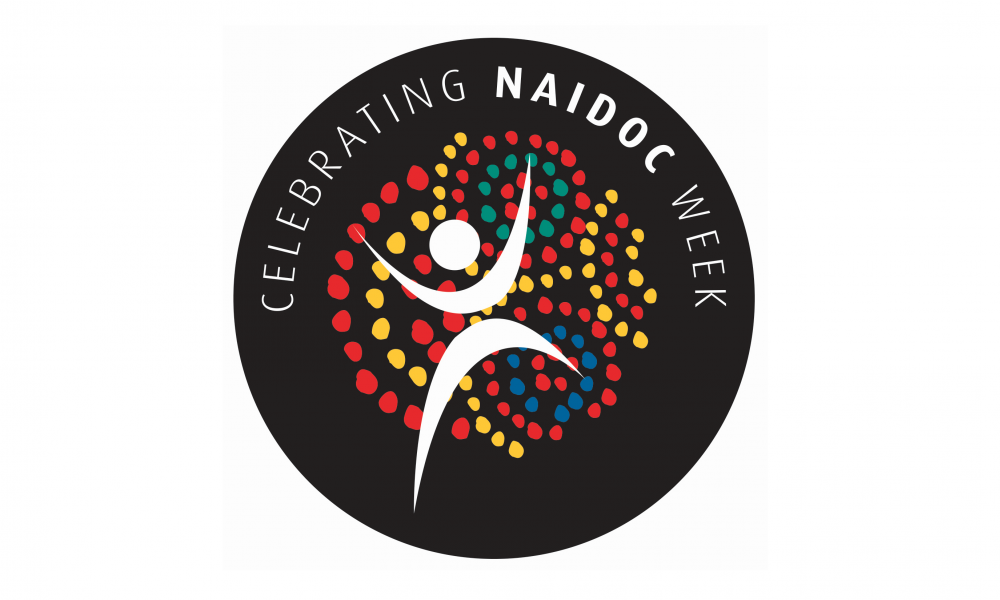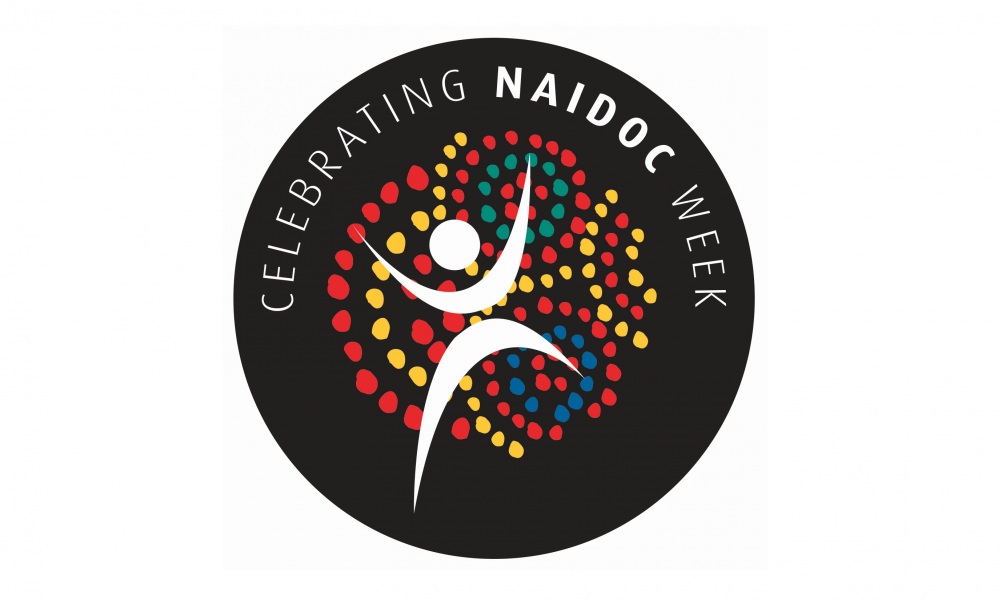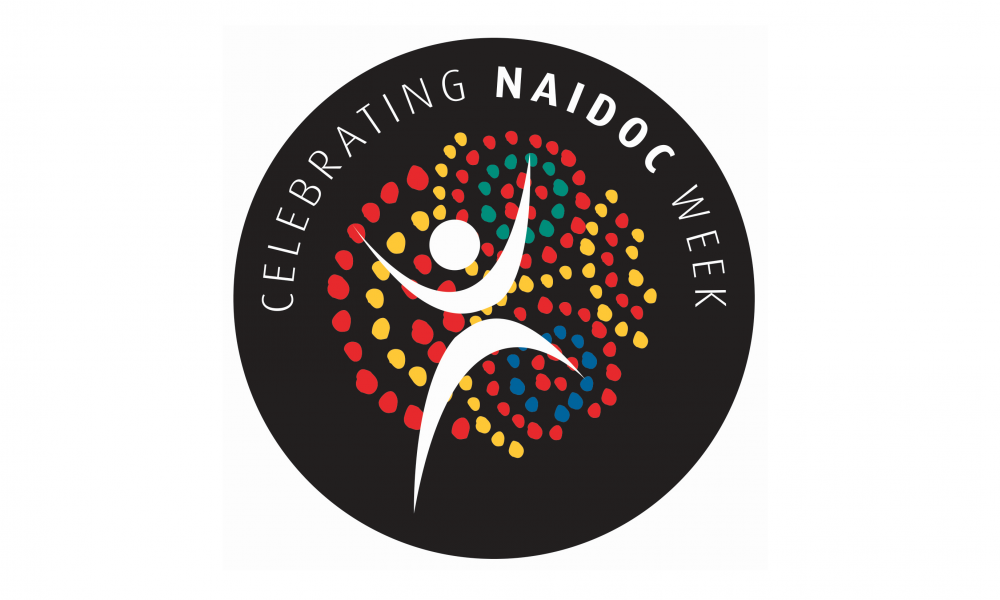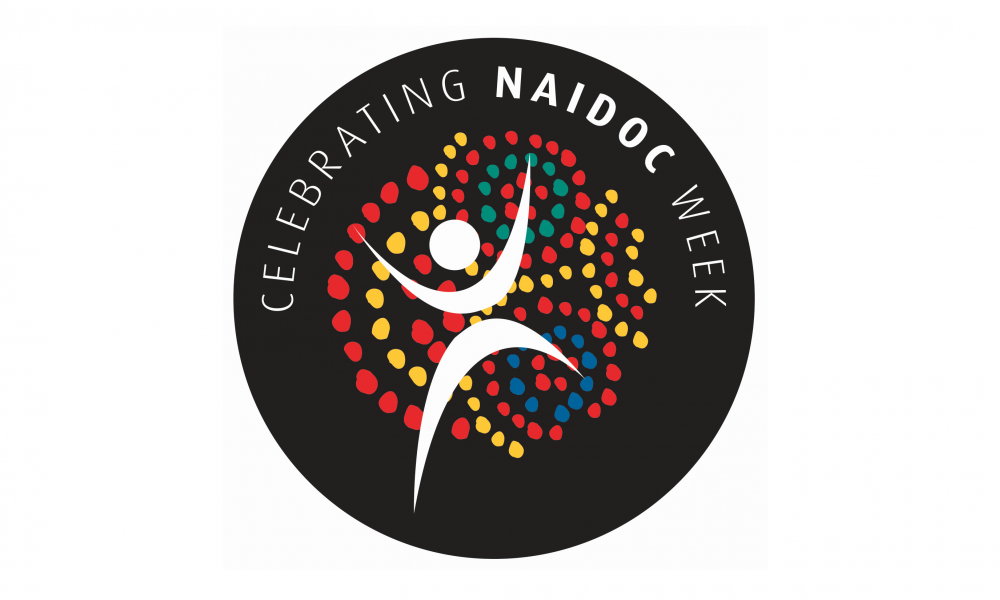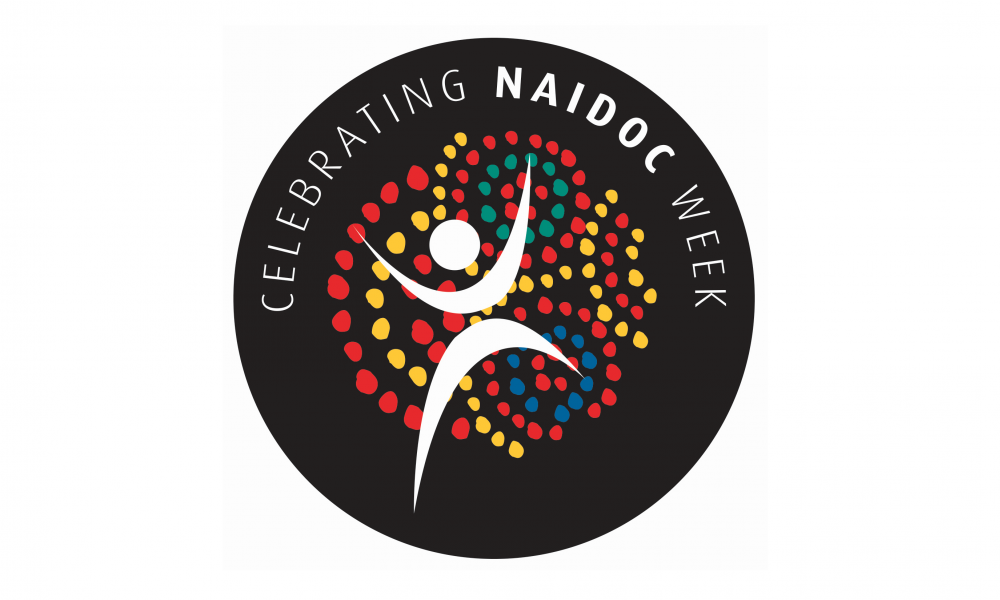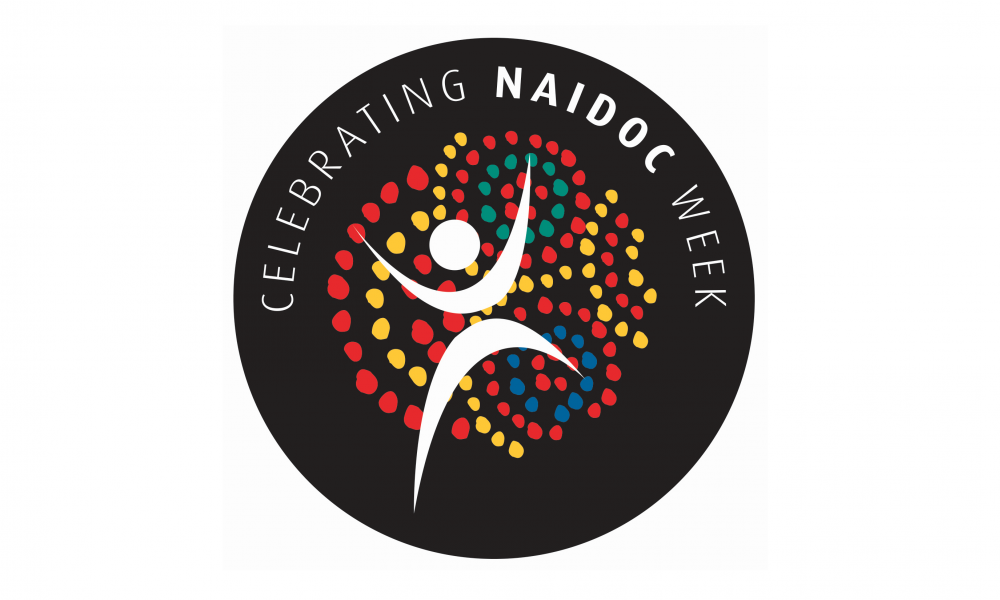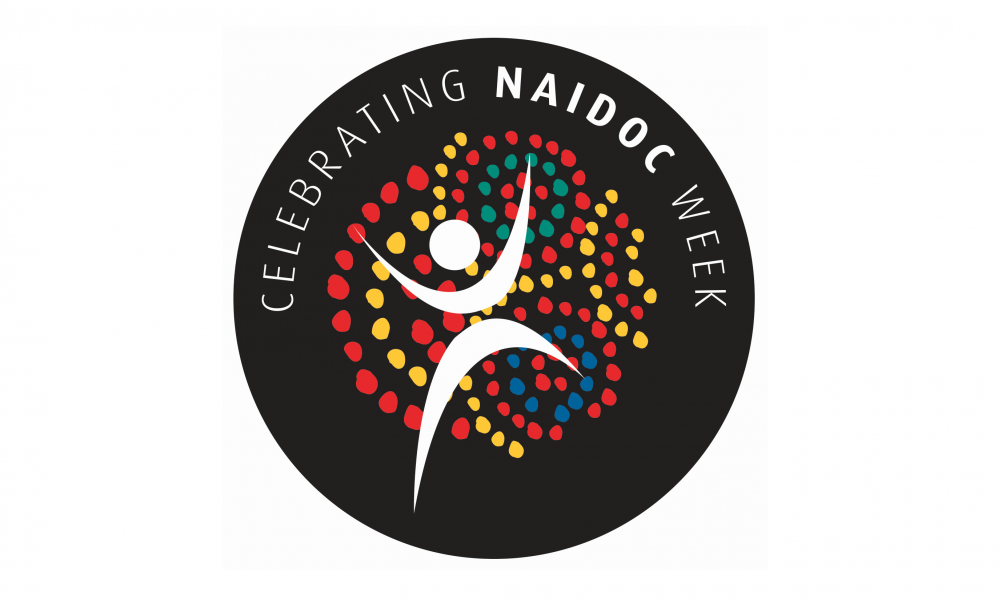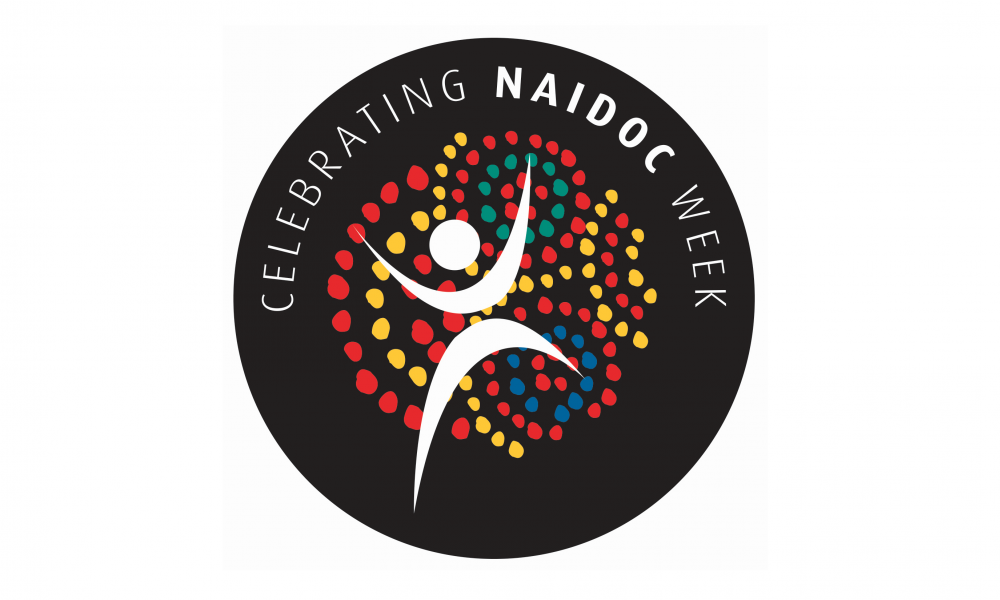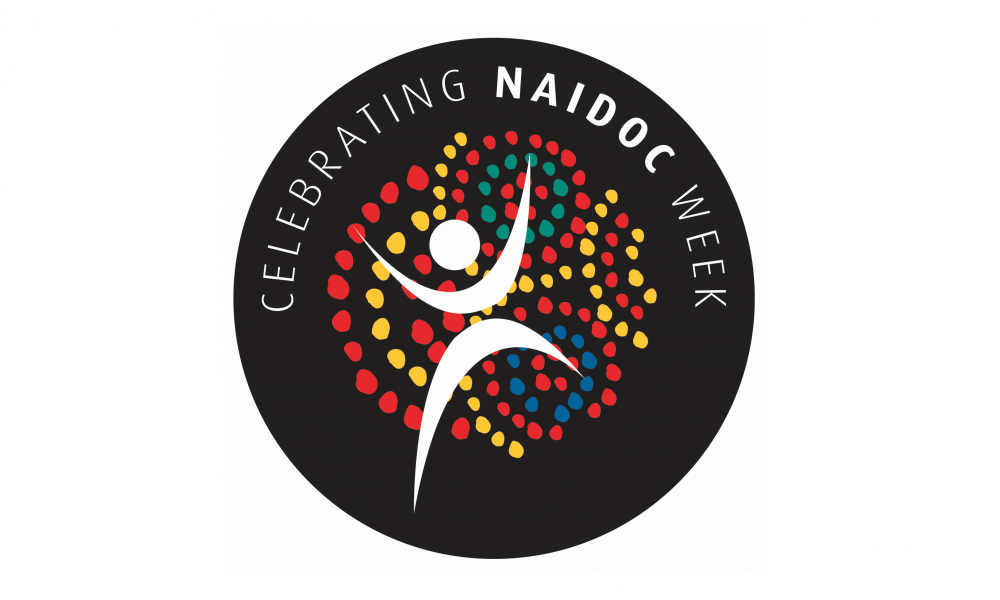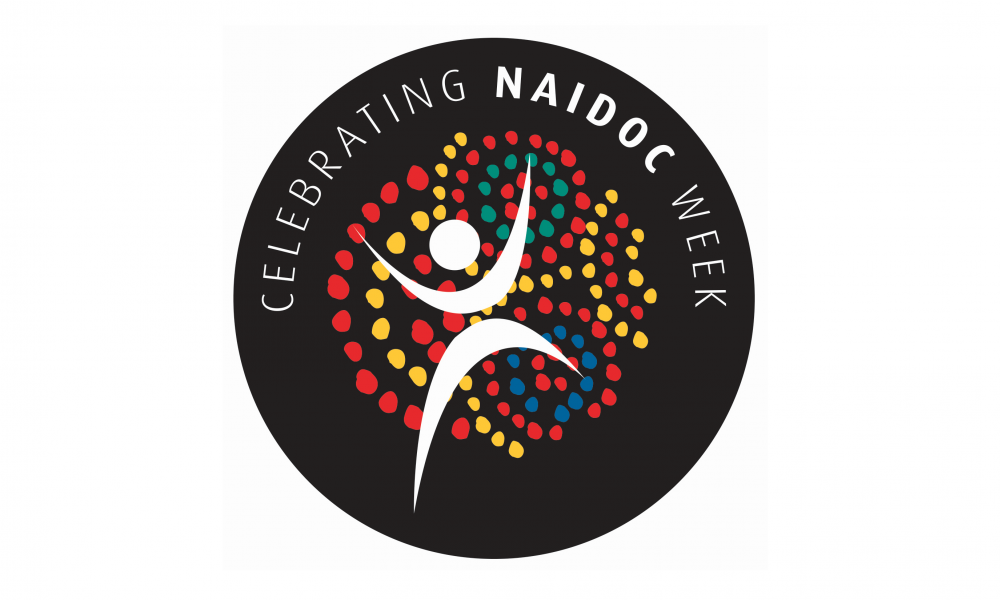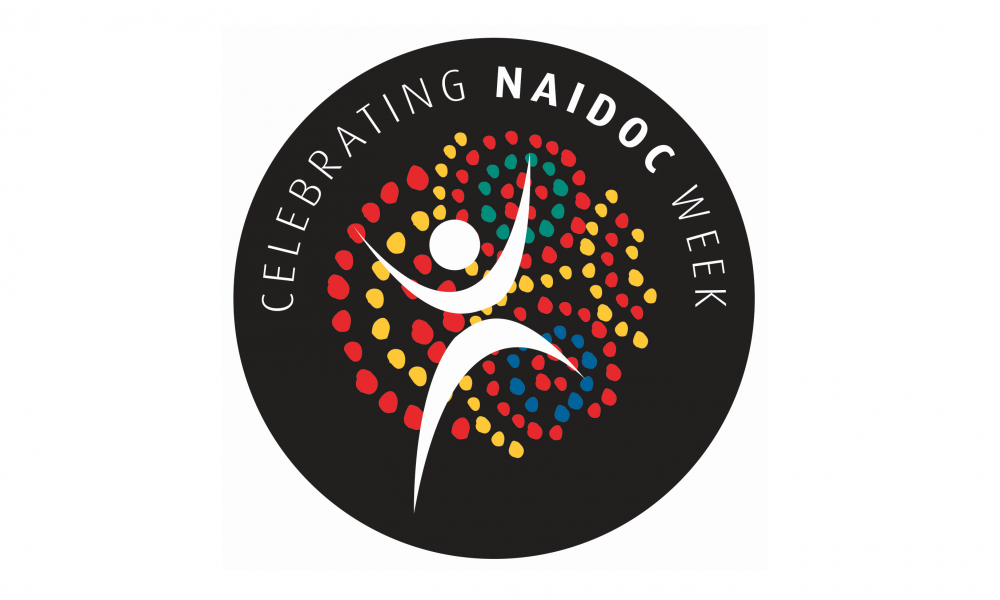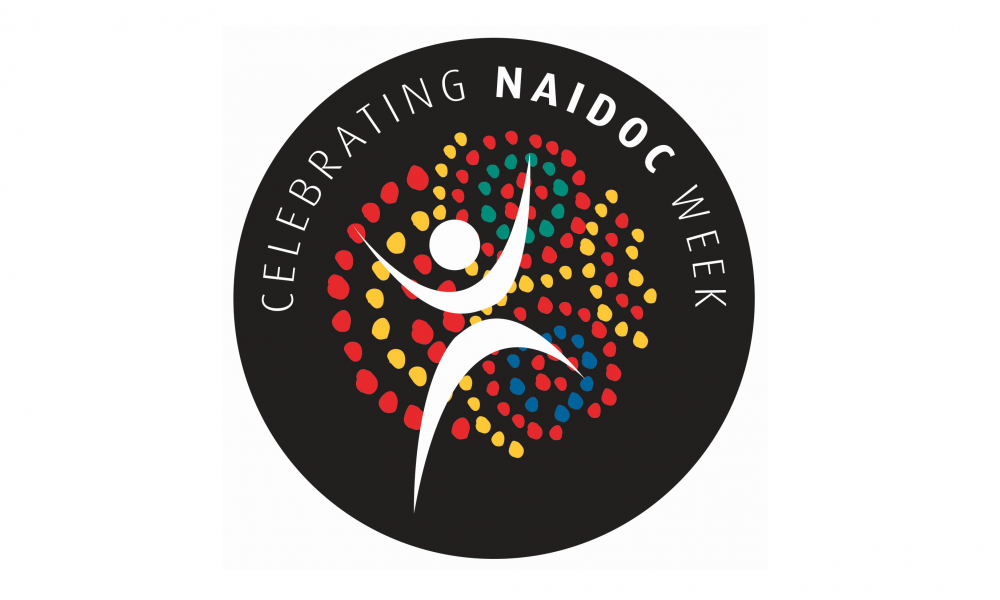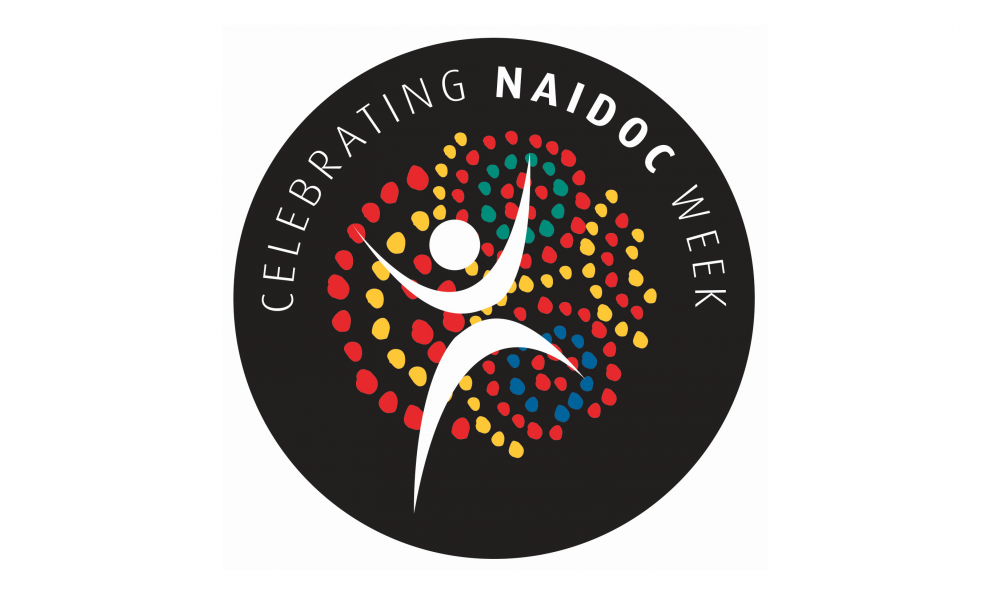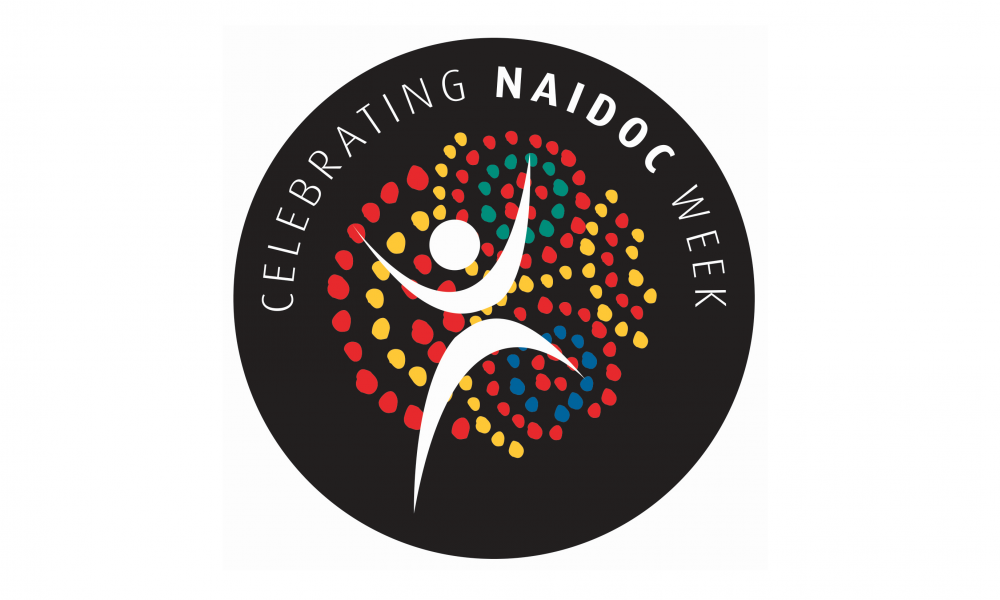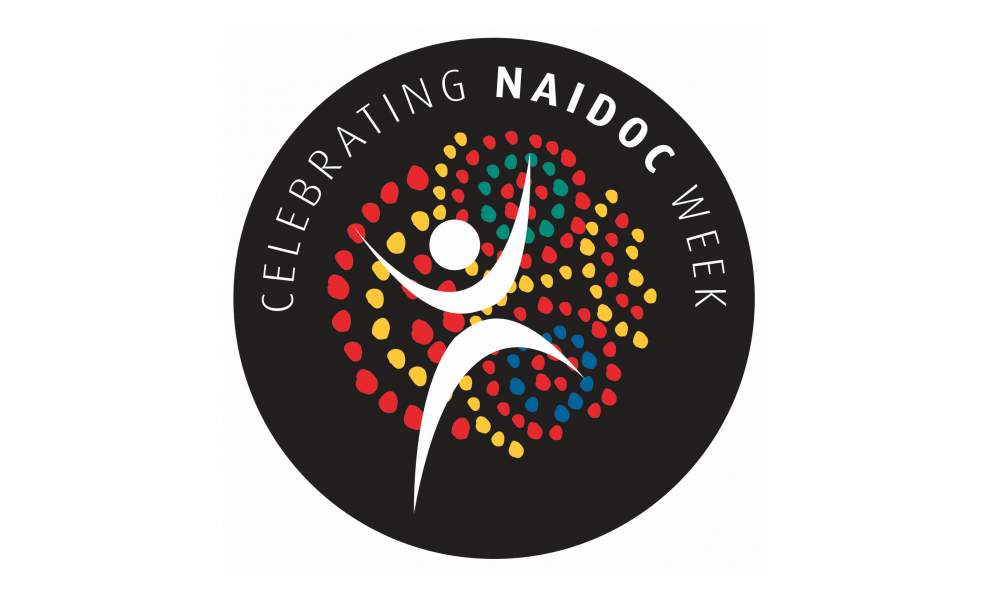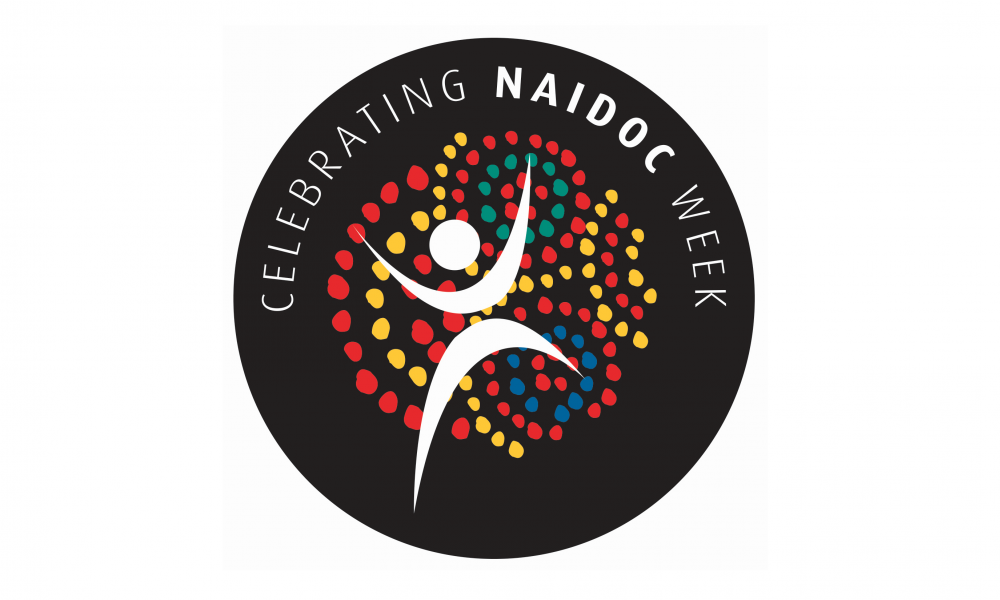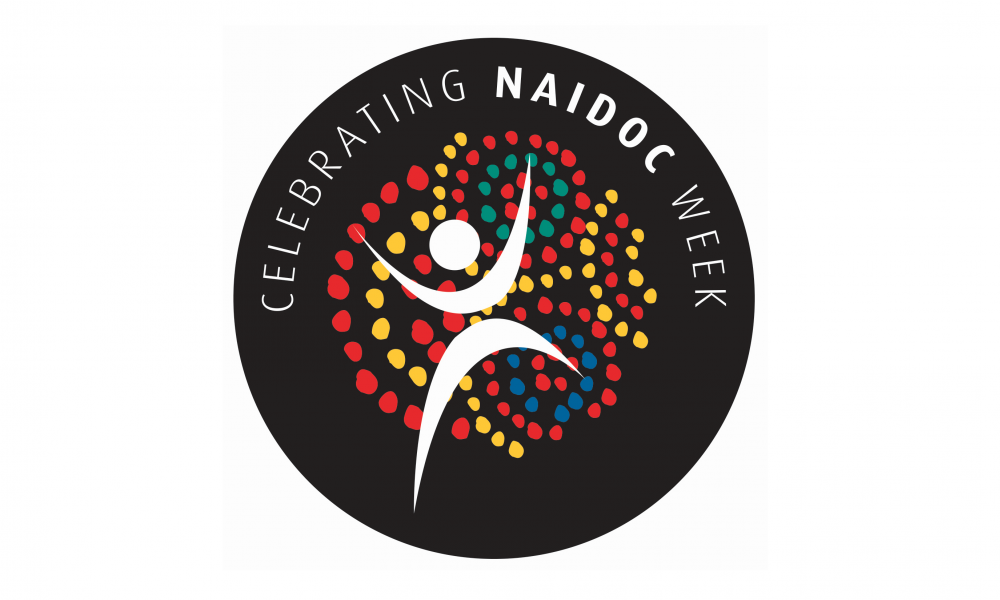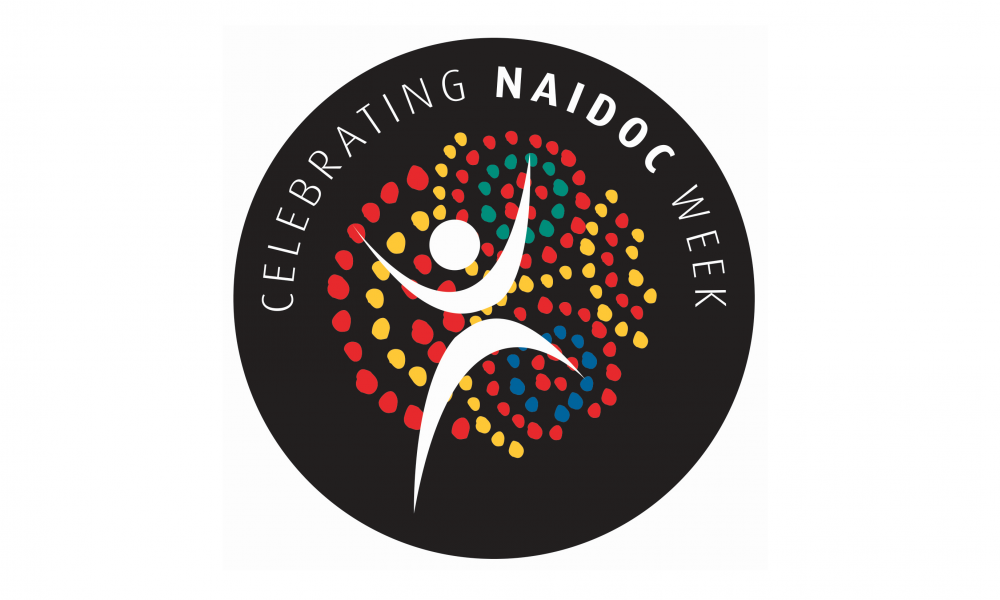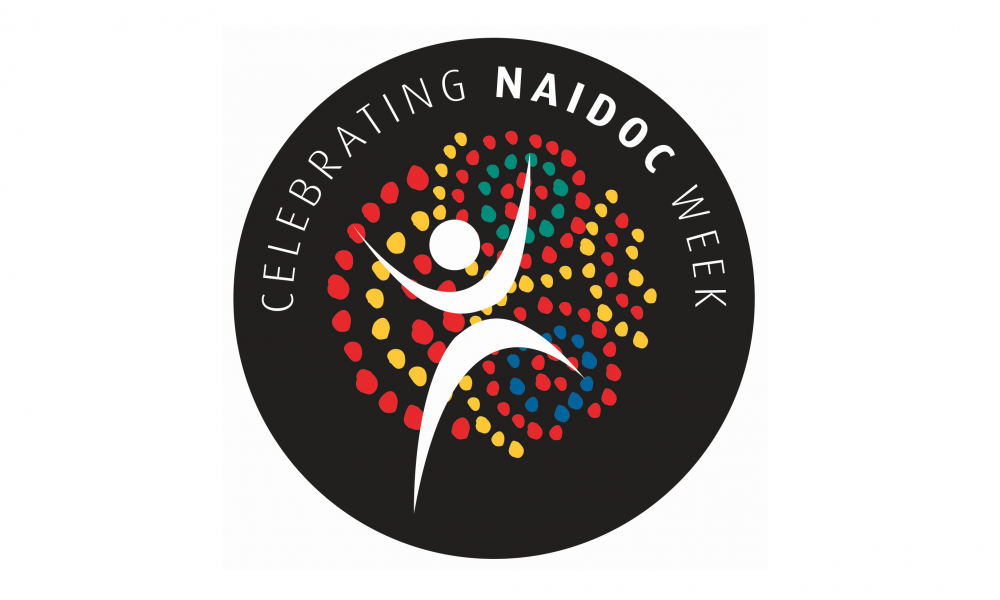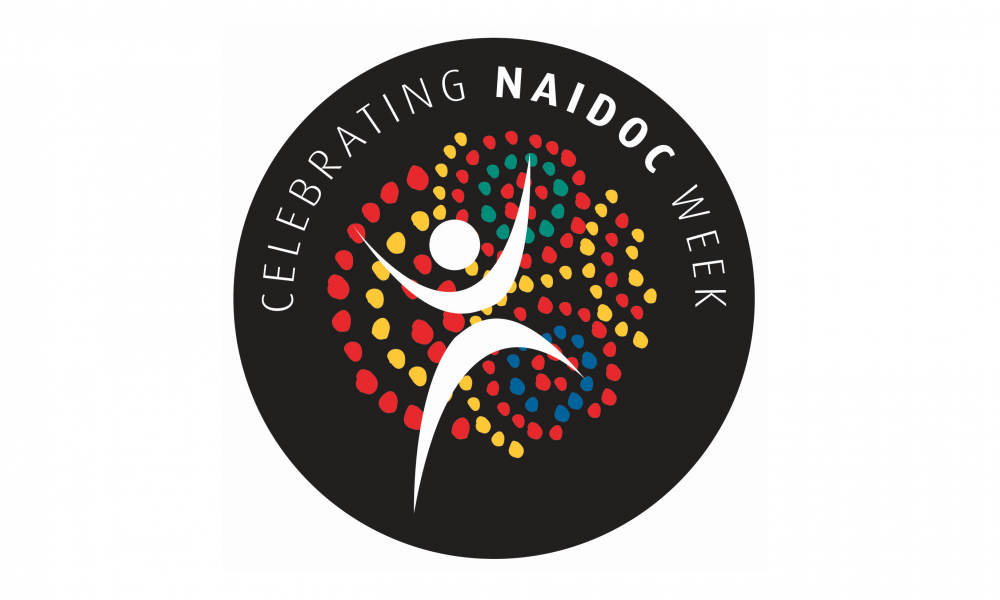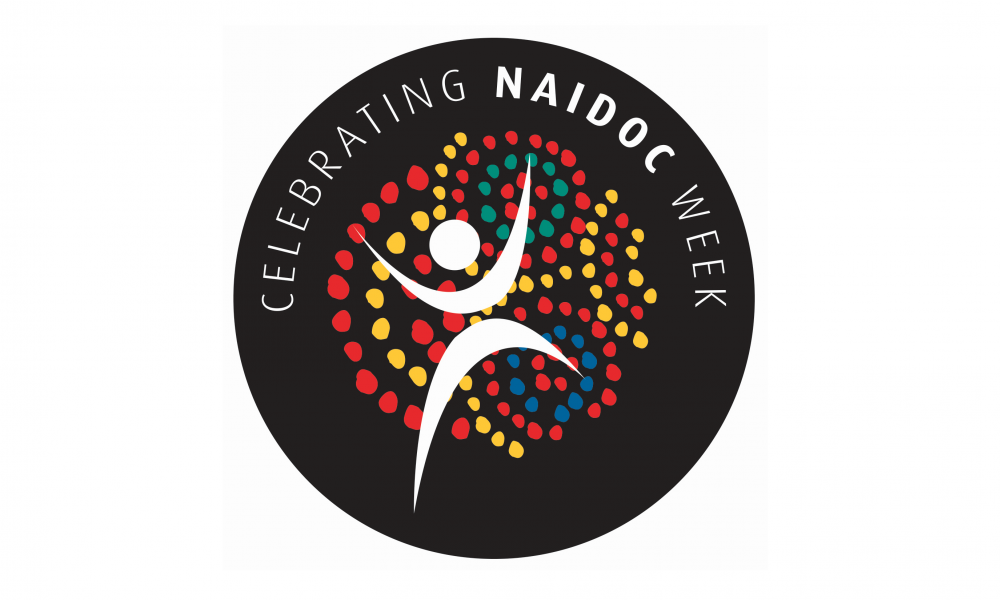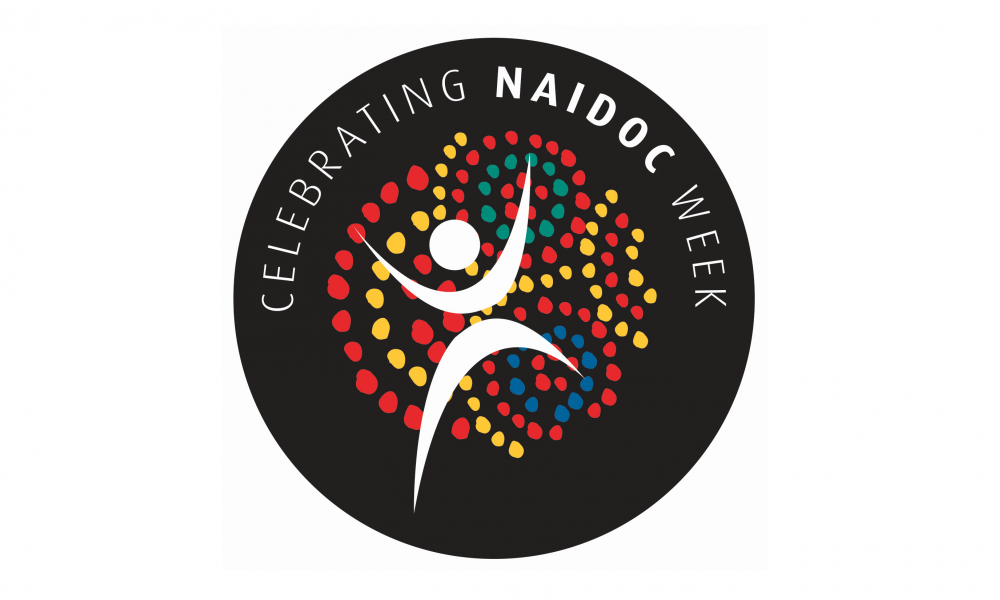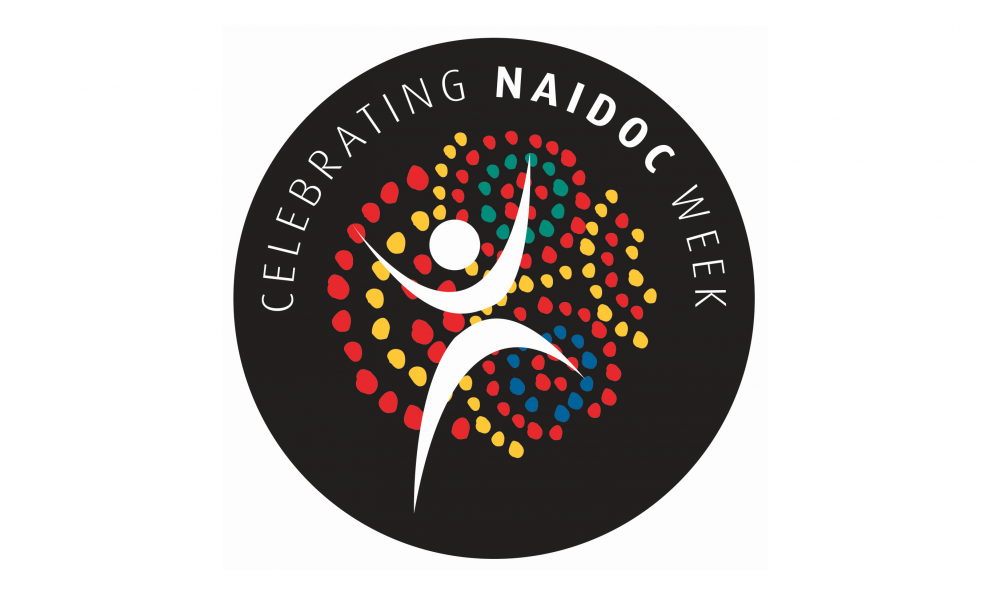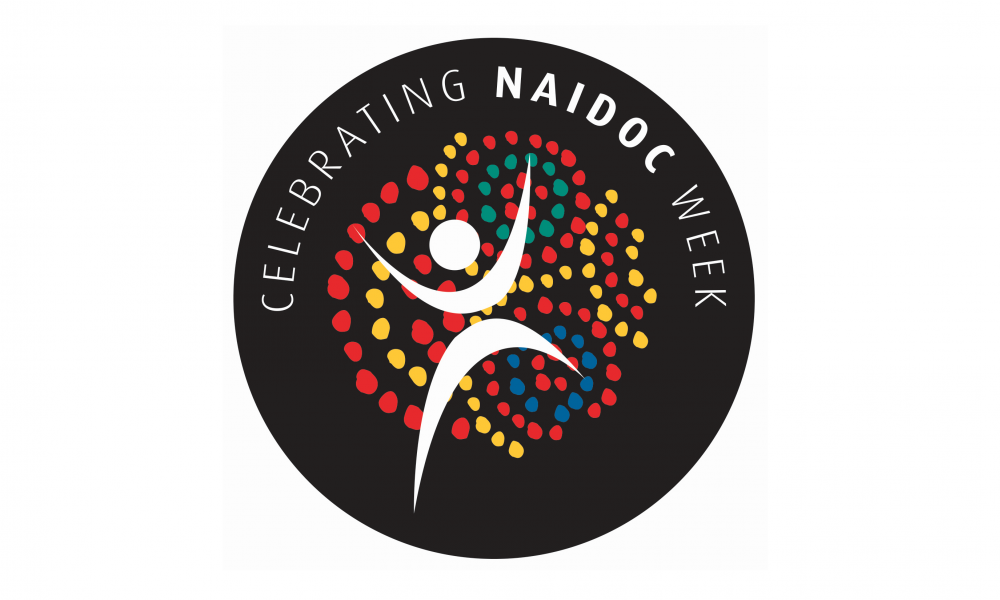The National NAIDOC Awards are announced at a ceremony and ball event in the national focus city. The ceremony is held on the Saturday before the start of NAIDOC Week.
Winner Profiles
2025
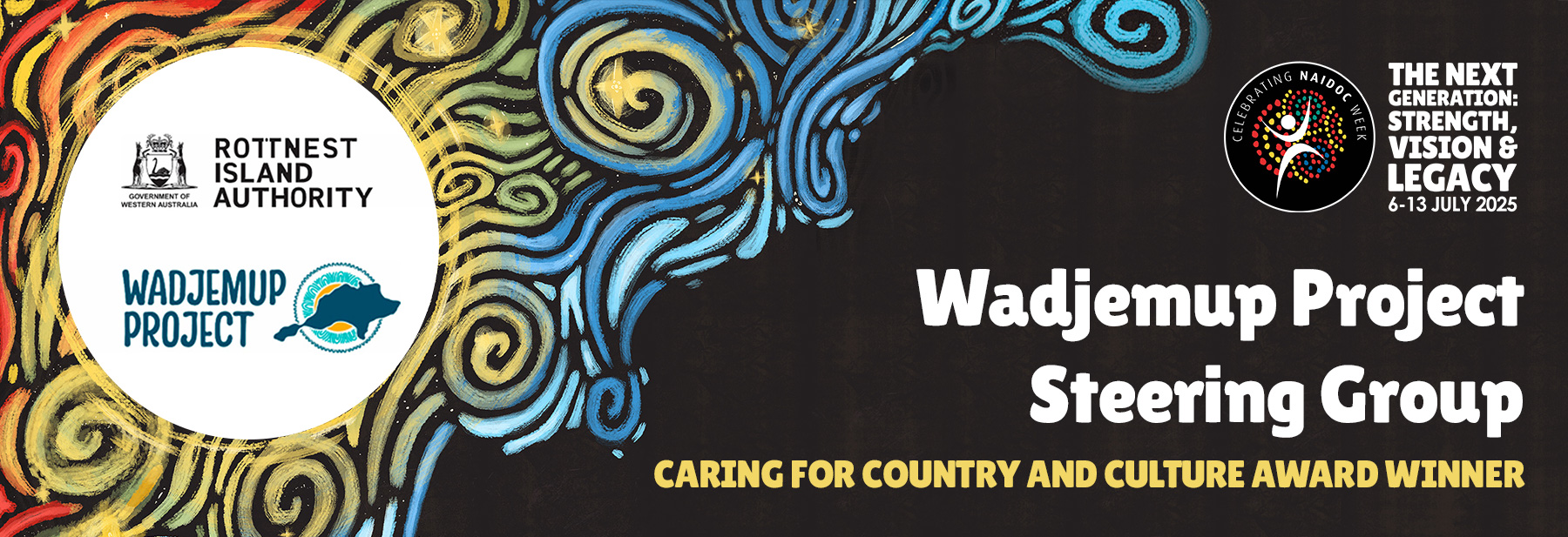
Wadjemup Project Steering Group
The Wadjemup Project Steering Group is an advisory committee for Stage Two of the Wadjemup Project. Members include Mr Farley Garlett, Mr Neville Collard, Mr Herbert Bropho, Mrs Glenys Yarran, Ms Sandra Harben and Ms Karen Jacobs.
The Wadjemup Project is an historic project to reconcile the history of Aboriginal people’s imprisonment on Wadjemup between 1838 and 1931. The Project is one of the first large-scale and genuine acts of recognition of the impact of colonisation on Aboriginal people.
The Steering Group was elected by Whadjuk Elders to leads Stage Two which involves statewide consultation for the delivery of the truth-telling and ceremony strategies; the Quod conservation and future use strategy; and memorialisation of the Wadjemup Aboriginal Burial Ground.
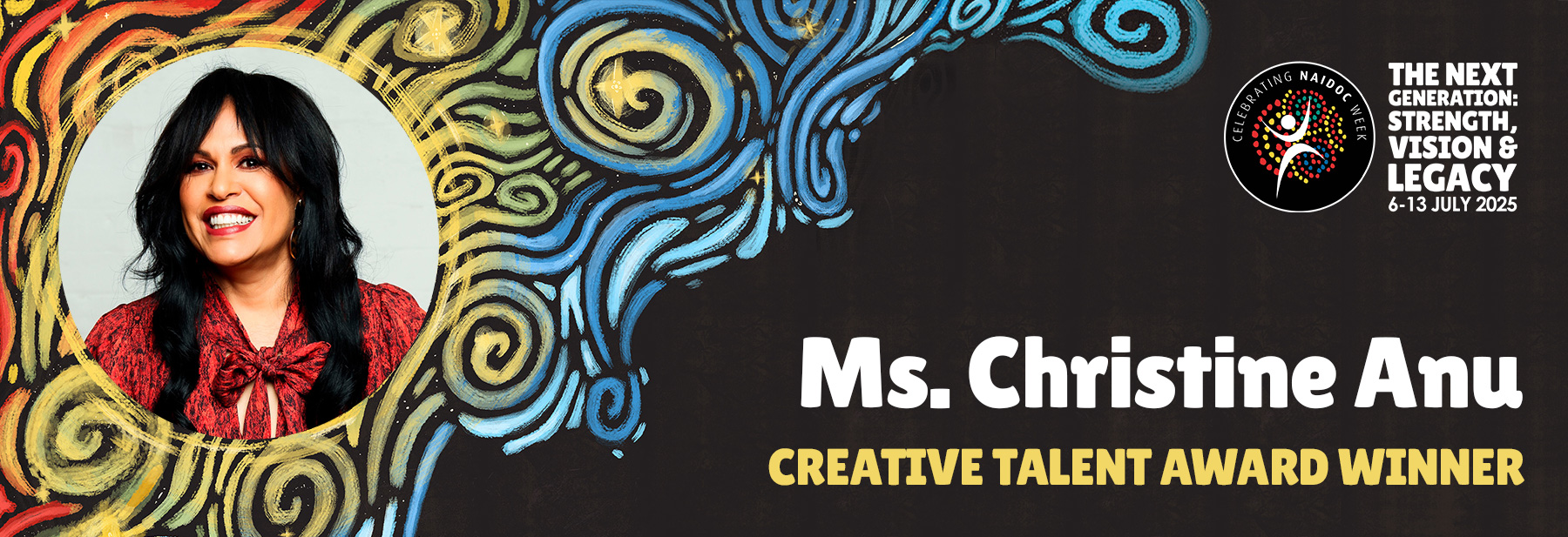
Ms. Christine Anu
Christine Anu, a proud Torres Strait Islander, is one of Australia’s most celebrated performers. A multi-ARIA and Deadly Award winner, she’s best known for her iconic rendition of “My Island Home,” which became a cultural anthem and was featured at the 2000 Sydney Olympics.
Christine began her career at NAISDA, later performing with Bangarra and starring in major musicals and films like Moulin Rouge! and The Matrix Reloaded. In 2024, she released Waku – Minaral A Minalay, her first original album in 20 years. In 2025, she stars as Hermes in the Australian premiere of Hadestown.
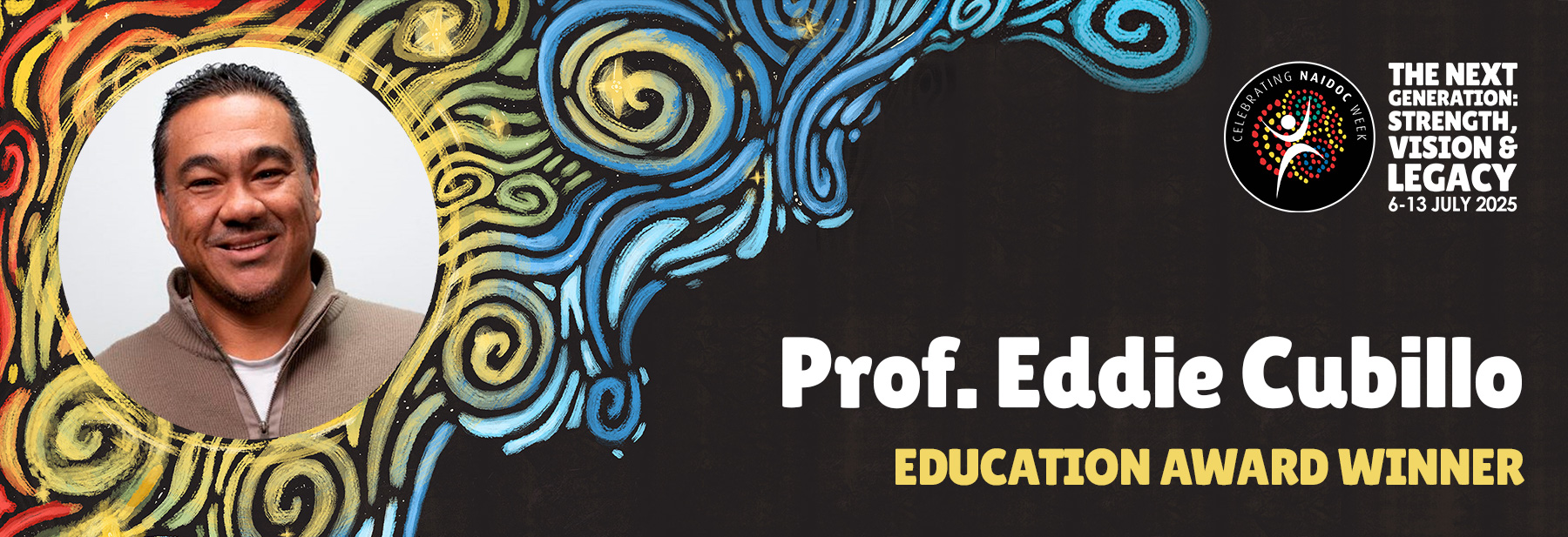
Prof. Eddie Cubillo
Professor Eddie Cubillo is a Larrakia, Wadjigan, and Central Arrernte man from the Northern Territory and a leading advocate for Indigenous justice. He has served in key roles including Anti-Discrimination Commissioner of the NT, Executive Officer of NATSILS, and Director of Community Engagement for the NT Royal Commission.
A PhD holder, he was Associate Dean (Indigenous Programs) at Melbourne Law School and Director of its Indigenous Law and Justice Hub. Now Director of the Mabo Centre, he continues to champion legal reform and self-determination. Eddie is also a proud father and grandfather, grounded in community and culture.
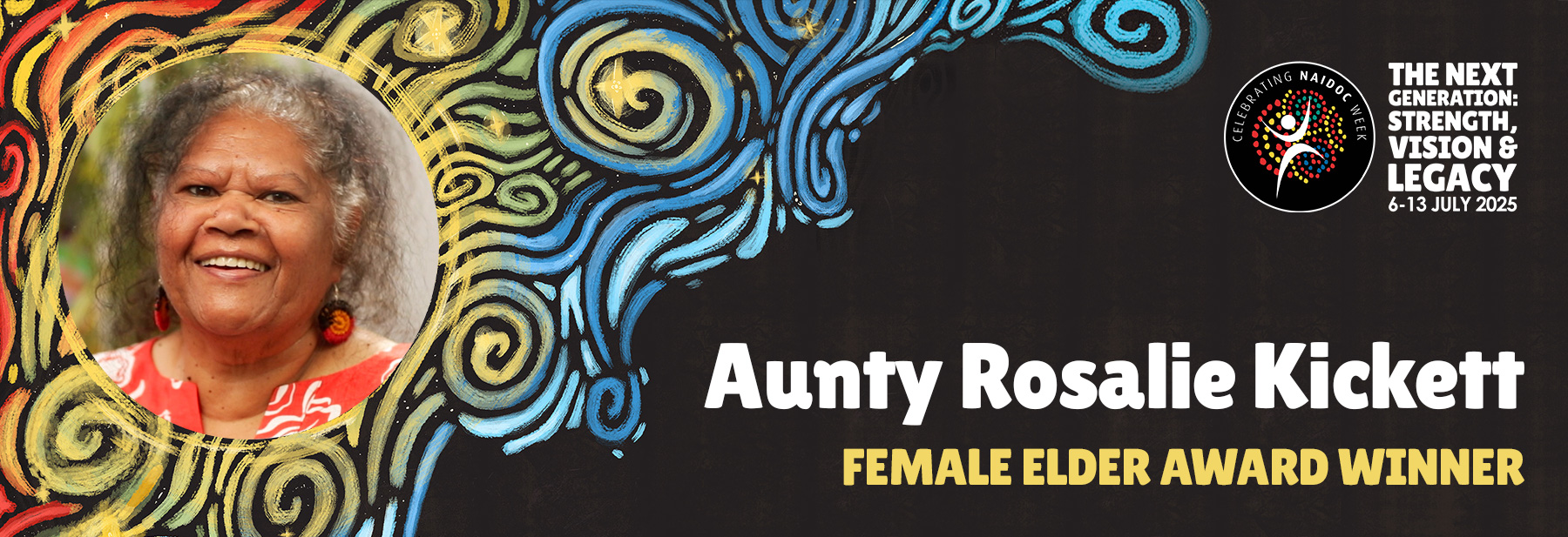
Aunty Rosalie Kickett
In the heart of Acacia Prison, an incredible Elder is changing lives. Aunty Rosalie Kickett, a proud Wilman, Beelya, Ballardong, Menang, Bibbulmen Nyoongar Nation Yok, who has dedicated her life to empowering Aboriginal people, most recently incarcerated Aboriginal men.
With her extensive experience and an associate degree in mental health and counselling, Aunty Rosalie travels across Australia, delivering critical training on Aboriginal mental health and suicide prevention. But her impact doesn't stop there, As a Lifeline Australia National First Nations Family and Domestic Violence Subject Matter Expert, she ensures that women in our communities are safe and supported. For over 40 years, Aunty Rosalie has been a beacon of hope, fostering resilience and connection among our most vulnerable.
She has an unwavering commitment to creating safer communities.
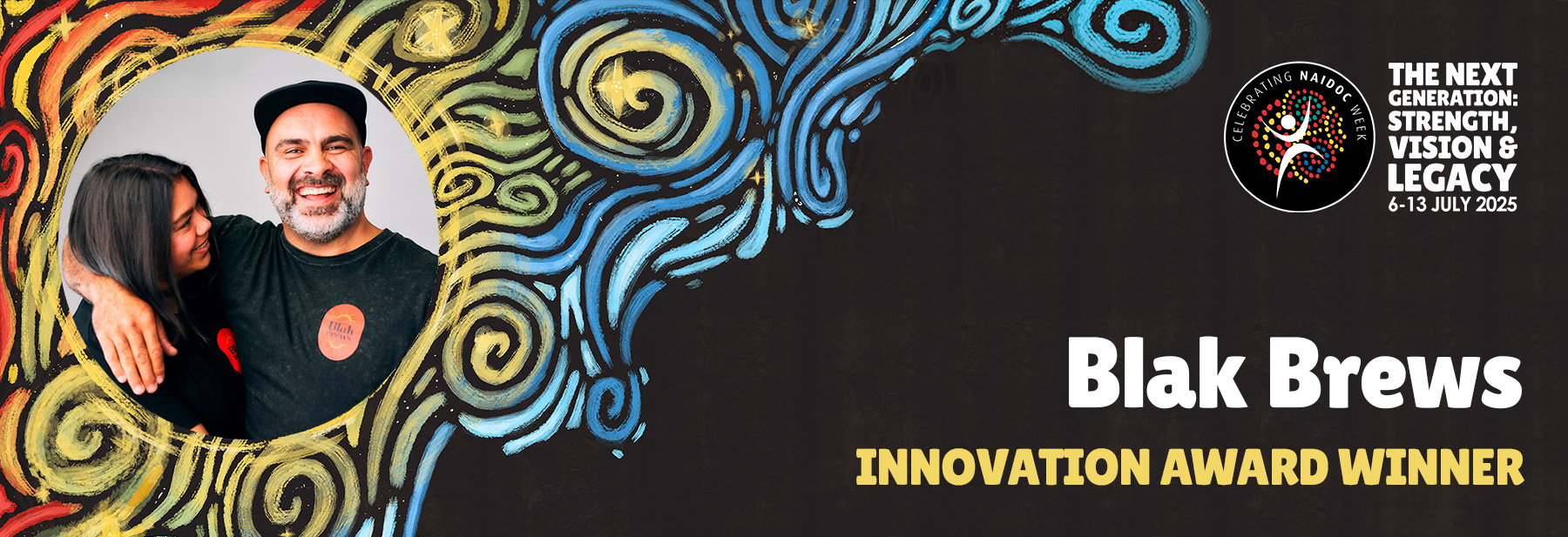
Blak Brews
Blak Brews is a 100% Indigenous-owned Australian tea and coffee company founded by husband-and-wife duo Troy and Cerisa Benjamin. Based in Geelong, we’re flipping the script on what tea can be—sourcing the highest quality organic native ingredients to craft blends that are vibrant, wild, medicinal, and seriously good for you.
Since winning Gordon Ramsay’s Food Stars, Blak Brews has exploded into the spotlight globally, whilst receiving the mentorship of Gordon Ramsay himself. We’re fast becoming one of the most sought-after tea brands in the food and beverage space, proudly breaking old stereotypes and sparking a movement. Our mission? Work with good people, be good people, and create something all Australians can be proud to share with the world.
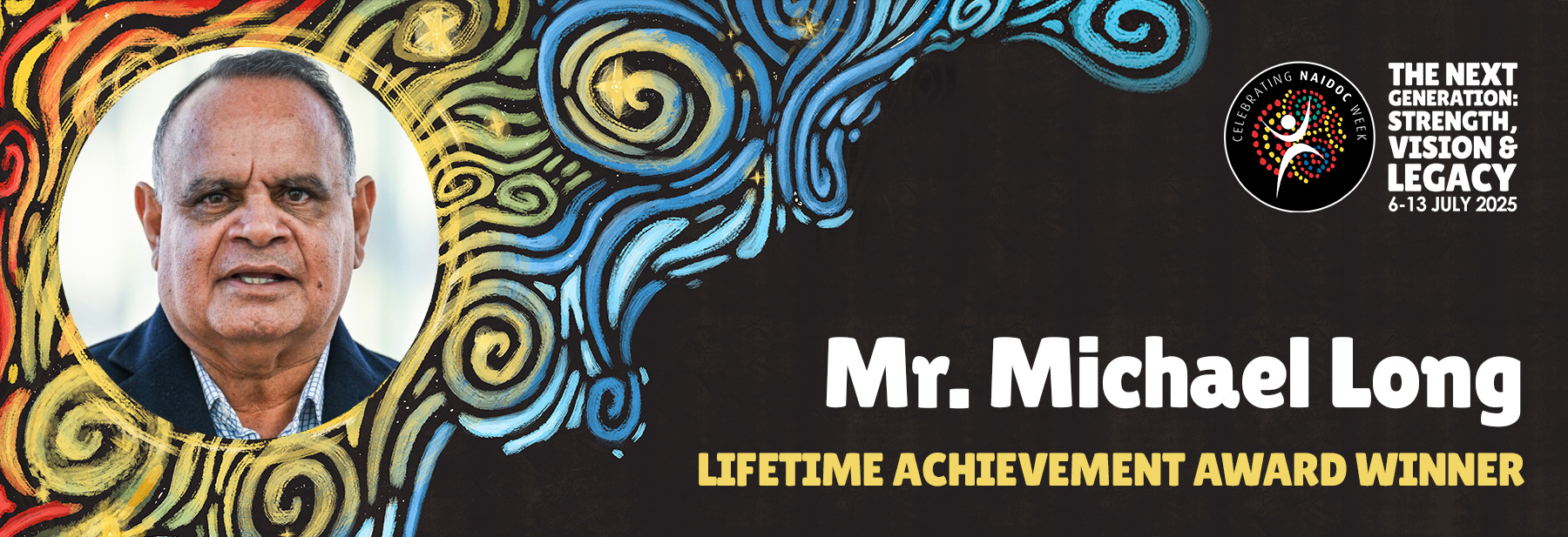
Mr. Michael Long
Mr. Michael Long, is a proud Anmatjere and Marranunggu man, born and raised in Darwin, Northern Territory. A descendant of Stolen Generation parents, he maintains deep ties to the land, waters and culture of the Tiwi Islands. Michael’s inherited sense of duty, pride, purpose for family kinship and community would later guide him through the biggest moments of his AFL career — and his life.
In 1995, Michael made history by being the first AFL player to formally lodge a complaint after being racially vilified during a game. He refused to stay silent. His stand sparked widespread public debate and directly led to the introduction of the AFL’s racial vilification code.
In 2004, frustrated by continued government inaction on Indigenous issues, Michael walked from Melbourne to Canberra, seeking an audience with then Prime Minister John Howard asking ‘where was the love’ for Aboriginal and Torres Strait Islander peoples. That act of leadership inspired the birth of The Long Walk — a national movement for reconciliation, education, action and unity.
Michael is a lifelong servant of his people and his country. He doesn’t speak for attention or applause. He speaks because he must — and because too many still can’t. His leadership is rooted in humility, cultural strength, and unwavering commitment. He builds bridges where others see barriers. He walks alongside his people, not ahead of them. And he reminds all Australians that reconciliation is a journey we must take together.
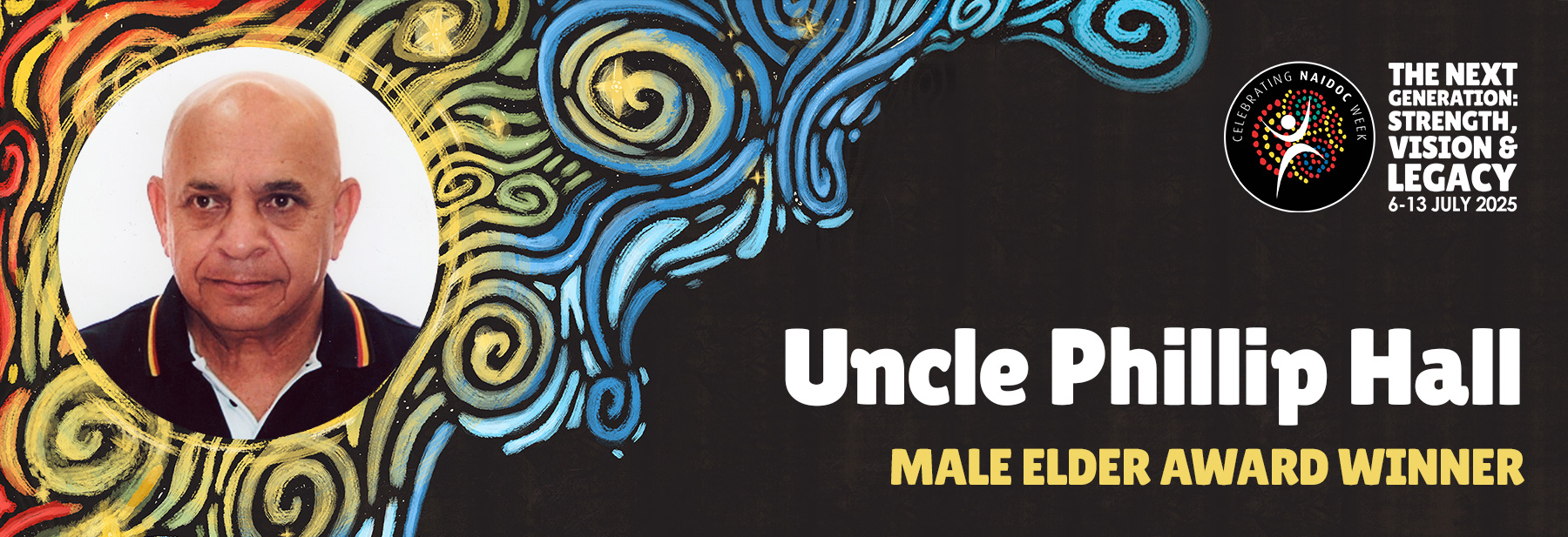
Uncle Harry Phillip Hall
Proud Gomeroi and Euahlayi man Harry Phillip Hall, born in a segregated blacks only labour ward at Walgett District Hospital on 18 December 1946. Phillip was raised on a riverbank with no running water, sewerage, or electricity.
Phillip is the last remaining survivor from Walgett that assisted the Freedom Ride to overcome Racism that existed in the Walgett Aboriginal Community. This was a very important event that changed the course of history and gave the homeland of the Gomeroi and Euahlayi Peoples an opportunity for them to move on from the burden of Racial Discrimination. The same outcome was achieved by the students in other highly populated Aboriginal areas throughout NSW.
His employment in Indigenous affairs expands over 60 years, including his community and consultancy work, New South Wales Aboriginal Lands Trust (conduct state-wide meetings regarding Green Paper on NSW Aboriginal Land Rights Act), Advisor for the late Charlie Perkins, Coordination and the staging of the NSW Annual Aboriginal Rugby League Knockout Carnival (Koori Knockout) for the past 40 years and Coordination of the Survival Day concert for a number of years….just to name a few.
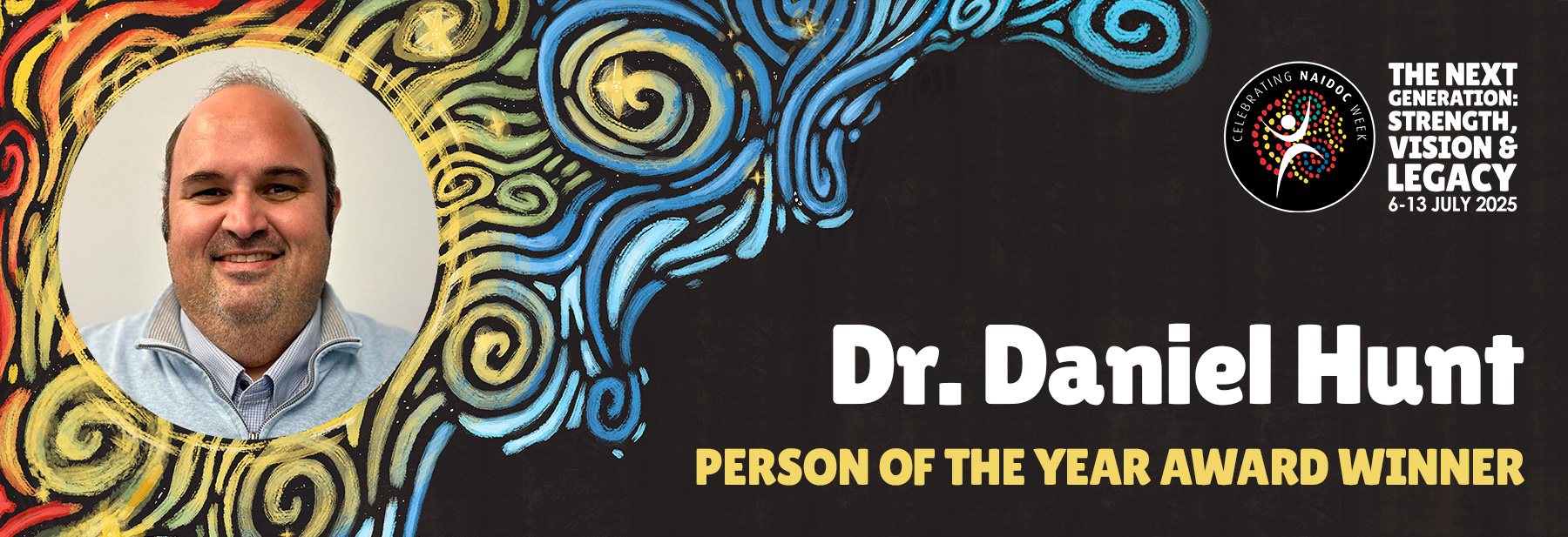
Dr. Daniel Hunt
Dr. Daniel Hunt, a Jaru and Indjibarndi man, is both a General Practitioner and Dentist. He has extensive experience in the Aboriginal Community Controlled Health Organisation sector, served as Dentist, Deputy Medical Director, and Acting Chief Executive Officer.
Dr. Hunt is passionate about healthcare for priority populations and clinical governance. He is the Deputy Chair of the Blood Borne Viruses and Sexual Transmitted Infection Advisory Committee for Western Australia, stemming from an interest managing the Australian Syphilis epidemic. In 2022, he was awarded General Practitioner in Training of the Year for WA and in 2024, Indigenous Doctor of the Year.
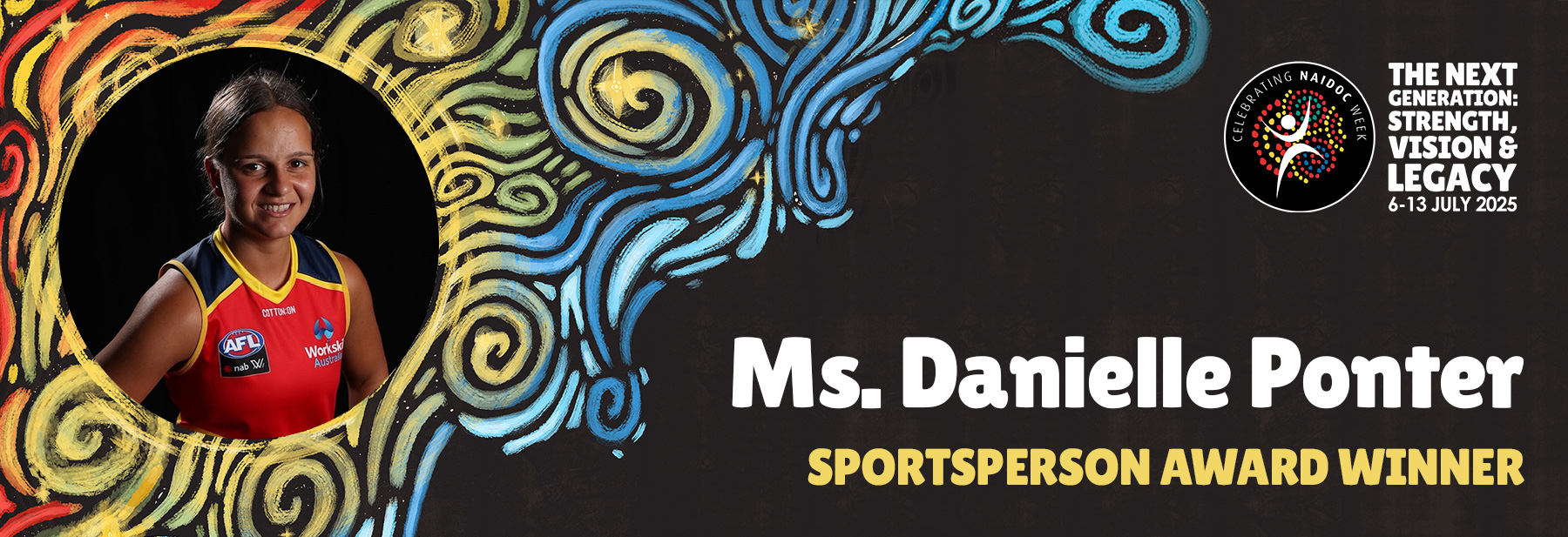
Danielle Ponter
Marranunggu and Anmatjere woman Danielle Ponter was born and raised in Darwin, Northern Territory. Coming from the well-known Long-Rioli footballing family, she began playing for St Mary’s Football Club at age 11 in the NTFL’s under-15 girls’ division.
Danielle was drafted by the Adelaide Football Club in 2018 and made her Australian Football League Women’s (AFLW) debut in 2019. She has since become a two-time premiership player and earned All-Australian honours, continuing to grow as a key part of the team.
When she returns home to Darwin, Danielle loves spending time with her family most of all. She also has a deep connection to St Mary’s Football Club — the place where her football journey began. Danielle continues to give back to the club in any way she can. Giving back to her community and helping the next generation of AFLW footballers is something she’s truly passionate about.
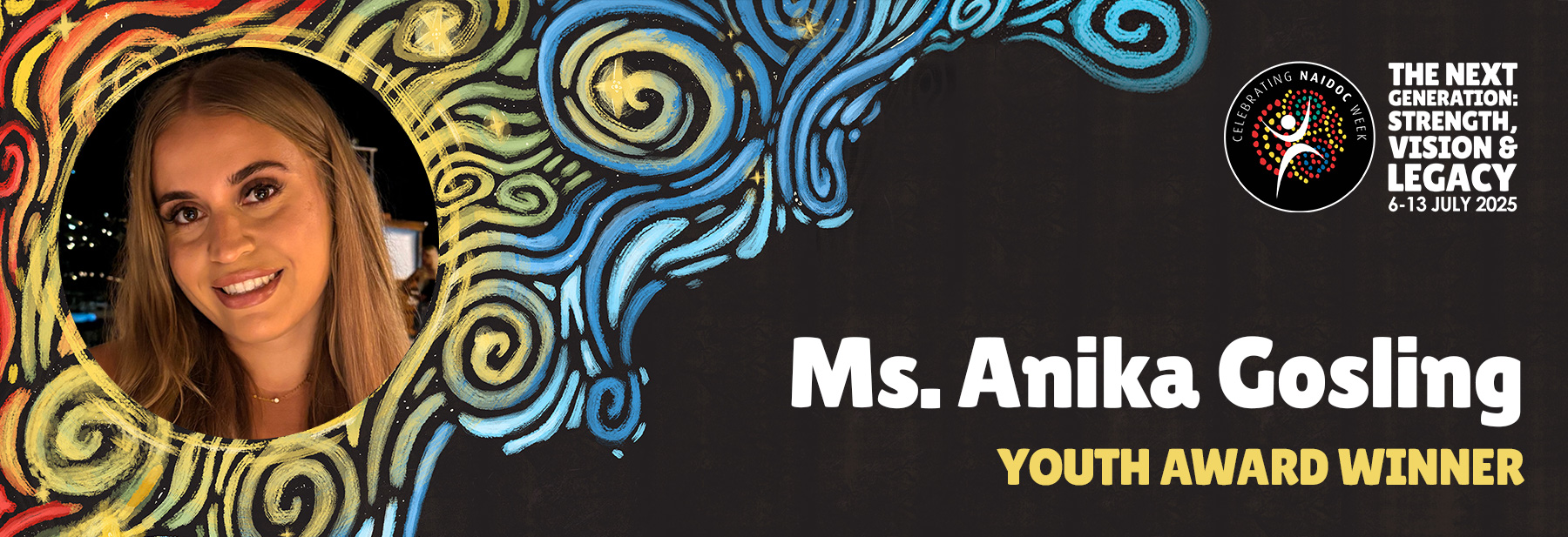
Ms. Anika Gosling
Anika Gosling is a proud Wadjuk Noongar woman from Perth. She holds a Bachelor’s degree, Honours, and a Master’s in Psychology, and currently works as a School Psychologist. In this role, she supports Aboriginal youth, focusing on enhancing their social and emotional wellbeing.
Anika is deeply passionate about youth mental health, believing it lays the foundation for strong, resilient futures. Outside of work, Anika competes in discus and enjoys staying active. Her long-term goal is to establish her own business dedicated to empowering and supporting Aboriginal youth in their life journeys.
2024
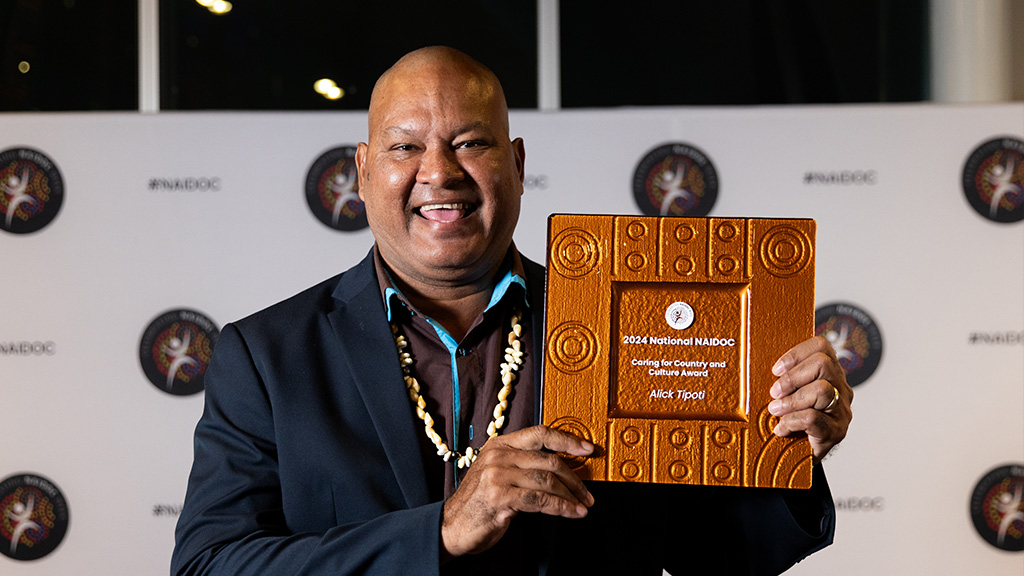
Alick Tipoti
The National NAIDOC Committee are thrilled to announce Alick Tipoti as one of the finalists for Caring for Country and Culture award.
Alick Tipoti is a Koedal (crocodile), a Zugubaw Baydham (seven stars shark constellation and a Kuki Guuba (northwest monsoon wind through his father's side from Badhu. He is a Koedal (crocodile), Thabu (snake) and Dhoeybaw (wild yam) through his mother’s side from Saibai.
He is the head of the Koedal totem through cultural inheritance down the eldest male genealogy line and is known to his people as Zugub meaning spiritual ancestor.
He is a fluent Kala Lagaw Ya language speaker (KLY & KKY dialects), a cultural leader and advisor. Alick is passionate about preserving his native language and reviving cultural traditions through his art and dance, He has been working putting together a language book and aims to have it published by early 2025.
Alick has promoted his culture through art & dance nationally and internally for over 20 years. His artworks are held in major institution collections such as the British Museum, Monaco Oceanographic Museum, Cambridge Museum of Anthropology & Archaeology, National Maritime Museum of Australia, National Art Gallery of Australia and the National Museum of Australia.
Alick has influenced a whole generation of young emerging Torres Strait artists and has significantly revived the art of mask making in the Torres Strait. He believes that art and science are the two most important practices all first nation people should embrace. Art to keep the cultural fire burning and Science to learn about caring for country into the future of global warming and climate change.
His most iconic artwork presentation was when his work was put on the roof top of the Oceanographic Museum of Monaco in 2016. His latest work will be displayed very soon on two Queensland rescue helicopters highlighting environmental themes such as climate change and marine conservation.
Alick brings to life his artwork through cultural Torres Strait songs and dance. the first team he founded (Zugubal Dancers 2012-2016) has performed in many places internationally from the U.K to France to Monaco and throughout the Pacific. His most powerful performance was a traditional ritual in 2015 behind closed doors when the Zugubal dancers performed for Torres Strait turtle shell masks (artefacts) collected in the late nineteenth century and were on display at the Cambridge University/Museum of Anthropology and Archaeology.
In 2021, Alick with his wife and four children established their new dance team called Dhamuw Koedal. in a short time, they have performed in festivals such as the Winds of Zenadth cultural festival (WoZcf23) on Thursday Island, Melanesian Arts & Cultural festival (MACfest23) in Vanuatu, Cook Islands, National Art Gallery of Singapore and Art Gallery of NSW. They have since been booked for a few performance in 2024.
A documentary featuring Alick and HSH Prince Albert II discussing climate change was released in 2020, shedding light on their efforts to care for the environment. This is currently streaming on Stan.
Despite his significant contributions towards caring for country, preservation of language and culture, Alick’s family feels that he is not given the recognition he deserves as a cultural leader and ambassador.
Alick is a very spiritual person and acknowledges that his task as a cultural leader in this life is to continue to collect firwood and placing them in the fire lit by his ancestor and to keep that home cultural fire burning for the next generation of Zenadh Kes Islanders.
Alick believes that, if one wishes to learn their traditional cultural language and is not in a language speaking environment, then one must turn to songs and dance. This will allow them to embrace their culture proper strong especially in the midst of the unknown technology world ahead.
He continues to education the young people to firstly understand their identity by knowing their Totems, Stars, and Winds. From these three elements, they will be more Loud and Proud as a first nation culture.
This is the world of Koey Zugub - Alick Tipoti.
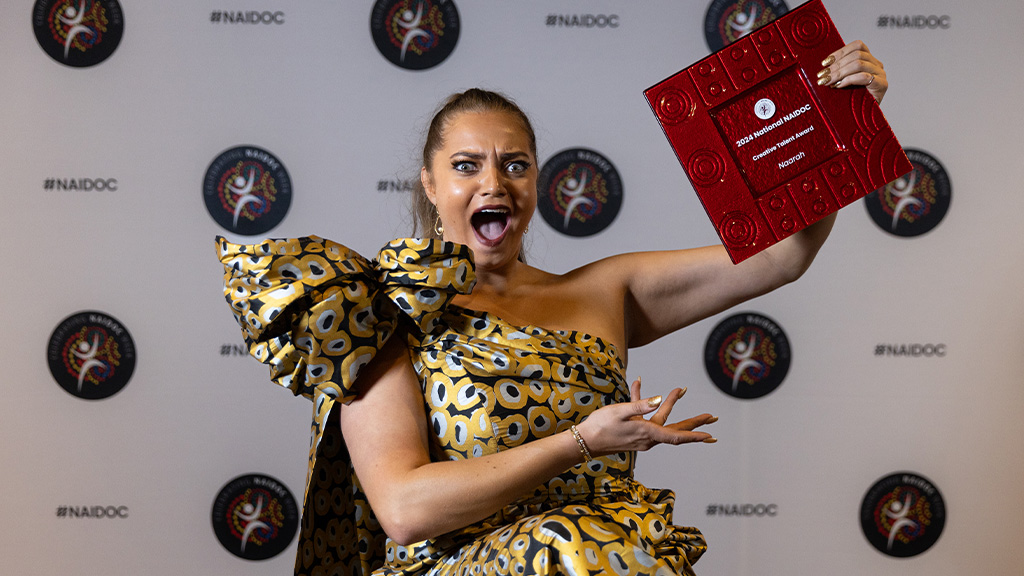
Naarah
Naarah is a Gija woman from the Kimberly who grew up in lutruwita/Tasmania. Naarah is an actor, performer, singer and creative who recently won 2024 Young Australian of the Year in Tasmania.
In 2023 Naarah was successful in her application for a Roberta Sykes Scholarship and Disney Theatrical Scholarship and is now studying a Master of Musical Theatre at the esteemed Royal Academy of Music in London as the first Aboriginal person at the institution.
Naarah uses Instagram and TikTok to spark important conversations about First Nations identity, culture, and representation. She is passionate about changing the entertainment industry and increasing representation in the creative industries, particularly First Nations. She has actively sought to elevate Indigenous representation in the arts by creating opportunities for Indigenous artists and sharing Indigenous stories. Naarah has acted as a mentor for aspiring artists, volunteering to support them in her free time.
Naarah won the 2023 Creative Australia Dreaming Award for the development of her musical theatre project “Broadway but Blak” – a cabaret concert that takes the audience through a journey of musical theatre from a First Nations’ perspective.
Naarah’s future goals are to achieve an outstanding career in screen and theatre, create new works and produce work for young artists, amplify First Nations stories on stages, release an album and be a face for young mob around the country to look up to. Aboriginal and Torres Strait Islander stories, community, songs, theatre and music is at the heart of what Naarah does and why she does it. ‘You can’t be it if you can’t see it’ has always driven her to push and work for change within her industry and she is only just getting started.
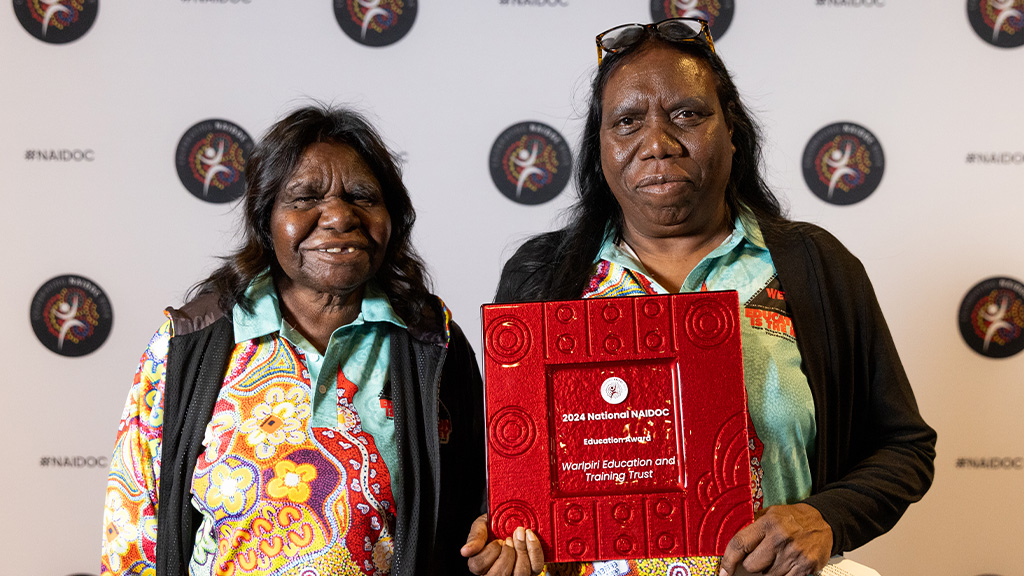
Warlpiri Education and Training Trust
Picture: Masie Kitson Napaljarri and Sharon Anderson Nampijinpa from Warlpiri Education and Training Trust.
Warlpiri teachers and traditional owners of the Newmont Tanami gold mine site set up WETT in 2005 to use royalties from the mine to improve education and training outcomes for yapa (Warlpiri people) in the Tanami Desert. For almost 20 years, WETT has supported a range of partnerships and programs that align with Warlpiri education priorities in Yuendumu, Willowra, Nyirrpi and Lajamanu. So far, WETT has invested more than $53 million to support yapa (Warlpiri people) across its five education program areas:
- Children and families supports Warlpiri governance and staff in early childhood services in Yuendumu and delivers a playgroup in Willowra in partnership with World Vision Australia
- Language and culture in schools supports communities to maintain culture by funding school country visits, Warlpiri language curriculum development and wages for elders to teach in the classroom and on country
- Youth development delivers out-of-school literacy activities for youth in partnership with World Vision Australia and diversionary youth programs through the Central Australia Youth Link Up Service (CAYLUS)
- Secondary school support funds interstate excursions for school students and students away at boarding school
- Learning community centres promote adult learning and literacy for work, life and wellbeing. The centres partner with Batchelor Institute of Indigenous Tertiary Education (BIITE) in Willowra, Nyirrpi and Lajamanu. They serve as classrooms, libraries, internet cafés, cultural archives and service hubs
WETT is a Warlpiri-controlled and governed initiative administered through the Central Land Council (CLC).
The WETT advisory committee comprising four Warlpiri representatives from the four communities, along with one each from Newmont and the CLC, plays a crucial role in designing, planning, and monitoring WETT-funded initiatives. This committee, which meets at least three times a year, advises the directors of the Kurra Aboriginal Corporation, whose members are traditional owners of the mine site. The Kurra directors, guided by this advice, allocate funding to the WETT programs.
Many of the founding members of WETT are still on the WETT advisory committee today and are taking innovative measures to support new and younger members to join the committee and grow into these important roles. WETT's commitment to developing strong governance, careful succession planning, and life-long learning was acknowledged when it received the prestigious Indigenous Governance Award in the non-incorporated category in 2018. In more recent years, WETT has developed an innovative monitoring and evaluation approach, the Yitakimaninjaku, warrirninjaku, payirninjaku manu pina-jarrinjaku (YWPP) ‘Tracking and learning’ program, through which local Warlpiri researches monitor WETT’s programs. The YWPP approach prioritises capturing and amplifying the voices of Warlpiri youth.
WETT’s vision is for Warlpiri people to be strong in their knowledge of culture, country and language, to stand up for Warlpiri communities today and be strong role models for generations to come:
“Our language, culture and decisions will be respected. Our voices will be heard. We will have the same opportunities as everyone else. Our children will be confident, knowledgeable, disciplined, healthy and respected. They will have good roles and jobs, as will the generations to come.”
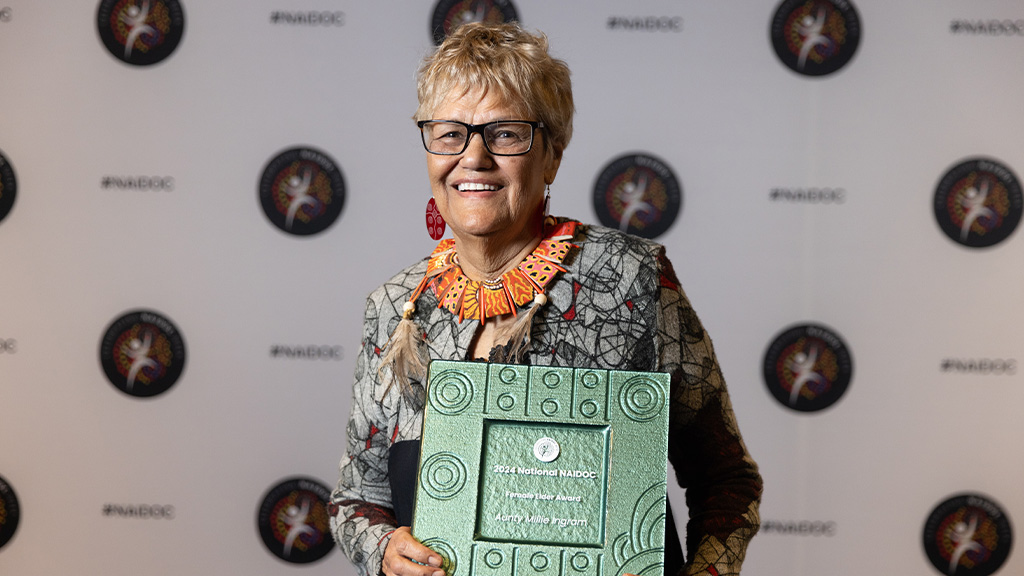
Aunty Millie Ingram
The National NAIDOC Committee are excited to announce Aunty Millie as one of the finalist for Elder award.
Aunty Millie Ingram, a Wiradjuri Elder from Cowra NSW having grown up on Erambie Mission. Moved to Redfern during the 1950s to find work after facing limited opportunities in regional NSW. She began working at a chocolate factory in Redfern, where she also enrolled in night tertiary courses to further her job opportunities.
Aunty Millie worked in community and later joined the Department of Aboriginal Affairs for 13 years, advocating for empowerment and change in areas such as education and land rights. Along with her family, she founded the first Aboriginal Community Controlled early childhood centre, Murawina, and later Wyanga Aboriginal Aged Care program.
Aunty Millie has been a leader in various policy processes and initiatives aimed at supporting Aboriginal communities and self-determination. She played a key role in the inception of the Empowered Communities model, leading to the development of the Jawun program.
Aunty Millie is known for her public engagements, including offering Welcome to Country and speaking at Gough Whitlam's memorial at Sydney Town Hall. At 84 years old, she continues to serve her communities, supporting Elders, youth organisations, and women in business.
A fierce political activist, Aunty Millie campaigned for the YES vote during the referendum and remains dedicated to advancing opportunities for Aboriginal people. She is a living legend who has left a lasting impact on the history of our country.
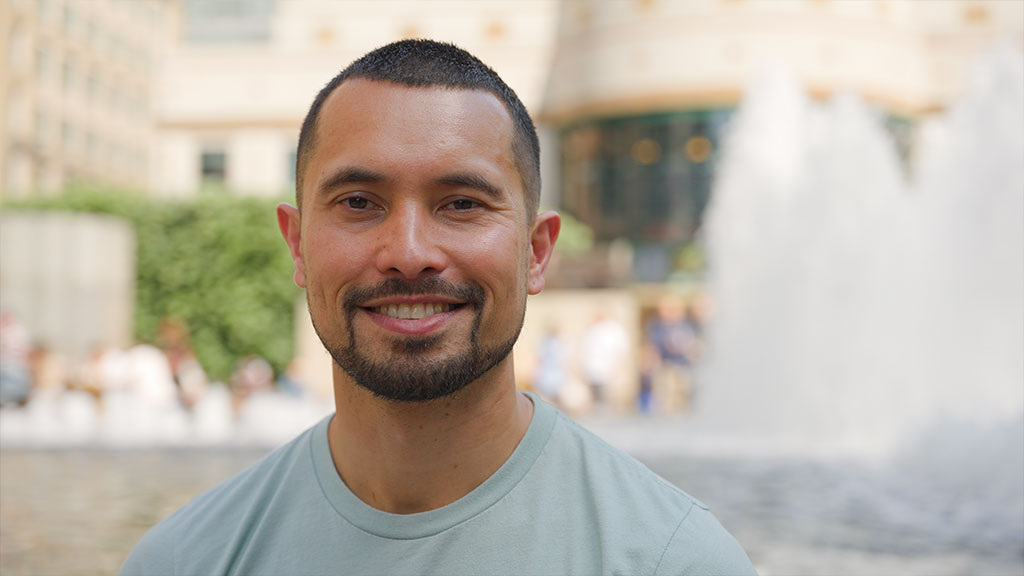
Tui Nolan
A proud Gudjal man, who grew up in Sydney, New South Wales, Tui Nolan has dedicated the past nine years of his career to advancing machine learning models.
Tui completed a Master of Science and a PhD in Statistics at the University of Technology Sydney (UTS). His innovative work in machine-learning has been applied to forecasting housing market trends, predictive economic modelling, improving robotics and satellite data, and enhancing data quality and accuracy.
In 2018, Tui was awarded a Fulbright Future Postdoctoral Scholarship, which enabled him to take on a postdoctoral position at Cornell University in 2019. In 2019 he was also awarded a Roberta Sykes Fellowship.
In 2020, Tui spent three months helping to develop RoboSimian – a limbed robot originally designed to aid recovery operations in disaster zones, but is now being repurposed for space exploration. He was one of the first Australian students to attend NASA’s Jet Propulsion Laboratory under a pilot program to create career pathways for Indigenous science, technology, engineering and maths students.
Most recently, Tui was a research fellow at the University of Cambridge, where he applied his skills in mathematics and his expertise in machine learning and biostatistics to tackle challenging problems relating to COVID-19 and primary immunodeficiency. During this time, Tui worked with a multidisciplinary team of researchers and clinicians to develop and implement data science algorithms that identified the major genetic factors contributing to the severity and recovery from the pandemic, as well as the extreme causes of primary immunodeficiency.
Tui has mentored Aboriginal and Torres Strait Islander students as they transition to university through the Jumbunna Institute for Indigenous Education and Research, the Aboriginal Summer School for Excellence in Technology and Science, Aurora Education Outreach, and the Galuwa Science Experience at UTS.
Tui is currently focusing on diabetes, through his work at Abbott, an international pharmaceutical company, where he is monitoring the accuracy of glucose measurements from a new blood measurement technology that does not require a finger-prick test from diabetes patients. Through his work, Tui is helping people with diabetes to live happier, healthier lives.
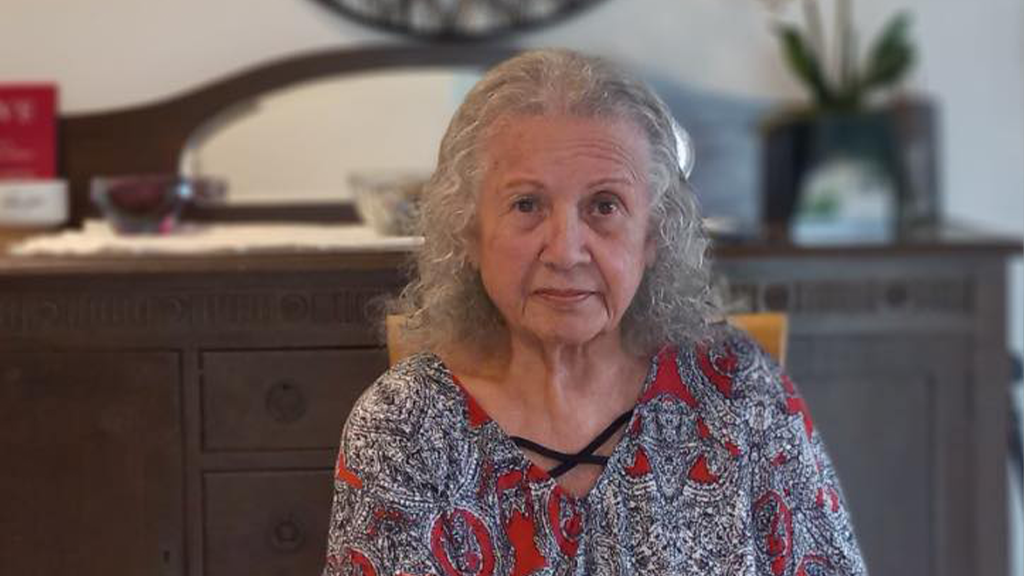
Aunty Dulcie Flower AM
Aunty Dulcie Flower AM was born in Cairns in 1938. Aunty Dulcie’s mother was of the Meriam People of Torres Strait. Aunty Dulcie has left an indelible mark on Australian history through her unwavering dedication to activism, advocacy, and community development.
Aunty Dulcie’s Grandfather was born on Mer (Murray Island) with the family later moving to Erub (Darnley Island). Aunty Dulcie has fond memories of growing up as part of the Torres Strait Community in Cairns and enjoyed the regions multicultural atmosphere. Aunty Dulcie recalls the vibrant pearl and trochus shell industries in Cairns during her youth and how these industries, and those that worked in them, touched the lives of her family.
As the oldest in her family, Aunty Dulcie left school early to join the workforce. Whilst employed in her first role at a timber mill, Aunty Dulcie attended night school, eventually moving into office work and later becoming a registered nurse. Aunty Dulcie relocated to Sydney to advance her career by studying midwifery and working for several years as an operating room nurse.
During this time, Aunty Dulcie was invited by her Aboriginal colleagues to meet community members, leading her to join the Aborigines Progressive Association, led at the time by the late Elder Bert Groves. This led to the Federal Council for the Advancement of Aborigines and Torres Strait Islanders (FCAATSI), for which Aunty Dulcie served as Conference Delegate and eventually General Secretary.
FCAATSI had a broad, progressive focus, campaigning for improved outcomes for First Nations peoples in regard to cultural recognition, industrial equality, health, legal protections, education, housing, clean water, proper waste disposal, and land ownership. FCAATSI fought to end racism and discriminatory legislation, and fought for self-determination. Notably, FCAATSI campaigned for change to the Commonwealth Constitution in 1967, resulting in a successful referendum that recognised First Nations people’s constitutional right to vote and to the provision of Commonwealth Services. This meant that for the first time Aboriginal and Torres Strait Island peoples had the “right to choose”.
Aunty Dulcie was later invited by members of the Redfern community to participate in the planning of a community medical clinic. In collaboration with her community, South Sydney Community Aid, and doctors from Prince Wales Hospital, Aunty Dulcie helped to establish the Aboriginal Medical Service Co-operative (AMS Redfern), a vital community service. Aunty Dulcie has dedicated many years to AMS Redfern, acting as a foundation member and a volunteer, before eventually being elected Director of the AMS Redfern board, a role she continue to hold today. Aunty Dulcie has represented AMS Redfern on panels discussing health issues at all levels. Aunty Dulcie recognises her work with AMS Redfern has having inspired her later work as a Community Educator and a Health Worker Education Program Co-ordinator.
Aunty Dulcie has since connected with international organisations like the World Health Organisation (WHO) and the United Nations (UN). In attending the WHO’s workshop on Globalisation and Diabetes at Yale University, Aunty Dulcie was able to discuss health issues with a team of researchers from Sub-Saharan Nations, Vietnam, Mexico, USA, and Australia. Aunty Dulcie acted as a delegate for the UN’s End of Decade International Women’s Conference in Kenya.
Aunty Dulcie has acted in several high profile roles, including her appointment to the Torres Strait Advisory Board of ATSIC, as Regional Councillor of Sydney Regional Council, as a member of the NSW Torres Strait Islander Organisation, and as a member of the inaugural Board of Bangarra.
Throughout her career Aunty Dulcie has maintained a connection to her roots in health care and has been a member of Carers New South Wales, an honorary Fellow of the Australian College of Nursing and a foundation member of the Congress of Aboriginal and Torres Strait Island Nurses and Midwives. Aunty Dulcie is currently involved in a research project on Aboriginal Women Activists in Redfern.
Aunty Dulcie Flower’s contributions have been recognised on a national scale, culminating in her appointment as a Member of the Order of Australia (AM) in 2019 for her significant service to the Indigenous community and her pivotal role in the 1967 Referendum Campaign.
Amongst her many achievements, Aunty Dulcie recognises the importance of her family. Aunty Dulcie has two children, 5 grandchildren and 5 great grandchildren, who she couldn’t be prouder of. Aunty Dulcie also acknowledges the people who have impacted her throughout her journey, stating:
“So I have met the most amazing people, mentored by the late, with respect, Faith Bandler, Pastor Doug Nicholls, Joe McGinness, Bert Groves, PeRl Gibbs, Aunt Geraldine Briggs, Gladys Elphick, Winnie Branson, and with colleagues including Joyce Clague, Evelyn Scott, Bruce MacGuiness, Ken Brindle, Isobel Kent, Sally Goold, Ray Peckham, Naomi Mayers and Sol Bellear.
My Torres Strait family has also mentored me and I am blessed to have the privilege of working with Aboriginal People and also with Torres Strait Islanders to gain justice and equality in this country. An important aspect has been encouraging non-Aboriginal students and professionals to work with our peoples not for them, in the ongoing struggles to achieve equality in access to the necessities of life, cultural acknowledgement and respect, freedom from racism, optimum standards of housing, health, education, clean water supply, and land ownership.”
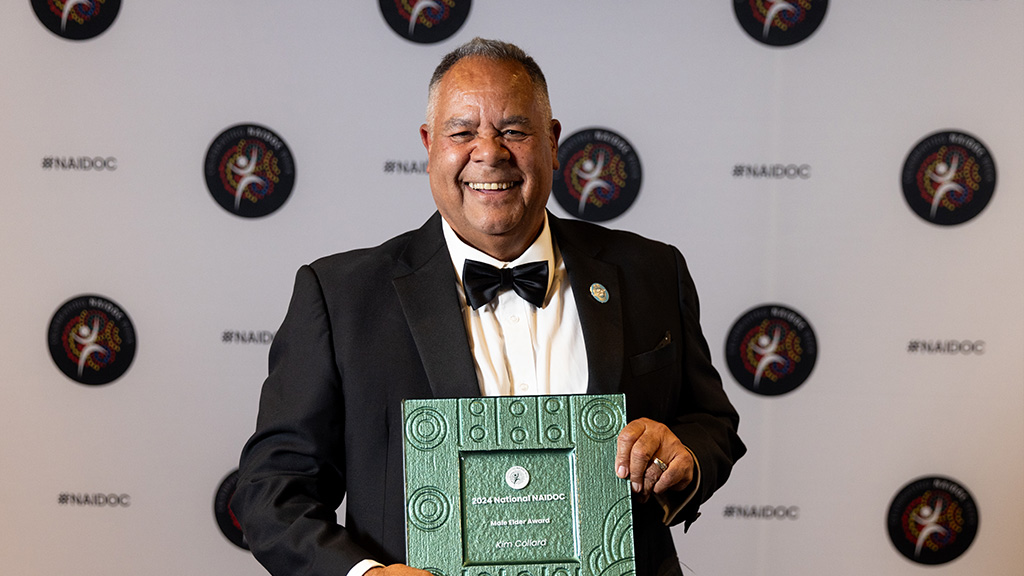
Mr Kim Collard – Balladong/Wadjuk Elder of the Noongar Nation
Mr Kim Collard – Balladong/Wadjuk Elder of the Noongar Nation has had a significant impact on indigenous communities and wider Western Australian society alike. Throughout the years, Kim has devoted himself to his professional and philanthropic endeavours, touching the lives of many in the process.
After working as a boilermaker, then as a Western Australia police officer, Kim joined academia and spent 10 years at Curtin University. Kim went on to establish two of Australia's largest Indigenous-owned businesses, Kulbardi and Kooya Australia Fleet Services, which have flourished commercially for the past decade. Through his businesses, Kulbardi and Kooya, Kim has created job opportunities for both Aboriginal and non-Aboriginal people.
In addition to these impressive academic and entrepreneurial feats, Kim has always been committed to giving back to the community. In 2014 Kim founded The Bibbulmun Fund, a unique Indigenous-led philanthropic initiative designed to facilitate positive change by Aboriginal people, for Aboriginal people. The Bibbulmun Fund has raised over $1.4 million, supporting 19 charitable organisations across Australia, focusing on Aboriginal education, leadership, entrepreneurship, work readiness programs, youth diversionary programs, elder's camps, disaster relief, and programs encouraging Aboriginal self-determination.
Mr Kim Collard – Balladong/Wadjuk Elder of the Noongar Nation is an inspiration to his community, whose work is instrumental in providing opportunities for First Nations peoples to uplift themselves and their communities.
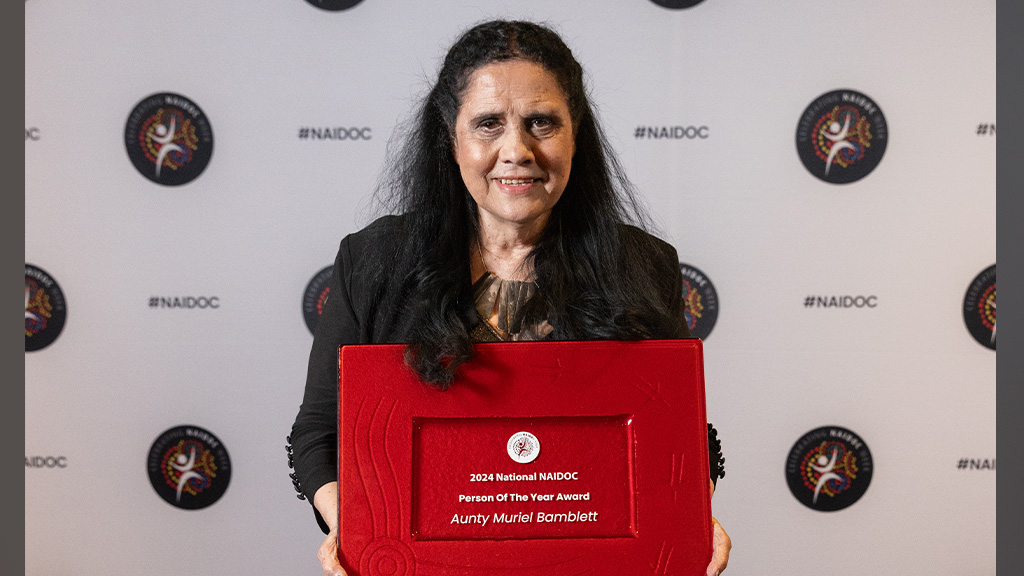
Aunty Muriel Bamblett
The National NAIDOC committee are thrilled to announce Aunty Muriel Bamblett as a finalist for the Person Award category.
Aunty Muriel Bamblett is a proud Yorta Yorta, Dja Dja Wurrung, Taungurung, Boon Wurrung Elder.
As CEO of the Victorian Aboriginal Child Care Agency (VACCA) since 1999, Aunty Muriel has advocated and advanced the interests of Aboriginal children and families, and has embedded culture in everything VACCA does to build resilience, self esteem, connection and belonging.
Aunty Muriel has expanded the breadth and depth of services for Aboriginal children and young people in need. The organisation has grown significantly since 1999 with over 1000 employees and over 80 programs and is the leading one of its type in Australia.
Under Aunty Muriel’s leadership, VACCA has advocated strongly for the right of Aboriginal children to be raised in his/her own culture and the importance and value of family, extended family, kinship networks, culture and community in raising or ‘growing up’ Aboriginal children.
Aunty Muriel’s impactful leadership has led to significant policy and legislative reforms. She has lobbied successfully for major changes to Victorian laws so that it now includes - recognition of connection to culture and community as critical for the best interests of Aboriginal children; decision making processes for Aboriginal children which include self-determination and the Aboriginal child placement principle; and the requirement for cultural support plans for Aboriginal children in out-of-home care.
Aunty Muriel pushed for the culmination of the Section 18 Aboriginal Children in Aboriginal Care Program, which enables the Principal Officer of VACCA (CEO) to perform functions and powers of the Secretary for authorised children. It is due to Aunty Muriel’s drive that Aboriginal Children in Aboriginal Care (Nugel) has been such a success and is the first time in Australia that State power has been transferred back to the Aboriginal community. As the child’s ‘Aboriginal guardian’ Aunty Muriel is involved with the child and makes sure they are connected to their culture, community and country, that they have strong Aboriginal role models, that they are proud and strong in their Aboriginal identity and that they know their family, their parents, their siblings and their kin, as culture starts with family, community and connection.
Aunty Muriel is a strong advocate for voice for her community and never sways in her commitment to improve outcomes for children and families. As Chairperson of the Secretariat of National Aboriginal and Islander Child Care (SNAICC), the peak Australian agency for Indigenous child and family services, she has championed new approaches to federal engagement in the Aboriginal children’s agenda and supported Aboriginal communities across the country to develop and deliver innovative and effective child and family support policies and programs. Under her visionary leadership more and more Aboriginal communities picked up the challenging task of trying to ensure that their children and grandchildren were able to grow up safe, proud, confident Aboriginal people.
Aunty Muriel is actively involved on numerous State and National committees including the:
- Coalition of Peaks Joint Council on Closing the Gap,
- National Aboriginal and Torres Strait Islander Family Safety Committee,
- Aboriginal Justice Forum,
- Aboriginal Children’s Forum
- Elders Voice Standing Group for the First Nations Treaty Assembly
- National Aboriginal and Torres Strait Islander Family and Sexual Violence Advisory Group
- Aboriginal Community Elders Service, to name a few.
Recognized for her significant contributions, Aunty Muriel received the Officer of the Order of Australia (AO) in 2019 for distinguished service to the Indigenous community in Victoria as an advocate for the self-determination and cultural rights of children.
Aunty Muriel has been inducted into the Victorian Indigenous Honour Roll and the Victorian Honour Roll of Women and received the Women’s Electoral Lobby Inaugural Vida Goldstein Award.
Academic institutions have also recognised Aunty Muriel’s work. In 2009 La Trobe University’s Faculty of Health Sciences appointed Aunty Muriel as an Adjunct Professor in the School of Social Work and Social Policy. In 2017 the University of Sydney awarded Aunty Muriel the Doctor of Letters in Social Work, honouring her leadership in Indigenous welfare and affairs. The award recognised her efforts to bring about welfare legislation in Victoria with a fundamental commitment to the rights of Aboriginal and Torres Strait Islander children, to their families, community, culture, and identity.
Aunty Muriel is an inspiring person, truly committed to the welfare of Aboriginal people. Through her tireless efforts, she is shaping a brighter future for Aboriginal families in Victoria, inspiring the next generation of proud, strong leaders to continue the legacy of advocacy and empowerment.
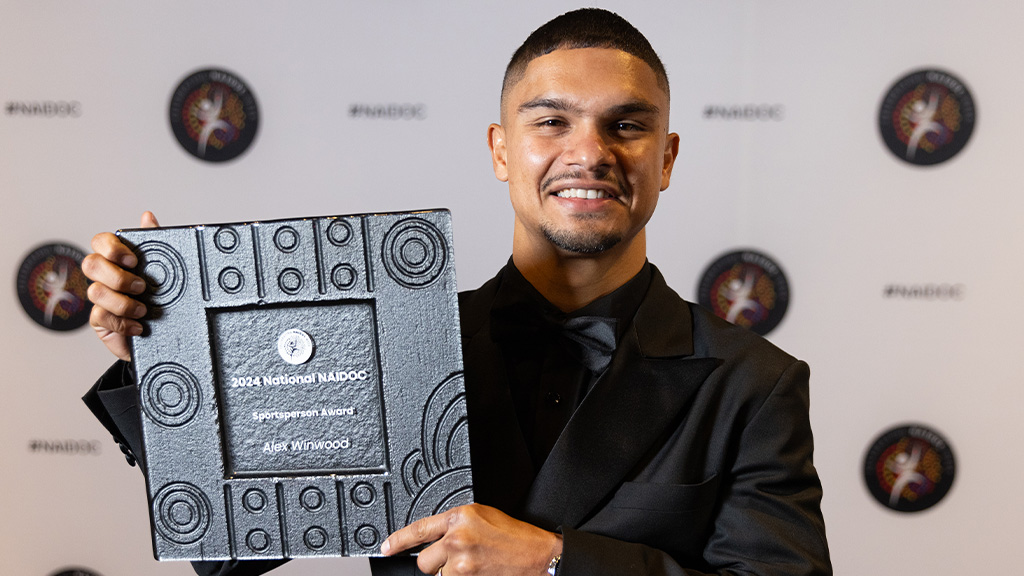
Alex Winwood
Mr Alex Winwood is a proud Noongar man, born in Bunbury Western Australia. Alex is a world class boxer, having ranked high in several international boxing championships throughout his career.
Starting in 2013, Alex’s has already had several impressive highlights in his boxing career. Alex participated in the 2020 Olympic Games in Tokyo, the 2022 Commonwealth Games in Birmingham, and in multiple world championships. Alex is currently ranked 2nd in the world by the World Boxing Council, 5th by the International Boxing Federation, and 8th by the World Boxing Organisation. Alex is positioned to become the fastest Australian man to achieve the title of World Champion.
As well as being an exemplary sportsperson, Alex has become a role model for his community, often working with local schools to inspire students to pursue their interests. Alex’s deep connection to culture and pride in his heritage is communicated in everything he does.
Alex is an ambitious, high-achieving person who is a pride to his community.
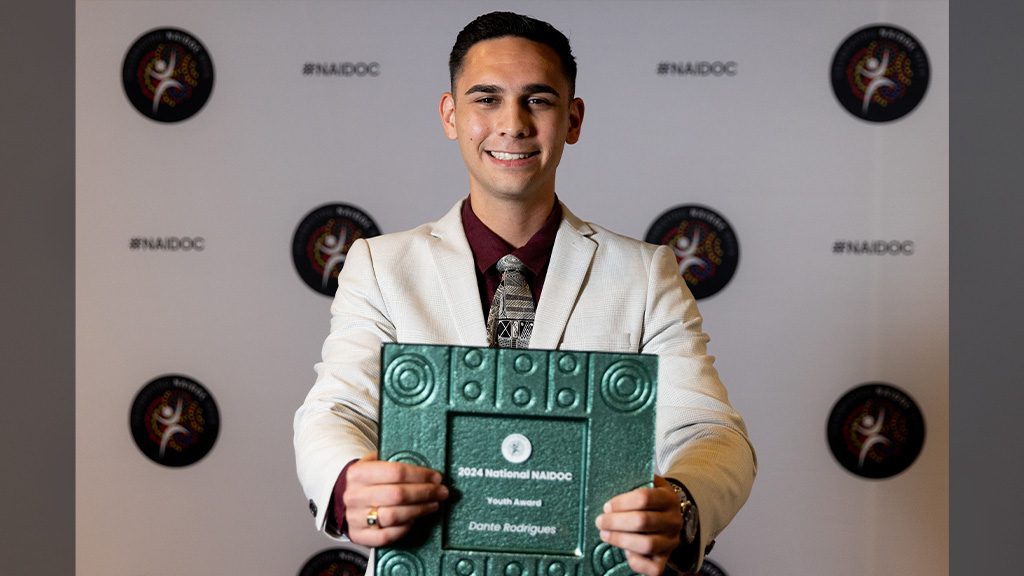
Dante Rodrigues
The National NAIDOC Committee are thrilled to announce Mr Dante Rodrigues as a finalist for the Youth Award category.
Dante Rodrigues is a professional fighter with an impressive background, boasting titles in various martial art disciplines. A proud descendant of Tiwi Islander with a mix of Timorese, and Portuguese heritage. Dante started fighting since age 12 and has been competing against adults proferssionally since he was 14. He has claimed multiple state and Australian titles in Muay Thai and K1.
Dante was the first aboriginal kickboxer and territorian to represent Australia at an Olympic level and even winning a silver medal for Asutralia in the Junior World Kickboxing Championships in Italy. Dante Represented Australia for a second time in 2023 where he made it to the quarter finals in the World Kickboxing Championships in Portugal.
When not preparing for fights, Dante is an advocate for mental health awareness and runs health and wellbeing programs for the youth in Northern Territory through "One Percent Better Communities," a business he co-founded with his cousin, Jahdai Vigona. A role model in the NT, Dante received the NT NAIDOC youth of the year award in July 2023.
2023
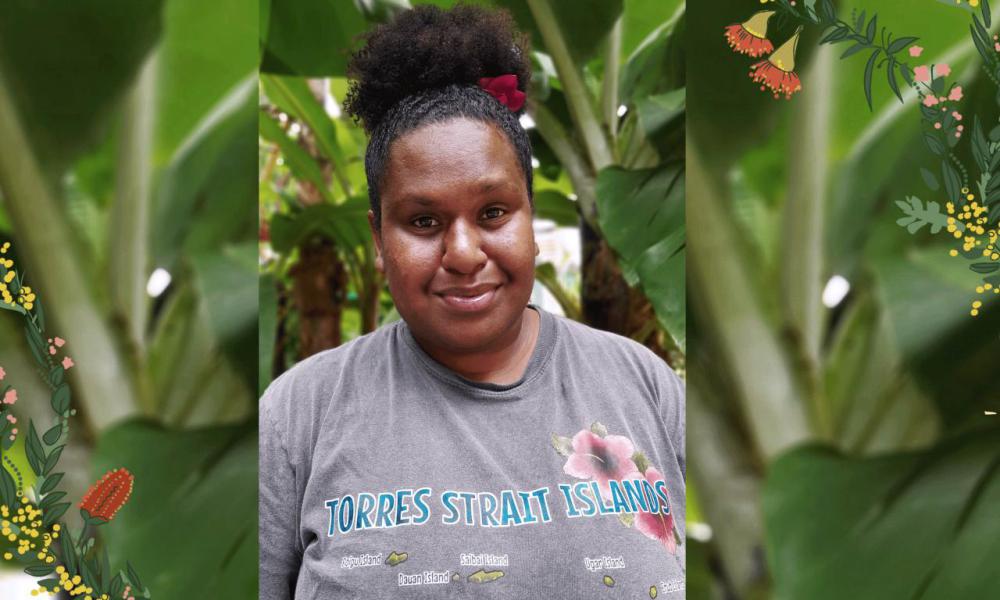
Lala Gutchen
Lala Gutchen is a proud Meuram woman from Erub Island in the Torres Strait who has worked tirelessly to protect and preserve her Country and Culture for future generations. An outstanding youth leader and bearer of cultural knowledge, Lala is dedicated to protecting her homelands and culture across the Torres Strait. As well as being a cultural knowledge holder, Lala is also a fisherwoman, a composer, a mother, a community organiser, working to become a certified linguist, and a strong advocate for the cultural rights of her people and families.
For the past three years, Lala has worked with the Australian Literacy and Numeracy Foundation on the Erub Mer language project. Working closely with her father, Kapua Gutchen, an Erub Mer mentor and language holder, they recorded over 2000+ unrecorded words in Erub Mer. As part of her work in language preservation and education, Lala has co-authored a series of journal articles for the Foundation of Endangered Languages. In 2019 Lala was also named a Young Champion by First Languages Australia. Lala has provided mentoring as a Community Educator through Living Languages and has participated in research discovery workshops with the Queensland State Library.
Lala has worked with tech giants like Google and Apple to create the Erub Mer literacy app, in order to preserve languages for the future generations. She also recently oversaw the development of an early literacy game (app) in Erub Mer language. Lala’s goal is to see young people excited to explore their language and culture. To reach this goal Lala works tirelessly to preserve the language for future generations. Lala also represented the Torres Strait nationally at the recent Warra: Indigenous Language Youth Forum in Adelaide. Lala works with Erub community members and peers to compose new language songs and reteach old language songs in Erub Mer. Through her work as a fisherwoman and traditional gardener, Lala works on land and sea, demonstrating her exemplary strength, dedication, and her passion for preserving cultures and protecting the land.
Lala has also been a key cultural witness in a historic Queensland Land Court case, where she provided evidence for her people about the impact that the Waratah Coal’s Galilee Coal Project would have on the Torres Strait including on the islands of Erub, Poruma and Merad which are threatened by rising sea levels due to climate change. This was the first time the Queensland Land Court had travelled to listen to evidence on-Country from Traditional Owners and Lala hosted the court lawyers in her home, cooked for them and facilitated communication between the Land Court and community. The Land Court later ruled that the planned coal mine would infringe upon the rights of Torres Strait Islanders and that it would significantly contribute to Australia’s greenhouse gas emissions after the landmark on-Country visit.
Lala is a role model, leader and facilitator who represents her family, community and people. Every day she faces the difficult task of standing up for her Country and is dedicated to passing on the cultural knowledge of her Elders and ancestors to her daughter and future generations. Lala is a widely respected leader in her community for her commitment to caring for Country and language to keep culture strong.
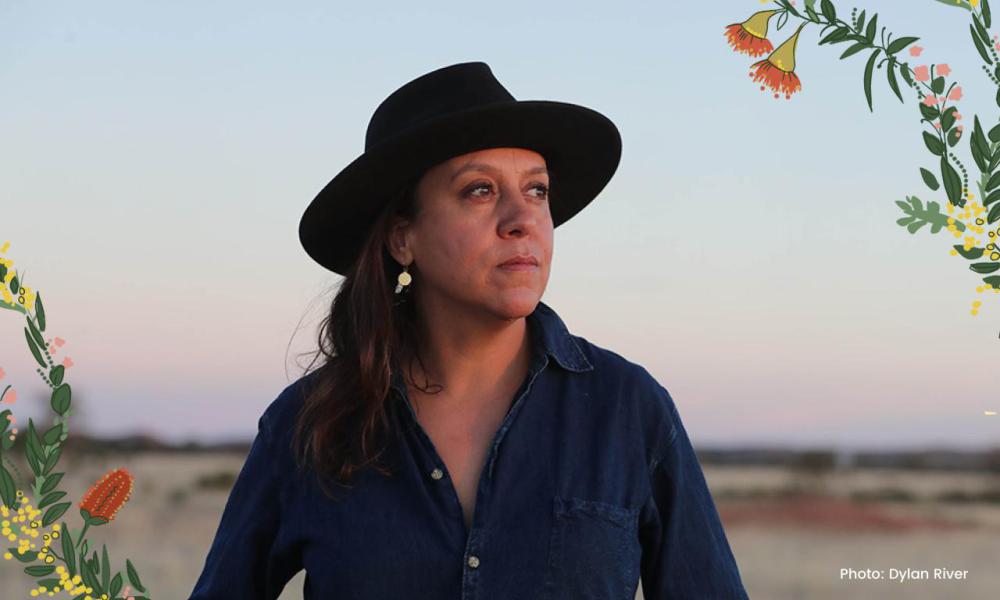
Rachel Perkins
Rachel Perkins is a proud Arrente and Kalkadoon woman, with German and Irish heritage and is one of Australia’s most significant storytellers. She is a writer, director and producer of award-winning television drama, documentaries and feature films, such as; The Australian Wars series, Total Control, Bran Nue Dae, Radiance, Redfern Now, Mabo, Mystery Road, and First Australians. Through her career spanning over 30 years in film and media, Rachel has become an educator, leader, and mentor, inspiring the next generations of First Nations storytellers.
In much of her screen work, Rachel shares our nation’s true shared history through the voices, eyes and stories of our peoples. In 1992, Rachel founded Blackfella Films. A standout achievement for the company was the award-winning 7 part documentary series First Australians. The landmark multi-platform history series, broadcast on SBS Television to over 2.3 million viewers, was accompanied by an internationally acclaimed interactive website. First Australians was awarded Australia’s top honours for documentary including the Australian Film Institute (AFI) and IF Awards, the UN Media Peace Prize, TV Week Logie and Australian Writers and Directors Guild Awards. First Australians has sold throughout the world, and is the highest selling educational title in Australia.
Rachel has contributed to the film and television industry on most of its major boards including the Australian Film, Television and Radio School, the Australian Film Commission, Screen Australia, NITV, Indigenous Screen Australia, the National Indigenous Media Association of Australia and the NSW Film and Television Office. Rachel received the inaugural Contribution to Television IF Award, the Byron Kennedy AFI Award in 2002 and the Australian International Documentary Conference Award in 2011.
Through her on screen storytelling, Rachel takes us on an essential learning journey of shared histories that we were denied in the classroom. Through truth-telling, we are given the opportunity to acknowledge and grieve for countless crimes committed in the name of colonisation and assimilation.
In 2017 Rachel was one of six 'Inspirational Australian Women' to secure funding from Newman's Own Foundation in honour of Paul Newman’s belief that every individual has the power to make a difference. Rachel has always believed in the power of the language of her forbears, and used this funding to enable Dr Veronica Perrurle Dobson AM to update and reprint the 1994 Eastern and Central Arrernte Dictionary. This dictionary is a Keeping Place of Rachel's paternal Arrernte language, identity and cultural knowledge. Every word is contextualised into a sentence to preserve grammar with vocabulary.
Rachel's body of work and achievements include:
- Commissioner - at the Australian Film Commission from 2004 to 2008
- 2015 President of AIATSIS Foundation
- 2017 was one of six 'Inspirational Australian Women' to secure funding from Newman's Own Foundation in honour of Paul Newman' s
- 2019 Rachel delivered the ABC's annual Boyer Lecture which she entitled: The End of Silence, The Australian Wars series.
- 2022 Rachel co-delivered the National Press Club Luncheon with Professor Henry Reynolds.
- 2022 Rachel volunteered her time to answer the questions of 14 year old Alice Springs school students about Colonisation.
Rachel is a media trailblazer for our Mob, and has dedicated both her life and career to truth-telling, ensuring our peoples stories, voices, and histories are heard and seen on screen.
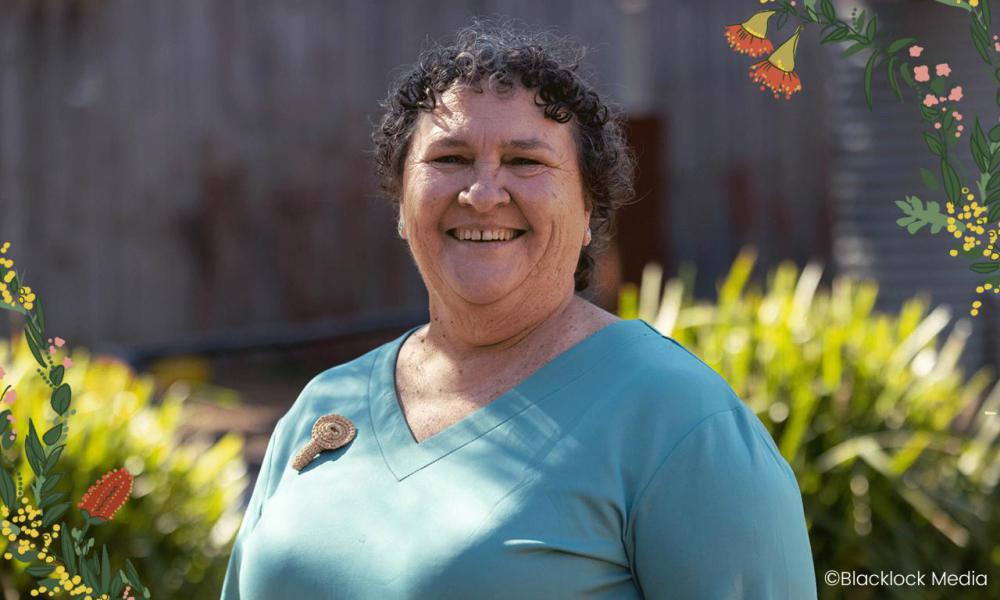
Bubup Wilam Aboriginal Child and Family Centre
Bubup Wilam Aboriginal Child and Family Centre, meaning ‘Children’s Place’ in Woi Wurrung, is an Aboriginal community-controlled education, health and well-being organisation in Thomastown, Naarm (Melbourne). Bubup Wilam aims to ensure that local Aboriginal communities can make decisions that directly affect them and exercise their right to self-determination in a meaningful and effective way.
Bubup Wilam is committed to working with families to raise strong, proud, and deadly kids in a culturally rich and supportive educational environment. Bubup Wilam enables children to begin their journey to reach their full human potential at an early age. Bubup Wilam reinforce children’s strong sense of Aboriginal identities and personal self-esteem and helps to lay the foundation for lifelong learning, health and well-being. Bubup Wilam do this by providing quality, culturally safe, and accessible care and education for children aged 0-5 years.
As an accredited and culturally safe education facility for Aboriginal and Torres Strait Islander children, children are given space to lead learning and teaching activities, to be themselves, to play and explore in a way that builds upon their strong and proud Aboriginal identities in partnership with their families.
Children’s Aboriginal identities are the catalyst that underpins their educational program and their experience at Bubup Wilam. This includes ensuring children’s curriculum is underpinned by truth-telling of the history of this country and supporting children with the skills and knowledge to thrive in a world that denies who they are. Bubup Wilam further integrates this through their incredible Connection to Country program, taking children out of the classroom one day a week to learn in and from Country. To further strengthen community cohesion and solidarity, children are informed about their kinship and community ties through ancestry maps and photographs.
Their work doesn't end there. Bubup Wilam is one of only three service providers in the country to offer preventive and early childhood intervention services. This includes allied health services such as hearing tests, speech pathologists, visits to general practitioners, a comprehensive primary school integration program, and access to other health care services without fear, shame, racism, and without the burden of additional, often prohibitive, time-consuming costs and need to take time off work.
Bubup Wilam works to eliminate cultural biases and privileges within the education system, and strengthen community values of cohesion and resilience, building stronger communities now and in the future. Each child at Bubup Wilam holds a valuable place in cultural continuity with the ability to thrive in society. Bubup Wilam raises children to be confident, determined and strong, knowing they reflect the strengths of their ancestors and with the mindset and resilience to act like little leaders now and as influential Elders in the future.
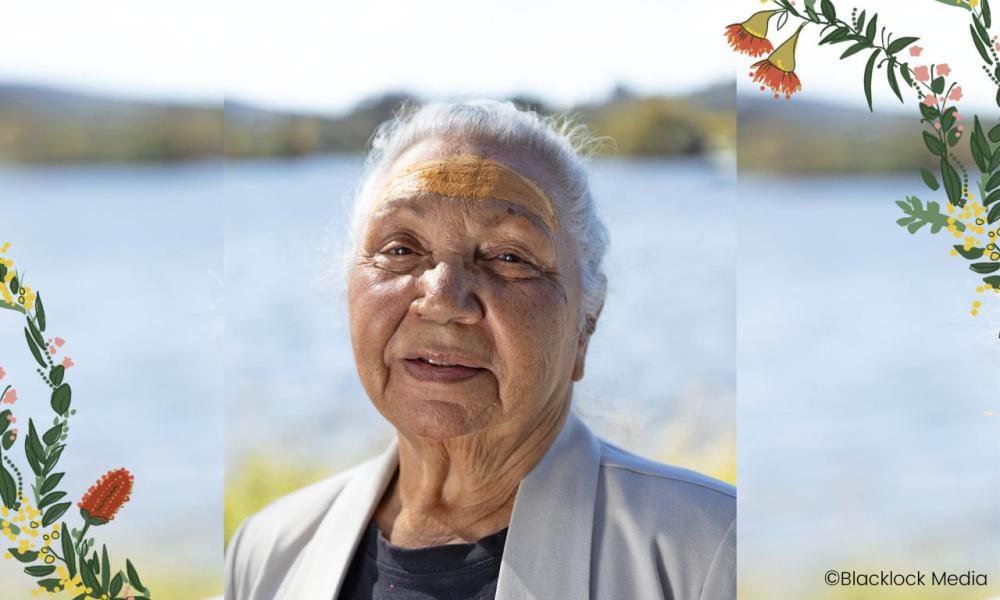
Aunty Dr Matilda House-Williams
Aunty Dr Matilda House-Williams is a proud Ngambri (Kamberri) Wallabalooa (Ngunnawal) and Wiradyuri Elder. She is, and always was, a powerhouse for Aboriginal and Torres Strait Islander advocacy. Aunty Dr Matilda was born in 1945 on Erambie Aboriginal Mission at Cowra in country New South Wales and is 1 of 10 children. She was raised in her grandparents’ house at Hollywood Aboriginal Reserve in Yass, NSW, and was taken to Parramatta Girls Home when she was 12. Aunty Dr Matilda returned to her Ancestral Country in Canberra in 1963 and has been actively involved in Indigenous Affairs in the Canberra region since.
After returning to Canberra, in the early 1960s, Aunty Dr Matilda married and began raising her family of four children on Ngambri Country. In the mid to late 1960’s up until 1967, Aunty Dr Matilda worked behind the scenes in the community and Canberra region to help educate Australians on the Yes vote for the 1967 Referendum. In the early 1970’s she began working as an Aboriginal liaison/social officer at the Department of Aboriginal Affairs in Canberra, assisting Aboriginal people with health, education, welfare and employment.
In 1972, Aunty Dr Matilda was also one of the original protestors who established the Aboriginal Tent Embassy in 1972. Aunty Dr Matilda and the Williams family provided leadership and family support during the establishment of the Aboriginal Tent Embassy on the Lawns of Old Parliament House. Aunty Dr Matilda was also part of establishing the Aboriginal Legal Service (ALS) in the 1980s, and has continued this work more recently through her membership of the Aboriginal Justice Advisory Committee.
Dr Aunty Matilda played a key role in establishing Winnunga-Nimmityjah Aboriginal and Community Services in 1982. The Aboriginal Health Service (AMS) is still serving the local Aboriginal and Torres Strait Islander community today. Aunty Dr Matilda also founded the Ngambri Land Council in Queanbeyan NSW in 1984, alongside her two brothers. To this day, the Land Council continues to support the local community.
Aunty Dr Matilda also has deep care for Aboriginal and Torres Strait Islander youth and young people, and plays a key role in working with schools, families and the education system to ensure that all young First Nations people have the right and access to education, which our people were once denied. Notably, Aunty Dr Matilda established the Tjabal Indigenous Higher Education Centre at the Australian National University (ANU) in 1989, which still provides support for Aboriginal and Torres Strait Islander students today.
Aunty Dr Matilda has also served on the first ACT Heritage Council, the Queanbeyan Regional Council of the former Aboriginal and Torres Strait Islander Commission (ATSIC), the Ngambri Local Aboriginal Land Council, the Tent Embassy Advisory Committee and the ACT Aboriginal and Torres Strait Islander Community Consultative Council. She has also acted as an ACT honorary ambassador.
As is her door, the gate to Aunty Matilda’s country has always been open to all Aboriginal and Torres Strait Islander people. It is reflected in her support of the 1992 Mabo decision and the 1996 Wik decision where Aunty Matilda supported the families and celebrated with them, the iconic victories. Aunty Matilda is vocal supporter for the inclusion of Torres Islander peoples and culture.
In 1997, Aunty Dr Matilda’s involvement in Indigenous Affairs led to her delivering the Welcome to Country at Australians for Native Title and Reconciliation's ‘Sea of Hands’ installation, and contributing to the Bringing Them Home report into the Stolen Generations.
Aunty Dr Matilda has conducted the Welcome to Country Ceremony protocol for many significant events such as the opening of the Tjabal Centre at the ANU, opening of the Ngunnawal Student Centre at the University of Canberra in 1990, Nelson Mandela’s visit to Australia in 1990, and the Dalai Lama’s visit in 1992.
In 2006, Aunty Dr Matilda was named Canberra Citizen of the Year by ACT Chief Minister Jon Stanhope MLA. She accepted the award wearing traditional possum skins, gaining a standing ovation from over 400 people.
In February 2008, On the Eve of the National Apology to the Stolen Generations, Aunty Matilda became the first person to perform the Welcome to Country protocol at the opening of the 42nd Parliament of Australia. Since then, Aunty Matilda has opened the 43rd, 44th and 47th Parliament of Australia. During her opening of the 47th Parliament of Australia, robed in her iconic possum skin cloak, and supported by her family, she passed down the responsibility to her son, Paul Girrawah House – to carry on this cultural tradition into the future.
In 2017, Aunty Dr Matilda’s lifelong commitment to her community was recognised by the ANU, with the conferral of the Degree of Doctor. In the little spare time she has in her ‘retirement’, Aunty Dr Matilda also illustrates children’s books. This has included the Tales of Ngambri History series, that are now circulated in ACT schools and painted works that have been in exhibitions. Dr House-Williams shares and promotes an understanding and respect for Ngambri, Wallabalooa and Wiradyuri cultures through education. She has also been enjoying spending her ‘down time’ time making traditional possum skin cloaks.
Aunty Dr Matilda continues to work tirelessly in her community, providing advice, mentorship and support to all Aboriginal and Torres Strait Islander people who ask. Those who know her personally vouch that she does not rest and continues to work for First Nations Peoples without any days off. Aunty Dr Matilda opens her heart, her home and Country to all community who need her.
Despite the adversity and challenges that she endured for being born into a generation that didn’t accept her, Dr Matilda House-Williams faced these head on, blazing new trails in the process. Aunty Matilda is a proud, strong, kind, yet fierce Blak Matriarch, who has created a legacy by forging new pathways for First Nations Women and our Mobs more broadly.
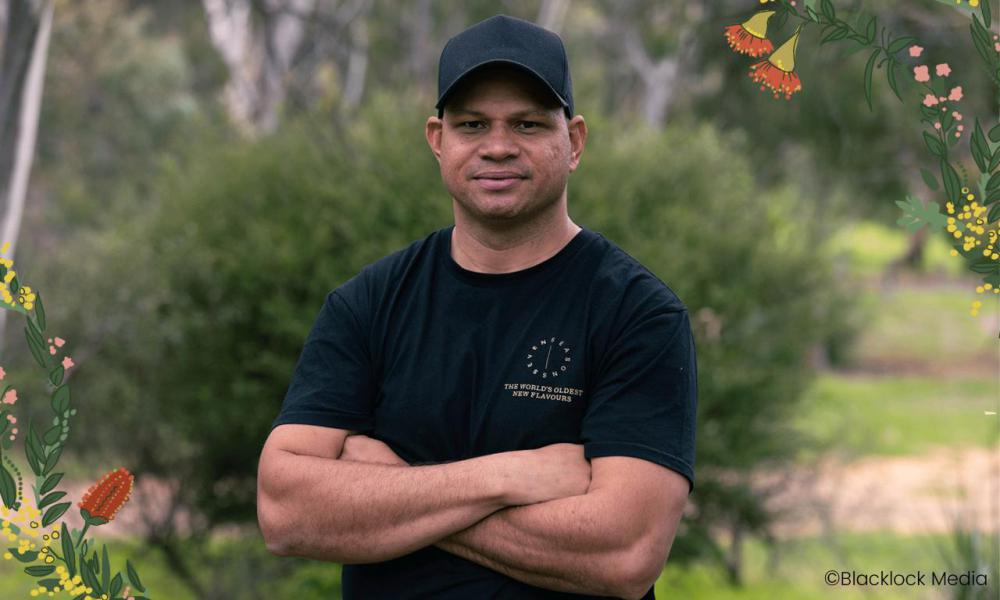
Daniel Motlop
Daniel Motlop is a Larrakia man from Darwin, Northern Territory who now calls Kaurna Country home, in Adelaide, South Australia. Growing up in Darwin, Daniel learned to appreciate the natural abundance around him learning to identify bush apples, billy goat plum, native passionfruit and to hunt for magpie goose and barra. After a long and successful career as a professional AFL player for Port Adelaide Power and North Melbourne, Daniel has shifted his focus to Indigenous social enterprise in the food and beverage industry.
Daniel is the co-founder and General Manager of Something Wild Australia, alongside his brothers Steven, Shannon and their father Eddie. Something Wild are an Indigenous food and beverage company who specialise in game meats and native greens and are at the forefront of supplying Indigenous foods to restaurants and consumer around Australia. Additionally, Something Wild have built strong relationships with Indigenous communities which allows them to promote and supply unique produce from one of the world’s oldest cultures. Not only does this provide Something Wild’s customers with the opportunity to experience products that celebrate Indigenous culture, it also provides positive opportunities and outcomes for many rural and remote Mob communities.
Over the last six years, Daniel has innovated the way that native Australian ingredients are used in the mainstream food and wine industry. Through Something Wild, Daniel shares his extensive knowledge of unique Native ingredients including magpie goose, kangaroo, wild boar, green ants, native greens, herbs and spices, kakadu plums and bush apples. Something Wild were the first food business in Australia to acquire the permit to harvest and sell magpie goose from up north. Daniel has also developed and established the range of Something Wild’s consumer facing products, such as Seven Seasons Spirits and Native fruit flavoured yogurts. This has allowed for more of these uniquely Native Australian food ingredients to be introduced to mainstream Australian consumers. Daniel has also been involved in the establishment of a horticultural enterprise which develops methods of growing more mainstream native plants in greenhouses to allow for reliable harvest volumes and product specification. This innovation helps to ensure a more sustainable harvest.
In addition to working with native ingredients, Daniel has developed a community of First Nations harvesters which crucially allows for industry, and consequently economic development, to be established on country for the benefit of local Aboriginal people. Most ingredients are wild harvested and, Daniel provides job opportunities to First Nations people. This not only creates jobs but also keeps age-old traditions alive by introducing them to a new generation.
Daniel says “We want to get to a stage where native ingredients are like regular fruit and veg.” Daniel believes that there’s space in every Australian household for ingredients that have sustainably nourished Aboriginal and Torres Strait Islander people for thousands of years.
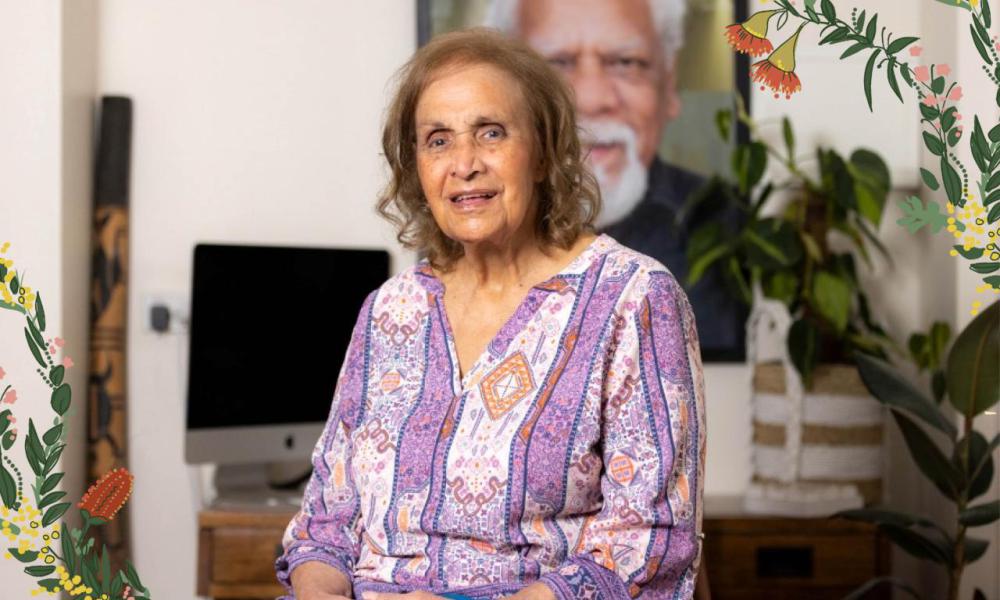
Aunty Dr Naomi Mayers OAM
Aunty Dr Naomi Mayers OAM, is a proud Yorta Yorta and Wiradjuri woman, born in 1941 on Erambie Mission, just outside of Cowra in country New South Wales. Aunty Dr Naomi has dedicated her life to the advancement of Indigenous health and is a leader in Aboriginal affairs.
Aunty Dr Naomi has developed and led some of the most enduring and fundamentally profound reforms in Aboriginal and Torres Strait health, both in terms of community-controlled services and the broader Australian health system.
At the age of 18, Aunty Naomi began her work in health as a nurse, working at the Royal Women’s Hospital and Royal Children’s Hospital in Melbourne, the Home Hill Hospital in Queensland and St Andrews Hospital in East Melbourne. She was also a board member of the Royal Flying Doctor Service.
In addition to her contributions to healthcare and education, Aunty Dr Naomi was also a founding member of The Sapphires, the ground-breaking all-Aboriginal music group from country Victoria that gained international recognition for their soulful harmonies and powerful performances. The group performed defiantly at a time when Aboriginal and Torres Strait Islander people and issues were both ignored or not spoken about.
Aunty Dr Naomi was one of the founders and a pioneering force in establishing the Aboriginal Medical Service Redfern (AMS) in 1971. The AMS Redfern was the first Aboriginal medical service and has since become a service model for community controlled health services that underpins the principles of self-determination. The service provides culturally appropriate healthcare to Indigenous people and has been instrumental in improving health outcomes for Aboriginal communities throughout Australia.
Aunty Dr Naomi dedicated 45 years to the Redfern AMS and service to the community. She started out as an Administrator, and in 2012 went on to become the Chief Executive Officer (CEO) before her retirement in 2017. Throughout her career at the AMS, Aunty Dr Naomi guided the transformation of the AMS from a small shop-front into a national network of services.
Aunty Dr Naomi has been one of the principal figures behind a number of Redfern's community development projects, including those which established the Murawina pre-school program in 1973 and the Aboriginal Housing Company in 1976.
Aunty Dr Naomi is a founding member of the Aboriginal Health and Medical Research Council of NSW, the National Aboriginal and Islander Health Organisation (NAIHO) (now the National Aboriginal Community Controlled Health Organisation), was founding president of the Federation for Aboriginal Women and a member of the first ATSIC Regional Council for Metropolitan Sydney.
As an authority on Aboriginal health issues, she proved an influential witness during the inquiries of the 1977 House of Representatives Standing Committee on Aboriginal Health. In 1981 she was appointed as a consultant by the Royal Australian College of Ophthalmologists.
In 1984, Aunty Dr Naomi was awarded a Medal of the Order of Australia (OAM) in recognition of her services to the community.
As Chair of the National Aboriginal Health Strategy Working Party in 1988-9, Aunty Dr Naomi worked with state and community representatives to develop the National Aboriginal Health Strategy. Under her leadership, that pivotal report introduced innovative Aboriginal health sector reforms that continue to shape the nature, range and delivery of health services to this day.
In 2017, Aunty Naomi was awarded an honorary degree of Doctor of Letters (honoris causa) from the University of Sydney for her work delivering and transforming Aboriginal and Torres Strait Islander health care. At this time, Aunty Dr Naomi already held a doctorate in Aboriginal Affairs from Tranby Aboriginal College in Sydney.
Aunty Dr Naomi has dedicated her life to Aboriginal and Torres Strait Islander advancement, health, education and policy. She has guided, advocated, argued for and supported Aboriginal and Torres Strait Islander communities across the nation to build a healthier future.
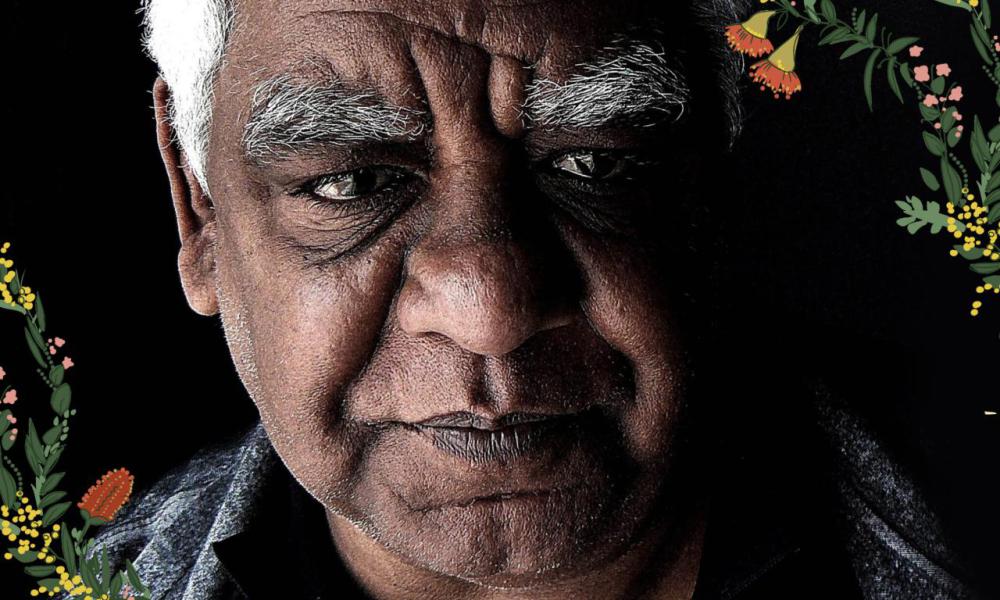
William Tilmouth
William Tilmouth is an Arrernte man, born in Mparntwe (Alice Springs), Northern Territory. As a member of the Stolen Generations, William was taken to Croker Island Mission where he lived and attended school. Five of his siblings were taken to Adelaide and he and two brothers to the other end of the country north of Darwin. In 1967, he was moved off the Mission to Darwin, and ended up in the juvenile justice system for leaving the mission home. He attended the Aboriginal Community College in Adelaide in 1974 and worked in many jobs in South Australia. In 1980 he returned home to Alice Springs, and hasn’t left since. William worked for Tangentyere Council as a community worker, supporting people who were homeless by creating shelters and providing access to basic needs and also at the Alice Springs Youth Support Services supporting young people at risk. He was elected by the Elders and offered the opportunity to become the Executive Director of Tangentyere Council - a position he held from 1988-2010. William was also elected to the Central Australian ATSIC Regional Chair position, the Chair of Central Australian Aboriginal Legal Service and sat on a range of committees including housing and research ethics committees. After his time at Tangentyere Council, William became the Chair of Central Australian Aboriginal Congress Health Service.
Since 2011, William has been the founding Chair of the ground breaking organisation Children’s Ground. Children’s Ground was designed by First Nations people for First Nations people - our solution for our people. It is designed to disrupt the status quo and create transformational change for future generations so that they can enjoy justice, opportunity and agency over their lives.
Following the vision and direction from Elders, Children’s Ground is an ambitious 25-year strategy that supports each child and family within a whole of community approach. Children’s Ground honours culture, language and identity, delivering access to education, health, cultural and economic opportunities. Led by local communities, the solutions are found in our culture, through our land, our kinship, our lores and our knowledge systems. Through William’s leadership people are empowered to practice self-determination, uplifting local community governance which is thriving and is the heart and soul of Children’s Ground.
William is a recognised and respected leader in the Northern Territory and throughout Australia. He has dedicated his life to his people to prevent the trauma of previous generations. As a member of the Stolen Generations, William has overcome poverty, incarceration, injustice and inequality and has survived trauma to become a respected role model for Arrernte and all First Nations people.
More recently, he was a key advisor for the 2019 film In My Blood It Runs.
William’s work will ensure that future generations of First Nations children can exercise their rights and their voice, their culture and their identity.
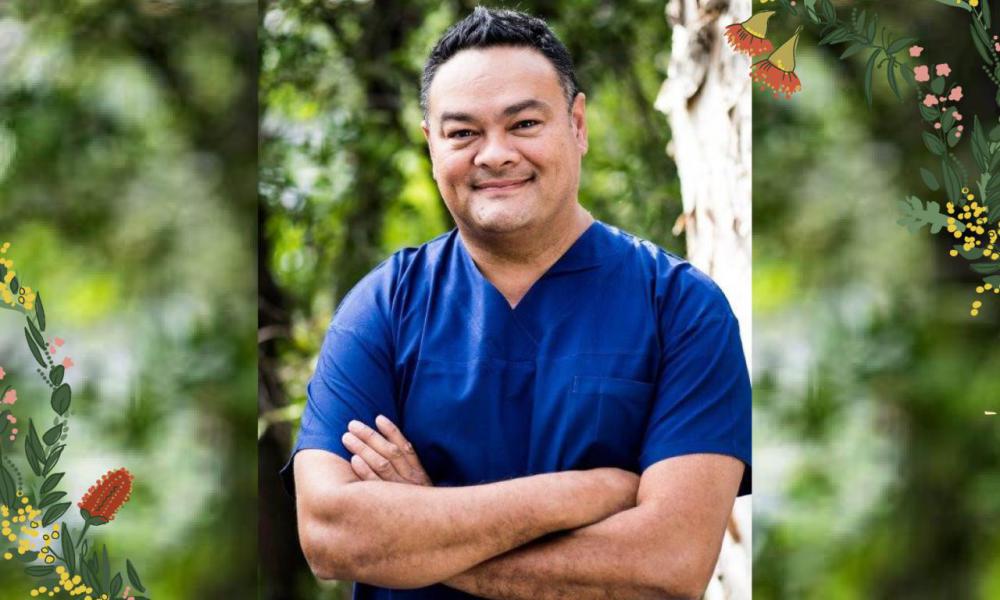
Professor Kelvin Kong
Professor Kelvin Kong is a Worimi man who grew up on Country in Port Stephens, on the New South Wales mid-north-coast. Kelvin graduated from the University of New South Wales to become Australia's first Indigenous surgeon. He credits his mother, Grace Kinsella, a pioneering Indigenous registered nurse, for inspiring him and his older sisters, twins Marlene and Marilyn, to become doctors. Their father, Kong Cheok Seng, a Malaysian Chinese man, is also a doctor.
Professor Kong, now works on Awabakal and Worimi Country, and is associated with the University of Newcastle's School of Medicine and Public Health. He is an Otolaryngology, Head and Neck surgeon and a Fellow of the Royal Australasian College of Surgeons (RACS). Kelvin works at Newcastle's John Hunter Hospital and John Hunter Children’s Hospital, and he explains that hearing loss, often caused by Otitis Media (middle ear disease), significantly contributes to poor educational outcomes for children and can lead to higher unemployment rates in adults as a result. Aboriginal and Torres Strait Islander children experience the highest levels of chronic otitis media in the world, affecting up to 70% of children in remote communities.
Determined to change the statistics, Dr Kong has dedicated his career to early intervention. Dr Kong says “If we can reduce the risk of hearing loss, we can have a direct impact on a child's ability to learn and develop. The change that we see is remarkable - we can take them from limited hearing and language skills to fully functioning teenagers with real employment prospects”.
Dr Kong is passionate about addressing the disparity in health outcomes between Indigenous and non-Indigenous children. Each year, he spends a portion of his time working in, and for, remote Indigenous communities providing access to quality healthcare that would otherwise be limited or completely unavailable. This includes visiting the Kimberley’s each year to perform specialist consultations and surgery.
He is also passionate about improving pathways into specialist medical training and improving Indigenous workforce across the health and research sector. Dr Kong mentors high school students to encourage more Indigenous people to consider careers in medicine and surgery.
In 2011, Dr Kong joined other medical practitioners in the Care for Kids' Ears campaign to address the ongoing issues experienced by remote communities. The campaign was designed to encourage communities to be empowered with resources and information about ear health to reduce the risk of ear disease and hearing loss. Dr Kong is passionate in his advocacy in which he centres the importance of working together as a community - "When we work together with a community, we can address all the issues that arise from ear disease. Our job is to improve kids' health so they can get the education they need."
Some of Dr Kong's many roles include:
- First ever identified Indigenous Fellow, and current Chair of the Aboriginal and Torres Strait Islander Advisory Committee for the Royal Australasian College of Surgeons’ (RACS).
- Examiner, Royal Australasian College Surgeons
- Mentor Surgical Pathways for Indigenous Australians
- Public and Private practice in Newcastle, at Hunter ENT Surgery
- Professor and mentor at the University of Newcastle
- Honorary Professor Macquarie University
- Associate Professor UNSW
- Clinical lead, ENT Outreach services HNELHD
- Indigenous Lead, Australian Society Otolaryngology, Head & Neck Surgery
- Researcher; Successful in numerous NHMRC grants, awards and collaboration
- Chair, Advisory Group for reporting on the Ear and Hearing Health of Aboriginal and Torres Strait Islander people
- Member, Aboriginal and Torres Strait Islander Ear and Hearing Health Partnership Committee
- Served on multiple advisory boards and committee’s including the Indigenous Health and Fellowship Services Committee
- Previous Board member for the National Centre of Indigenous Excellence (NCIE)
- Previous Board member Cancer Australia’s Advisory Board
- Previous Board Member Hearing Australia
- Previous secretary of Australia and New Zealand Society Paediatric Otolaryngology (ANZSPO)
- Recently, Dr Kong received an Honour Roll mention for Australian of the Year
Many of our young Mob are labelled as problems, too difficult, described as having learning difficulties, or as not wanting to learn. The truth is that due to the complex legacy of colonisation, under-funded communities, and racism, many of our young people are living with undiagnosed and treatable medical issues that create barriers to learning, education, employment and healthy living.
It is Dr Kong’s goal to ensure that these barriers are eradicated and that our Mob have equal access to quality health care to enable them to have every opportunity in life.
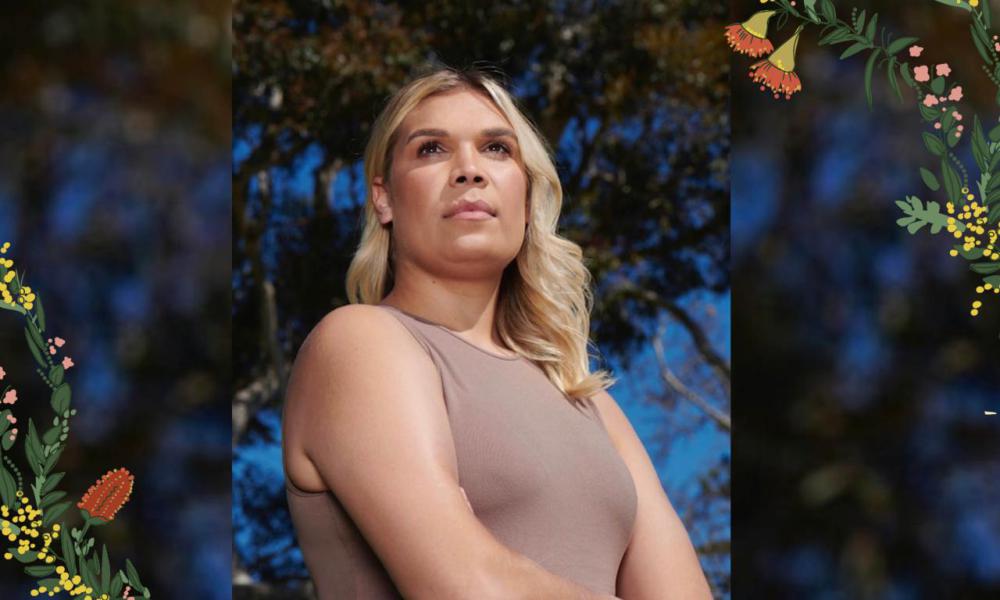
Donnell Wallam
Donnell Wallam is a proud Noongar woman from Korijekup, Western Australia, a small town 2 hours south of Boorloo (Perth). Donnell is a professional netballer and sharp shooter for the Australian Diamonds and the Queensland Firebirds. She was only the second Indigenous Suncorp Super Netball Player and third Indigenous woman to play netball for Australia. She is one of the most well-known and respected goalers in the Suncorp Super Netball competition.
Donnell was picked as a replacement player for the Queensland Firebirds’ 2022 Suncorp Super Netball campaign, where she scored 519 goals and was the fourth-highest scorer in the competition. Her tally included 26 super shots (two-point goals) and 35 offensive rebounds, the third-highest tally in the 2022 season. This led her to be a training partner for Australia’s netball squad for the 2022 Commonwealth Games in Birmingham, United Kingdom.
Donnell takes every opportunity to share her culture and identity, and revealed a unique Deadly Choices uniform designed by Aboriginal artist Rachael Sarra, in the Suncorp Super Netball’s First Nations round in March this year.
Donnell also exemplified incredible strength and staunch advocacy late last year when she sought an exemption from wearing an Australian Diamonds dress featuring the logo of sponsor Hancock Prospecting. This was due to the attitude deceased company founder, Lang Hancock, had expressed towards Aboriginal people on television in the 1980s. While the company pulled the $15 million sponsorship, four days later, Donnell debuted for the Diamonds in a Test match against England in Newcastle, coming off the bench to score the winning goal in the last seconds of the game. Additionally, Visit Victoria provided sponsorship of $15 million to secure the 2022 Super Netball grand final as well as several Diamonds matches and camps in the lead up to the 2026 Commonwealth Games.
Donnell and her Queensland Firebirds teammates are active members of the community who attend and participate in netball coaching clinics in regional and remote Queensland. Both Donnell and the Firebirds engage with the local community, business leaders, and inspire young netballers to chase their dreams.
Donnell is also a proud ambassador for Deadly Choices. Together with her Firebirds teammate Gabi Simpson, the deadly duo empower Mob to make positive health decisions, and unveiled the Firebirds’ new Deadly Choices shirt earlier this year.
Netball has given Donnell the opportunity to be an advocate for her community and culture and to be a strong role model for young people all over the Country. Donnell has used her status as a professional athlete to progress and advocate pathways for Aboriginal and Torres Strait Islander netballers. Donnell embraces the opportunity to highlight sporting issues such as athlete pathways as well as important broader social issues.
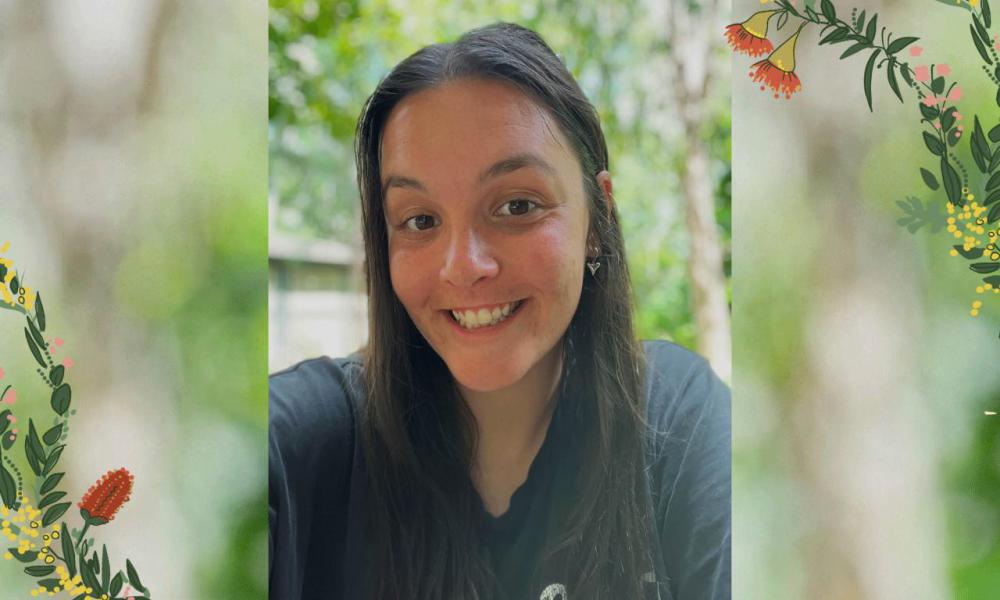
Courtney Burns
Courtney Burns is a 25 year old Gunaikurnai woman (land and sea country) from South Gippsland, Victoria. Courtney is currently studying Marine Science at James Cook University (JCU) in Townsville, Queensland, and assisting in the shark research lab in Townsville.
Courtney is deeply passionate about ocean Country health, and interested in the links between elasmobranchs, ocean country and Aboriginal and Torres Strait Islander peoples. Elasmobranchii is a class of cartilaginous fishes, including sharks, skates and rays. Aboriginal and Torres Strait Islander people have been living off sea country since time immemorial, yet there is no evidence in scientific literature of relationships, positive or negative, with sharks.
Courtney’s goal is to continue her research to be able to change the way the world sees sharks. She aims to promote action in their conservation by understanding the physiological effects of anthropogenic stressors (like climate change) on sharks, and how she can bring Aboriginal and Torres Strait Islander cultures into scientific literature to further aid this goal.
Courtney’s recent achievements include:
- 2022/2023 – Aurora Internship Program; where she was placed within the ‘Physioshark’ team. Assisting with ‘Epaulette shark’ research projects and husbandry care of ‘Epaulette sharks’ and ‘Cinnamon Clown fish’; whilst tackling a metadata analysis on neonate blacktip reef sharks, focusing on their body condition (health).
- Indigenous Academic Achievement Award for Marine Science 2022 at the annual awards ceremony for the Indigenous Education and Research Centre (IERC) at JCU.
- Google Future Leaders in STEM Scholarship 2022.
- Recognised and acknowledged by CSIRO for Academic Excellence and offered a casual Research Technician position with the Predator Population team in the Environment business unit.
- Courtney also recently received a promotion from volunteer to Assistant Lab Manager/Volunteer Coordinator at the Rummer Lab at James Cook University within the Physioshark program.
In September 2022, Google and Aurora Education Foundation announced their STEM Scholarship recipients. Courtney was one of only three Aboriginal women selected as Google 2022 STEM scholars. This scholarship assists Aboriginal and Torres Strait Islander university students who aspire to work in the fields of Science, Technology, Engineering and Mathematics (STEM). Recipients of the scholarship receive assistance through funding which supports them throughout their studies.
As a James Cook University Student Ambassador, Courtney inspires other young First Nations people to consider tertiary education as an option for their future. Courtney also assists with University activities including career expos, recruitment events, school visits, campus tours, sponsorship events and more.
Courtney encourages excellence from fellow Aboriginal and Torres Strait Islander students by co-creating a supportive community via an Indigenous student association focusing on group study sessions, social sports, and gatherings online and in person.
The links between Ocean Country and our Mob have been known to us for a very long time. However, Courtney, through her research, studies and conservation, aims to bring these relationships to the forefront of mainstream scientific literature and ensure that First Nations knowledge is leading solutions to issues (such as climate change) affecting both our Mob, and the world.
2022

Walter Jackson
Walter Jackson is a Ngarrindjeri man from South Australia. He has worked in a number of roles on significant projects in the Ngarrindjeri region, including as Chief Executive of Ngopamuldi Aboriginal Corporation.
Walter is an advocate of improved employment opportunities for First Nations and young people in water management and land-care projects. Under his leadership, the Ngopamuldi Aboriginal Corporation secured funding for projects around cockle harvesting, nursery irrigation and soft plastic recycling. This has allowed Ngopamuldi to provide training and job opportunities, including for inmates at Mobilong prison.
As a role model for Aboriginal youth and the broader Ngarrindjeri community, Walter emphasises and promotes the cultural, environmental, and spiritual knowledge of Traditional Owners to improve and sustain the well-being of Country, land and water. He uses his interest in caring for Country to engage others in innovative projects that protect the environment for future generations.
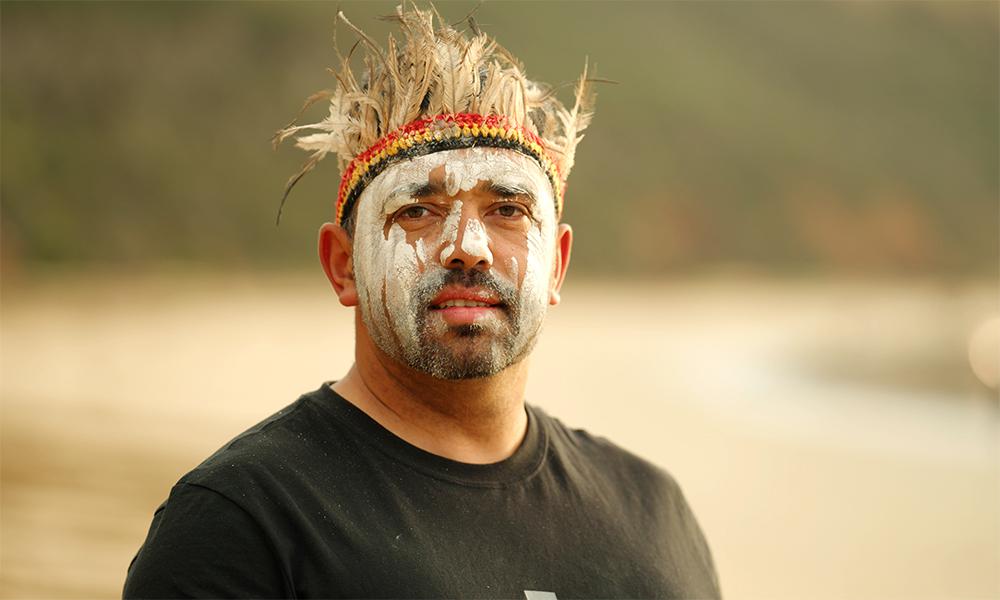
Lowell Hunter
Lowell Hunter, known as Salty One, is a Nyul Nyul man originally from the Kimberley region in Western Australia.
Lowell is very passionate about Aboriginal culture and traditional dance, which he has been practising since the age of ten. Lowell uses his feet to stamp, hop and carve the sand to create vast contemporary artworks that are integrated into the landscape and captured for posterity with drone photography. Years of cultural dancing are channelled into his works, and he carries a beat as he walks through the sand and creates art that connects to Country and culture.
Lowell also teaches other dancers how to create art. He recently partnered with the Koko dance troupe, a group for young Aboriginal boys from Warrnambool in Victoria. Together they created a specially commissioned piece that featured the shapes of eels and whales, a homage to the storytelling traditions of the Eastern Maar people, the original custodians of parts of Victoria's southwest.
In addition to creating art, Lowell delivers cultural strengthening programs in schools and facilitates interactive sand art and culture workshops with students on the beach.
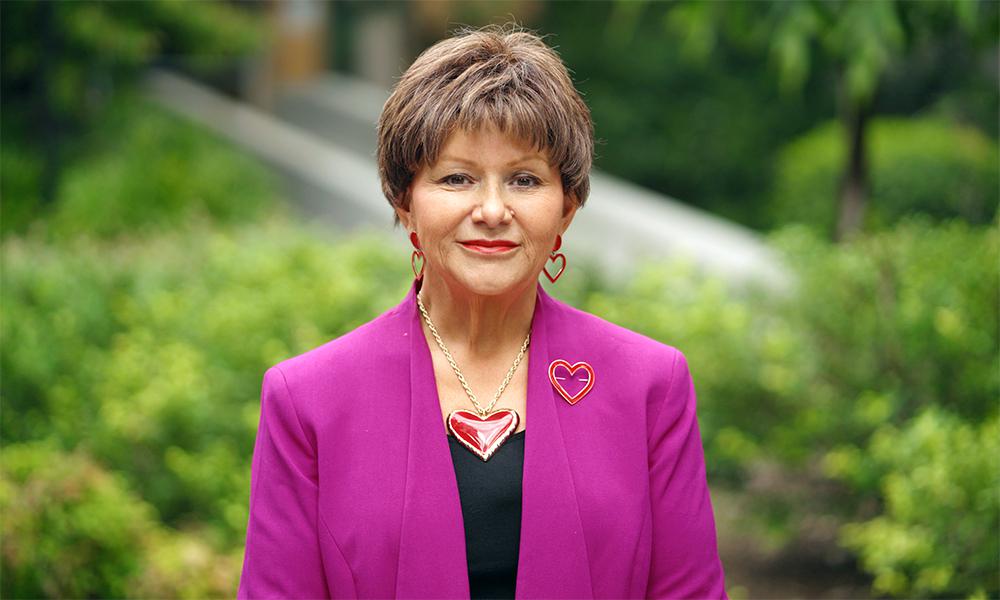
Professor Bronwyn Fredericks
Professor Bronwyn Fredericks is an Aboriginal woman living in Central Queensland. She has spent over 30 years directly involved in organisations working to improve educational outcomes for Aboriginal and Torres Strait Islander peoples, especially in regional and remote Australia. Professor Fredericks’ multidisciplinary research has a strong practice-based commitment to social justice and improving health, education and life outcomes for Indigenous peoples.
As the University of Queensland’s Pro-Vice-Chancellor (Indigenous Engagement), Professor Fredericks is responsible for leading the implementation of the Indigenous strategy and strengthening leadership within the University in relation to Indigenous engagement. She is also leading the implementation of the University of Queensland’s first Reconciliation Action Plan and building strong links with the community.
Professor Fredericks is a member of the Australian Institute of Aboriginal and Torres Strait Islander Studies (AIATSIS) Research Advisory Committee and the Beyond Blue National Research Advisory Committee. She is a National Aboriginal and Torres Strait Islander Higher Education Consortium (NATSIHEC) representative for Universities Australia and is a member of the Australian Research Council’s (ARC) College of Experts. In recognition of her significant contribution to the health of Aboriginal and Torres Strait Islander people, she received the Public Health Association of Australia’s inaugural Aboriginal and Torres Strait Islander Health Award in 2019.
Professor Fredericks is also a founding member of the Capricornia Arts Mob (CAM), a collective of Indigenous Australian artists, photographers, writers and poets based in Central Queensland. She is a prolific writer, producing many papers on health, education, women and Aboriginal and Torres Strait Islander peoples.
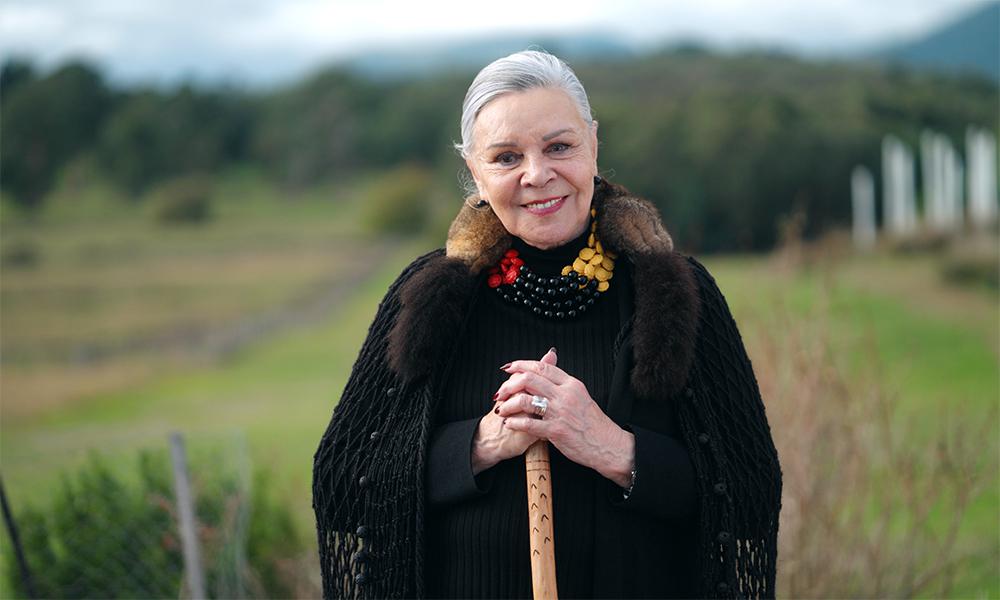
Dr Lois Peeler AM
Dr Lois Peeler AM is a Yorta Yorta and Wurundjeri woman. Her family comes from the Cummeragunja Aboriginal Reserves where activism for improved conditions for Aboriginal people was deeply embedded. In the 1960s Dr Peeler became Australia’s first Aboriginal model before joining the all-female Aboriginal and Torres Strait Islander singing group the Sapphires, which toured Vietnam during one of the world’s harshest wars.
In 1983, Dr Peeler and her sister Hyllus Maris established Australia’s only Aboriginal girls’ boarding school, Worawa Aboriginal College. Dr Peeler also worked as the Manager of the Aboriginal Employment Unit of the Victorian Public Service Board and headed Aboriginal Tourism Australia for over ten years where she was co-author of the Respecting Our Culture (ROC) accreditation program for the Australian tourism industry.
Recently, Dr Peeler worked with the Victorian Parliament to create a free e-learning resource for the Victorian curriculum called “Aboriginal Change Makers”, and currently chairs the Regional Aboriginal Justice Advisory Committee while being involved with the implementation of the Marrung Aboriginal Education Action Plan.

Koori Mail
The Koori Mail is the only fully Indigenous-owned and managed newspaper in Australia. Founded by a Walbunja businessman, Owen Carriage, the Koori Mail first went to print in May 1991. Published in both printed form and digitally each fortnight, it is a trusted voice for Aboriginal and Torres Strait Islander people with a circulation of around 10,000 and readership estimated to be close to 100,000 people.
The Koori Mail’s archive is available free of charge through the website of the Australian Institute of Aboriginal and Torres Strait Islander Studies (AIATSIS) - ensuring all Australians can access this important historical record thanks to new media.
Based in Lismore, New South Wales, the Koori Mail was significantly impacted by the floods this year, affecting both the organisation and those who worked for it. However, the paper immediately pivoted to distribute emergency information and provide disaster relief. Their coordination and leadership provided support to First Nations people and the wider community in and around Lismore during this difficult time.

Dr Stanley Grant Snr AM
Dr Stanley 'Stan' Grant Senior AM is an Elder and a warrior of the Wiradjuri people from south-west New South Wales. Dr Grant grew up in Griffith, NSW and spent time with his grandfather Wilfred Johnson (known as Budyaan) who spoke seven languages and taught Dr Grant the Wiradjuri language.
Dr Grant, his brother, the late Pastor Cec Grant OAM, and Dr John Rudder have been crucial to the reconstruction of the Wiradjuri language, travelling and re-teaching their language from a small base of anthropological records, rebuilding the spoken and sung language for urban and rural community members.
Their collaboration for more than three decades has seen the production of many resources, including a dictionary, children's books, song books and university texts. Through Dr Grant’s efforts, Wiradjuri is a living, changing language and people who are here today speaking this language are directly connected to the people who have spoken this language for thousands of years.
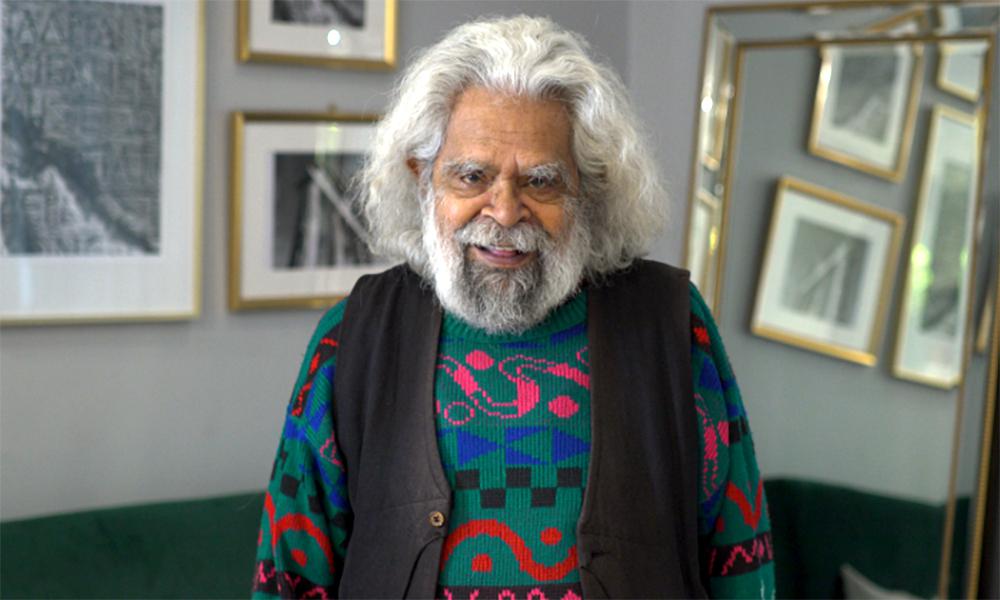
Uncle Jack Charles
Uncle Jack Charles is a Bunurong and Wiradjuri man, and a member of the Stolen Generations. He grew up in the Salvation Army Boys' Home at Box Hill, Melbourne as the only Aboriginal child, not knowing his heritage until the age of 17.
Uncle Jack is widely acknowledged as the grandfather of Indigenous theatre, co-founding Australia’s first Indigenous theatre group, Nindethana, meaning ‘place of corroboree’, or ‘ours’, at Melbourne’s Pram Factory in 1971. His plays and performances have won many awards over the years, and have toured across Australia and internationally. He is a respected Elder on the Council of the Archie Roach foundation, and a tireless advocate for young men caught up in the prison system.
He made history this year as the first Indigenous Elder to speak at the Victorian Truth-telling Commission. The Yoorrook Commission will establish official record of Indigenous experiences since colonisation, and Uncle Jack spoke honestly and with raw emotion about his experiences. Uncle Jack is a beloved Elder, and, as he describes himself – a survivor.
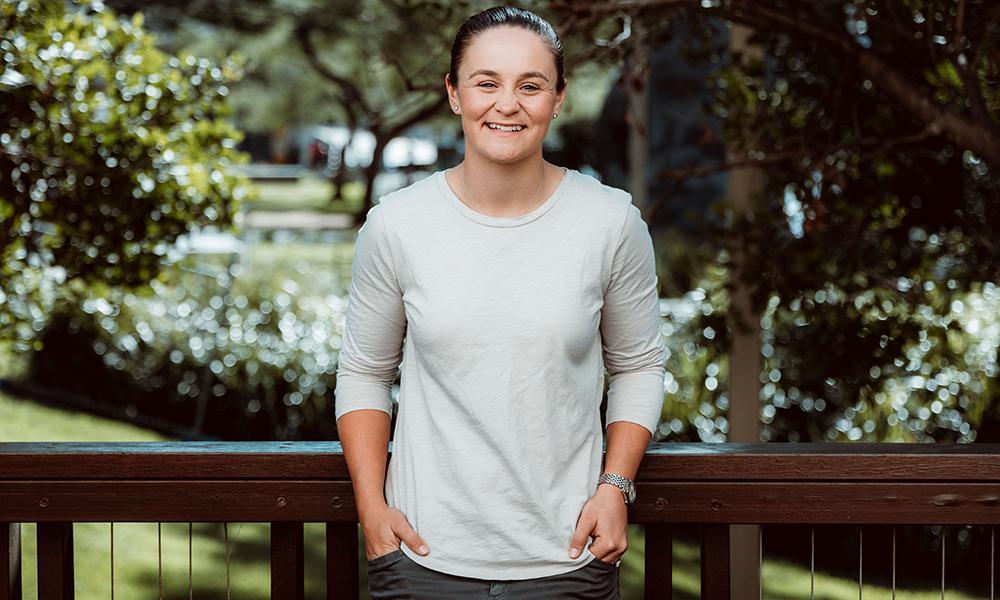
Ashleigh Barty AO
Ash Barty AO was born in Ipswich, Queensland. Through her great-grandmother, Ash is a member of the Ngarigo people, the Aboriginal people of southern New South Wales and north-eastern Victoria.
Now retired from professional tennis, Ash was not yet five when she met junior tennis coach Jim Joyce, who saw great potential in her when she hit the first ball he threw right back.
She was the second Australian tennis player to be ranked No. 1 in the world in singles by the Women's Tennis Association (WTA) after fellow Indigenous Australian Evonne Goolagong Cawley AC. She was also a top-10 player in doubles, having achieved a career-high ranking of No. 5 in the world. Ash is a three-time Grand Slam singles champion, the reigning champion at Wimbledon and the Australian Open, and also a Grand Slam doubles champion.
In 2018, Ash was named National Indigenous Tennis Ambassador by Tennis Australia to encourage more Indigenous youth to get active, and to provide opportunities for them to explore their passion and grow their love for the sport.
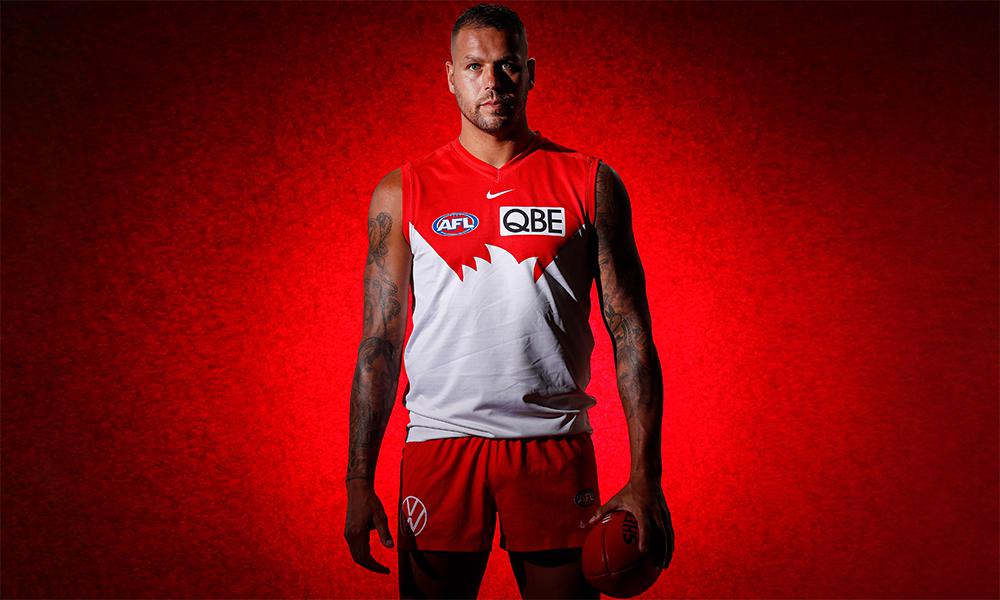
Buddy Franklin
Lance ‘Buddy’ Franklin grew up in Dowerin, WA with his mother Ursula, a Whadjuk-Noongar woman, father, Lance Snr and sister, Bianca. Buddy’s AFL career is one of the greatest in Australian Rules Football having kicked over 1,023 goals, the most of any current player and the sixth-most in VFL/AFL history.
In his career to date, Buddy has won two premierships, eight All-Australian selections, four Coleman Medals and a Peter Crimmins Medal in his time at Hawthorn and Sydney. He has also represented Australia in the 2013 International Rules Series.
Buddy is also a staunch advocate for the rights of Indigenous Australians. In 2017 he was one of a number of players to wear the number 67 on his back during Sir Doug Nicholls round in commemoration of the 1967 Referendum to fully include Indigenous Australians in the census.
He has also been a champion for mental health – being open about his struggles with depression in an effort to destigmatise the mental illness among Australian men, particularly in the AFL.
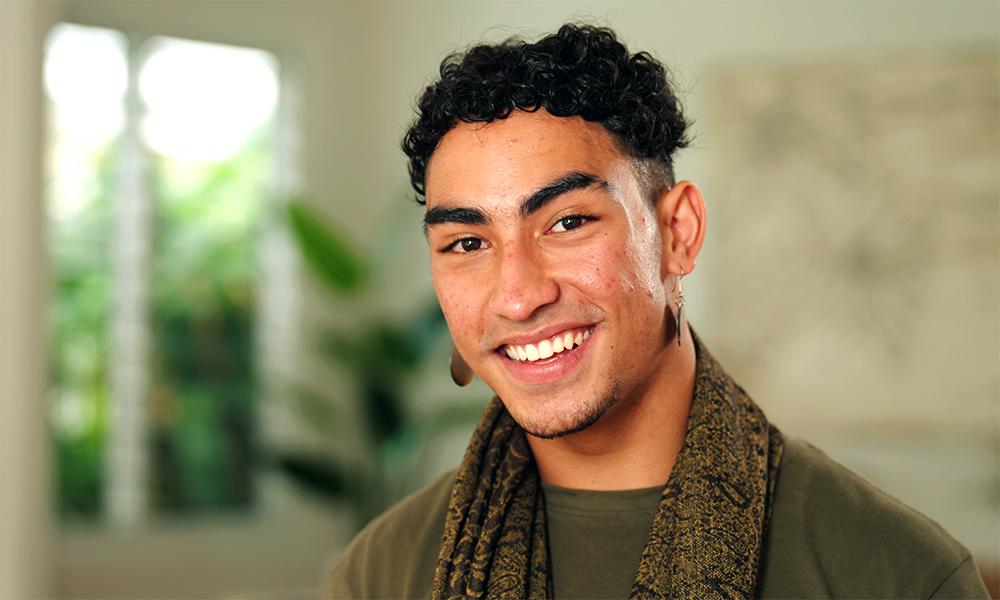
Elijah Manis
Hailing from the islands of Masig and Poruma in the Torres Strait, Elijah is a young islander who is passionate about social justice issues and the effects of climate change on the Torres Strait. His dream is to ensure that the elders can rest in peace on their island home without fear of it being swallowed by the oceans. He also wants to ensure that in another 10,000 years his people can still practice their cultural dance, tradition and language on the shores of the islands where they were originally established.
Elijah says it took one Torres Strait Islander man, Eddie Mabo, to lead the change for Australia by overturning terra nullius and that he will Get Up! Stand Up! and Show Up! to save the islands.
He hopes his forefathers will guide him and that, together with his Elders, he can use the power of the sacred saying “The land and sea is yours, it is now your turn to look after it” to heal country.
2021
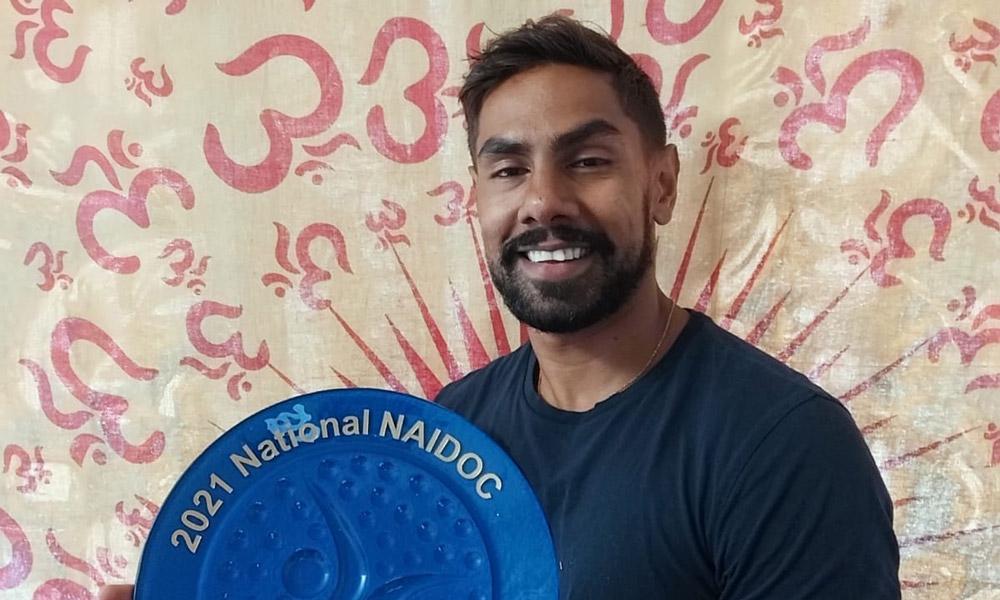
Jarron Andy
Jarron Andy is a Waanyi, Djiru, Kuku Yalanji and Yindinji man who grew up in Innisfail, one hour south of Cairns in far-north Queensland.
A former banana farmer and painter he ventured into a modelling career after winning the 2016 Face of Cairns Central competition and later working at the Virgin Australia Melbourne Fashion Festival.
Jarron undertook a ten-week apprentice course with Channel 75 Openshop becoming Australia’s first ever Indigenous Home Shopping TV Presenter.
Jarron says his proudest achievement was to host a NAIDOC week special on the Channel 75 network promoting Indigenous Businesses and getting to share his culture with audiences all around Australia.
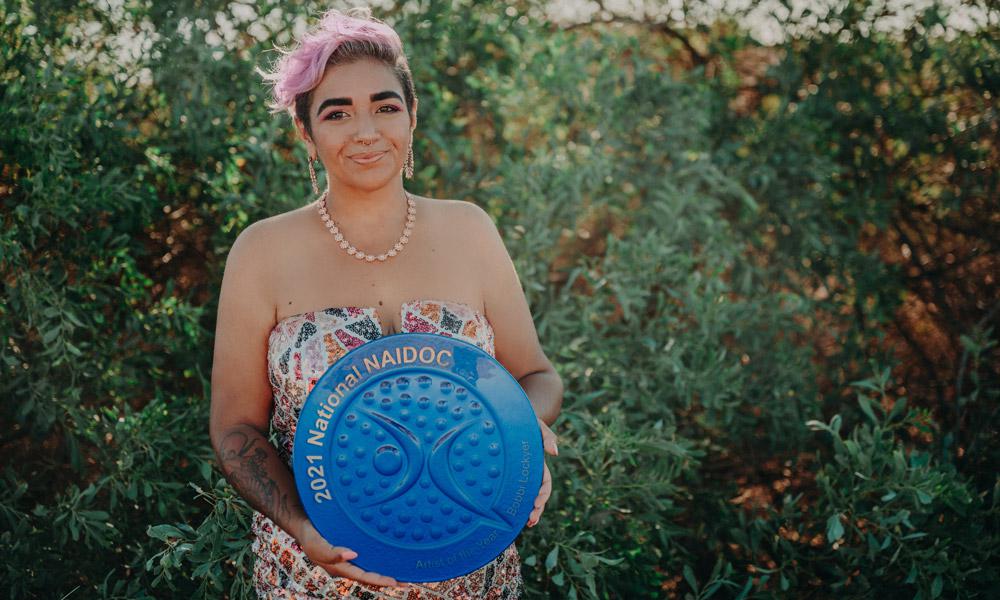
Bobbi Lockyer
Bobbi Lockyer is a Ngarluma, Kariyarra, Nyulnyul and Yawuru woman born and based on Kariyarra Country in Port Hedland in Western Australia’s Pilbara region.
She is an amazing artist and advocate for all Aboriginal and Torres Strait Islander People who empowers women through both her photography and design, working with a variety of art mediums including painting, graphic design and photography.
Bobbi is an official creator for Nikon Australia and her work has been published all over the world including in Vogue Magazine and New York Fashion Week.
Proud Mother of four, Bobbi says her children are her biggest inspiration and the reason for her strong connection to motherhood and country.
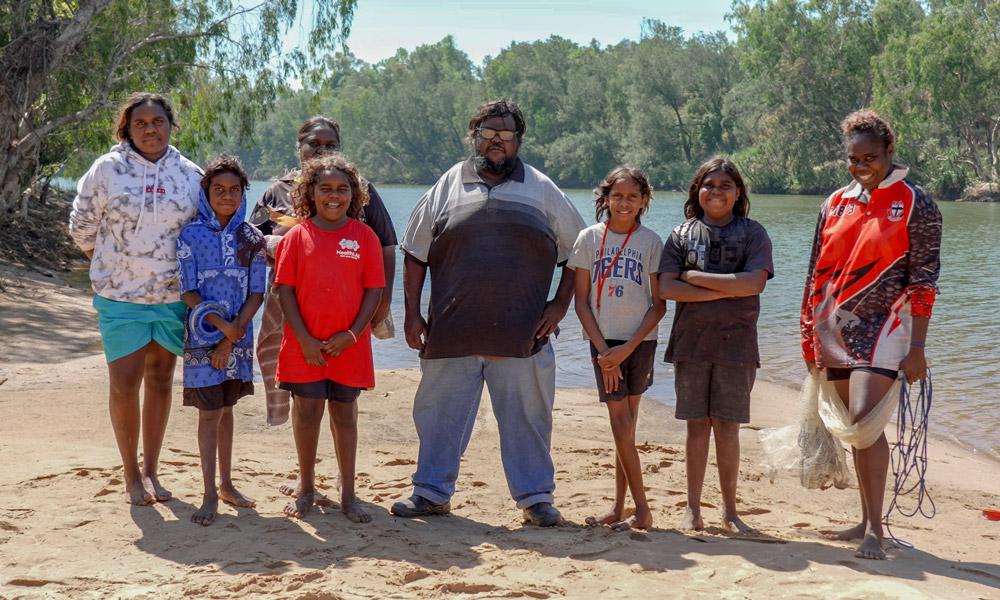
Gadrian Hoosan on behalf of the Borroloola Community
The town of Borroloola is located 10 hours south-east of Darwin on the McArthur river near the Gulf of Carpentaria. The area is home to the Yanyuwa, Gurdanji Garawa and Mara people.
For the past 8 years, Traditional Owners and the Borroloola community have been trying to stop new gas projects they say encroach on their Country and threaten the environment and Culture.
Community representative Gadrian Hoosan is helping his community to lead the fight in restoring and preserving the unique and precious land and waterways for future generations to come.
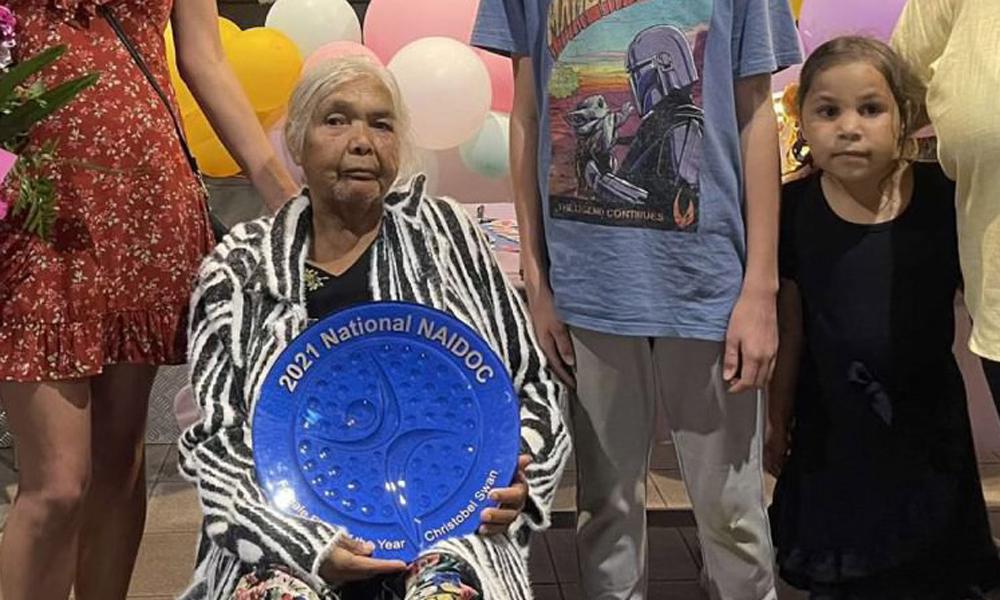
Christobel Swan
Christobel Swan is a proud Pertame, Southern Arrernte woman from Central Australia.
As one of the last few remaining fluent speakers of her language, she has been working her entire life to fight for Aboriginal language rights, and gift her language to the next generations. She was part of the first team of Aboriginal Interpreters in Australia, working for 30 years to provide vital information to Indigenous people in their first language. She is also the founder of the Pertame School, a community-run language revival program running on-country language camps, school classes, holiday programs, adult classes and a Master-Apprentice Program to create the next generation of fluent Pertame speakers.
Christobel is a loving mother, grandmother, and great-grandmother, always open to help family or friends in need. Nwerna Pertama relha mapa nema. Nwerna nhanhala kweta nema. Nwernaka ngetya itya yerrema. We are Pertame people. We have always been here. Our language will never finish.
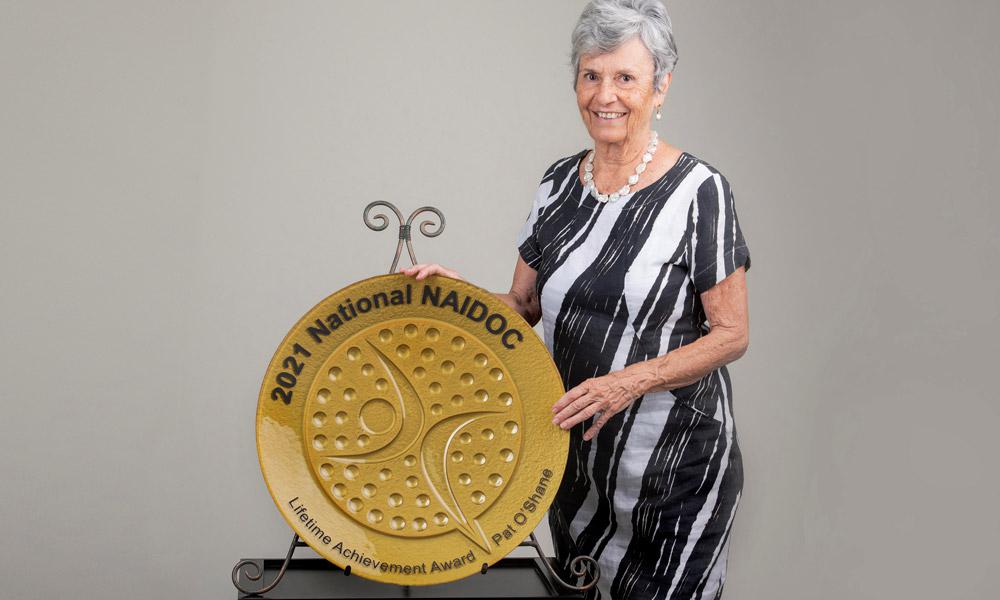
Pat O'Shane AM
Pat O’Shane AM, is a proud Kuku Yalanji woman from Mossman, one hour north of Cairns.
Pat is by far one of our greatest achievers of all time with a list of many firsts. This includes being the first female Aboriginal teacher in Queensland, the first Aboriginal Magistrate in Australia, and the first woman and Aboriginal person to be the head of a Government department.
Voted as one of Australia's living treasures by the National Trust, she is an inspirational leader, an inspirational woman and a hero to us all.
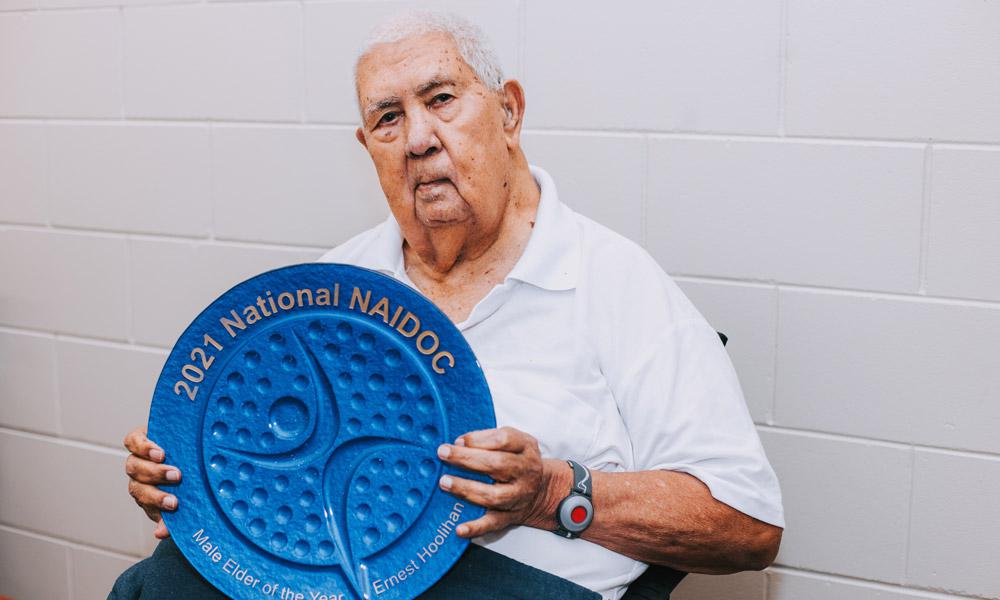
Ernest Hoolihan
Uncle Ernest Hoolihan was born in the far-north Queensland town of Ingham, later moving to Townsville with his family. There he became the first Indigenous person to attain a scholarship with the Townsville Grammar School.
A keen athlete, Ernest had a passion for many sports including Athletics, football and table tennis.
In 1973, Ernest and his late wife Maud established Yumba-Meta Limited, a service that provides long term affordable accommodation to disadvantage people.
Today he continues to make significant contributions to the advancement of individual wellbeing in Aboriginal and Torres Strait Islander communities.
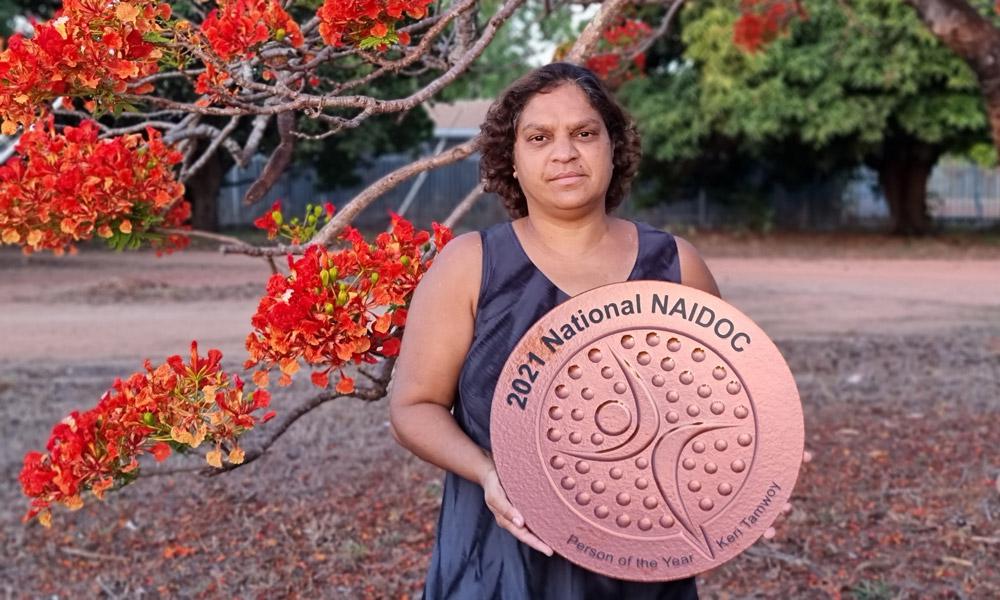
Keri Tamwoy
Keri Tamwoy is of the Putch people, Wik Mungkan, in the community of Aurukun located in the remote western Cape York Peninsula.
She is the co‐founder of the Wik Women’s Group which champions for education and safety of women and children. She also has a leading role in a recent Cape York campaign to co‐design strategies to combat youth sexual violence.
Keri says her proudest achievement is being appointed from her community Elders as ‘Thaa Punt’, the peacemaker.
She is a reformed leader and the newest mayor of Aurukun and, through her hard work and resilience, believes she will not stop until her local people have power over their own lives.
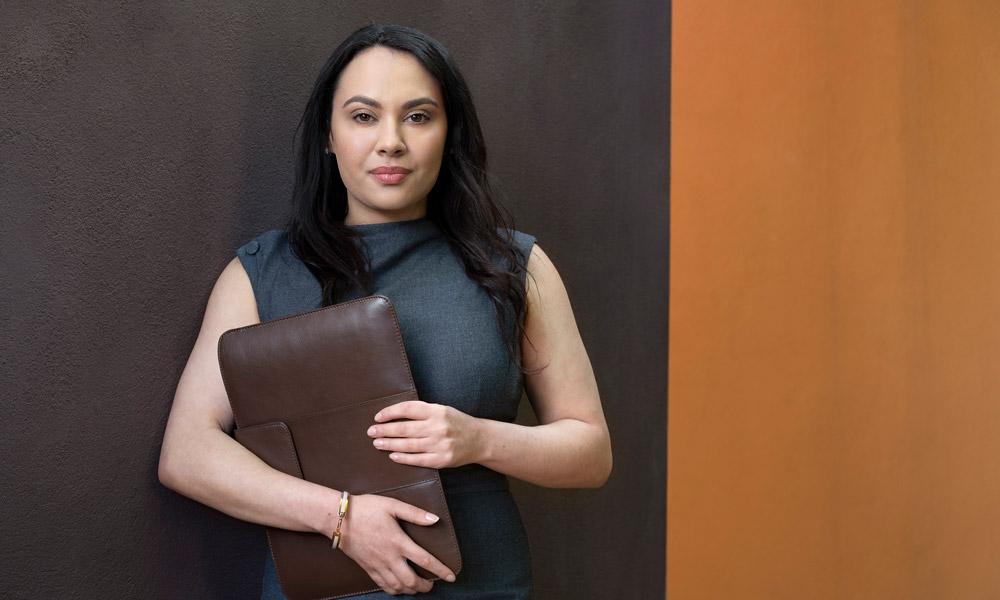
Sasha Purcell
Sasha Purcell is from the “Whaleboat” family from Mer Island in the Torres Strait.
Sasha holds degrees in International Relations and Foreign Affairs as well as Law, and is currently completing a masters of Law in International Legal studies at New York University.
In 2019, Sasha was invited to speak at the United Nations in Geneva about Torres Strait Islander peoples and the impact of climate change on the islands.
Sasha has a particular interest in the preservation and advancement of Indigenous human rights and on completion of her studies she intends to become a human rights expert at the UN.
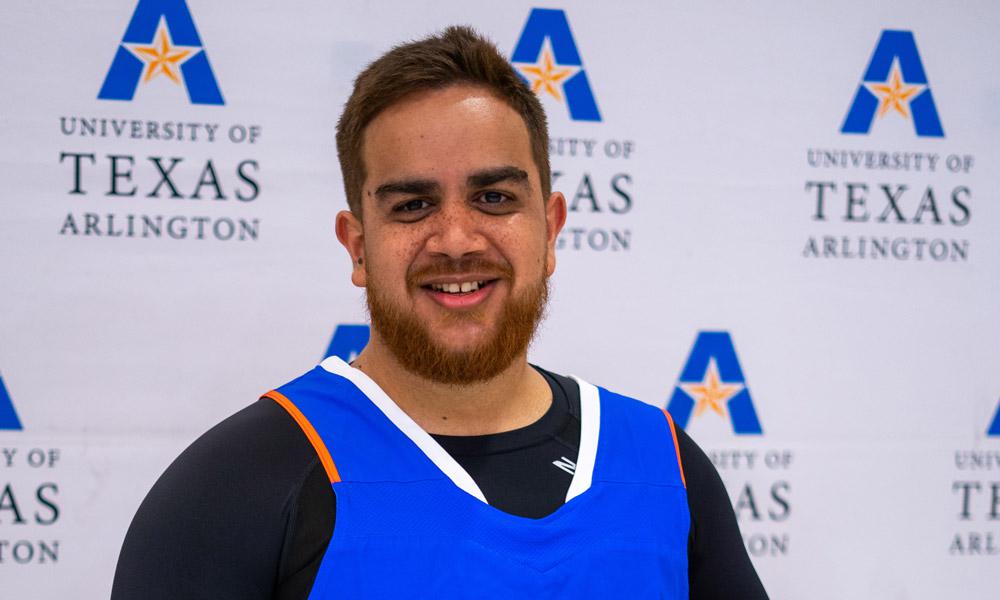
Clarence 'CJ' McCarthy-Grogan
CJ McCarthy-Grogan is a Yanyuwa, Garrawa, Kuku-Yalanji man from Darwin where his passion for wheelchair basketball has made him legendary.
CJ made his official Australian debut at the Tokyo Invitational Tournament in September 2019 and, since then, has become only the second Aboriginal person to represent Australia in the history of wheelchair basketball.
He is currently studying Public Health at the University of Texas Arlington, in the United States, and at the time of writing was training for the 2021 Australian Tokyo Paralympics team.
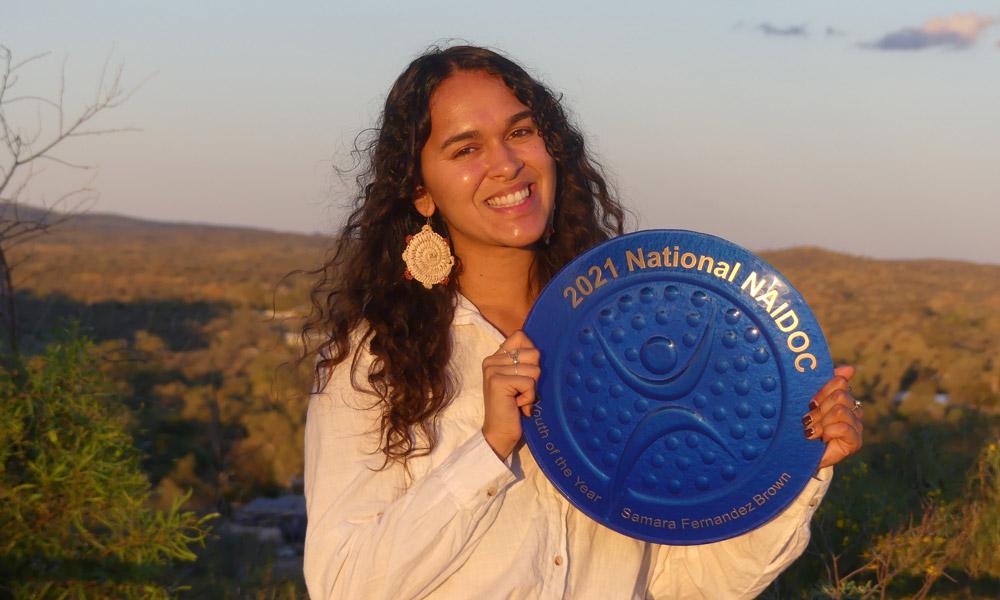
Samara Fernandez-Brown
Samara Fernandez‐Brown is a proud Warlpiri woman from Yuendumu, located three hours north-west of Alice Springs.
Samara is an incredible advocate for her people and has become a social justice activist following the shooting and death of her cousin, Kumanjayi Walker in 2019. She has become a vocal activist, coordinating the “Justice For Walker” campaign, liaising between Warlpiri Elders and the police, judicial system and the media, organising rallies, fundraising to cover the case’s legal fees all while remaining a peaceful, thoughtful and impassioned spokesperson for her family, community and the broader deaths in custody movement.
She is a board member of the Dhadjowa Foundation, a national grassroots organisation that's been established to provide strategic, coordinated and culturally appropriate support for Aboriginal and Torres Strait Islander families whose loved ones have died in custody.
Completing her schooling in Adelaide, she is now studying a bachelor’s degree in Psychology at the University of South Australia. After graduating, she’s hoping to use these skills to help young Aboriginal and Torres Strait Islander people overcome ingrained disadvantage and realise their inherent resilience and strength.
2019
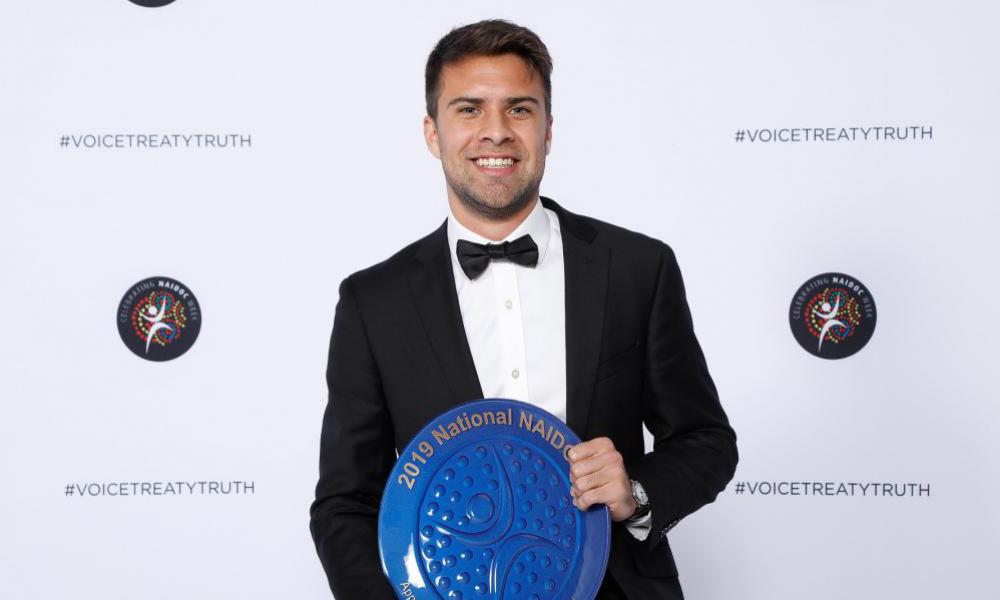
Ganur Maynard
Honours student Ganur Maynard has completed multiple apprenticeships with prestigious law firms, opening up a world of career opportunities.
Born in Dubbo, Ganur is a descendant of the Gamilaroi people. He grew up in in Newcastle and has strong ties with the local Worimi community and is a member of the Worimi Aboriginal Land Council. Ganur is in his final year of study for a Bachelor of Law/Arts at the University of New South Wales (UNSW).
He is a student representative on the UNSW Law Reconciliation Committee and recipient of a Nura Gili Academic Excellence prize in the Faculty of Arts and Social Sciences. In 2018, Ganur undertook a German-language apprenticeship at one of the largest international law firms in the world - Hogan Lovells. Based in Hamburg, Ganur utilised his language skills to translate documents from German to English. Ganur has also completed internships with King Wood Mallesons, Westpac, Herbert Smith Freehills and the Australian Law Reform Commission.
He has accepted a position with Herbert Smith Freehills as a full time clerk and is due to commence in 2020. His aim is to use his law career to protect native title and work in property and litigation.
Ganur is an inspiring role model who encourages other students to complete internships.
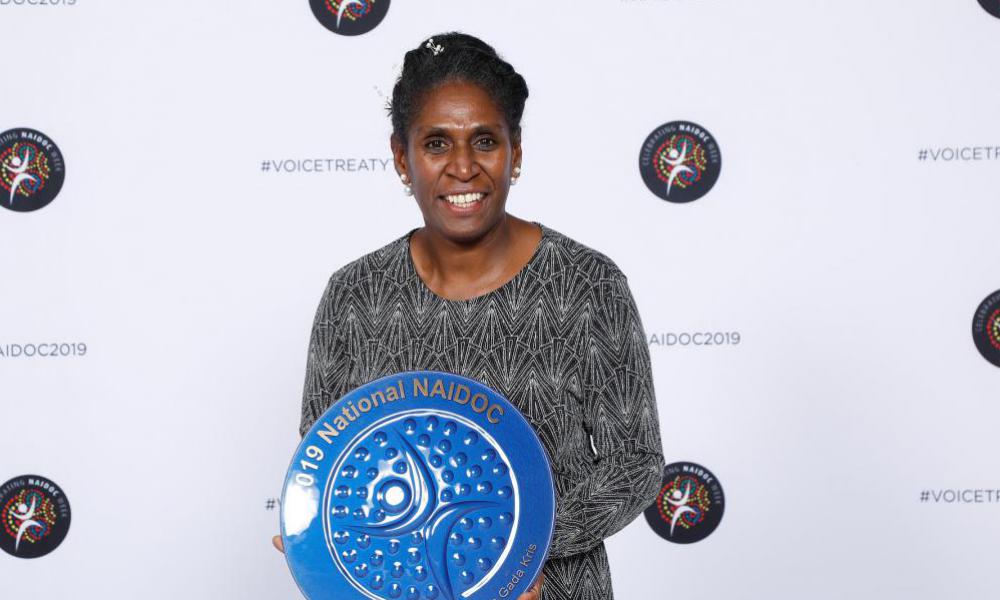
Elma Gada Kris
Elma Kris is a proud Torres Strait Islander woman who grew up on Thursday Island.
She is a respected dancer, choreographer and teacher, who has performed on stages around the world.
Elma recently retired as Bangarra Dance Theatre’s longest serving dancer, after more than 20 years with the organisation. As a senior member of the group, she had been a mentor to younger dancers in the company and a trusted advisor in the development of new work; shaping and bringing Torres Strait Islander stories to the stage.
Her choreographic credits include Malu (Bibir dance company, 1998), Bupau Ipikazil and Bupau Mabigal for NAISDA, 1994) and Torres Strait Islander components of the Sydney Olympics Opening Ceremony (2000) and Emeret Lu (Bangarra Dance Theatre, 2007).
Elma’s knowledge of culture and the art of dance, story-telling and song have given her the reputation of an artist, respected by her peers and audience members alike.
Since her retirement this year, Elma has returned to Thursday Island to nurture the next generation of artists and leaders in her own community.
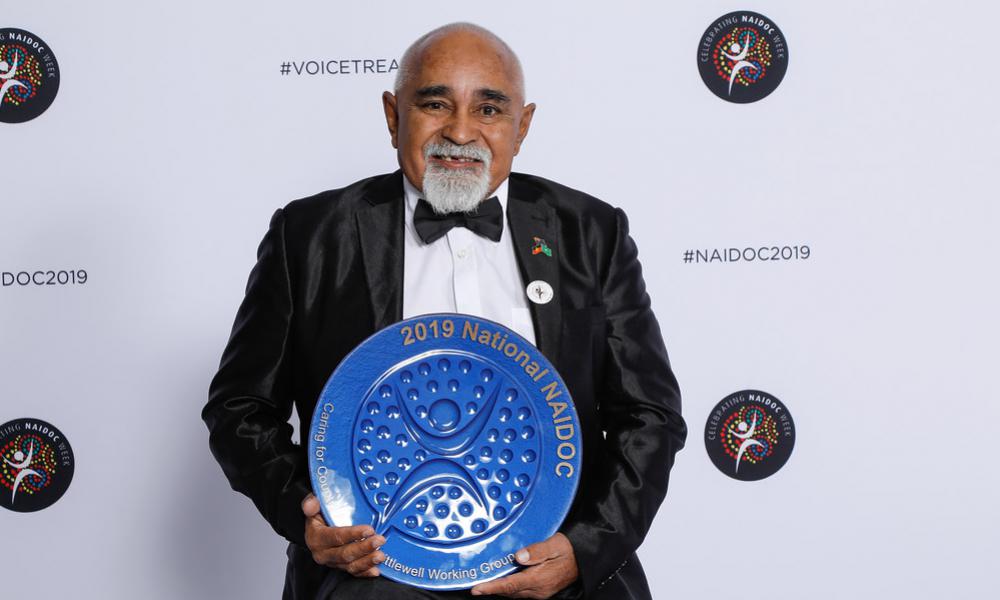
Littlewell Working Group
“Gungoo (Uncle), can you tell and show us where we belong?”
For Thomas Cameron of the Littlewell Working Group, this was the question that started the journey to protect the Littlewell Aboriginal Reserve.
Located on the outskirts of Mingenew, a town nearly 400 kilometres north of Perth, the Littlewell Reserve closed in 1972 and handed over to the Mingenew Shire for light industrial use.
In 2010, a group of 30 elders and former residents of the Littlewell Reserve came together to form the Littlewell Working Group. The group’s aim was to restore 10 acres of Country and preserve the stories and cultural knowledge of the area.
The members of the Littlewell Working Group worked tirelessly, using their own resources, time and money to restore and maintain the Reserve, while working with community stakeholders.
To commemorate the lives and stories of the Littlewell mob, the Working Group worked with Indigenous Community Volunteers to create oral histories of the Littlewell Elders and develop a heritage trail to commemorate the people who have lived in the Littlewell community.
Their dream became a reality in 2019 with the official opening of the Littlewell heritage site.
The Littlewell Reserve is now a protected place of healing, language, belonging, history, heritage and culture. Giving back to future generations the stories of their past.
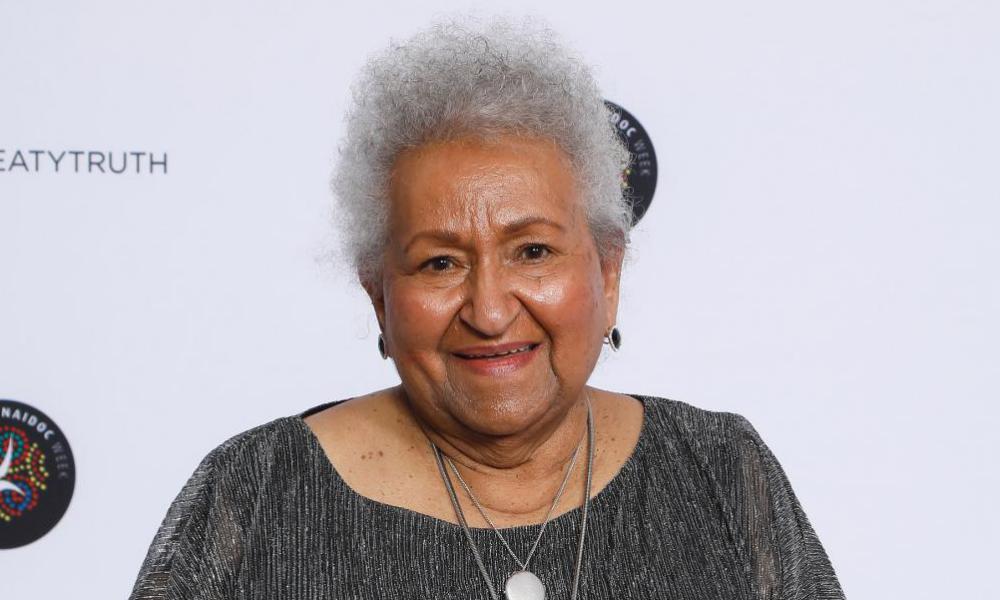
Thelma Weston
Thelma Weston, a descendant of the Meriam people of the Torres Strait, is like no other. Her life is a story of survival, achievement, hope, love and celebration.
Despite only having a limited education, Aunty Thelma trained as a nurse and became a fully qualified health worker.
At age 83, Aunty Thelma still works full time at Winnunga Aboriginal Health and Community Services in Canberra, using her skills to manage the needle exchange program.
She has a long history of outstanding involvement and achievements in the community and has sat on a number of local and national committees and boards.
Aunty Thelma is on the board of the National Aboriginal and Torres Strait Islander Health Worker Association (NATSIHWA) and regularly travels across Australia to attend board meetings.
As a breast cancer survivor, Aunty Thelma has worked with Breast Cancer Network Australia to encourage other Aboriginal and Torres Strait Islander women to connect, seek support and information about the disease.
Aunty Thelma is much loved, admired and well respected, not only in her workplace and amongst her clients, but in the wider ACT community and across Australia. She is a wonderful example of a wise and caring Torres Strait Islander woman who has achieved much for her family and community.
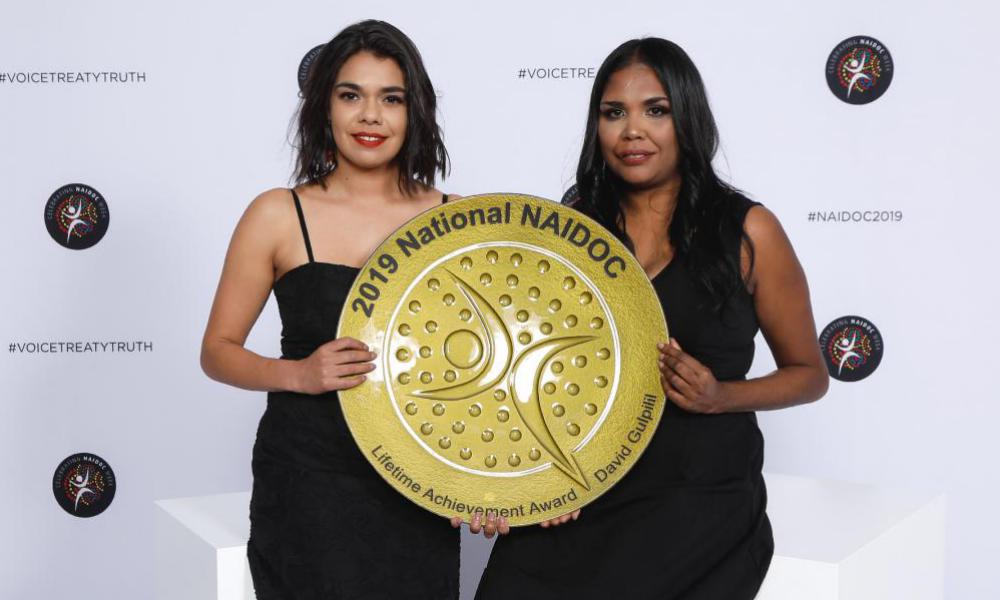
David Gulpilil Ridjimiraril Dalaithngu, AM
Father, Grandfather, Brother, Actor, Artist, Ceremonial Dancer, Hunter and Tracker.
Renowned Yolngu Elder, David Gulpilil AM revolutionised the way the world saw Aboriginal people, by bringing traditional culture to the screen.
Growing up in the bush of Arnhem Land, David spent his childhood submerged in the customs and traditions of his people.
On Gurparlil Country he gained the skills, knowledge and expertise to take custodial responsibility for his county, to take care for his family and extended clans and lead cultural ceremonies and rituals.
As an artist David has made an outstanding contribution to the representation of Aboriginal and Torres Strait Islander people nationally and internationally, introducing audiences to traditional practices and Aboriginal forms of interpersonal communication.
His breakthrough performance in Walkabout remains one of the most iconic and compelling performances of all time.
With a career spanning 50 years, David acted in some of the most renowned works in Australian cinema history, including Storm Boy, The Last Wave, Mad Dog Morgan, Crocodile Dundee, The Tracker, The Proposition, Australia, Ten Canoes and Rabbit Proof Fence.
Beyond the screen, David is a highly respected Elder, ceremonial dancer, mentor, leader and advocate for homeland, teaching the Yolngu culture.
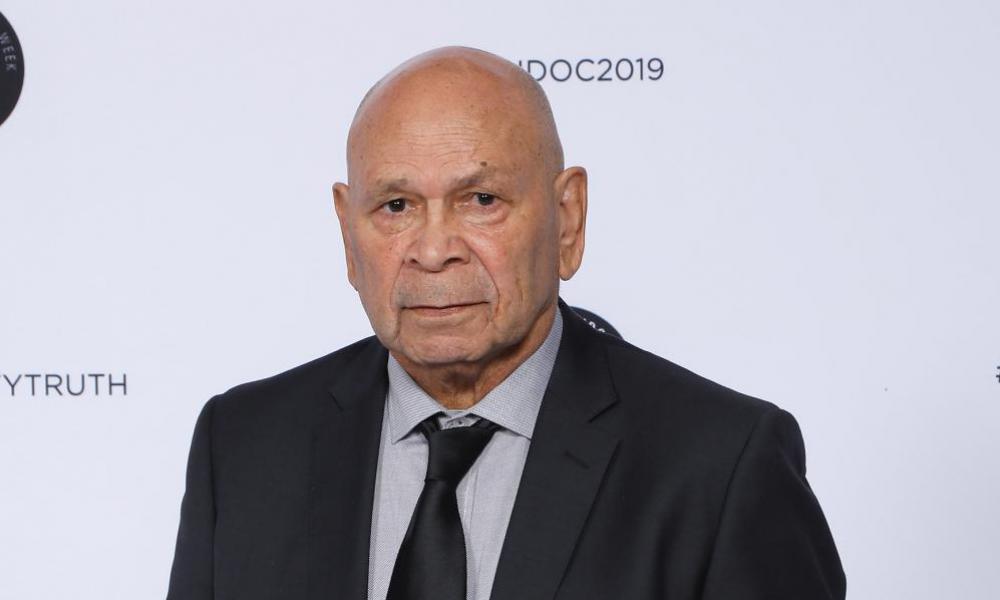
Greg Little
Highly respected Elder of Noongar Boodjar, Uncle Greg Little is a man of respect and dignity.
For the past two decades he has worked as a Prison Support Officer at the Bunbury Regional Prison, and now plays a major role in the management, leadership and mentoring of the prisoner peer support group.
Uncle Greg is an active member of the prisoner risk assessment group and provides supportive crisis counselling, group and family counselling. His work has helped inmates make positive connections with their families and each other.
As part of the restorative justice process, Uncle Greg fosters programs and events to assist Noongar and other Indigenous prisoners to recover their culture. In Yarning Circles, Greg provides guidance, instruction and direction to the men, needed for strengthening them for the future.
Uncle Greg is deeply respected by Indigenous and non-Indigenous people throughout communities in the South West of Western Australia. They come to pay their respects, ask advice, listen quietly, and respond to his direction.
Uncle Greg has a core set of values which he role models every day. He treats people with respect and accords everybody dignity regardless of their family, ethnicity and position in life.
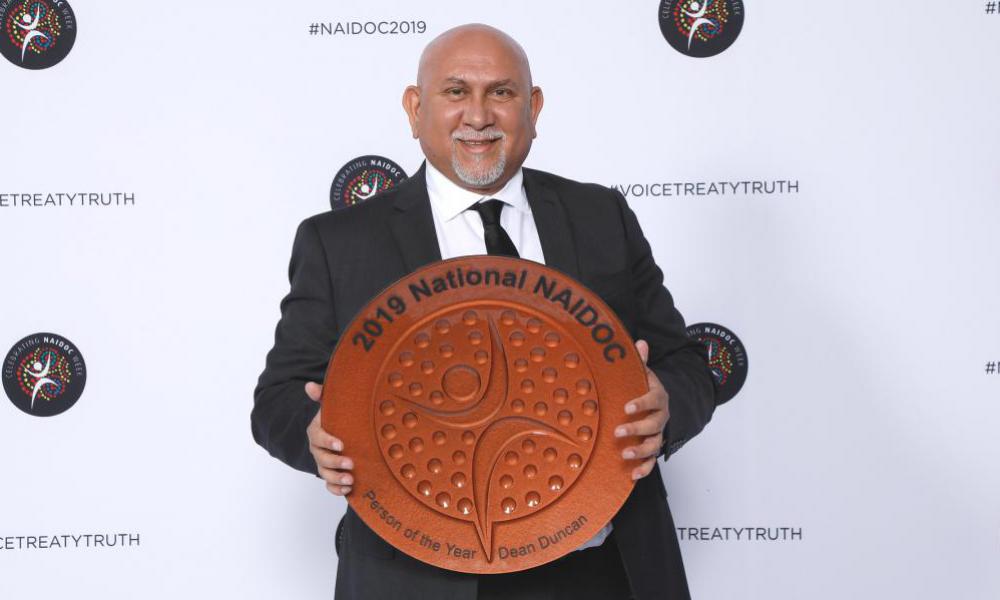
Dean Duncan
Dean Duncan is a champion of diversity, social justice and equality. A proud Kamilaroi man from Moree; Dean has made a lifelong contribution and commitment to advocating for Aboriginal and Torres Strait Islander people, their families and communities.
He has spent more than 17 years as a teacher and senior lecturer, with the aim of increasing the number of qualifications held by Aboriginal and Torres Strait Islander people.
As the Associate Director of Indigenous Education at the Weemala Indigenous Higher Education Unit, he introduced the first Bachelor of Midwifery (Indigenous) and Away from Base program – a key component in the Closing the Gap strategy for maternal health outcomes.
Dean’s inclusive approach and fierce advocacy for diversity make him an inspirational role model for all Australians. He is the National Diversity Manager at Lifestyle Solutions, supporting people living with disabilities and young people in Out of Home Care. He leads the organisation’s diversity and inclusion program, championing the recruitment of people from diverse backgrounds.
Dean has dedicated his life to making a difference and our future generations will benefit from his commitment.
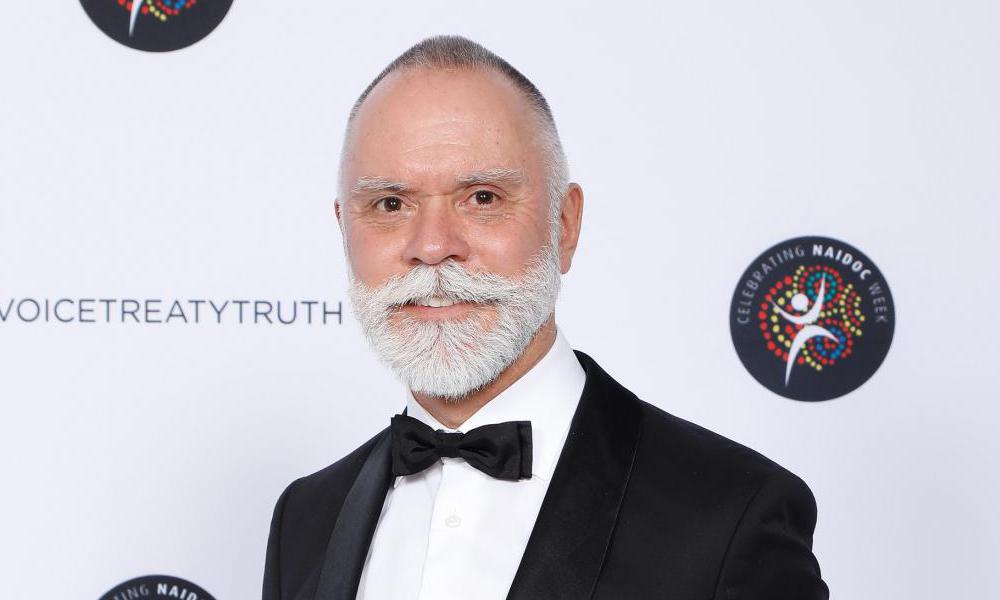
Professor Michael McDaniel
Professor Michael McDaniel is a proud member of the Kalari Clan of the Wiradjuri Nation.
He has led a distinguished career in Indigenous higher education and has a record of service to the arts, culture and community which spans more than 30 years.
At a young age Michael joined the 5th/7th Battalion, Royal Australian Regiment, Royal Australian Infantry Corp. He served in Australia and Malaysia and was awarded the Australian Defence medal and the Australian Service Medal.
Following his military service he embarked on a career in civil service and academia, in which he excelled.
Michael is the Pro Vice-Chancellor (Indigenous Leadership and Engagement) and Director of Jumbunna Institute for Indigenous Education and Research at the University of Technology Sydney. He is also a Professor of Indigenous Education.
Since his commencement at UTS there has been a tremendous increase in all Indigenous education and employment rates, including a 100% employment rate of Indigenous graduates within 3 months of graduation. As well as being the driving force behind UTS’s plan to establish Australia’s first Indigenous residential college.
He is a member of the National Aboriginal and Torres Strait Islander Higher Education Consortium (NATSIHEC) and the World Indigenous Nations Higher Education Consortium (WINHEC).
Michael’s actions, reputation and achievements make him an inspirational role model for Aboriginal and Torres Strait Islander peoples and the broader Australian population.
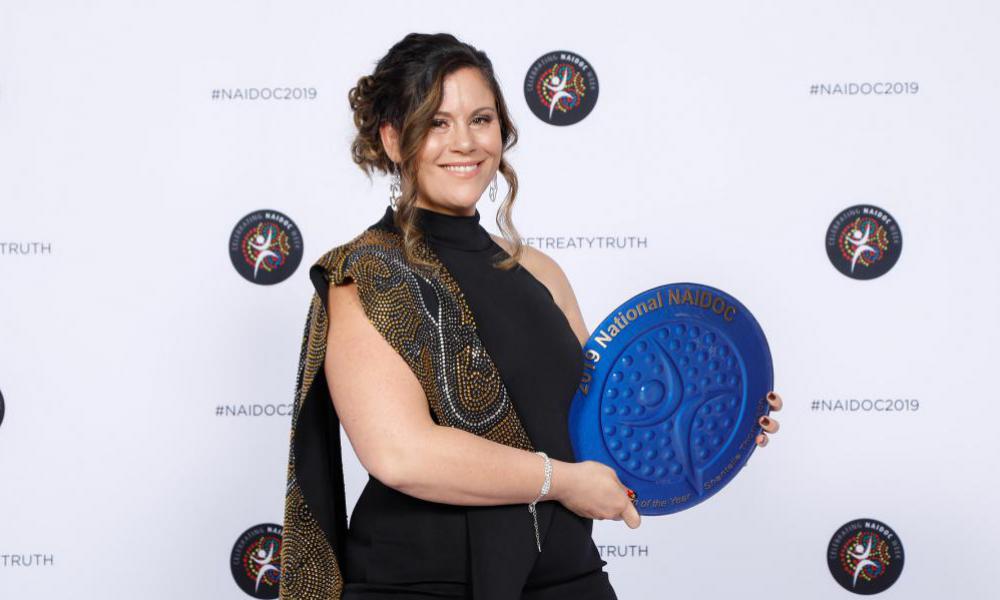
Shantelle Thompson
Shantelle Thompson is known in her community as the ‘Barkindji Warrior’ a fighter and warrior for her people.
She has always fought to be a protector and role model for her family and community from a very young age.
Overcoming abuse, disadvantage and bullying, Shantelle has fought to change her path and challenge the stereotypes and boundaries she faced as an Aboriginal girl from the small country town of Dareton, New South Wales.
After developing severe post-natal depression following the birth of her twins, Shantelle began Brazilian Jiu-Jitsu training in 2011 as a form of physical therapy to help treat her depression and fight her way back.
After 6 months of training Shantelle competed in the South Australian state titles, winning 2 titles in her first competition. In 2012 she won her first national title and, from this, the dream of becoming a world champion was born.
Shantelle moved her young family to Melbourne, away from Country, to finish her double degree - Bachelor of Arts/Bachelor of Teaching and to pursue her Jiu-Jitsu dream.
She achieved her goal, winning the Jiu-Jitsu world championship 3 times. Shantelle is currently ranked 7th in the world for IBJJF and continues to set new goals for herself.
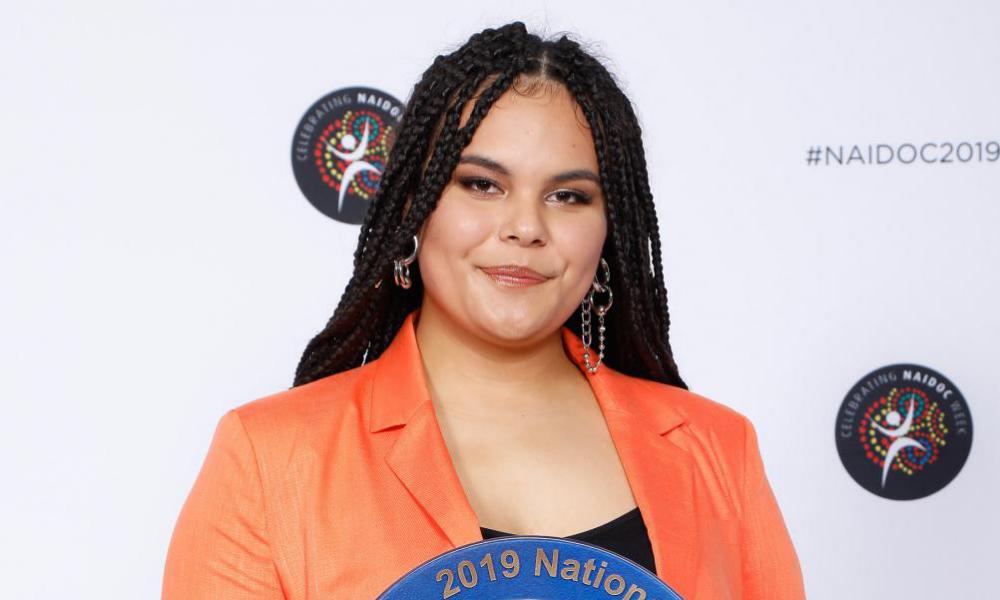
Mi-kaisha Masella
Mi-kaisha Masella is a proud Darumbal Murri and Tongan woman who is part of the inner city Aboriginal community of Sydney and the central Queensland Aboriginal community.
Mi-kaisha is a social entrepreneur and political activist who has a national reach and is regularly featured on SBS, ABC and NITV. She frequently speaks about contemporary issues which impact young Aboriginal people.
She is an advocate for young Indigenous voices in decision making and the empowerment of others as the ‘architects of their own destinies’.
Mi-kaisha is a founding member of the Steering Committee for Kimberwalli at the Western Sydney Indigenous Centre of Excellence. She advocates approaches that allow young Aboriginal people to have a voice through creative expression; acknowledging that young people need different ways to express themselves, tell their stories and be heard.
Mi-kaisha uses music to engage, inform and incite debate about issues affecting Indigenous people. She uses the medium of song to share strength and hope and celebrate the unbreakable, ancient connections we have with each other and with our culture.
Mi-kaisha is the first Indigenous Australian to be accepted into an undergraduate degree at the Clive Davis Institute of Recorded Music at New York University.
2018
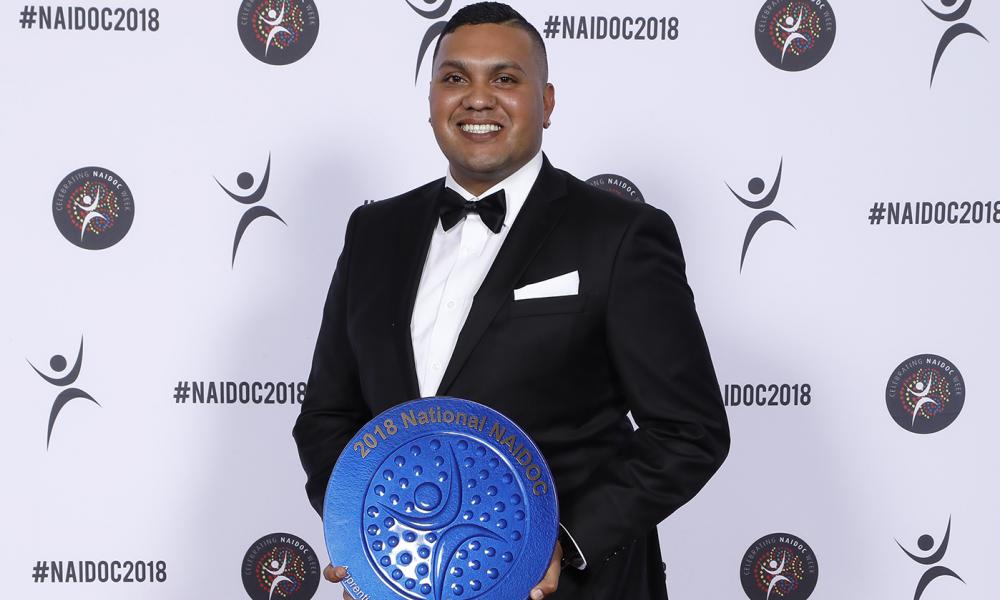
Folau Talbot
Folau Talbot, from Boggabilla, NSW, is a qualified dental technician, and was the first recipient of the Dental Technology Scholarship Program from the University of Sydney.
Folau began his career as a dental assistant with Queensland Health, but knew he wanted to further his career.
He transferred to dental technician training through the Poche Centre for Indigenous Health, receiving the 2016 Aboriginal Student of the Year from TAFE, Western Sydney.
Working with the Poche Centre, Folau travels through regional NSW in a mobile denture clinic, providing dental services for people living in rural and remote Indigenous communities.
Folau’s work puts smiles back on people’s faces, which he says is ‘the best feeling ever.’
Folau has big plans for his career. He wants to train as a dental prosthetist, own his own dental business and one day be the Director of an Aboriginal Health Centre.
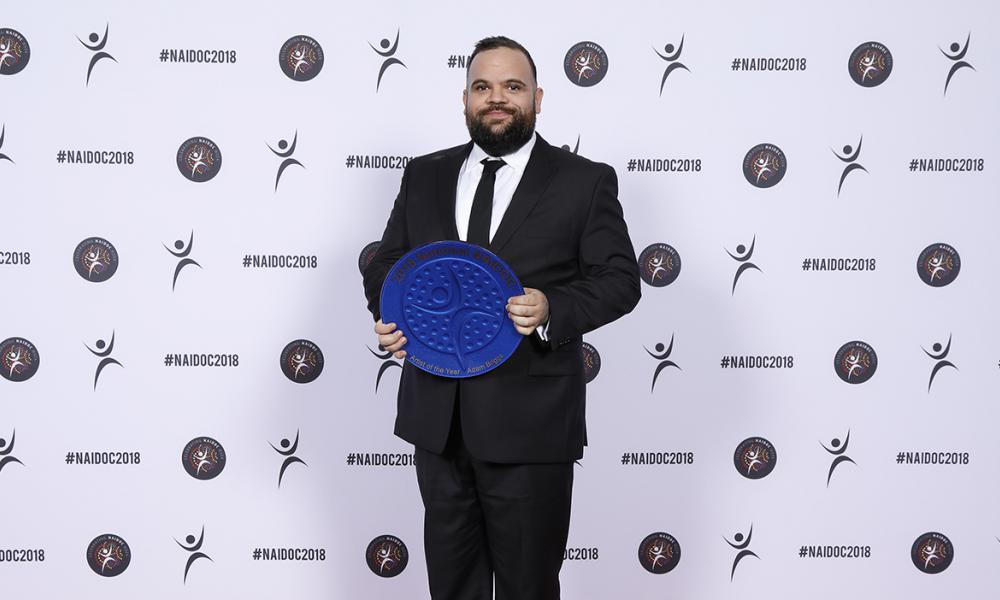
Adam Briggs
Growing up in Shepparton, Victoria, Briggs’ cousins taught him to think fast, talk fast.
Briggs is a pioneer of the Australian hip hop scene. A lyricist, rapper, hip hop artist, writer, presenter, actor and CEO, he has made an impression across the spectrum of creative industries, winning numerous awards as a song writer and artist.
His lyrics are provocative and he wears his culture for all to see. Briggs is an impassioned voice for the rights of Aboriginal people.
As the founder of Bad Apples Music he is mentoring emerging artists, helping them to find their way into the industry.
Briggs stands tall amongst his peers, working across multiple mediums, sparking conversations and creating cultural change.
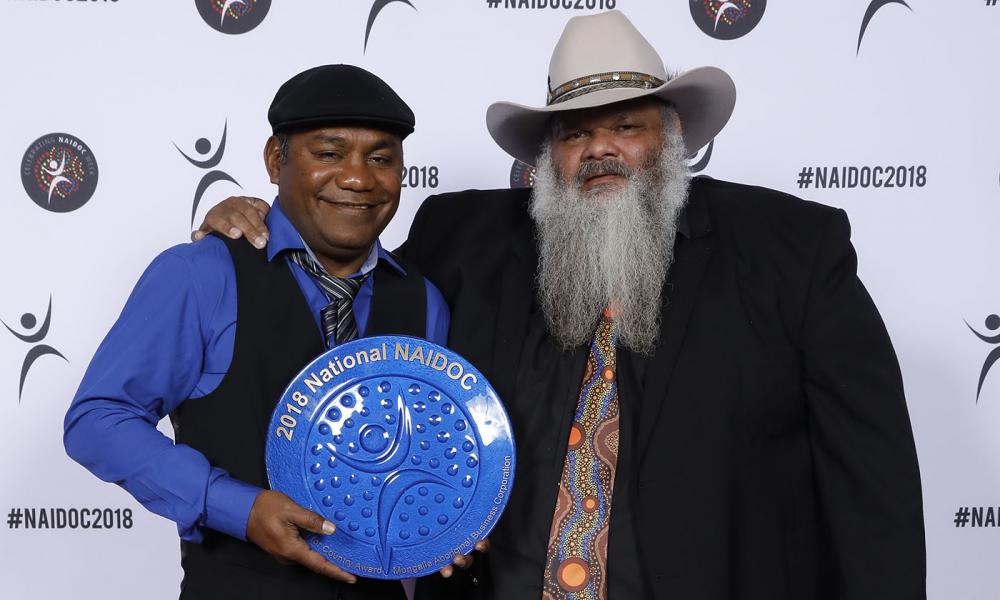
Mungalla Aboriginal Business Corporation
From cattle farmers to eco-tourism, the Mungalla Aboriginal Business Corporation is building an economic legacy for generations to come.
In 1999, when the Nywaigi Traditional Owners were handed back Mungalla Station, in Allingham, Queensland, the Mungalla Aboriginal Business Corporation began their work transforming the property.
Established as a cattle grazing farm in 1882, the property now incorporates cultural and eco-tourism, and provides education and training for the community.
The Corporation has restored significant areas of wetlands, which are essential to preserving the surrounding reef and sea ecosystems.
The Mungalla Aboriginal Business Corporation is passing on traditional practices and building a legacy for future generations of the Nywaigi community, and is looking to provide meaningful long term paid employment through the entrepreneurial utilisation of the station.
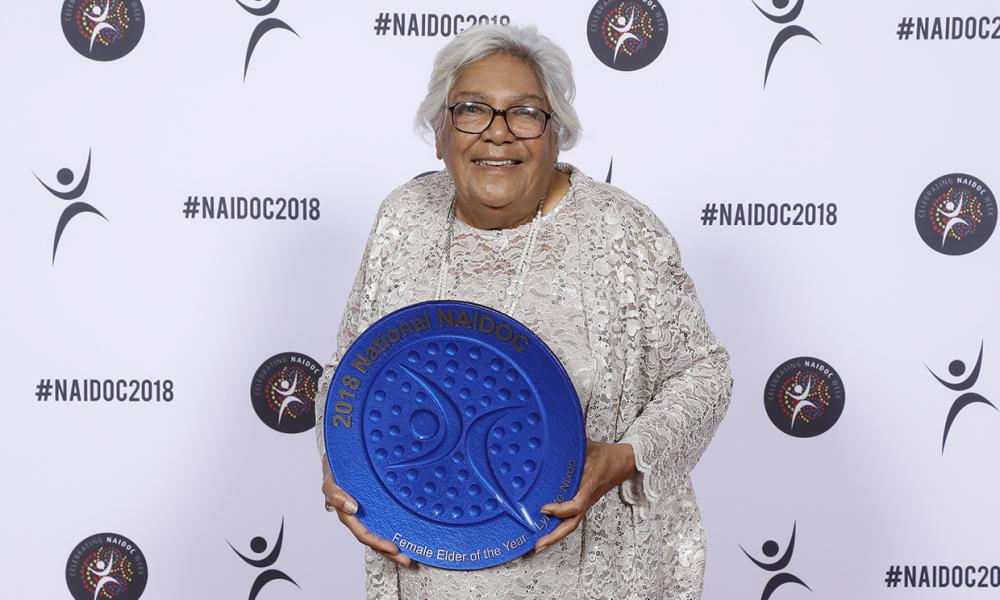
Aunty Lynette Nixon
She is a change maker and cultural keeper, always opening her home and heart to her extended family, and becoming a mother and mentor to so many.
Aunty Lynette’s exceptional work in and for her community began when the Mitchell Aboriginal Community received financial support to establish their own Kindergarten in 1975 – she became its president, and served on the committee for many years.
An advocate for the Gunggari people, she is the founding member of many of the local organisations in South West Queensland. She is a community worker, and has worked tirelessly to advocate and lobby for the rights and betterment of the lives of Aboriginal and Torres Strait Islander people for over fifty-three years.
Aunty Lynette is the Cultural Keeper of Knowledge for Gunggari people. She is a story teller, sharing the importance of land, language, identity and cultural practices.
It is because of her, so many can.
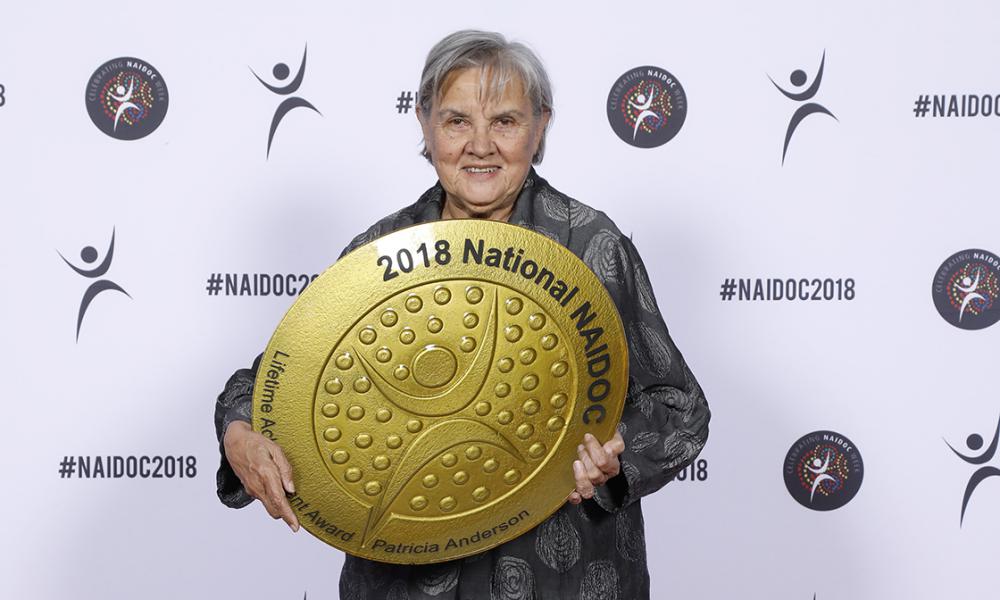
Patricia Anderson AO
Patricia grew up in Parap Camp in Darwin, before leaving in the 1960s to travel and work in the UK, the Netherlands and Israel.
On her return to Australia, Patricia worked for the Woodward Royal Commission into Aboriginal Land Rights as a legal secretary, and in 1980 was one of the first Aboriginal women to graduate from the University of Western Australia, with a degree majoring in literature.
She is a passionate campaigner for social justice, and has devoted her career to improving the health, welfare and education of Aboriginal and Torres Strait Islander people.
Patricia is the Chair of the Lowitja Institute and as Co-Chair of the Referendum Council led a national conversation on meaningful recognition.
She is a national leader, and an inspiration to so many.
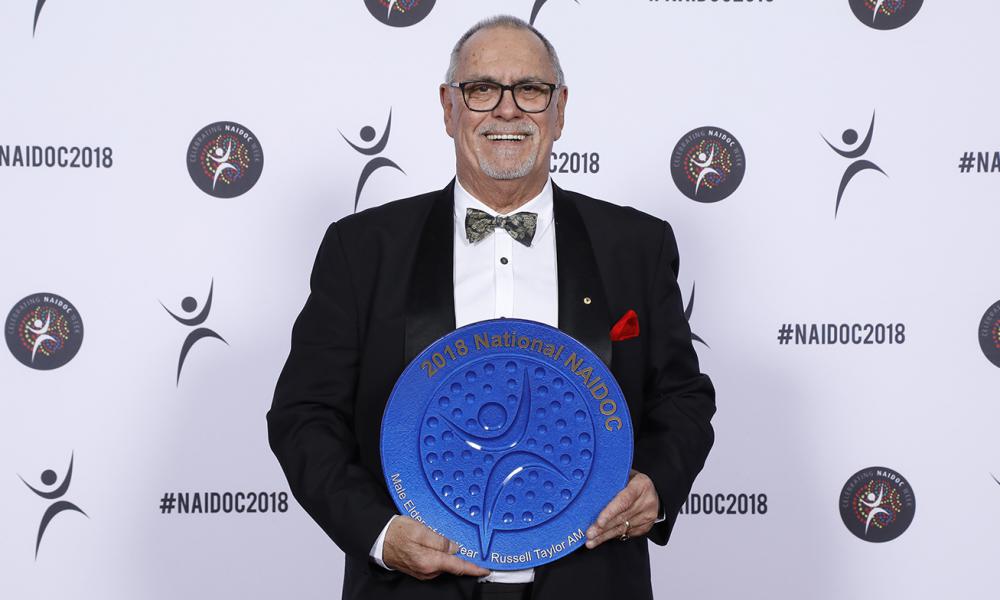
Russell Charles Taylor AM
Proud Kamilaroi man, Russell Charles Taylor AM, has been a tireless campaigner for Aboriginal and Torres Strait Islander people for over four decades.
Born and raised in Millers Point, NSW, Russell proudly identifies as a Kamilaroi man with family connection to La Perouse in Sydney and to traditional country in the New England area.
Russell has spent more than 20 years in senior public services roles, including positions in the Aboriginal and Torres Strait Islander Commission, the Aboriginal Development Commission and two stints as Principal at the Australian Institute of Aboriginal and Torres Strait Islander Studies (AIATSIS).
In 2016, he was appointed as a Member of the Order of Australia for his ‘significant service to the community as a cultural leader and public sector executive in the field of Indigenous affairs.’
Throughout his career, Russell has advocated for Aboriginal and Torres Strait Islander people to lead, drive and be involved in every process of change, and has inspired action in many.
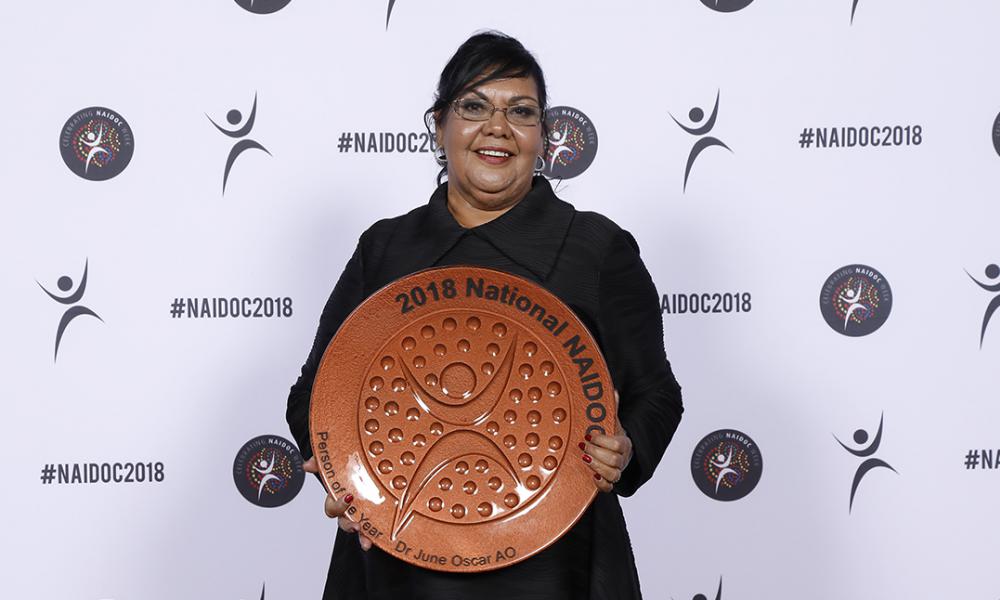
June Oscar AO
June Oscar AO has an impressive history of extraordinary change making.
A proud Bunuba woman from Fitzroy Crossing in the Kimberley, June is a courageous leader well known for championing the rights of her people, and for her tireless work in the preservation of ancient languages.
She is a strong advocate for the quality of life of Aboriginal people, especially vulnerable women and children. June is currently serving as the first female Aboriginal and Torres Strait Islander Social Justice Commissioner.
In this role, she is spearheading the Wiyi Yani U Thangani (Women’s Voices) project with the Australian Government, which aims to enhance and realise the rights of women and girls by guiding and influencing policies, and providing conditions for change now and for generations to come.
June is an authoritative voice, and a shining example of the extraordinary capabilities of women to make impacts not only in their own communities, but across the nation.
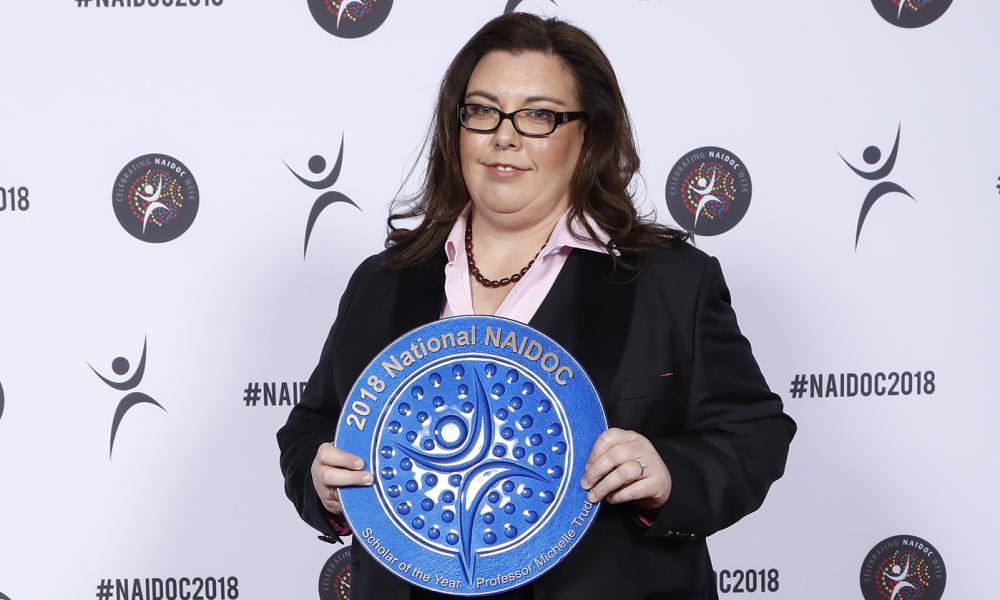
Professor Michelle Trudgett
Professor Michelle Trudgett, from the Wiradjuri Nation in NSW, has an international reputation as a leading scholar.
She is the founding Director of the Centre for the Advancement of Indigenous Knowledges at the University of Technology in Sydney, and her research provides considerable insight into Indigenous participation in higher education, with a specific focus on the postgraduate sector.
With a long journey of learning behind her, including three degrees and a Doctor of Education, Michelle is passionate about developing strategies to assist tertiary students to receive culturally appropriate support throughout their academic journeys.
Michelle’s current work includes researching ways universities will engage with Aboriginal and Torres Strait Islander people by focusing on Indigenous leadership in higher education.
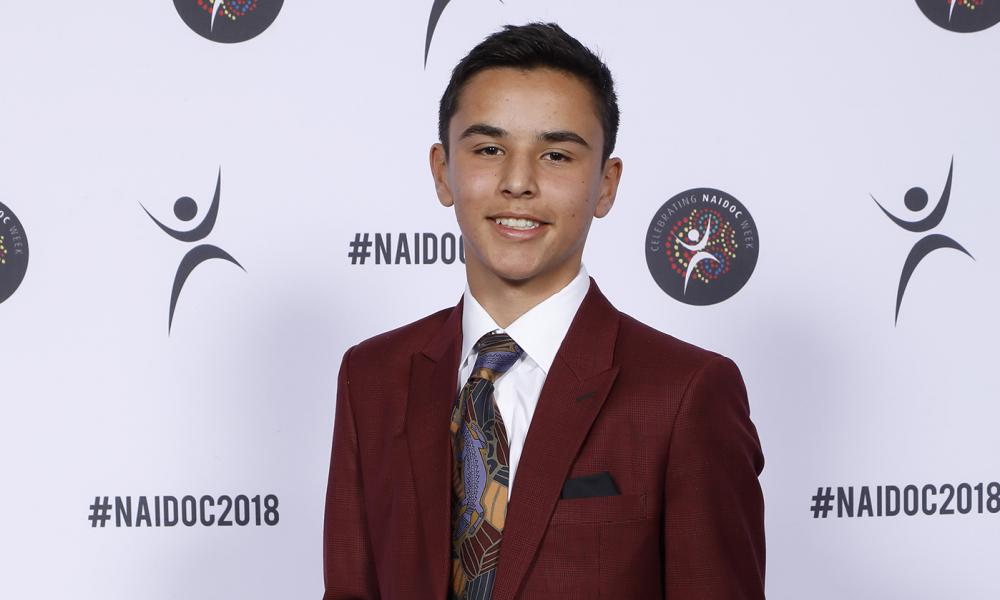
Jack Peris
Jack Peris is a proud descendant of the Iwatja people of Western Arnhem Land, and the Yawuru and Gidja people of the West and East Kimberley.
The son of world-class athletes Nova Peris OAM OLY and the late Daniel Batman, Jack is an accomplished athlete, most recently becoming the National under-16 Australian 400m champion in athletics.
After completing primary school in Darwin, Jack made the decision to move to Melbourne to attend boarding school. Intent on improving his education and pursuing his sporting career, he inspires fellow Aboriginal and Torres Strait Islander boys who track his progress via social media accounts.
Jack is an exemplary student at Melbourne Grammar, earning high distinctions over the past two years and demonstrating leadership ability as the captain of the AFL and athletics teams.
After completing year 12, Jack plans to enter university and fulfil his dream of becoming a marine biologist.
Jack is a leader and inspiration to his peers, and is representing his people with pride and purpose.
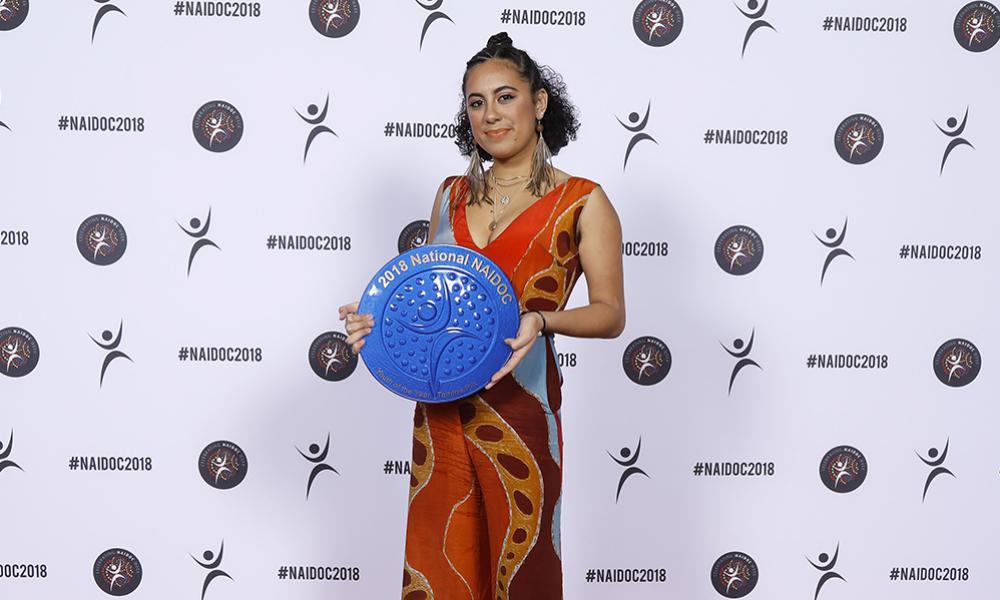
Tamina Pitt
Tamina Pitt, a Wuthathi and Meriam woman, is a self-confessed tech geek.
Tamina was a published author at the age of five, creating a book ‘What makes a tree smile’ for her younger brother to understand the world around him.
She is a creative thinker and problem solver. Tamina is currently studying a Bachelor of Computer Engineering at the University of NSW, and has interned as a software engineer at Google, where she was asked to represent the organisation at Grace Hooper, the largest international gathering of female technologists.
Tamina acknowledges that she is a minority in her field. As the Director of Indigtek, she is using her role to galvanise a stronger community of practice amongst Aboriginal and Torres Strait Islander tech engineers and entrepreneurs.
A sought after speaker and workshop facilitator, she is passionate about Indigenous participation and excellence in the field of technology, and wants to see more women studying STEM subjects.
Tamina is a young trailblazer, and is redefining the narrative of young Aboriginal and Torres Strait Islander women.
2017
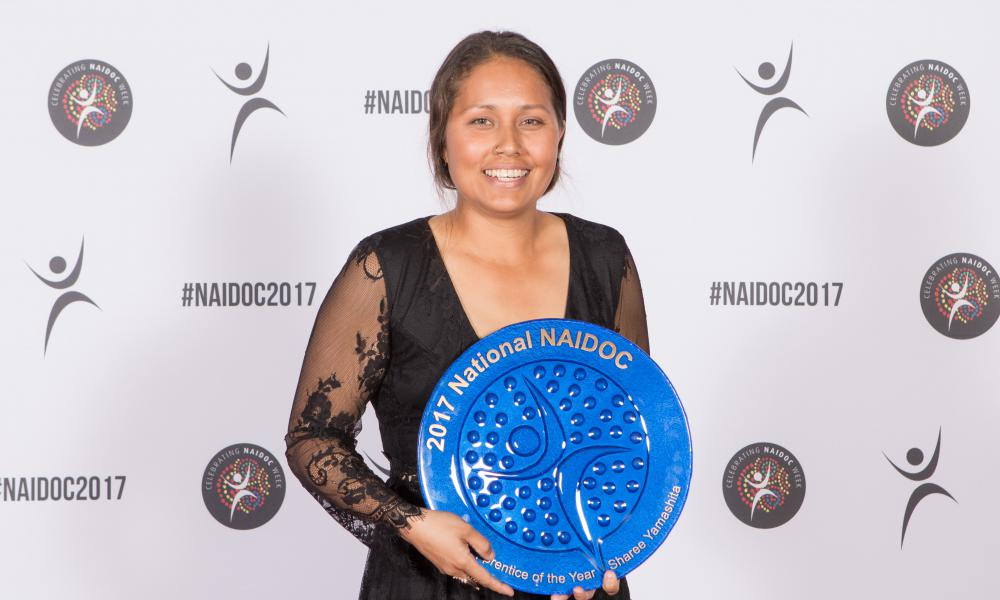
Sharee Yamashita
Sharee Yamashita is a young Thanikwithi woman from Thursday Island who has recently completed her Electrical apprenticeship while managing the demanding responsibilities of a young family. She is now a full time employee working with Rio Tinto in Weipa on the Cape York Peninsula.
Sharee has overcome many obstacles along her journey, and says her determination has been inspired by many people, including her father. Her success in her apprenticeship has increased her confidence and she is keen to share her journey to inspire others.
Sharee’s leadership has a powerful positive impact on everyone that she interacts with. Her success in a male dominated industry makes Sharee an important role model for other young Indigenous women.
Sharee’s goal for the future is to help other young people to create opportunities and succeed in their chosen careers.
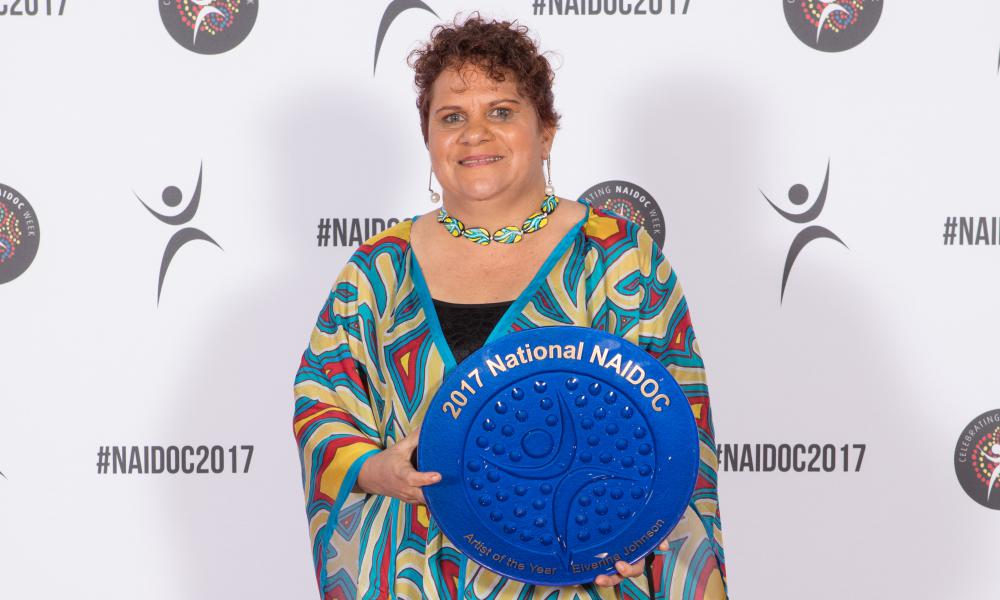
Elverina Johnson
Elverina Johnson is a highly respected Gurugulu and Indinji Gimuy woman from Yarrabah in far north Queensland – and one of Australia’s most highly respected Indigenous artists.
With creative talents spanning the spectrum of visual and performing arts, Elverina has been involved in the arts industry for over 30 years as a singer, songwriter, playwright, actor, photographer and artist.
She believes that the arts can empower Aboriginal and Torres Strait Islander people and restore a genuine sense of pride in their culture and communities, and works with youth and Elders alike to promote cultural respect and integrity.
Elverina volunteers her time to address critical social issues impacting on the lives of people in Indigenous communities, living true to her traditional family name -Bunya Badjil - which means “Good Woman”.
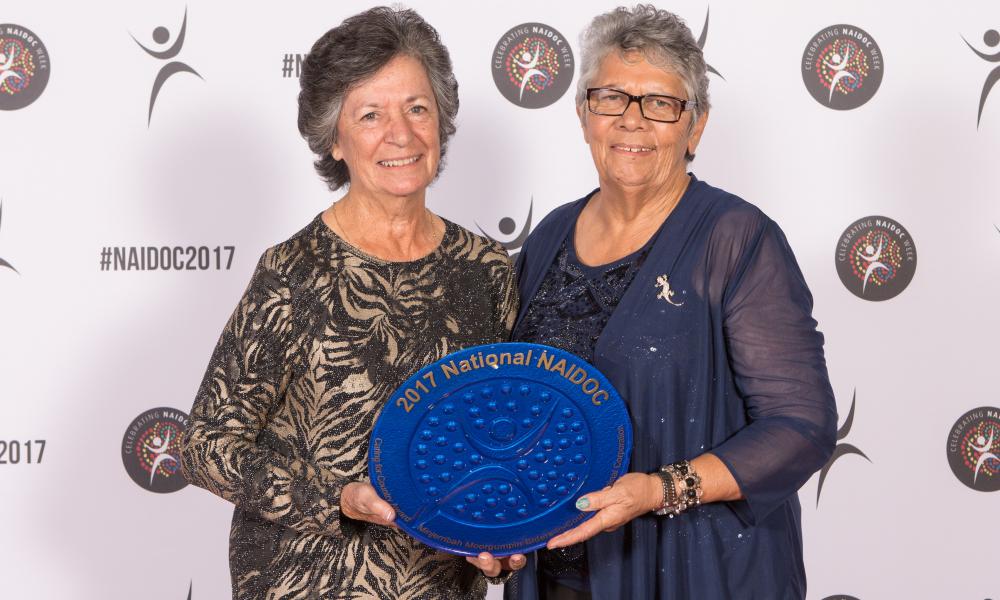
Minjerribah Moorgumpin Elders-in-Council
The Minjerribah Moorgumpin Elders-in-Council Aboriginal Corporation in Queensland was created to record and teach people about caring for Country for future generations. They represent descendants of the Noonuccal, Ngugi and Goenpul people of North Stradbroke (Minjerribah), Moreton (Moorgumpin) and the Moreton Bay (Quandamooka) islands.
Each year the Elders deliver cultural education services to approximately 6000 participants. They teach knowledge of local languages; bush plants, and environmental management skills that they learned growing up.
As well as education, the Elders are preserving a regional ecosystem which includes significant vegetation and habitats.
Their success has seen the Elders involved in cultural heritage assessments, the publication of books to unique flora, bush tucker and medicinal plants of Stradbroke Island, and the re-introduction of local language to the younger generation, through publication of the Jandai Language Dictionary.
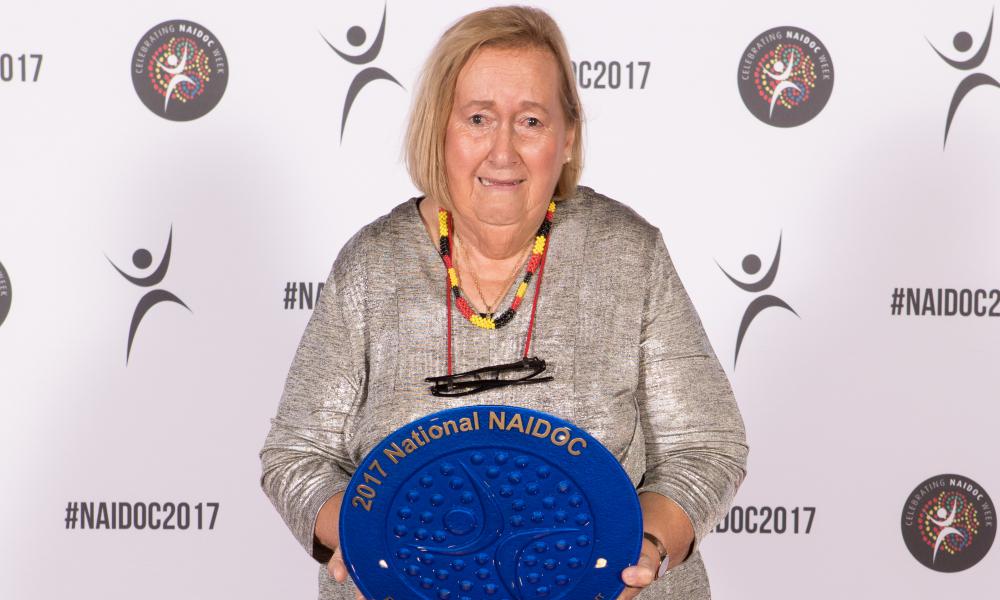
Faye Carr
Faye Carr is a Yuggera Elder from Ipswich in Queensland, who has overcome a tough childhood to become a strong advocate and leader in her community.
Passionate about sharing her culture and knowledge with her community, Faye has been contributing to Aboriginal and Torres Strait Islander people since the 1960’s.
Faye was involved in establishing the Aboriginal and Torres Strait Islander Legal Service, the Kambu Progress Association and the Kambu Aboriginal and Islander Health Service to deliver important legal, housing, recreational and health services to Ipswich and broader Queensland. Among many accolades, Faye was honoured with Ipswich Citizen of the Year in 2016.
Always an advocate for her people, Faye recently met with Prime Minister Malcolm Turnbull and other key stakeholders to raise awareness about the impacts of domestic violence on women and families.
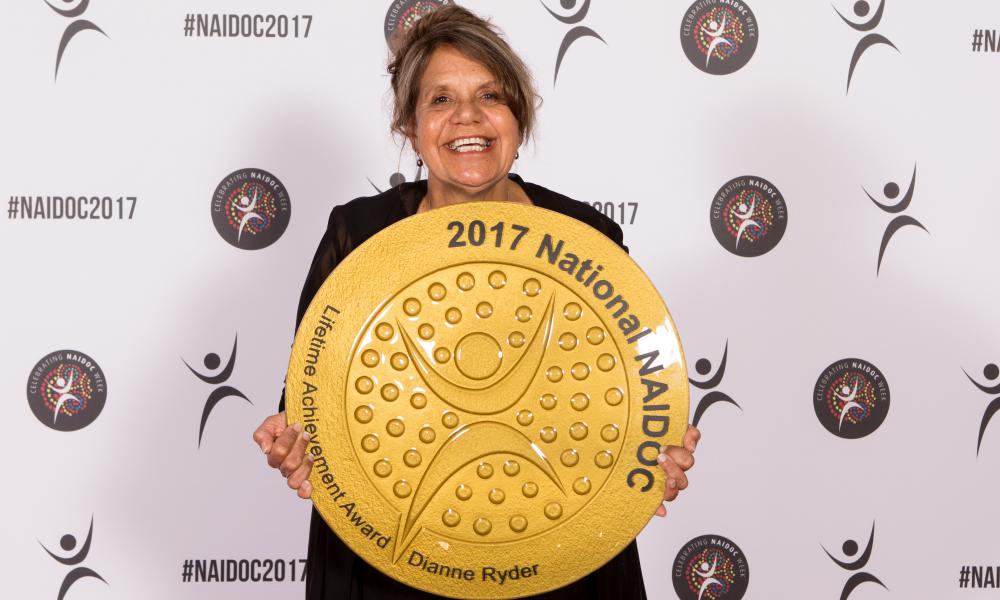
Dianne Ryder
Dianne Ryder is a proud Noongar woman from Western Australia with a legendary reputation for her contribution to family, community and country.
After school, Dianne embarked on a 21-year career with the army and in 1990, she was awarded the Army Australia Day Medallion.
Since leaving the Army, Dianne has worked as a community outreach worker in Sydney and later Perth. She is currently the President of the Aboriginal and Torres Strait Islander Veterans Association of WA and is heavily involved with the Indigenous Veterans Memorial Service.
Her contribution and involvement with her community has led to her being sought out to share her wisdom with government departments and politicians at a state and national level. In 2015, Dianne was nominated for Australian of the Year and for the Prime Ministers Advisory Council on Mental health.
Dianne's favorite saying is "Just imagine ..." where she challenges us all to consider how we can improve outcomes for Aboriginal and Torres Strait Islander peoples.
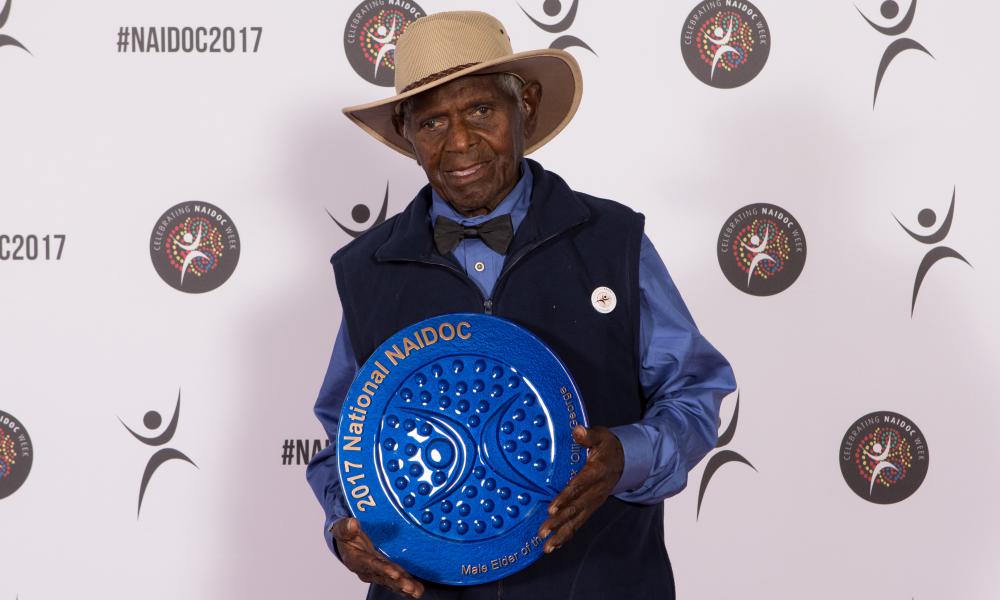
Alex ‘Ollie’ George
Ollie George is a Badimaya Elder from Western Australia who has worked tirelessly since the early 1990s to preserve his mother tongue, Badimaya.
He has taught Badimaya at the school in his hometown of Mt Magnet and works with community members to create language materials and resources. He has recorded hundreds of hours of Badimaya language, much of it by himself.
Since 2012, Ollie has worked to produce 7 publications in Badimaya, has been featured in two ‘Indigenous Community Stories’ by the Film and TV Institute of WA, and is the primary consultant on several projects on Badimaya language and country.
Ollie is now completing his ‘Nganang Badimaya Wangga’, a project based on 24 yarns he tells about life growing up on his country, learning language from old people, and the cultural and historical legacy of the Badimaya people.
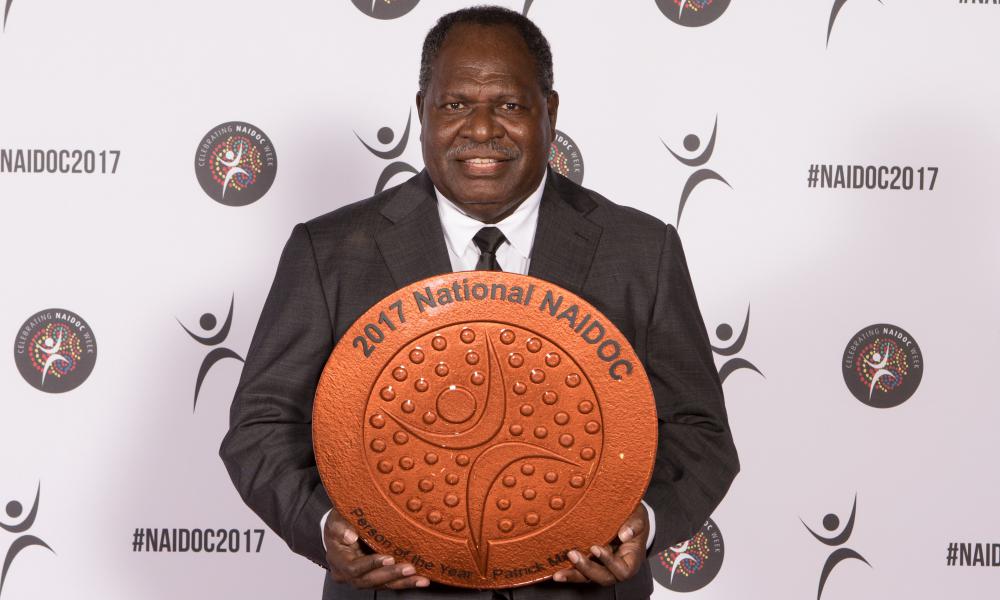
Patrick Mills
Benny Mills accepting the award on behalf of Person of the Year Patrick Mills.
Patrick Mills is a Muralag man from the Torres Strait, Ynunga man from South Australia and sporting legend.
A National Basketball Association (NBA) Champion and a three time Olympian, Patrick is a member of the San Antonio Spurs who famously won the 2014 NBA Championship.
Patrick is the first Indigenous player to represent Australian Men’s Basketball at three consecutive Olympic Games and is preparing for his record fourth Games in Tokyo 2020.
He is the youngest player to represent Australia in Men’s Basketball and he holds the Olympic record for being the overall highest points scorer at the London Olympics in 2012. Patrick has won numerous awards including ACT Young Australian of the Year in 2015 and ACT Sports Male Athlete of the Year in 2016.
Patrick uses his international profile to promote and raise awareness of Aboriginal and Torres Strait Islander cultures and often takes time to share parts of his language with his teammates.
A strong role model, Patrick’s goal for the future is to be an ambassador for Indigenous people and continue educating the world on his culture. Patrick says ‘It’s who I am. It’s what I know – even more than basketball.’
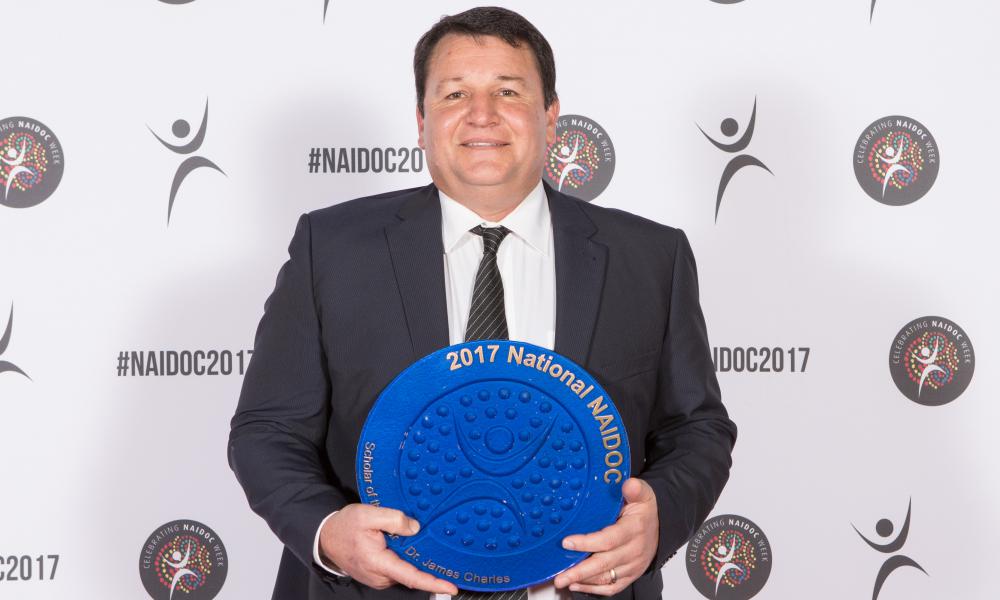
Dr James Charles
Dr James Charles is a Kaurna man from Adelaide, South Australia and is currently working at Charles Sturt University as a lecturer in Podiatry.
He graduated from the University of South Australia in Podiatry, completed his Masters, recently completed his PhD, and his research is being published in peer review journals.
James is passionate about providing podiatry services to the Aboriginal and Torres Strait Islander community and believes that foot health is undervalued. He has worked for many years at leading Universities, educating on providing culturally appropriate health care.
In 2008, James undertook a two year Chairmanship of the newly formed Indigenous Allied Health Network, an organisation he helped build.
Always giving back to his community, James has raised significant money for the Rotary Indigenous Health Fund to provide scholarships for Aboriginal and Torres Strait Islander students.
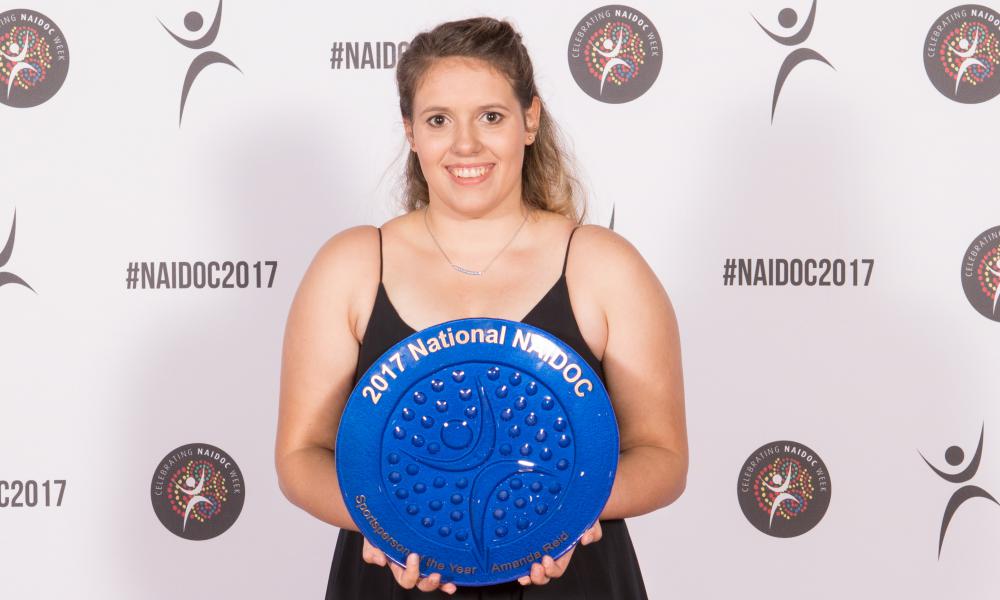
Amanda Reid
Amanda Reid is Gurinagi & Wamba Wamba women from Sydney, New South Wales and an accomplished Indigenous Paralympic athlete.
Amanda is the first Aboriginal cyclist and medallist, winning Silver at Rio 2016, and the first female athlete since 1992 to achieve a podium status.
Amanda is the current UCI Para World Cycling Champion in the 3000 meter Pursuit and the 500 meter time trail, breaking the Paralympic record in Rio.
Previously an Australia Day Ambassador and currently delivering presentations in local schools, Amanda is an inspirational role model to all Australians. She mentors young disabled athletes as well as Aboriginal youth in care and plans to increase her community work to prove that people with disability can achieve in their community.
Amanda lives every day by her mantra "dream it, believe it and you will be it.”
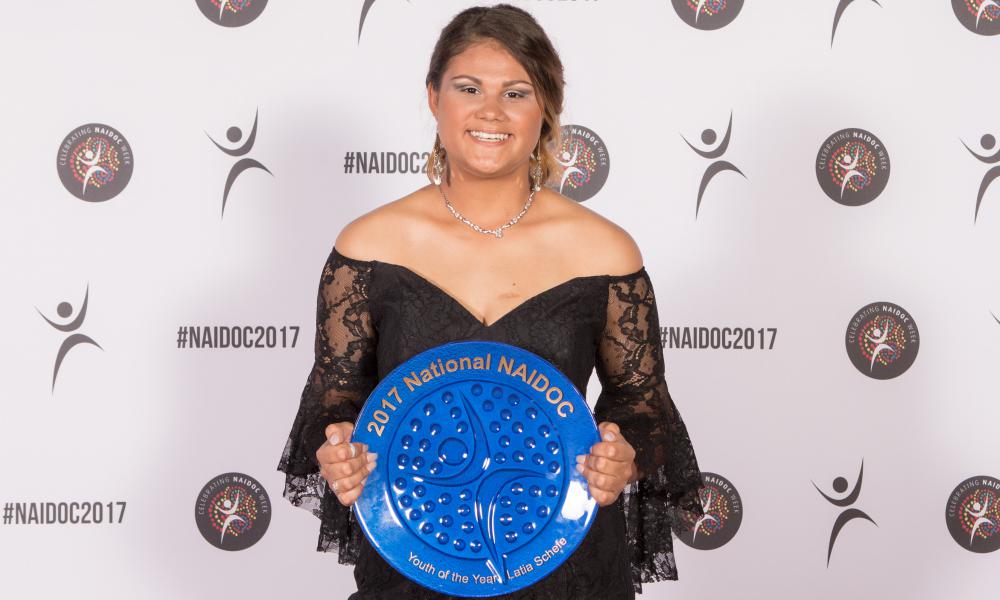
Latia Schefe
Latia Schefe is a young Yuggera woman from Brisbane, Queensland who has overcome serious illness and adversity to become a strong role model among her peers.
Diagnosed with Neuroblastoma cancer when she was only 6 years old, Latia endured multiple operations, chemotherapy and the loss of a kidney.
Despite her hardships, Latia went on to complete Year 12 education and in her final year was awarded the Jane Prentice Award for Indigenous Student of the Year.
Latia stands out as a promising future leader, participating in a Biking Program which fixes old bikes for people with disability, and coordinating local NAIDOC celebrations.
For her future, Latia wants join the police force, or drive the giant trucks in the mining industry.
2016
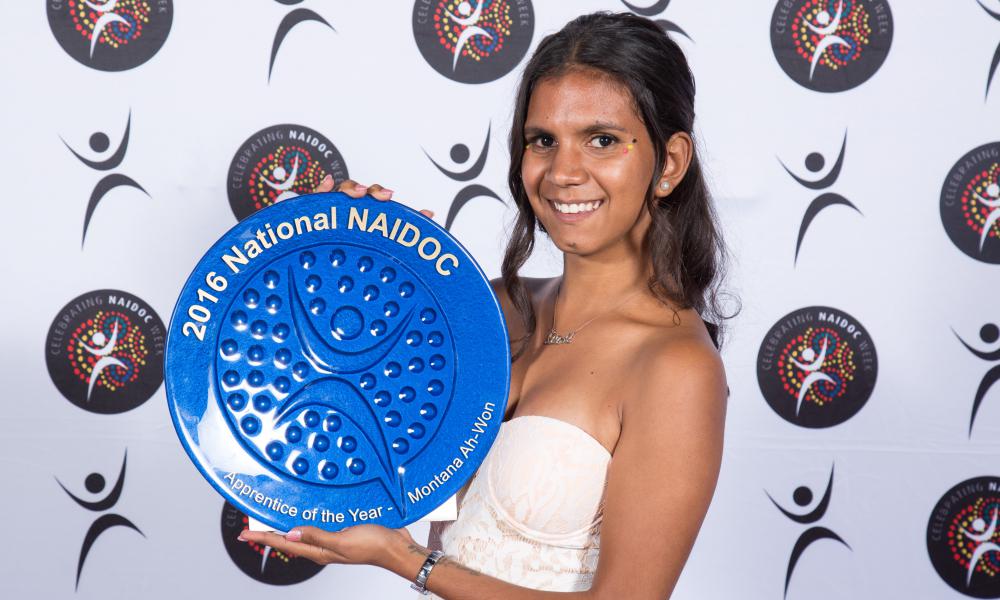
Montana Ah-Won
Montana Ah-Won is an 18 year old Miriwoong Gajeroong woman from Kununurra in Western Australia’s East Kimberley.
After enduring family tragedy at a young age and leaving school early, Montana set herself on a new direction. She joined a hospitality pre-employment program with Kimberley Group Training.
Excelling in the course, Montana began a traineeship and achieved her Certificate II in Hospitality.
Today, Montana is working as a Receptionist and Administration Officer at the Kununurra Country Club Resort. She has a well-deserved reputation for dedication and professionalism.
Passionate about her career, Montana is keen to soak up as much experience in the hospitality industry as she can. But she also has her sights firmly set on continuing her studies and gaining business qualifications in the future.
Proving that with resilience, persistence and hard work, tough times can be overcome, Montana is an inspirational role model for other young people.
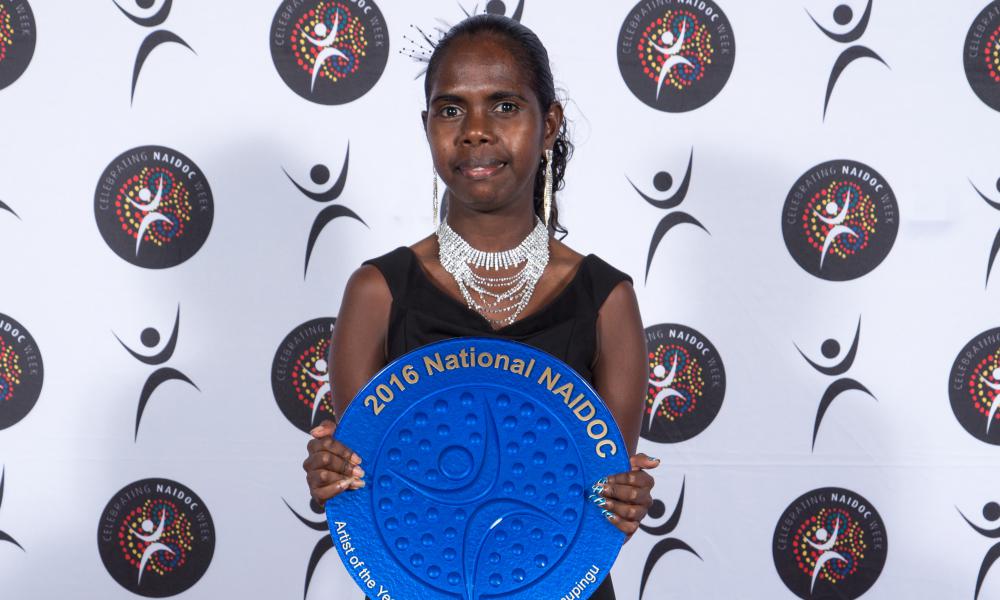
Geoffrey Gurrumul Yunupingu
Award accepted by Jasmine Yunupingu on behalf of Artist of the Year Gurrumul Yunupingu
Geoffrey Gurrumul Yunupingu is a Gumatj man from Galiwin’ku on Elcho Island in the Northern Territory.
Gurrumul’s musical exceptional skills on drums, keyboards, guitar and digeridoo were largely self-taught, despite being born blind. His singing voice has drawn great attention and acclaim with his music topping Australian charts and being recognised with ARIA and Deadly Awards.
He is acclaimed overseas too. Gurrumul can count Will.I.Am, Elton John and Sting among his fans, and has performed for Her Royal Highness Queen Elizabeth the second, USA President Barack Obama and Crown Prince Frederik and Princess Mary of Denmark.
Singing in several Yolngu languages and English, his blend of traditional songs and modern compositions has changed the way people experience Indigenous music.
Adding to Gurrumul’s accomplishments, his Gurrumul Yunupingu Foundation supports remote Indigenous youth to become involved in arts and cultural programs, learning skills and pursuing healthy lifestyles to help overcome disadvantage.
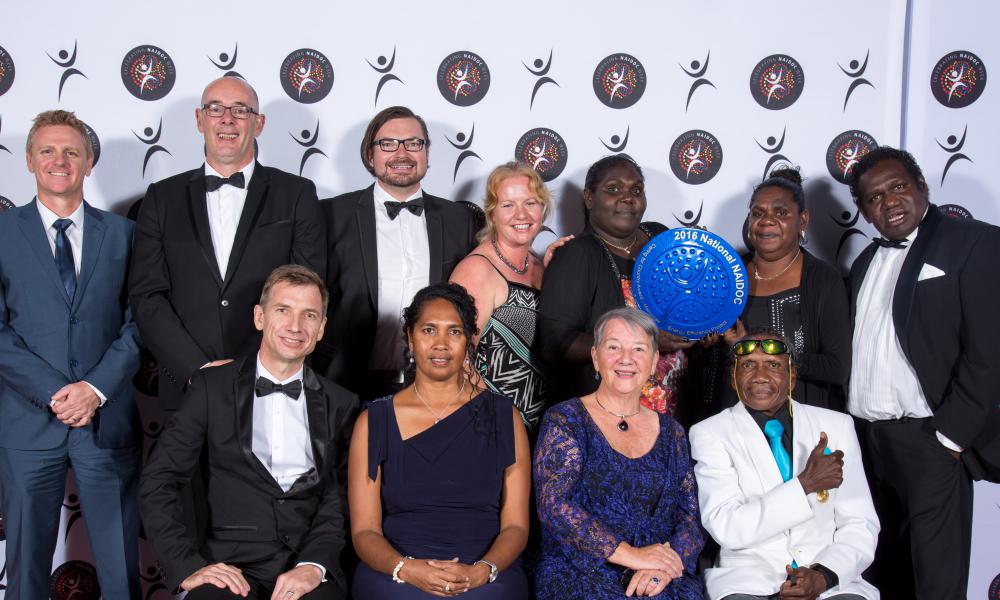
Manymak Energy Efficiency Project
The Manymak Energy Efficiency Project was successfully trialed throughout six remote communities in East Arnhem Land from 2013 to 2015.
The Project was designed to address a community need to use energy more efficiently and paves the way for further water and energy efficiency projects across the Northern Territory.
The Project employed ninety-one Yolngu Energy Efficiency Workers to educate residents about power and water usage, enabling them to make informed choices about what they spend their money on.
Over eighty per cent of households participated in the Project, with over seventy percent of these receiving energy efficiency upgrades and all participants agreeing their knowledge about looking after power and water has improved.
The Manymak Energy Efficiency Project is a great example of what can be achieved when passionate individuals work with communities to share knowledge and provide solutions for long term, sustainable management of country.
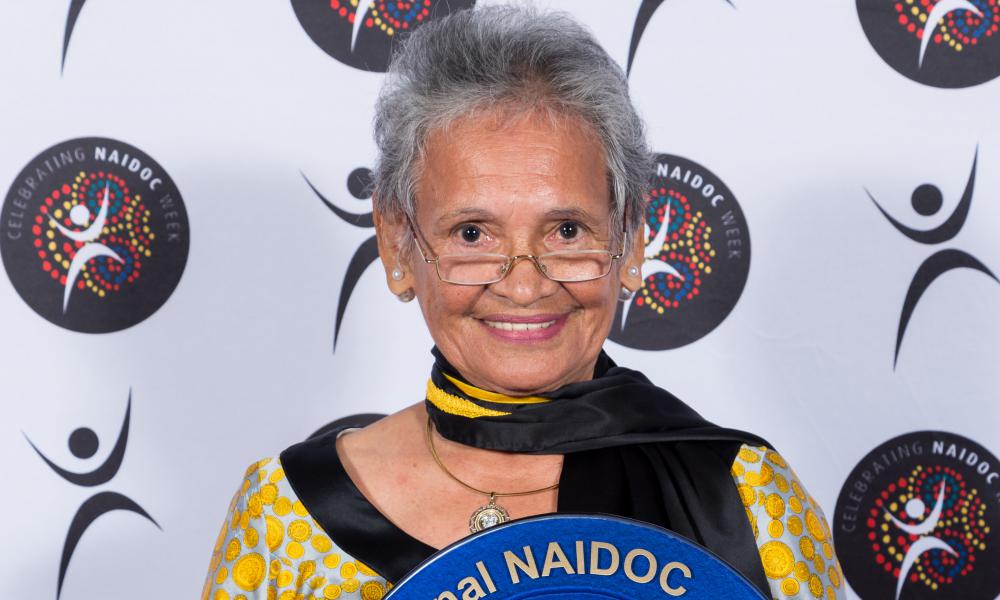
MaryAnn Bin-Sallik
Professor MaryAnn Bin-Sallik is a proud Djaru Elder from the East Kimberly who spent most of her life in Darwin. She became a nurse at seventeen, turning her mind and path to academia in her mid-thirties.
MaryAnn‘s long and distinguished career has been marked by impressive and varied achievements. She was the first Indigenous person to graduate as a trained nurse from Darwin Hospital; to be employed full-time in the higher education sector in Australia; and the first to gain a Doctorate from Harvard University.
MaryAnn is passionate about Indigenous participation in higher education. Her involvement in government, university and community advisory and review groups has greatly influenced education and equity policies for Indigenous Australians.
On her retirement in 2008, MaryAnn was made an Emeritus Professor of Charles Darwin University, in recognition of her decades of academic service and her contribution to the advancement of Indigenous education, cultures and heritage.
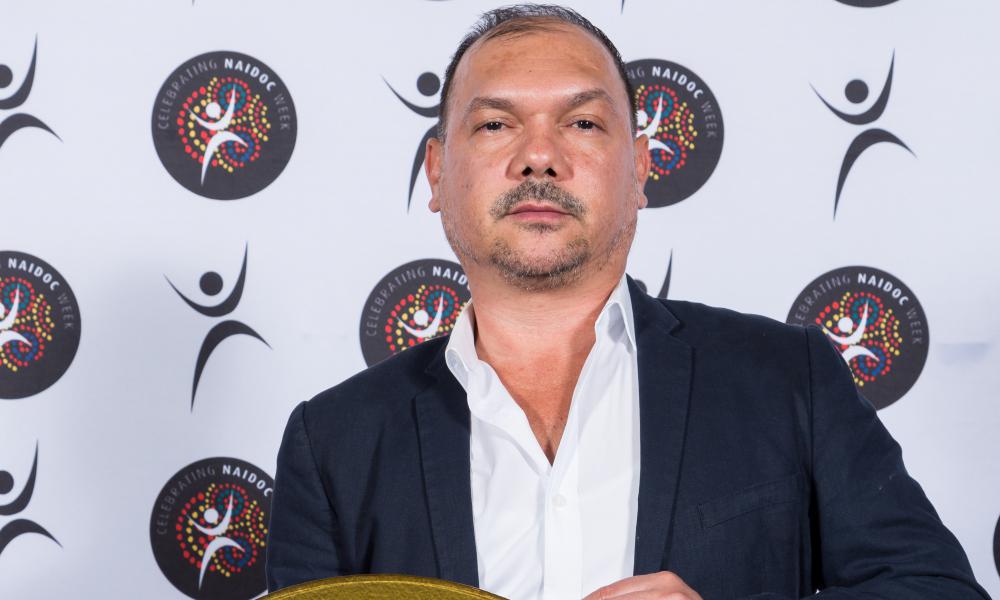
Stephen Page
Stephen Page is a descendant of the Nunukul people and the Munaldjali clan of the Yugambeh Nation from South East Queensland.
This year, Stephen celebrates 25 years as Artistic Director of Bangarra Dance Theatre, which has grown under his direction from a small fledgling project into a major performing arts company with an international reputation.
Stephen’s goal is to provide opportunities for the next generation of Indigenous storytellers. He has nurtured dance and culture in thousands of school children living in disadvantaged communities through workshops, and the company's youth program, Rekindling.
Stephen has been a recognised leader in both the Australian arts landscape and the Indigenous community for more than two decades, recently awarded an Honorary Doctorate of Creative Arts by the University of Technology, Sydney.
He has made an invaluable contribution to the cultural life of our nation, and to the advancement of his people.
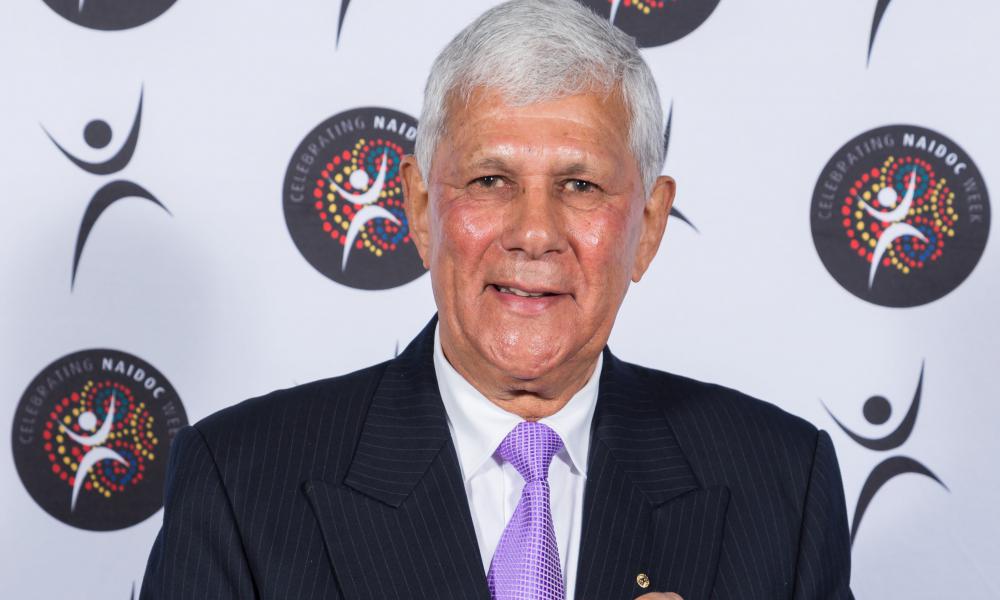
Dr Robert Francis Isaacs OAM JP PhD (HON)
Dr Robert Francis Isaacs is a Billumum Noongar man, a member of the stolen generation and a proud West Australian.
Robert began his career in 1973 with the Community and Child Health Services.
Since then, Robert has established dental, rehabilitation and health care clinics. He has improved relations between Aboriginal people and the justice system, led housing initiatives, and helped establish Clontarf Aboriginal College.
As a former Councillor and Deputy Mayor for the City of Gosnells, Robert was also the first Aboriginal person elected to local government.
Robert was awarded an Order of Australia Medal in 2001 for his service to Housing, Health, Education and Employment.
Robert is currently the Chair of the Australia Day Council WA, Executive Member to the State Aboriginal Advisory Council – Aboriginal Affairs Planning Authority Act, and Foundation Member, President and Chair of the Derbarl Yerrigan Health Service.
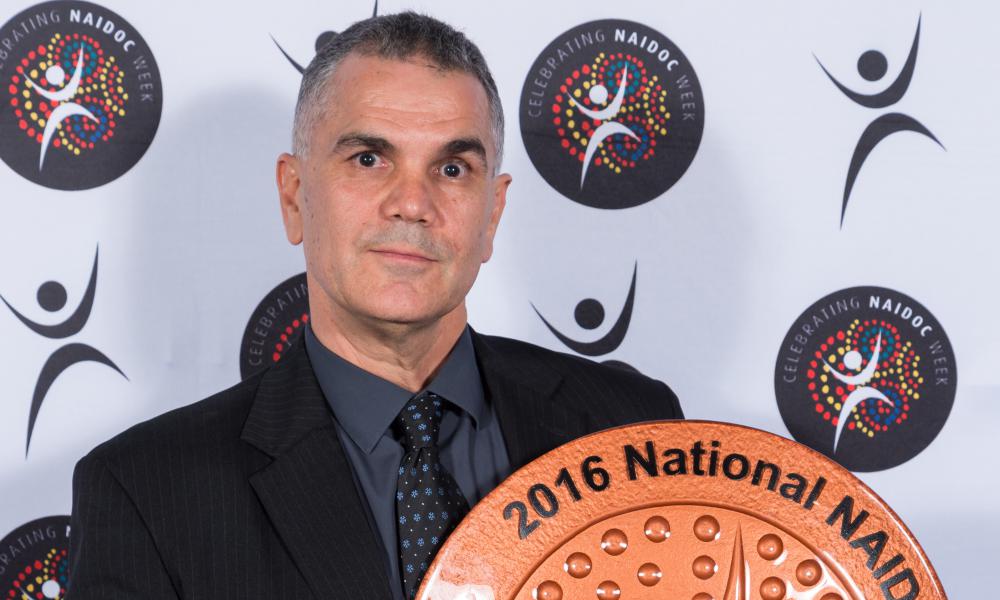
Professor Chris Sarra
Professor Chris Sarra, a Goreng Goreng man from Bundaberg, has championed the improvement of Aboriginal educational outcomes throughout Australia for over 20 years.
The youngest of ten children, Chris faced many of the challenges commonly experienced by Indigenous kids at school, motivating him to make a difference.
His Stronger Smarter Institute began in 2006 to improve the way Indigenous education is delivered, without compromising cultural identity.
As Principal of Cherbourg State School in Queensland, Chris’ teaching methods increased enthusiasm for student learning and dramatically improved student engagement, school outcomes and the Aboriginal community’s involvement in their children’s education.
In 2004, Chris was Queenslander of the Year, and in 2010 he was Queensland's Australian of the Year. He has written two books and has completed a psychology PhD and Masters of Education. He recently accepted a role as Professor of Education at the University of Canberra.
As a leader, scholar, teacher and principal, Professor Sarra advocates that a strong and positive sense of culture and identity should go hand in hand with achieving a good education.
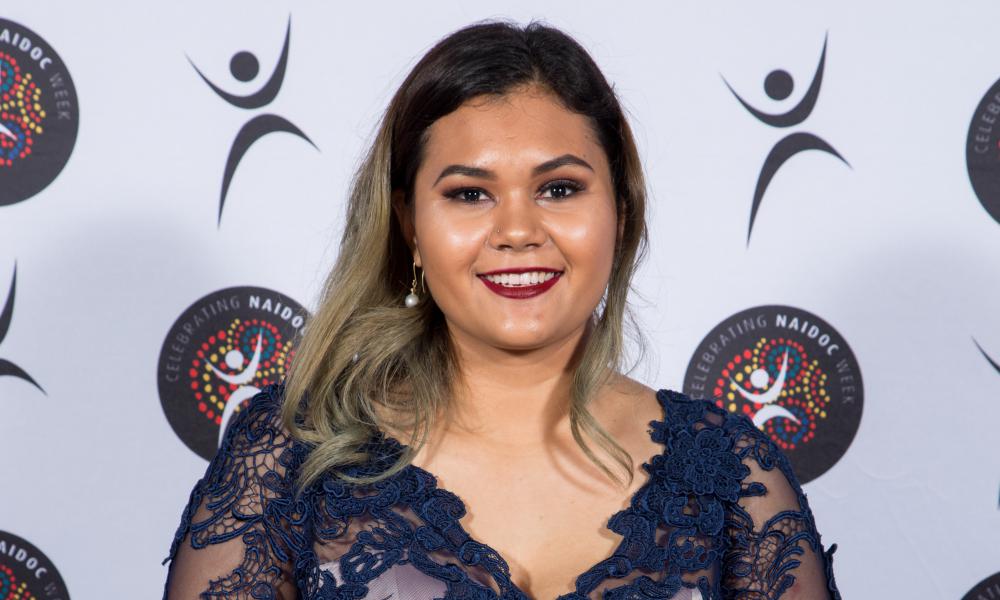
Layneisha Sgro
Layneisha Sgro is a proud Nyiyaparli, Bardi and Jabbir Jabbir woman from Broome.
Layneisha was the first in her family to graduate high school, travelling over two thousand kilometres and boarding to further her education.
She recently graduated from the prestigious Presbyterian Ladies College in Perth with an ATAR score of over ninety-two, the highest score ever for an Indigenous student in Western Australia.
Layneisha is now at the University of Melbourne, completing a Bachelor of Commerce, and is planning to continue study in Law.
Passionate about helping people overcome issues like drugs, alcohol, lack of education, violence and incarceration, Layneisha has served on numerous committees and panels, such as the 2013 National Indigenous Youth Leadership Academy and the 2015 United Nations Youth Australia Aotearoa Leadership Tour.
Layneisha advocates for young Indigenous Australians’ education and encourages others to believe in their own capability.
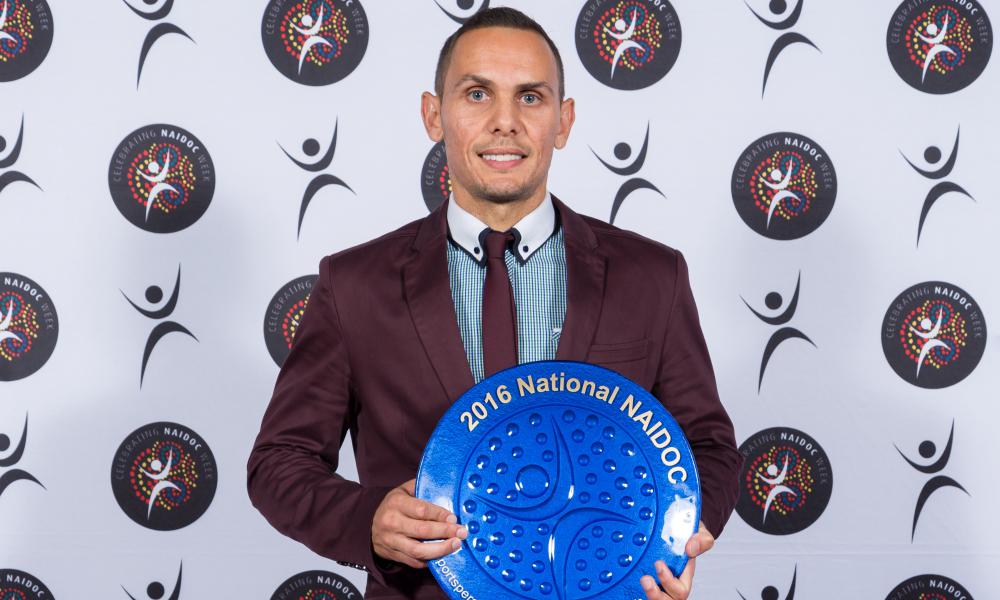
Jade North
Jade North of the Biripi Mob from New South Wales is a two-time A-League championship winner and Olympian.
Jade was the first Indigenous captain of Australia’s representative football team, the Socceroos, and has spent four years playing professionally overseas.
An ambassador for the Mini Roos, the Leukemia Foundation, the Indigenous Games and the Indigenous Football Championships, Jade is an inspiration beyond the sports field.
His strength has taken him from a broken home and a battle with depression to where he is now; lead defender for the Brisbane ROAR football club and Dad to three boys.
Giving back to the community he also runs a football clinic called Kickin with a Cuz, using inclusion through sport to uplift disadvantaged kids.
Jade’s journey and accomplishments have made him strong and determined to inspire passion in others.
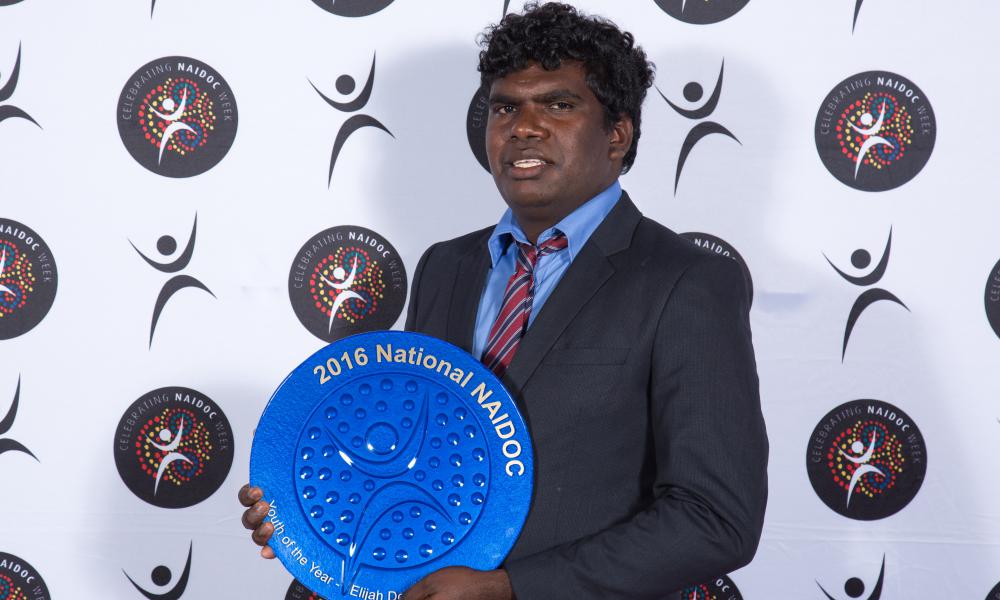
Elijah Douglas
Elijah Douglas is a Ganggalidda, Garrwa, Waanyi and Gudanji man from Doomadgee in Queensland.
At 19 years, Elijah is the Team Leader of a youth development program for Save the Children Australia. He also initiated a Student Leadership Council at Doomadgee State School where he teaches language and culture to students and teachers, and is a champion of the Remote Schools Attendance Strategy.
Elijah has written a book to record the personal journeys of Elders from his community, and in 2013, he played the didgeridoo at the Anzac Cove ceremony to commemorate the Indigenous soldiers who served for Australia.
In 2014 Elijah attended the National Indigenous Youth Parliament, and this year, attended the United Nations forum in New York, to discuss Indigenous Peoples’ rights and emerging issues.
Elijah’s aspiration is to be the first Indigenous Prime Minister of Australia, but he is committed to making a difference in his community first.
2015
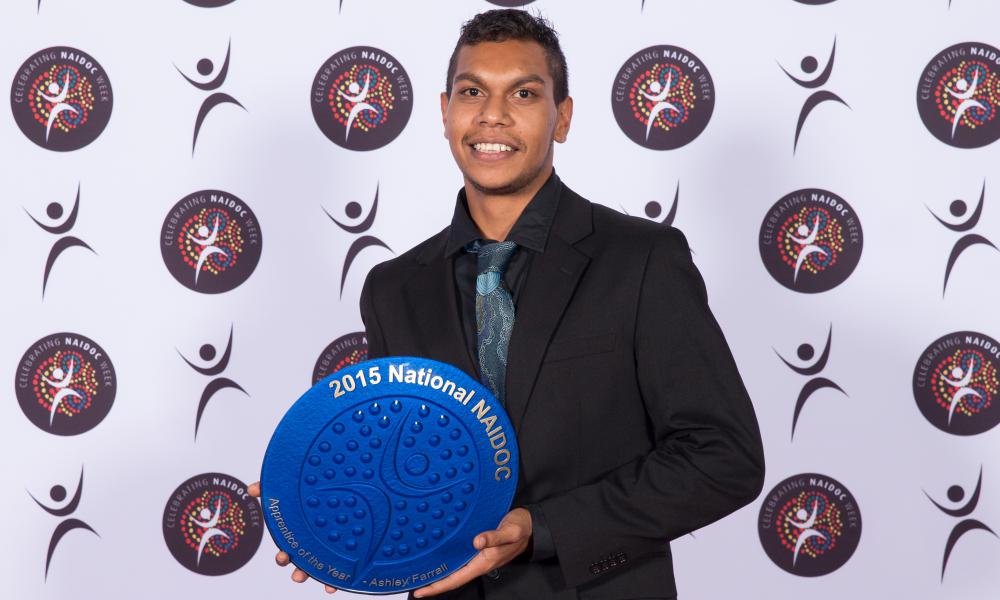
Ashley Farrall
Ashley Farrall is a 22 year old Arrernte Man from Alice Springs, and a second year apprentice chef at Tjapukai Aboriginal Cultural Park. With a passion for food and a creative flair, Ashley experiments with local bush foods and inspires the other chefs with his enthusiasm.
After a brush with the law, Ashley wanted to change his path and achieve greatness. Alongside study and work experience, Ashley participated in the Outback Academy RESPECT program, where he studied culture and bush food with Yorta Yorta Elders and Aboriginal chef Mark Olive.
Ashley is not only an apprentice chef but an inspiration for Indigenous youth struggling with their futures. He attends major food events as part of the Outback Academy and talks about the importance of persistence and resilience in finding and sticking with a career.
Committed to excellence, Ashley has worked alongside award winning chef Robert Taylor where he delivered one of his very own creations, a lemon myrtle tart.
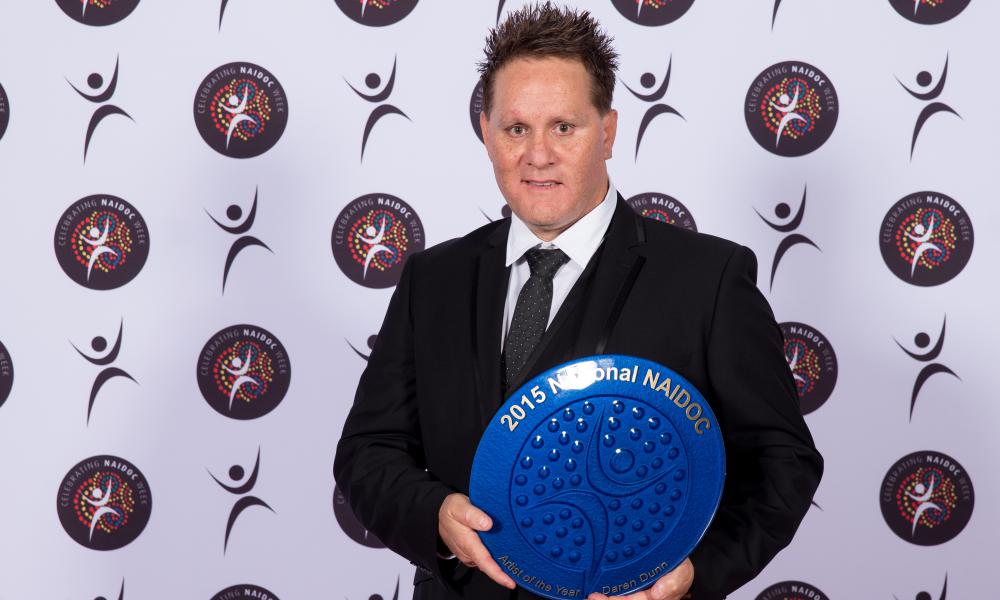
Daren Dunn
Daren Dunn is a Gamilaroi man from New South Wales and world renowned artist who has exhibited in Italy, Russia, Ireland, China, the United States and Japan.
Not limited to the canvas, Daren has hand painted a cricket bat for Prince William, high heels for Princess Kate, a golf bag for Tiger Woods and Football boots for David Beckham.
A dedicated educator, Daren has worked with Indigenous youth for 23 years. His passions are sharing his knowledge and skills in art, fostering a love and respect for Aboriginal culture and giving back to the community.
Recently Daren has been running his ‘Get Black On Ya Feet’ program with Lurnea High School, teaching students techniques to create their own artworks and helping them collaborate to create a 12 metre mural for the school.
Daren’s main goal in his work with students is to ensure sustainability in Indigenous education for future generations.
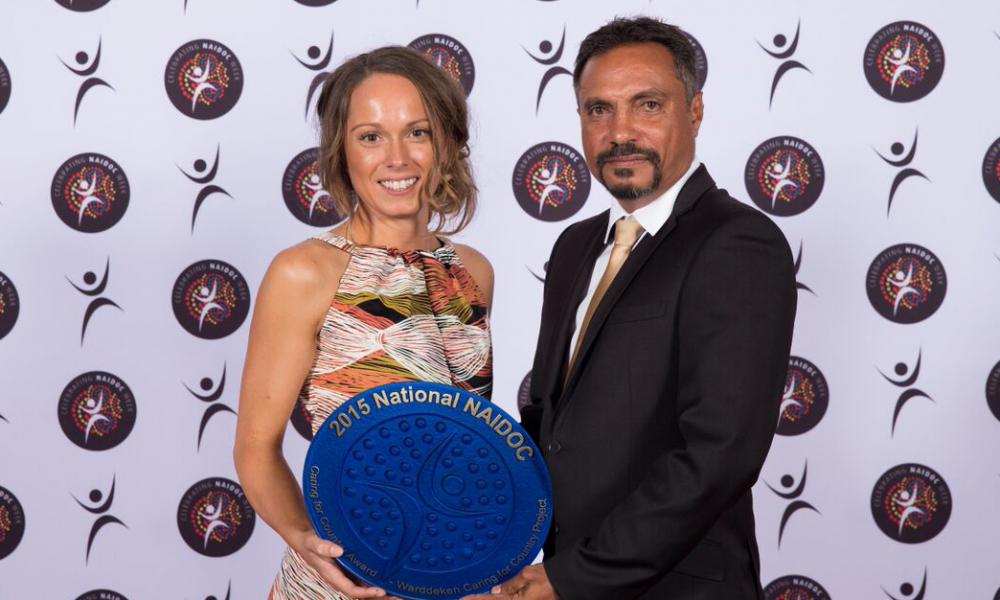
Warddeken Caring for Country Project
The Warddeken Caring for Country Project uses the best of both worlds to care for almost 1.4 million hectares of spectacular stone and gorge country on the Western Arnhem Land plateau.
Community directed and implemented by the Narwarddeken people, the project follows ancient laws handed down by ancestors, combined with western science, to understand country in a different way.
The Project cares for country, from managing weeds, wildfire and feral animals to recording significant rock art sites. Their innovative fire work is the strength of the project. It won the 2011 Caring for Country Indigenous Banksia Award and more recently the Eureka Prize for Innovative Solutions to Climate Change.
Project leader, Bardayal Nadjamerek, had a vision for a better future for all Narwarddeken people. It is a vision that everyone in the Project shares. Their work is achieving this by strengthening culture, passing on knowledge, creating jobs and providing solutions for long term, sustainable management of country.
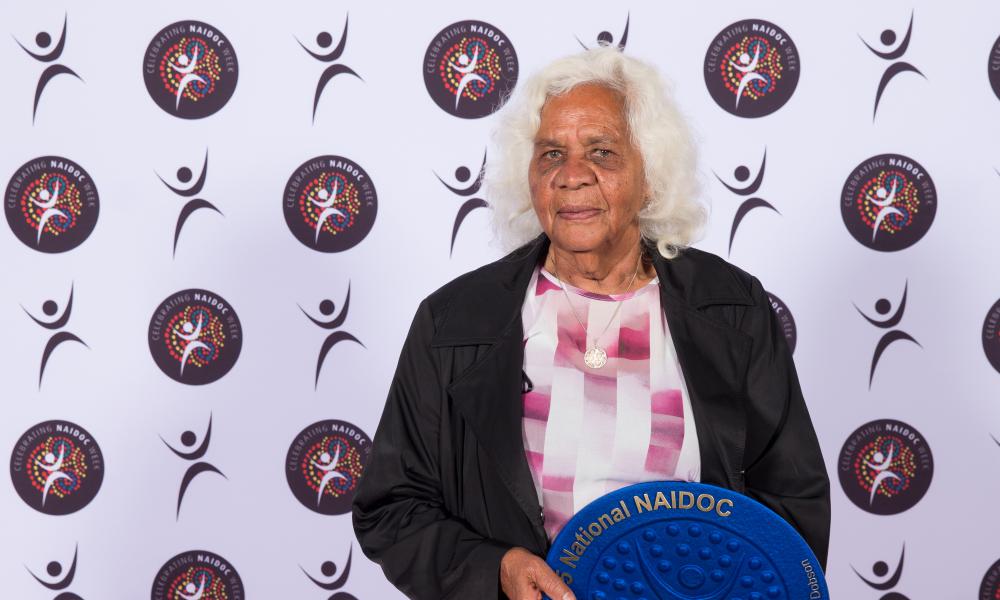
Veronica Perrule Dobson
Veronica Perrule Dobson is an Eastern Arrernte Elder, often sought out for her expertise in language, culture and the environment.
Born in Alrtunga, Northern Territory, Veronica moved to Alice Springs at 16 where her language skills led to her becoming the head of the Interpreting Service.
A strong advocate for teaching Aboriginal language and culture in schools, Veronica has taught countless children the Arrernte language.
Passionate about the environment, Veronica has worked with the CSIRO on numerous projects, delivered a paper at the Indigenous Environmental Conference in Canada and made a guest appearance on ‘The Cook and The Chef’ where she showcased Aboriginal food to Maggie Beer.
Veronica was awarded an Order of Australia in 2011 for her work as a linguist, naturalist and ecologist.
Always inspiring her children and grandchildren to love language and culture, she hopes this legacy will carry on into the future.
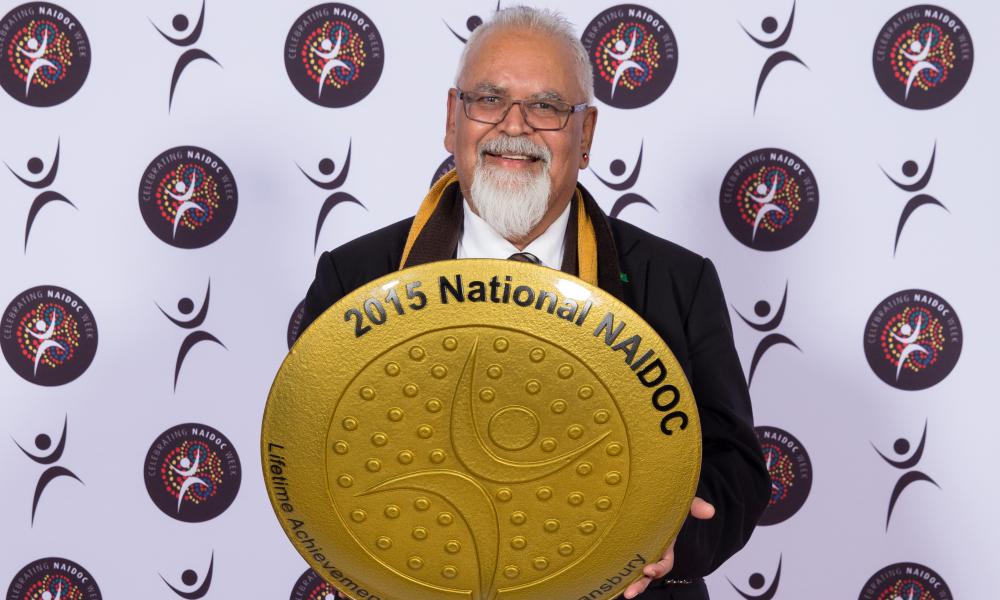
Tauto Sansbury
Tauto Sansbury is a Narungga man from the Yorke Peninsula of South Australia. He also has Kaurna and Wirangu heritage and has been a tireless advocate for social justice for Aboriginal people for over 30 years.
As State Chairperson of the South Australian Aboriginal Justice Advocacy Committee and Chairperson of the Aboriginal Justice Advisory Committee for over 10 years, Tauto fought to improve the conditions of Aboriginal people in the criminal justice system. In 2003, his hard work was honoured by an Australian Centenary medal.
Tauto’s passion for working for his people is 24/7. He has served in countless official and voluntary positions from chairperson of the South Australian Aboriginal Coalition for Social justice, or lecturing university refugee students to hosting screenings of Jon Pilger’s Utopia.
Overcoming significant disadvantage and minimal education, Tauto has risen as a champion for his people.
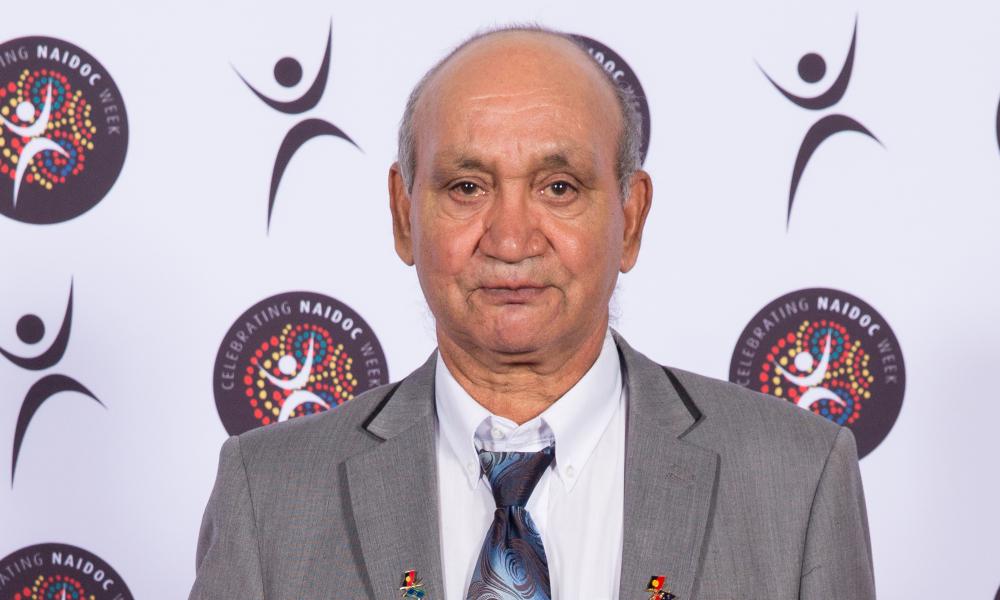
Graham Taylor
Graham Taylor is a respected Amangu Yamaji Elder from Western Australia.
After growing up on a reserve, Graham joined the army and served five and a half years, completing two tours. The first was to Vietnam, where he was a stretcher bearer, and the second to Malaysia, where he was a forward scout.
Graham is a Geraldton RSL stalwart, has never missed an ANZAC service and plays a key role in memorial activities each year. He works tirelessly for the recognition of Aboriginal servicemen and women, including getting a plaque mounted on the RSL remembrance wall acknowledging Aboriginal people who fought and died for their country.
Graham dedicated countless hours to the development of a Bundiyarra Corporation Gallipoli enactment and dugout display. He regularly shares stories with Mullewa High School students, talking about growing up, his time in the Army and his pride in being Aboriginal.
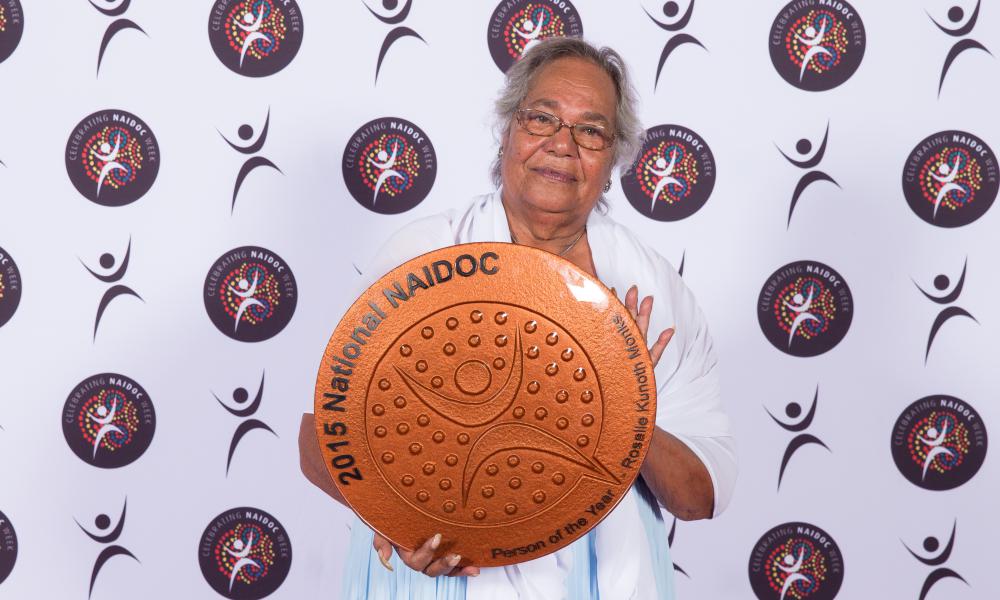
Rosalie Kunoth Monks
Rosalie Kunoth Monks is an Arrernte Anmatjere woman from the Northern Territory.
Born on Utopia Station, Rosalie moved to Alice Springs. At 16 she played the lead role in the film, Jedda. The film was the first to feature an Aboriginal person in a lead role. After 10 years in a Melbourne convent, Rosalie settled in Alice and started a career of over 50 years in human rights and politics.
Rosalie is passionate about Aboriginal people having access to their land, language and culture. Her contribution at local and national levels is vast, including Advisor on Aboriginal Affairs in the NT, to Trailblazer for the Oxfam Straight Talk program.
Rosalie has received countless awards, including an Order of Australia Medal, Northern Territorian of the year and finalist for Australian of the Year.
Still a household name from her many television appearances, at 78 years of age, Rosalie remains one of the most powerful voices for change in Aboriginal Australia.
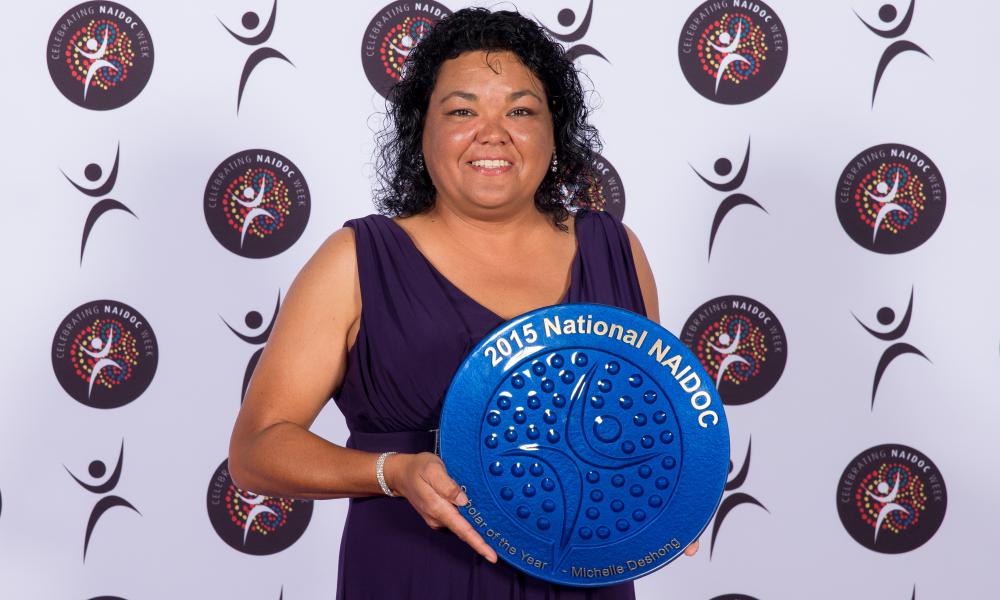
Michelle Deshong
Michelle Deshong is a proud Kuka Yulanji woman from northeast Australia.
After 15 years in the Australian Public Service and community-led work such as Director of the Australian Indigenous Leadership programme, Michelle returned to her home state of Queensland to start her academic career.
Graduating from James Cook University with First Class Honours, Michelle was awarded the University Medal, Deans List Award and is a member of the Golden Key International Honours Society. She is currently completing her PHD in, Enabling Participation of Aboriginal Women in Public and Political Life. And this year, Michelle was awarded a prestigious Fulbright Scholarship.
Passionate about advocating for community and women’s issues, Michelle is also lead facilitator of Oxfam’s Straight Talk Program, where she has inspired more than 500 Aboriginal and Torres Strait Islander women. She has also been a representative for over 5 years at the United Nations Commission on the Status of Women and the Convention on the Elimination of Discrimination against Women.
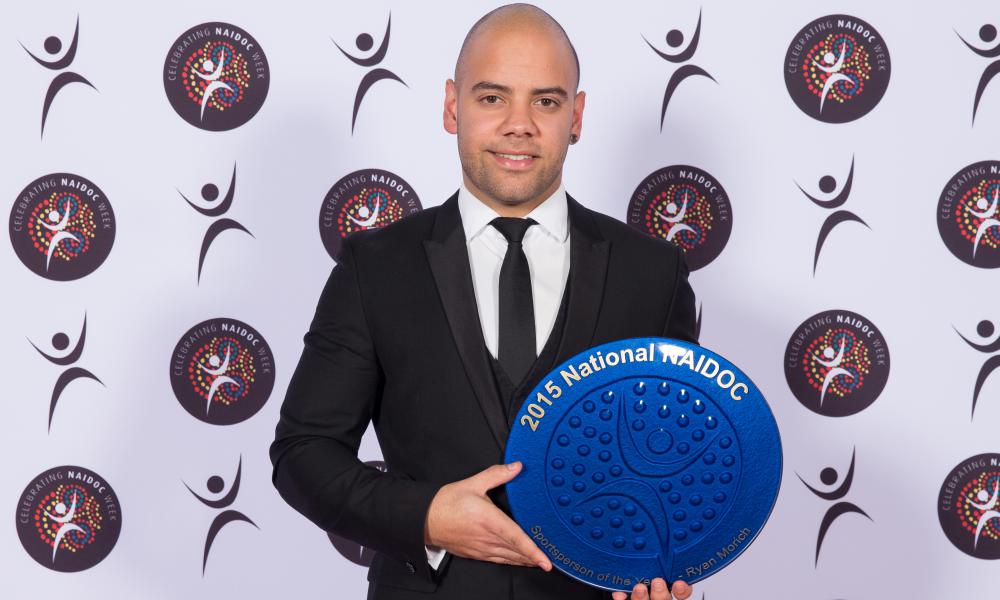
Ryan Morich
Ryan Morich is a Noongar man from Western Australian, currently on a wheelchair basketball scholarship at the University of Alabama.
Ryan is the first Aboriginal person with disability to take up a sports scholarship in the USA. In his first year, he made the Intercollegiate All-Rookie Team.
In 2013, Ryan represented Australia at the Under 23 World Championships, where he led the team to a bronze medal win. He is currently a member of the Australian Rollers senior team.
Ryan is captain of the Red Dust Heelers – a wheelchair basketball team with a strong focus on unearthing future Aboriginal athletes with disability. Ryan is partnered with the Wheeling and Healing Program, which helps people deal with negative feelings arising from their disability. He helps others by sharing his story on cancer, limb loss and losing loved ones to cancer.
Ryan’s goal is to represent his country at the Paralympic games and to further opportunities for young people with disability.
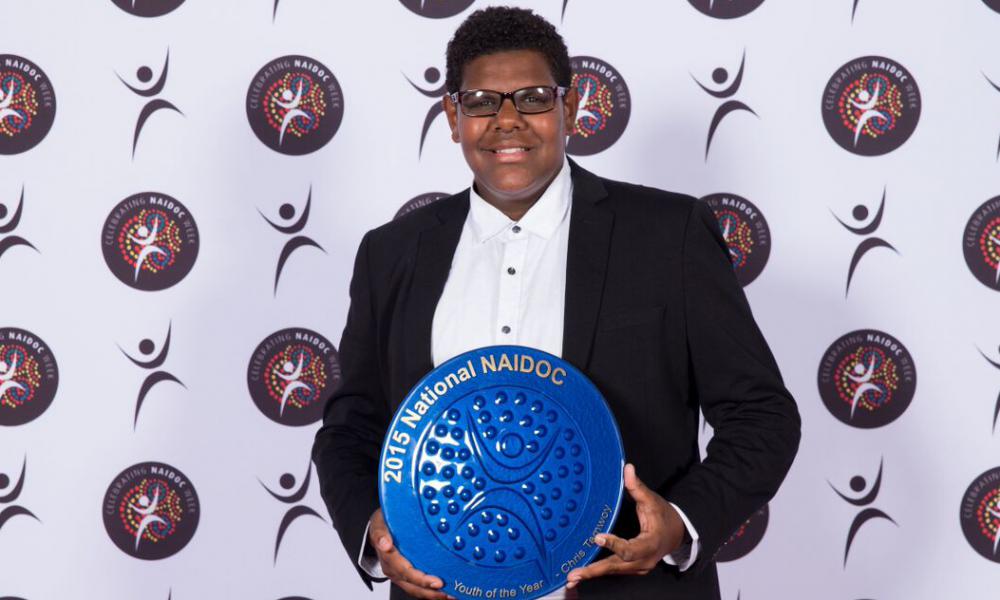
Chris Tamwoy
Chris Tamwoy has ties to Badu, Boigu and Darnley Islands in the Torres Strait and is a self-taught guitar virtuoso in the making.
Since a video of a school performance went viral, his stage presence and emotive musical gift have been making an impression on the Australian music scene.
Chris has opened for John Butler Trio at the Byron Bay Blues Festival, played at the NRL Indigenous All-Stars game earlier this year, and appeared on NITV’s Unearthed, JJJ and ABC radio. His first EP is in production.
Chris’s other passion is reconciliation. In 2013, his neighbourhood in Logan became the focus of so-called race riots. Chris joined other Indigenous youth to form the Logan First Nations Youth Assembly, to tackle the negative portrayal of Aboriginal and Torres Strait Islander youth.
Chris is involved with the Recognise campaign, facilitates for the National Indigenous Youth Leadership Academy and is co-chair of Logan Youth Arm – Australia’s first youth reconciliation group affiliated with Reconciliation Australia.
2014
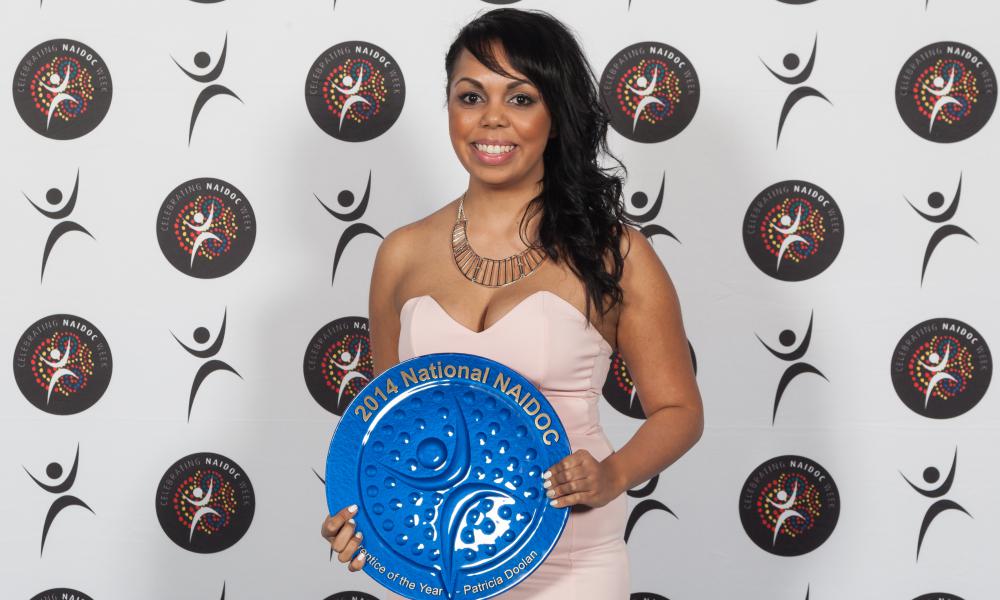
Patricia Doolan
Completing Year 12 in 2011, Patricia began her career in administration. Originally registered with Advanced Personnel Management, Patricia moved on to enroll in the Australian Government’s Indigenous Employment Program. Patricia took part in intensive workplace preparation training before securing full-time work as a teller with the Bank of Queensland whilst completing a Certificate III in Financial Services.
Since completing her certificate, Patricia now works as a Customer Service Officer and often assists in a sales role with the bank, marketing credit card and insurance products to customers.
This experience and the opportunity for employment has shaped the beginning of Patricia’s career in banking and finance. The bank has rewarded Patricia’s personal and professional approach with more responsibility and positional accountability. In this way, Patricia’s efforts are returning a strong investment for her employer, and her future.
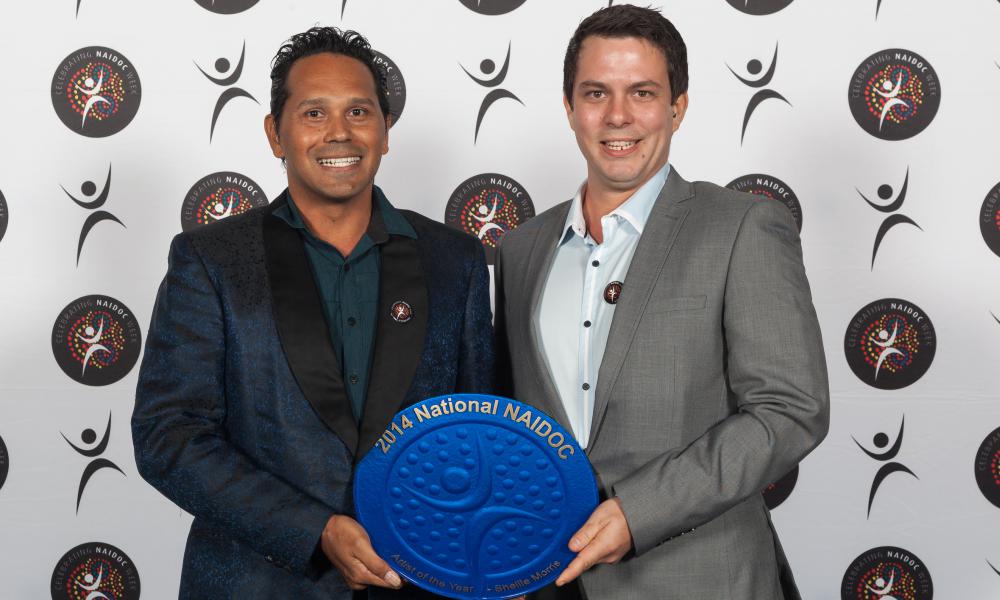
Shellie Morris
Ben Tyler and James Emery accepting on behalf of Shellie Morris
Already the 2014 Northern Territory Australian of the Year, Shellie Morris is a strong contributor to the music industry in Australia. So far this year she has collaborated with artists from New Zealand and Scotland in the Boomerang project. She has performed at WOMAD NZ, Sydney Opera House for Homeground Festival and at the Hebridean Celtic Festival, Culture 2014 as part of the Glasgow 2014 Commonwealth Games Celebrations, including the Queens Baton Relay and Commonwealth Games Festival.
As well as her musical accomplishments, Shellie’s success is evident in the personal engagement she has with those around her using her talents and gifts to improve the lives of Australia’s Indigenous People.
Over the past 12 months, Shellie has worked with Southern Youth and Family Services, Anyinginyi Health Aboriginal Corporation, Yijala Yala Project, Big hART, the Jimmy Little Foundation, Black Arm Band, Darwin Town Communities Women’s Leadership, Australasian Performing Right Association, Walamun Cultural Festival Bulman-Weemol, Woodford Folk Festival, Charles Darwin University and The Song Peoples Sessions. In addition, together with Northern Territories Library, Shellie co-created two in language baby books to promote healthy babies combining a western and Aboriginal cultural context.
Shellie makes music that empowers people. In a huge moment for her in 2014, Shellie wrote a song for reconciliation with Dan Sultan which will be used as part of the Recognise campaign and will be released nationally later in the year.
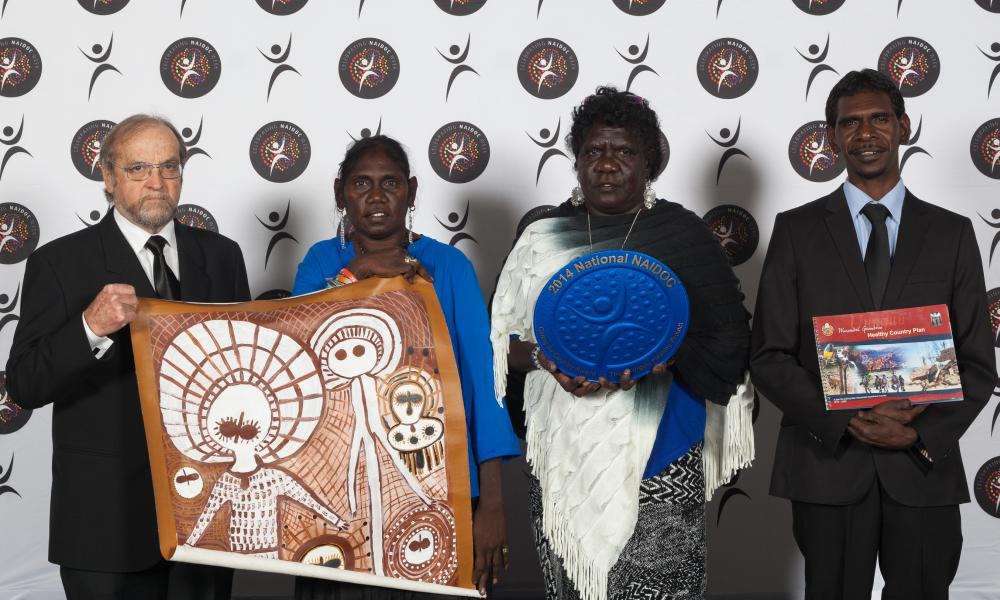
The Uunguu Healthy Country Project
Bevan Stott, Lillian Karadada and Robert Warren accepting the Caring for Country award on behalf of the Uunguu Healthy Country Project.
The Uunguu Healthy Country Project is a Caring for Country project where Wunambal Gaambera people are taking a partnership and two worlds approach to looking after country. This approach embraces traditional knowledge, rules and responsibilities and combines them with modern science and technology to keep the Wunambal Gaambera people's uunguu – their living home – healthy. The Wunambal Gaambera people have joined forces with both the private and public conservation sector to support their caring for country work.
Wunambal Gaambera people, through their work and partnerships, are promoting to both their future generations and other Australian’s an understanding of the unique cultural and natural assets their country and how to look after them. Their partnership approach with other conservation organisations provides tangible examples of the benefits of using two way knowledge and approaches:
The Wunambal Gaambera people have developed a Healthy Country Plan – a two year on country planning process engaging all Native Title families in partnership with Bush Heritage Australia and Kimberley Land Council.
As the first partnership of its kind with a private conservation organisation in Australia, the Wunambal Gaambera people have established a 10 year Healthy Country plan implementation agreement with Bush Heritage Australia.
These are just two examples of the innovative and pragmatic way in which the Wunambal Gaambera people are ensuring a healthy future for their country.
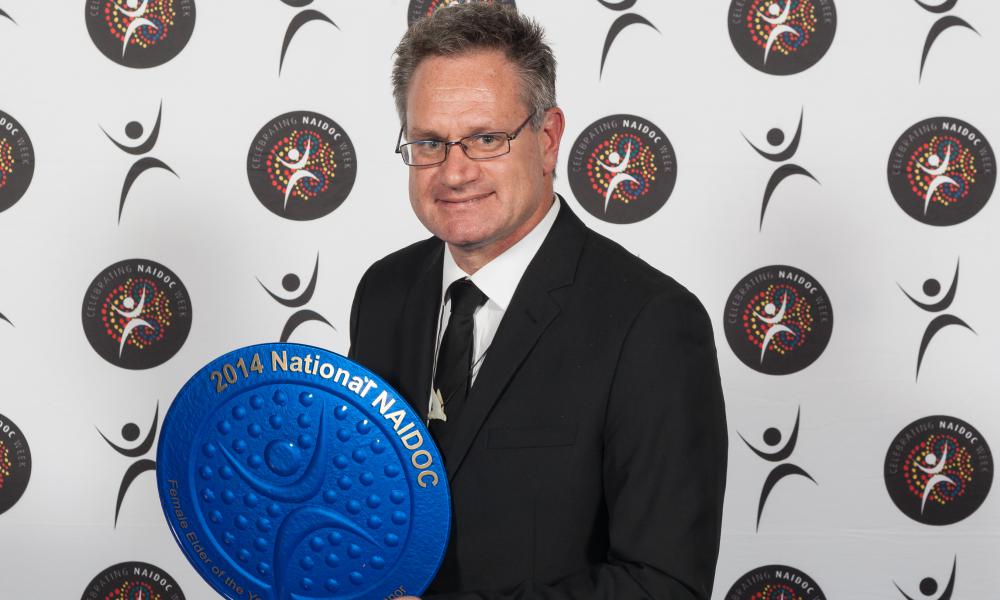
Patricia O'Connor
Rory O'Connor accepting the award on behalf of Patricia O'Connor.
Known for being a quiet achiever, Patricia O’Connor is the inspirational woman behind the Kombumerri Aboriginal Corporation for Culture.
An idea discussed around the dining table one evening in the early 1980’s has grown into one of Australia’s most successful Aboriginal-owned language centres, and is a major contributor to the Indigenous cultural landscape of south east Queensland.
The corporation trades by the name Yugambeh Museum. It is a language and heritage research centre and is the major source of information for researchers of Yugambeh cultural heritage. Patricia has been the driving force behind the Kombumerri Aboriginal Corporation for Culture.
The Museum aims to record and promote the traditional knowledge of its region, especially the Yugambeh language, which was traditionally spoken throughout south east Queensland. The museum has developed language awareness and other programs, linking with many of the schools, government and community organisations in and around the Gold Coast, Beenleigh and Beaudesert area. The Museum also assists Aboriginal youth with employment and training opportunities, and helps community members trace their own family stories.
Patricia has brought the stories of her community alive through her passion for curating interesting material for community. During her time with Kombumerri, Patricia has overseen 20 distinct and significant exhibitions – consisting of more than 300 panels and single photo items, at an average of one exhibition every two years.
Currently, Patricia is working with younger generations to create a new community movement called Yugambeh Mobo. Yugambeh Mobo is a campaign to unite the community through cultural pride from the past to our tomorrow. Yugambeh mobo aims to ensure Aboriginal culture, concepts and values are part of the south-east Queensland story.
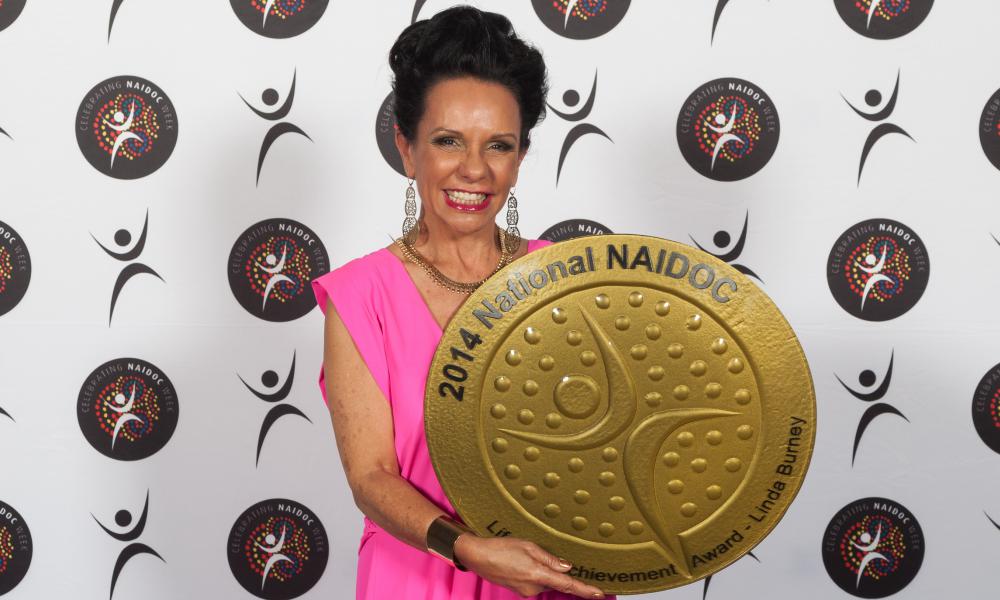
Linda Burney
A member of the Wiradjuri Nation, Linda Burney is a natural leader. Born in 1957, Linda was one of the first Aboriginal students to graduate from Mitchell College, now known as Charles Sturt University, with a teaching degree in 1978. After teaching for only two years, at the young age of 22, Linda asked to join John Lester, Lynette Riley and Trevor Cook in establishing the first Aboriginal Education Unit within the NSW State Department of Education. In this role Linda assisted in creating the first ever Aboriginal Education Policy in NSW which set the template and ongoing standards for Aboriginal education across Australia. Linda’s achievements are clearly demonstrated over three decades of continuous commitment championing Aboriginal rights in education, reconciliation and politics. Linda has contributed significantly to the development of Indigenous communities locally, regionally and nationally as an educator, championing reconciliation in Australia and as Member of the NSW Parliament.
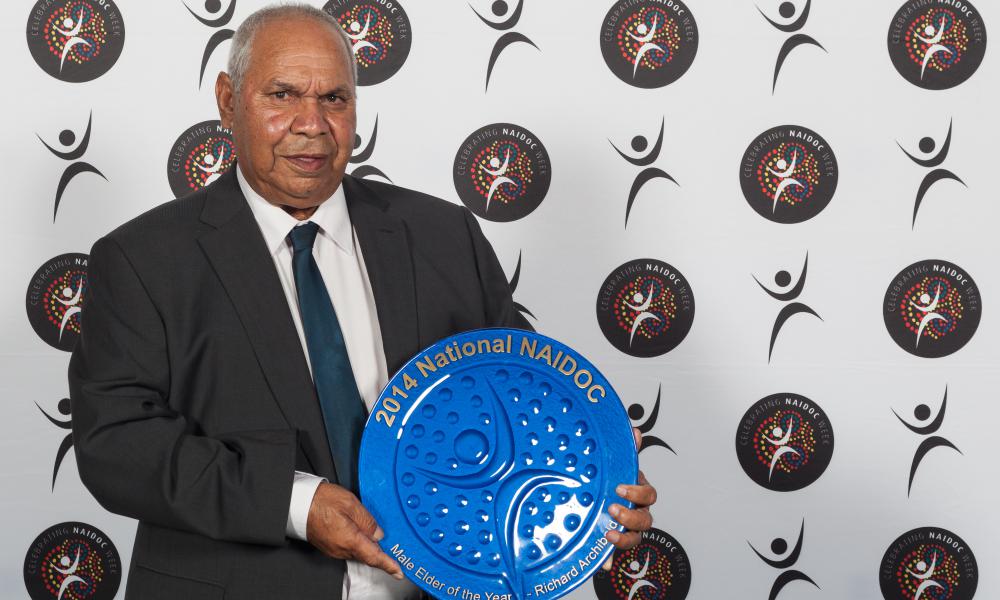
Richard Archibald
Richard Archibald is a Gumbaynggirr man born in 1947. Richard grew up in Kempsey and South West Rocks in Northern New South Wales. Living on Burnt Bridge Mission, Richard watched his Elders struggle to get access to basic services and facilities. This is where his journey began in standing up for Aboriginal rights began.
Showing a deep connection to country, Richard was the first Aboriginal person to carry out ceremony for fallen Aboriginal Diggers so that their spirits could be returned to country. Known for raising the profile of Aboriginal Servicemen, Richard has received acknowledgment from the RSL at both local and state levels. Richard has benefitted the awareness of Indigenous and non-Indigenous Australians through the delivery and promotion of the Kokoda Project – leading to the “Spirit of the Warriors” DVD, a 30 minute documentary telling the story of the epic journey to bring the spirits of six Aboriginal soldiers who fell on the Kokoda Track back to their Country. This DVD is being distributed nation-wide.
Richard actively promotes awareness of Aboriginal soldiers who have fought for country through schools, working in a voluntary capacity with the Department of Education.
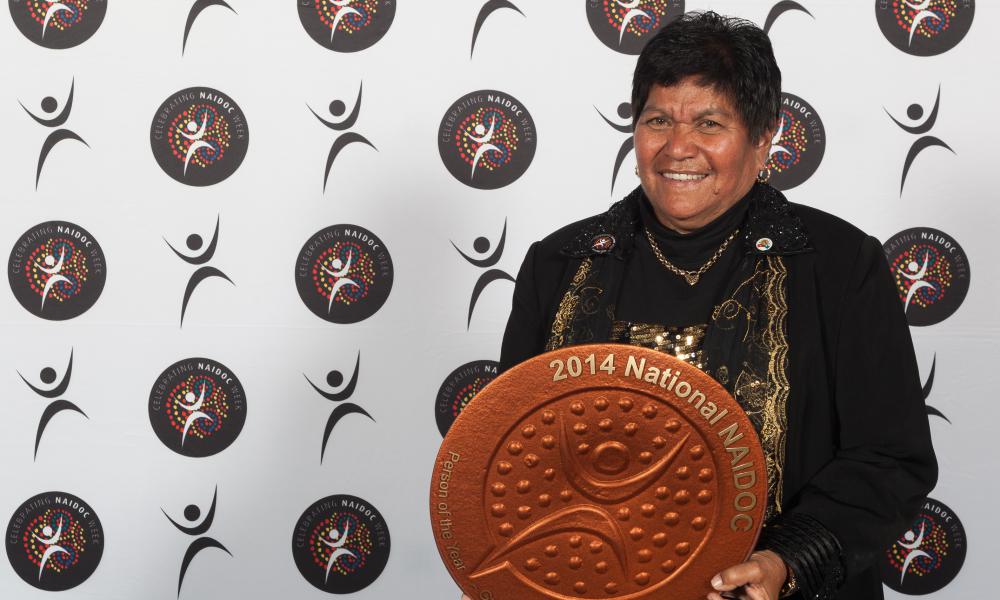
Gracelyn Smallwood
An outspoken advocate for the rights of Aboriginal and Torres Strait Islander peoples since 1968, Gracelyn Smallwood grew up in Townsville in Queensland. When 90% of Australia voted yes in the 1967 referendum, the Townsville population had voted 90% no. Gracelyn grew up consciously determined that she would break through the barriers of racism.
Despite being treated as a second class citizen and very few careers being available to Aboriginal school leavers, Gracelyn was a high achiever. She trained to become a nurse and later completed a midwifery certificate.
Gracelyn’s vocation as a Registered Nurse and Midwife took her to remote areas of Australia with the Remote Emergency Nursing Service, delivering babies in Western Australia, Northern Territory and South Australia.
In collaboration with other health workers throughout Queensland, Gracelyn helped develop a series of culturally-appropriate media materials to raise awareness of HIV-AIDS, sexually transmitted infections, the harms of alcohol and drug abuse and domestic violence.
In 1986, Gracelyn received an Order of Australia medal for her service to public health. In 1997, she was special guest of President Nelson Mandela in South Africa where she conducted a series of lectures on HIV-AIDS in various townships.
Last year, Gracelyn was formally recognised for her contribution of 45 years to health and human rights advocacy. This year, she became a member of the Queensland Mental Health and Drug Advisory Council.
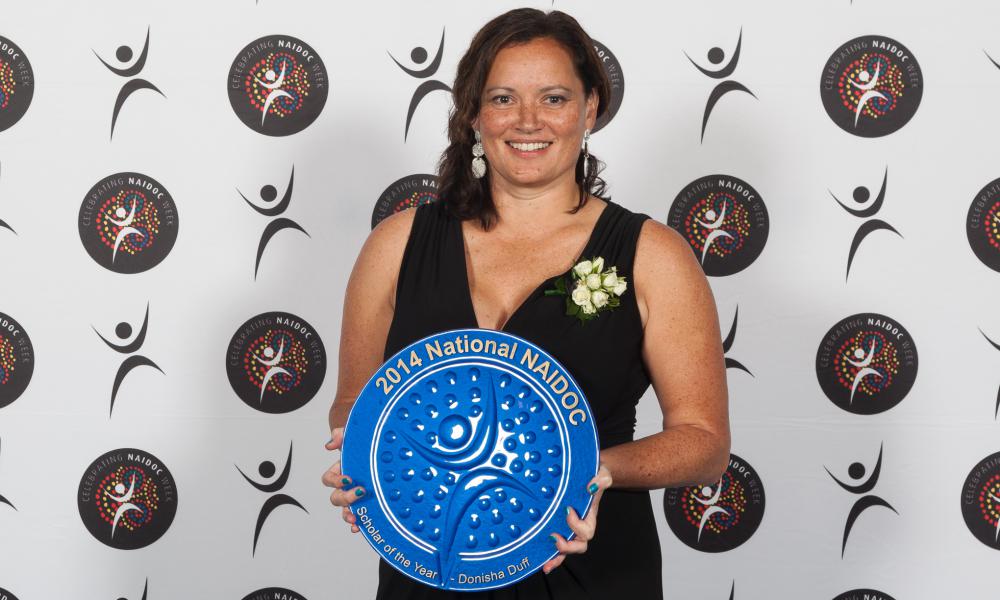
Donisha Duff
Donisha Duff is an Aboriginal and Torres Strait Islander woman from Thursday Island and her family descend from the Moa and Badu Islands, and the Yadhaigana and Wuthathi people.
Donisha is being honored tonight due to her passion for Aboriginal and Torres Strait Islander entrepreneurship and innovation. In 2013, after six years of combining full-time work and part-time study, Donisha became the first Aboriginal and Torres Strait Islander person to graduate with a Masters of Business Administration from the Australian National University. During her studies, Donisha won a bursary from the Roberta Sykes Indigenous Education Foundation to attend summer school at Harvard University.
In her time at Harvard, Donisha completed two courses of study in Systems Thinking and Cross Border Innovation, which were credited towards the completion of her Masters of Business Administration at ANU. In 2012, Donisha became a member of the Harvard Club of Australian.
In addition to her academic success, Donisha has worked with the Australian Government, not-for-profits and community organisations in a number of roles including being former Adviser to Warren Snowdon MP, the first Federal Minister to have an Indigenous Health portfolio.
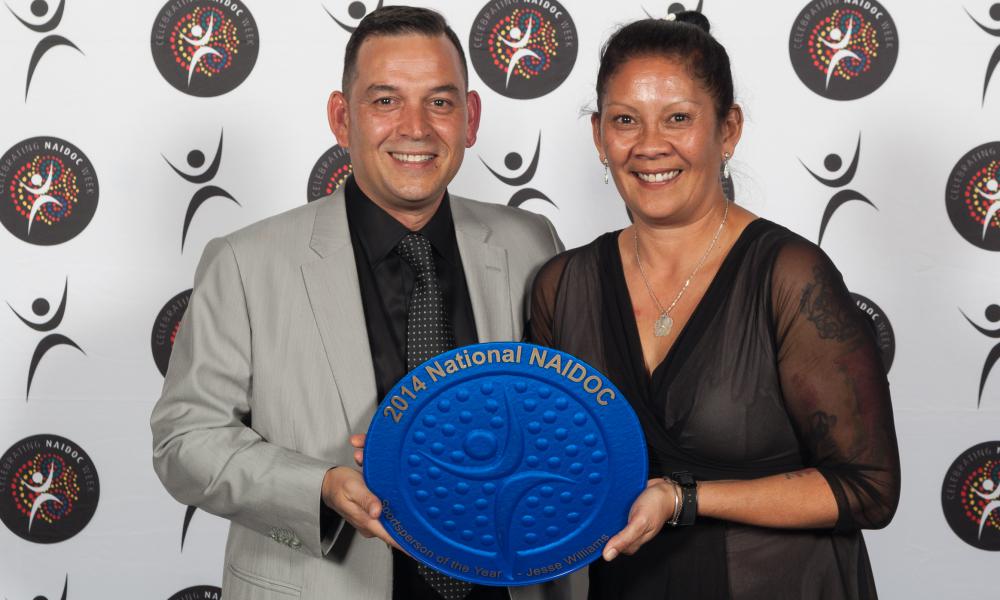
Jesse Williams
Arthur and Sonia Williams accepting on behalf of Jesse Williams.
Born on Thursday Island and raised in Brisbane, Jesse Williams has grown up to become the first Indigenous Australian to play American football at the highest level.
Although his success is now playing gridiron football in the USA, Jesse first started out playing rugby league and basketball. Playing basketball from the age of 9, Jesse went from local school and club representation to State School Champions for Metropolitan East through to Under 14 Club National Championships in Alice Springs in 2003.
Jesse then took a year off sport, but was persuaded to participate in flag football to learn how to play American Football, gridiron. There was no looking back. At the age of 14, Jesse started playing for his local gridiron club, the Bayside Ravens in Brisbane.
Jesse’s success has continued as he went on to play state representative competition and then national representative competition. In April 2013, Jesse was drafted into the NFL where he currently plays for the Seattle Hawks. A strong role model who is described as achieving everything he sets his mind to, Jesse is a fine example of hard work and determination leading to great results.
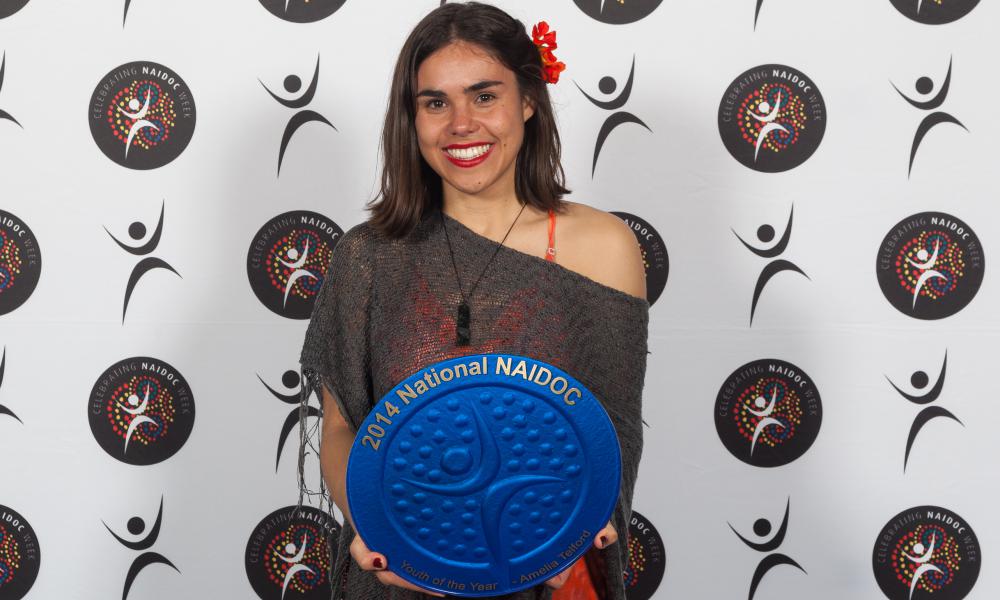
Amelia Telford
Amelia Telford is a Bundjalung woman originating from Northern New South Wales. Amelia currently works in Melbourne as the Indigenous Coordinator for the Australian Youth Climate Coalition.
After finishing high school in 2012, Amelia believed that the voice of Indigenous youth was lacking when it came to climate change and standing up for country, and for this reason, she deferred her university studies to develop a program through the Australian Youth Climate Coalition. The programme supports Aboriginal and Torres Strait Islander young people to lead on climate action and run sustainability projects in their communities.
Amelia’s vision is to build a network of young leaders from across Australia to stand up for country and stronger action on climate change and sustainability. This year, Amelia plans to expand the Australian Youth Climate Coalition Indigenous Program to intensively train and mentor up to 50 Indigenous youth across the country, work with and engage an additional 40 high school students, and create opportunities for Indigenous and non-Indigenous communities to work together.
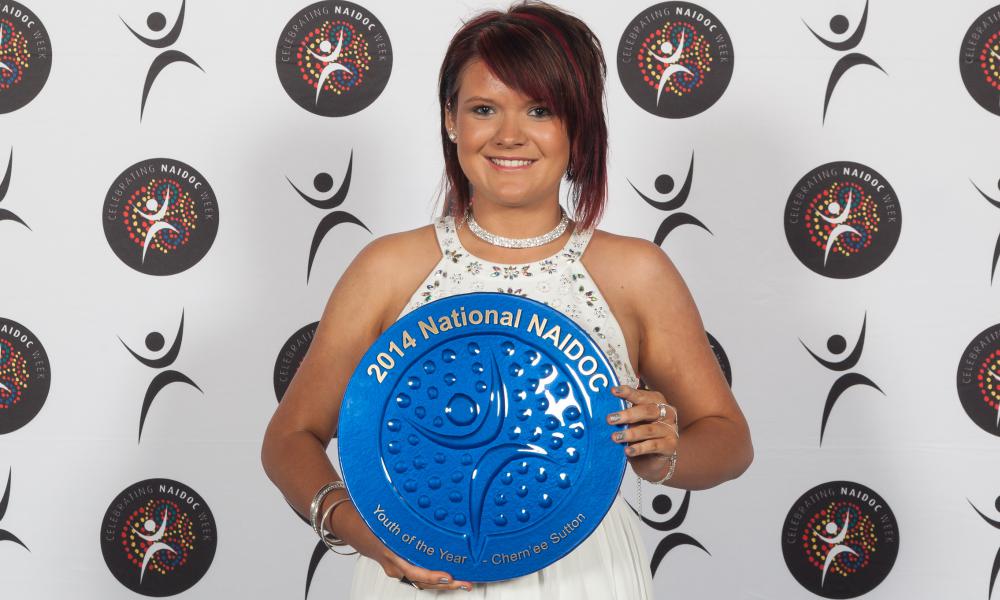
Chern'ee Sutton
Chern’ee Sutton has accomplished more than people many years older than her 17 years. Not only is she an extremely talented contemporary Indigenous artist, she has used her gifts and her art to benefit others.
To date, Chern’ee has donated more than $60,000 worth of art to charities and organisations across Australia to raise much needed funds. Funds from Cher’nee’s art enabled the Queensland under-15 football team to fly to Papua New Guinea. Through Chern’ee’s fundraising efforts, a woman was flown to the USA to receive a hearing operation. Funds also contributed to assisting flood victims in Bundaberg and the list goes on.
Chern’ee’s passion for reconciliation inspires a lot of her art. Proudly, two of Chern’ee’s artworks hang in Queensland’s Parliament House, one on permanent display on level 5. The art work is called Ajarku Muruu which in Kalkadoon language, means “All One Country”. Chern’ee is also on display in the Queensland Government’s Aboriginal and Torres Strait Islander and Multicultural Affairs Office in Brisbane.
A young woman who has not only freely given her time and artwork to improve her community and the lives of others, Chern’ee is a dedicated and inspiring person.
2013
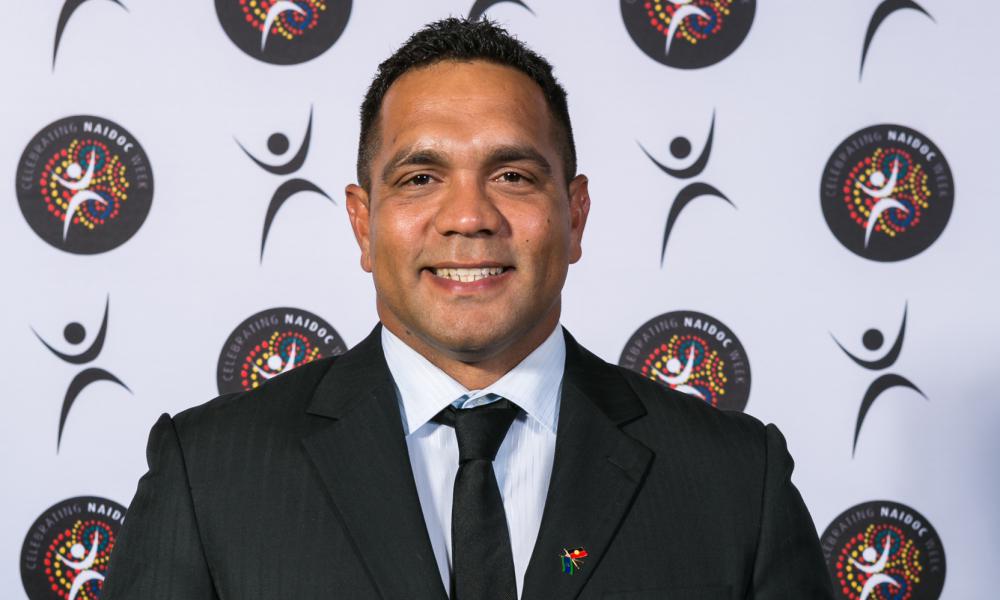
Danny Bromot
Danny Bromot is a proud Yolngu man from Nhulunbuy in North East Arnhem Land.
Starting his career in mining at Gove Operations Pacific Aluminium Steam Power Station in 2009, Danny completed the Advanced Boiler and Turbine Operations Tickets, and is close to completing the Certificate 3 in Power generation.
He sees the growing demand for skilled workers and the future potential for employment in his region for the Yolngu people around East Arnhem Land.
Balancing family, community, study and work, Danny still finds time to encourage new recruits to grasp new opportunities and make the most of them.
Danny is a passionate family man, friend, mentor and an inspiration to everyone in his community.
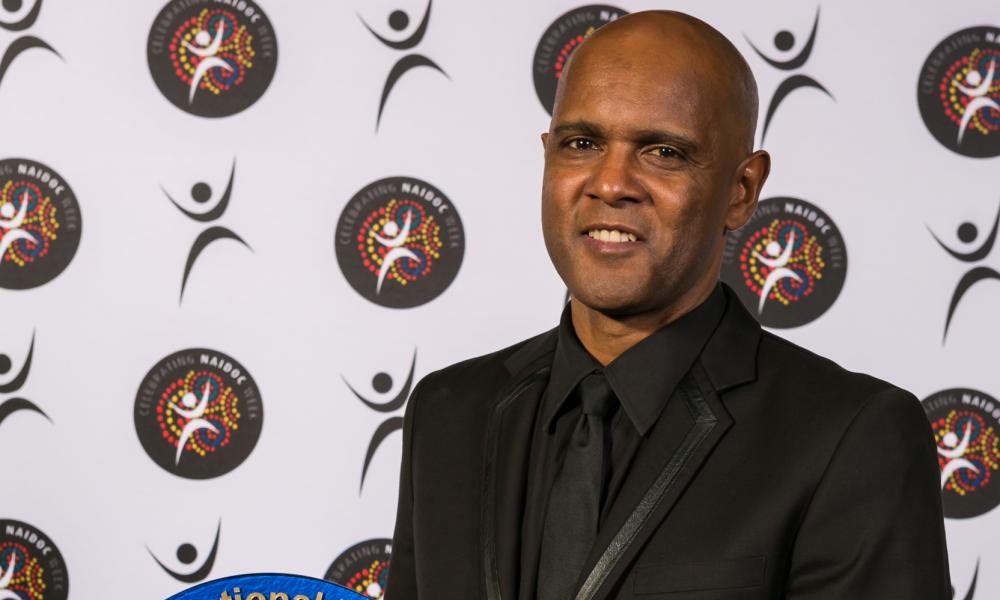
Tony Briggs
Starting his career as an actor on Neighbours in the 1980’s, Tony Brigg’s career in the arts has gone from strength to strength.
Over the past 25 years he has performed on both stage and screen, gaining a reputation as one of Australia’s leading Indigenous performers.
Tony is best known for writing the award winning play ‘The Sapphires’, which was adapted for screen in 2012. He is currently working on projects for both TV and film.
A true leader, Tony dedicates time to sharing his knowledge and experience by mentoring younger people in his field.
Tony has demonstrated a lifelong commitment to the arts and his influence stretches beyond the Indigenous community to all Australians.
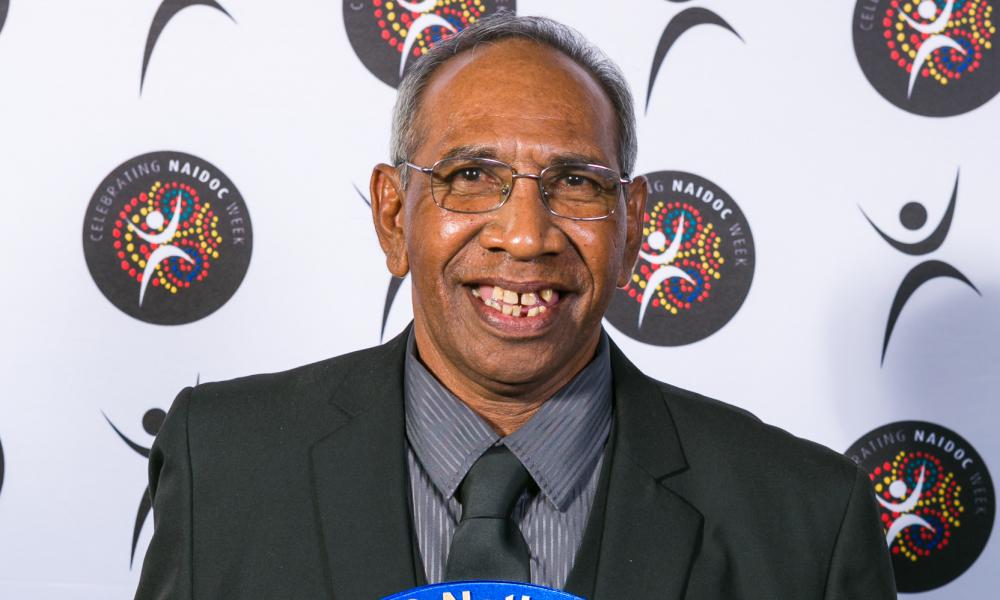
Jimmy Edgar
Jimmy Edgar is a Yawuru and Karajarri man from Western Australia who has shown his passion for country and culture over many years.
Jimmy provides cultural knowledge to schools, community organisations and government bodies that are interested in respecting and connecting to country.
On a daily basis Jimmy engages with the Yawaru Rangers, using his wealth of knowledge to teach them about keeping country alive and fruitful, for people to enjoy.
He played an important part in developing the Yawaru Cultural Management Plan, which has received several awards including the Judges Recognition Award at the National Awards for Excellence.
Jimmy has become the face of Yawaru country. He continues to devote his time to maintaining strong country and culture that can be handed down to future generations.
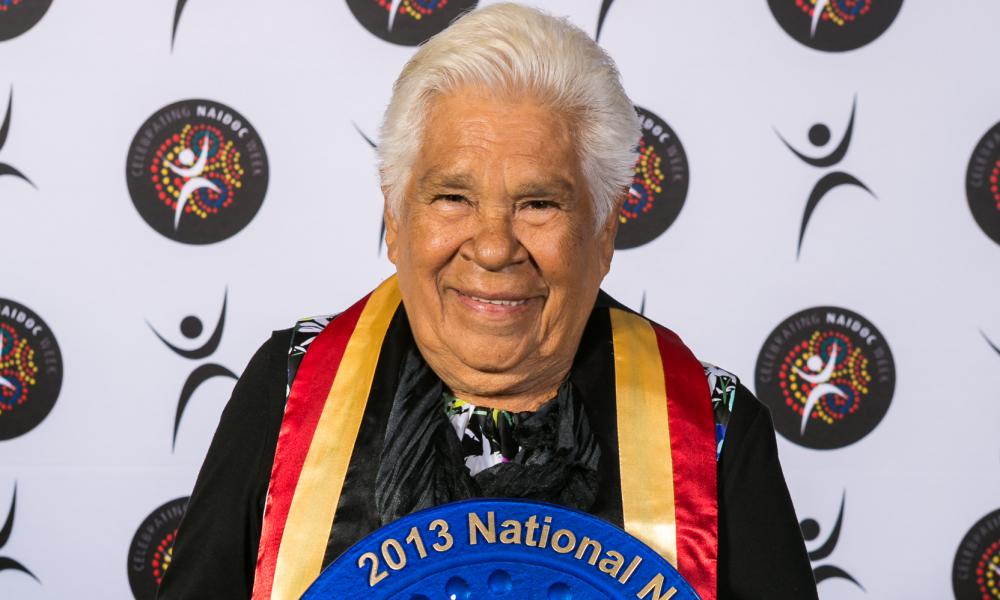
Rose Richards
Rose Richards is a proud Yalangi and Tagalaga Elder from far north Queensland. At 83 years of age, she is still an inspirational leader and role model for her people.
Rose has worked hard all her life. As an Aboriginal Liaison Officer at the Cairns Base hospital, Rose developed a passion for improving the health and wellbeing of babies, young children and mothers.
In 1983, Rose furthered her passion by establishing her own organisation, Mookai Rosie-bi-Bayan, to continue this work. This year, Mookai Rosie-bi-Bayan will celebrate its 30th anniversary and continues to be a national leader in Indigenous child and maternal health.
Rose is warmly welcomed into communities by all who know her and her commitment to her people is acknowledged across Australia.
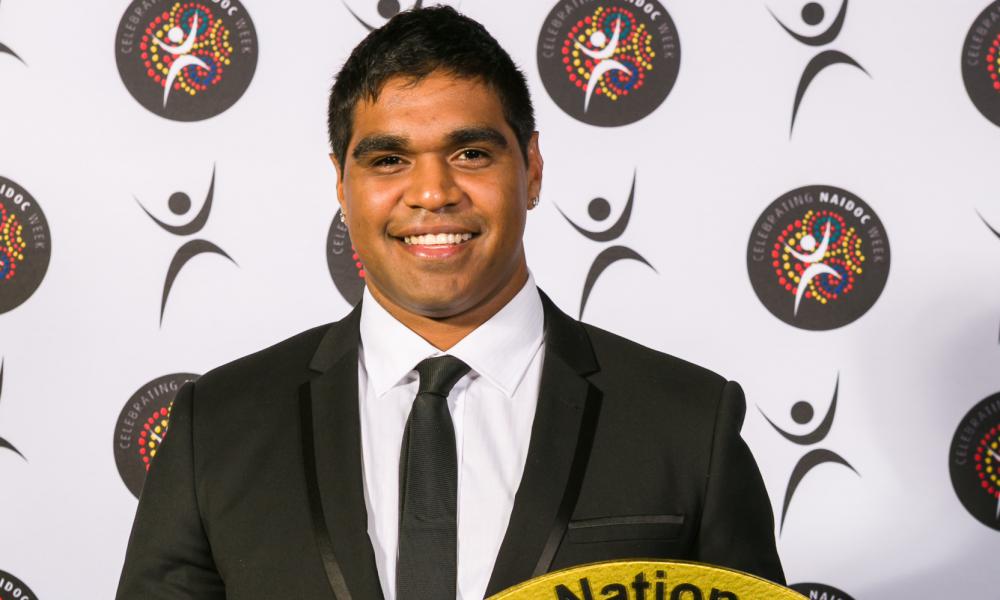
Galarrwuy Yunupingu
Born at Melville Bay near Yirrkala in East Arnhem Land, Galarruwy Yunupingu is a prominent leader and strong voice for Aboriginal people.
With Yolngu law and land rights his life’s interest, Galarrwuy came to national attention in the late 1960’s for his role in the landmark Gove Land Rights Case. This was the first action by Indigenous Australians to challenge mining companies’ use of traditional lands.
For many years, Galarruwy held an executive position on the Northern Land Council where he helped Aboriginal people win back, and take control of their land.
To this day, Galarruwy continues his advocacy for self-determination and economic development among his people.
Leader of the Gumatj Clan since 1979, Galarruwy has gained respect and admiration from prominent political leaders and many Australians alike for his dedication and achievements.
Galarruwy has been honoured as Australian of the Year, Member of the Order of Australia, and has been named as one of Australia’s National Living Treasures.
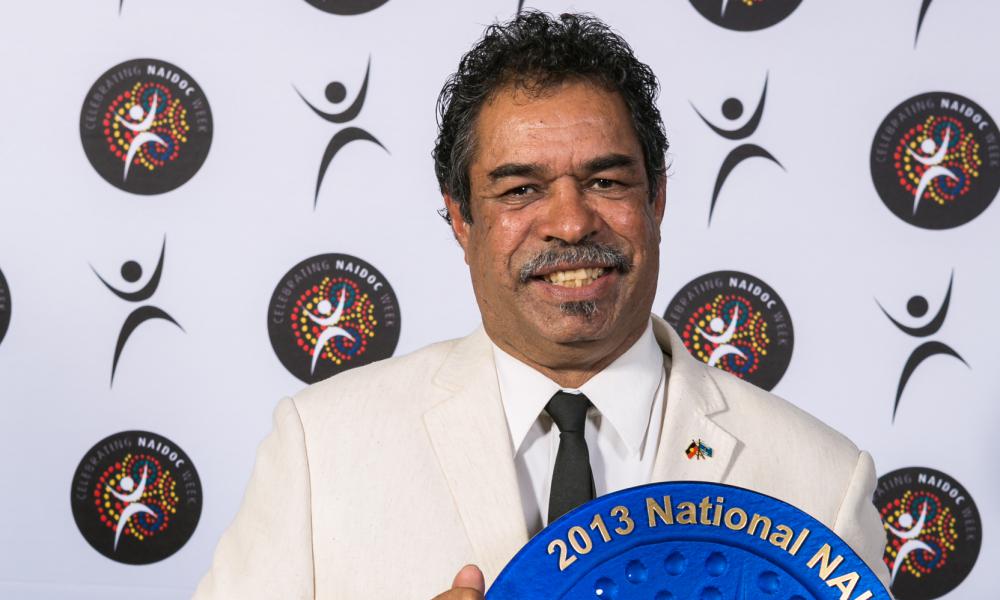
John Hayden
John Hayden is a respected Noongar elder from Brookton in the south west of Western Australia.
He started his working life in shearing sheds and manual labour crews, but decided his passion was to be actively involved in advancing the rights and wellbeing of Aboriginal people.
John spent 12 years working in Aboriginal health, before being elected to the Aboriginal and Torres Strait Islander Regional Council where he sat for eight years.
He has also worked with Western Australia Tourism with a focus on increasing tourism to WA through promotion of Aboriginal arts, craft and tours.
More recently, John has been involved with the Department of Corrections to increase levels of understanding within the Department about Aboriginal people and culture.
John is an inspirational role model who has dedicated his life to improving the lives and wellbeing of Aboriginal people.
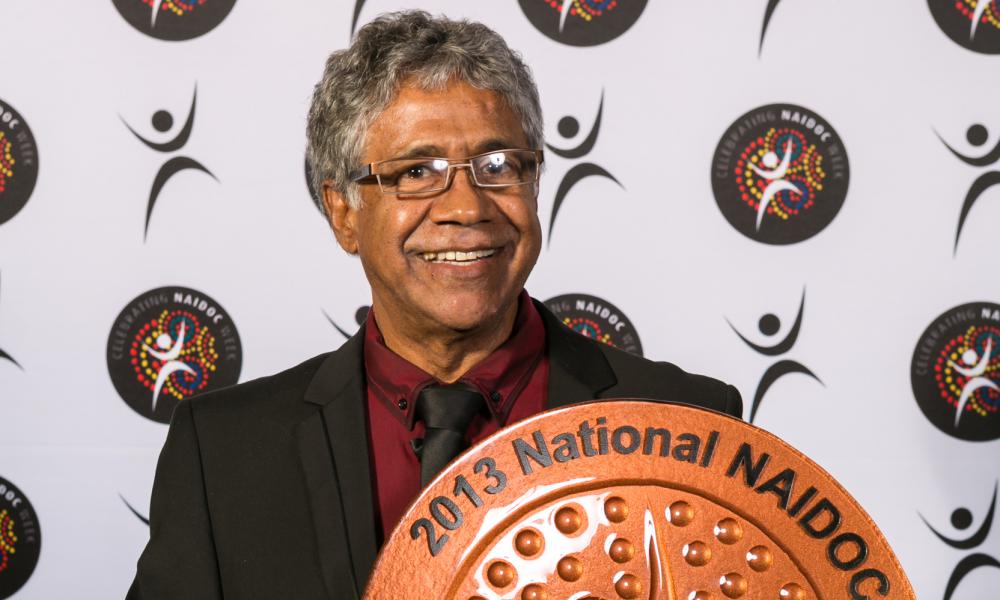
Darryl Kickett
Darryl is a Noongar man from the Narrogin area of Western Australia who has worked tirelessly for his people for more than 40 years
He has dedicated his life to community development, land rights, education, health and policy.
Beginning his career as a sportsman, Darryl enjoyed success as a champion boxer and Australian Rules footballer.
After completing a degree in social science Darryl was made Head of the Centre for Aboriginal Studies at the Curtin University. During this time, Darryl and his team developed the hugely successful Community Management and Development Course.
Darryl has made an outstanding contribution in Aboriginal health. As the CEO of the Aboriginal Health Council of Western Australia, significant advancements were made in health care delivery, child and maternal health, chronic disease and mental health.
Recently, Darryl has been responsible for bringing the Red Dust Healing Program to communities in WA, a program supporting a healthy path in life. As a result of Darryl’s vision, Noongar men are coming together to work towards spiritual healing. Darryl is described as a quiet achiever who doesn’t look for praise; somebody who has generosity of spirit and strength of character.
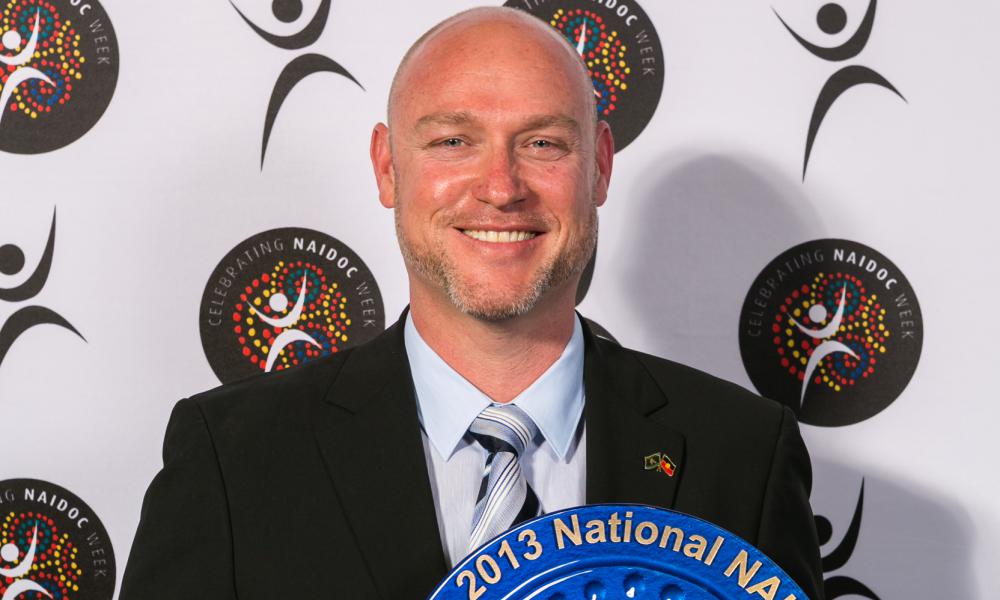
Dr Mark McMillan
Dr Mark McMillan is a Wiradjuri man from Trangie in central west New South Wales.
With a Graduate Diploma in Legal Practice, a Master of Law and a doctorate in Juridical Science, Mark was the first Indigenous person to be appointed to senior lecturer at the University of Melbourne’s Law School.
He is passionate about rebuilding Indigenous Nations in Australia. He is committed to research and education that results in positive outcomes for Aboriginal and Torres Strait Islander people.
Mark has dedicated his life to extending his learning personally, professionally and academically, and continues to provide strong leadership and support to others.
Mark enjoys sharing his skills and experiences with all Australians, demonstrated by his tireless involvement with communities and organisations.

Jonathan Thurston
Jonathan Thurston is a rugby league superstar and is a Gungarri man from south-west Queensland.In 2006, Jonathan made his international debut for the Australian rugby league team, and won his first State of Origin with the Queensland side.
He was appointed captain of the North Queensland Cowboys in 2007, captained the Indigenous All Stars in 2011 and has been named in the Indigenous Team of the Century.
Off the field, Jonathan engages with school students through the Cowboys’ education-focused community programs, to promote positive messages about staying in school and working hard.
He strives to make a positive difference in people’s lives and believes that education plays an important role in closing the gap.
Jonathan is held in the highest regard by his fellow players, fans and community alike.
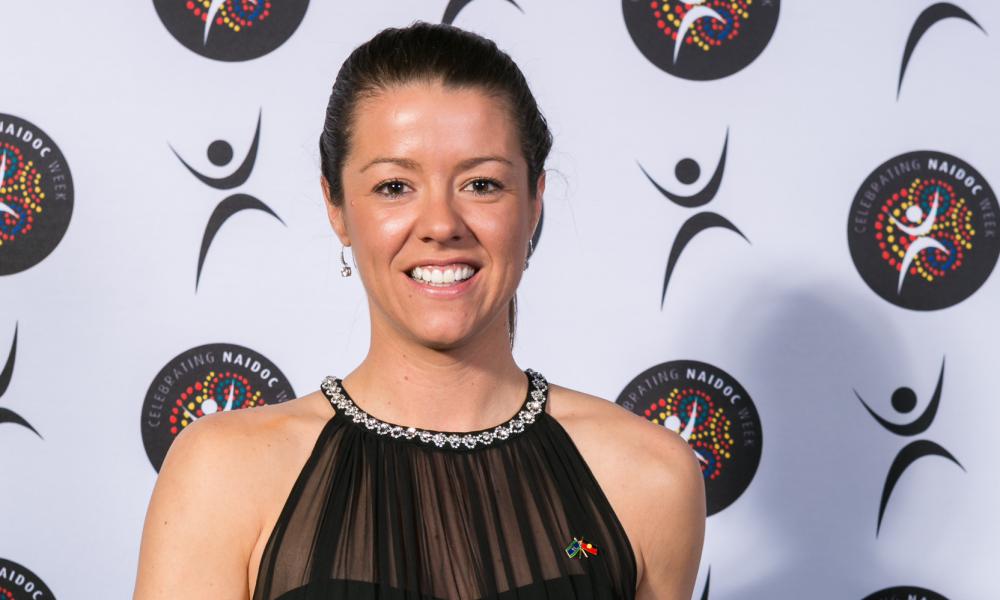
Kate Malpass
Kate Malpass, a Noongar girl from Perth, has been defying the odds since birth.
Being told she would never have full strength in one of her arms, she went on to play, and excel, in every sport at school.
At just 13 years of age, Kate was part of the under 16 National Championships for basketball. She has been part of two national championship basketball teams, including the Perth Lynxs team, which she captained to victory.
Off the court, Kate has completed a degree in physiotherapy and now lives in Melbourne, working as the first Aboriginal physiotherapist for the Richmond Football Club.
An outstanding role model, Kate also mentors for the David Wirrpanda Foundation and is passionate about helping younger girls through the Deadly Sista Girlz Program.
2012
Michael Clinch
Michael Clinch has shown commitment and dedication to achieve his dream of becoming a motor mechanic.
Growing up in Koonibba Aboriginal Community in South Australia, Michael was inspired by his grandfather who told him he could be anything he wanted to be if he put his mind to it and was committed. Michael watched his grandfathers and uncles fixing cars for the community with pride and passion, and from a young age, he knew he wanted to do the same.
Michael recently completed his apprenticeship as a motor mechanic with Repco in Adelaide. Bright and motivated, Michael rarely missed any days of his apprenticeship despite living more than 25 kilometres away and needing to rely on public transport to get there.
As well as completing his apprenticeship, Michael also cemented his position in the North Adelaide Football league.
Michael is a loving father and partner and an inspirational role model to the Koonibba Aboriginal Community.
2011
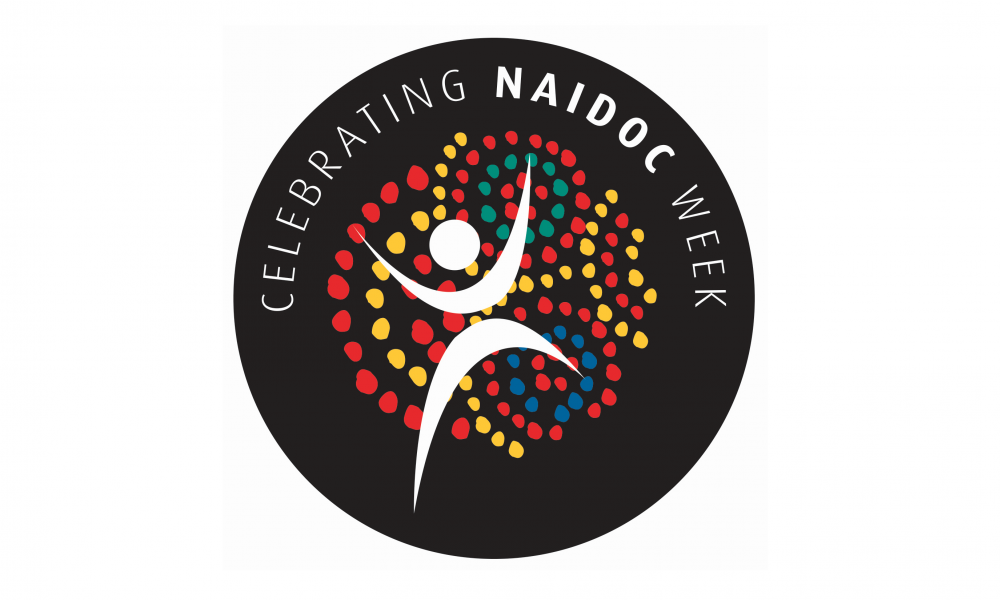
Joshua Toomey
Joshua Toomey overcame personal and educational challenges to excel as an apprentice in the electricity supply industry.
Despite being assessed as having low foundation skills, Joshua worked hard to show he had the determination and ability to succeed. When finally admitted to the Ausgrid pre-apprenticeship training program, he studied tirelessly to pass a selection test and was offered an apprenticeship almost immediately.
Joshua says, “Give yourself goals, seek out people who can help you get there and then work as hard as you can.”
Joshua was a key speaker at the annual TAFE New South Wales Gili Awards. His speech culminated in a standing ovation and was highly influential in securing the longer term future of the Ausgrid pre-apprenticeship program.
Since then, Joshua has been called on regularly as a public speaker and has been profiled in the New South Wales Department of Education and Training project Inspirational Indigenous Stories.
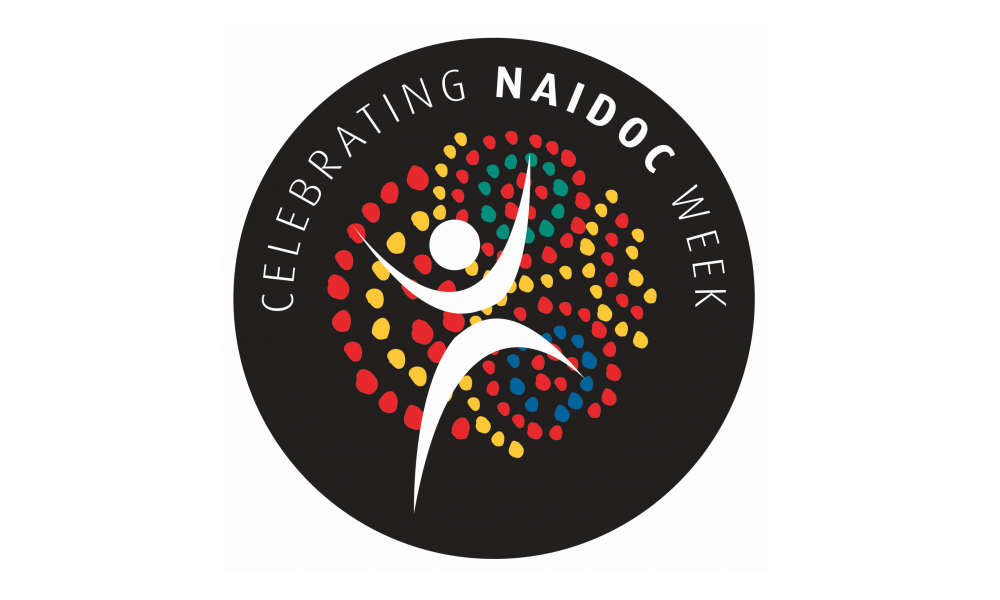
Robyn Djunginy
Robyn Djunginy is a proud Yolngu woman and a respected elder. As an acclaimed fibre artist and painter she has participated in significant exhibitions nationally and internationally for two decades.Robyn maintains an open mind in her search for new forms and symbols to express the ancient wisdom of her Yolngu culture through art.
Her inspiration for her renowned fibre bottle forms and paintings comes from Italian Chianti bottles. She says, “I was inspired by the shape…My bottles represent happy times and celebrations for black and white people the same.”
A board member of the Bula’Bula Arts Aboriginal Corporation, Robyn is currently working to develop a number of projects that will have significant impact on contemporary art in Australia and provide a platform for cultural exchange.
For Robyn, there is no division between her life and her art – they are one.
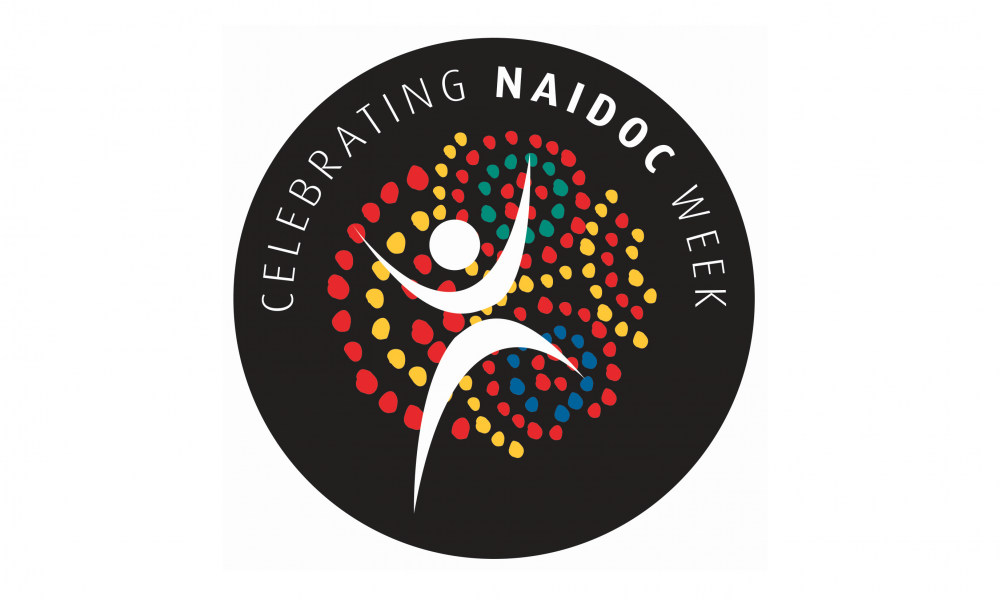
Warru Recovery Team
The Warru Recovery Team works towards the conservation of the black-footed rock wallaby, or warru – one of South Australia’s most endangered species.The team has built a 100 hectare enclosure to reintroduce captive warru to the wild and has successfully reintroduced five individuals bred in captivity. Regular monitoring shows that warru numbers have stabilised, while more recent data indicate some colonies are recovering.
The Warru Recovery Project also fosters positive social change in community. The team has at least two senior Anangu members for each relevant community who speak and make decisions for the project. In addition, many of the permanent and causal rangers employed in the project gain TAFE land management certificates and drivers licences.
A unique part of the project has been the development of a contemporary dreaming story told through the song and dance of warru mothers, who are sad their babies have left the APY lands.
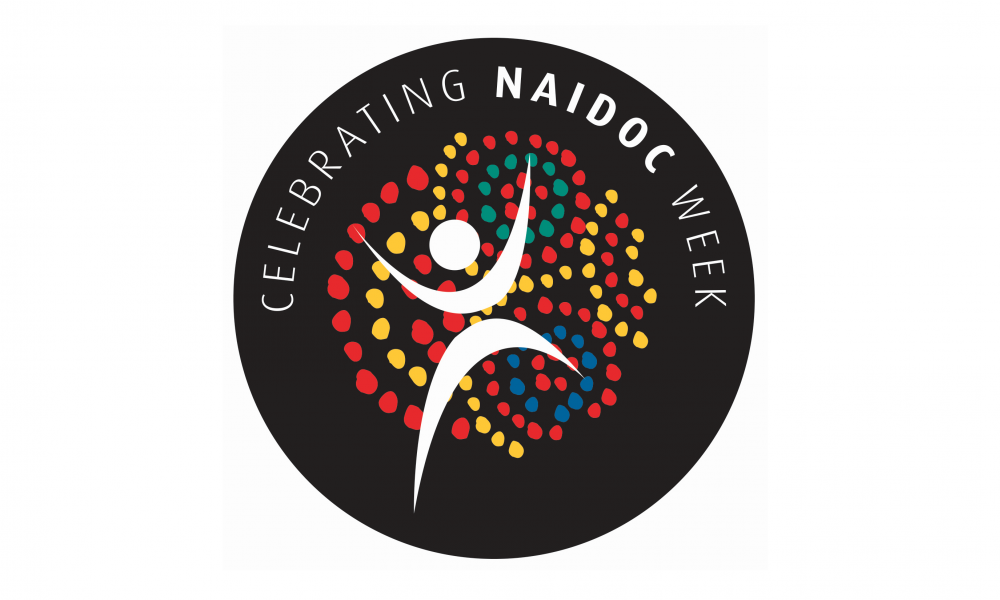
Carolyn Briggs
Aunty Carolyn Briggs is a Boonwurrung elder from Victoria who is recognised as a keeper of the history and genealogies of her people.
She says, “It’s about the strength of families, our heritage and the sense of belonging to place.”
Aunty Carolyn is currently studying language and linguistics in the hope of recording her Boonwurrung language in oral and written form.
She has been active in community development, Native Title, cultural preservation and cultural promotion. For many years she ran the Tjanabi restaurant in Melbourne, which specialised in contemporary Aboriginal cooking, promoted the Boonwurrung culture and became “the place to meet” for Indigenous people.
Aunty Carolyn established Australia’s first Aboriginal child care centre and is CEO of the Boonwurrung Foundation, which she set up to help connect Aboriginal youth to their heritage.
Aunty Carolyn is also a member of the National Congress of Australia’s First Peoples.
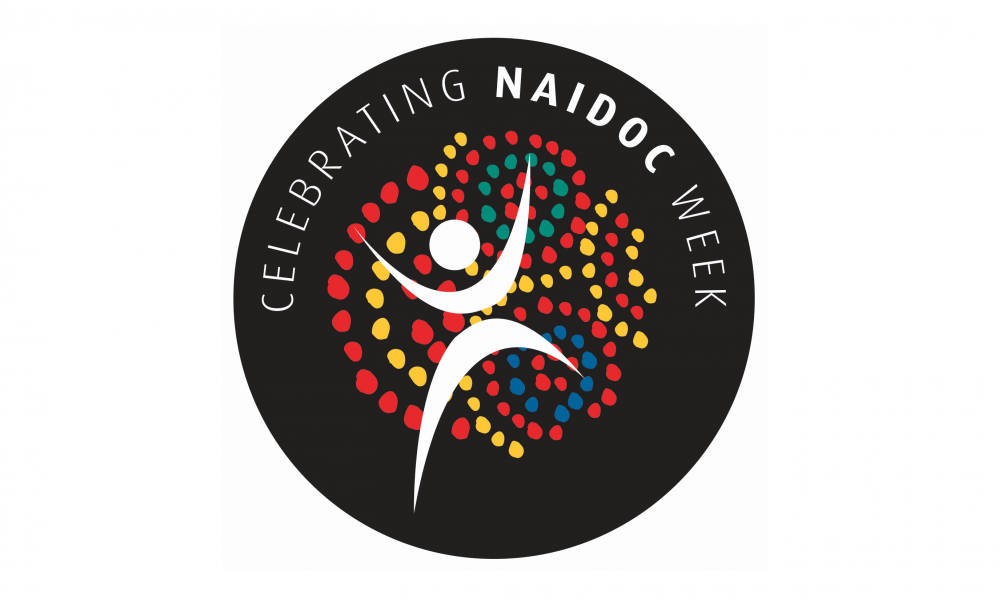
Ned Cheedy
Ned Cheedy is a respected elder and custodian of Yindjibarndi country, where he was born a century ago at Hooley Station in Western Australia.
At 104, Ned still contributes tirelessly to caring for Yindjibarndi law, country, culture, language and the future of his people.
After working as a skilled stockman and windmill man on the station, Ned moved to Roebourne Reserve so his children could receive an education. Concerned by the number of families losing young and older people to alcohol, he joined the Pilbara Aboriginal Church and travelled across Western Australia as a lay preacher, helping many to give up the grog.
Ned has been a cultural teacher and elder in his community for 20 years. When he travels into country with groups of up to 70 children, elders, families, anthropologists, archaeologists, biologists and environmentalists, he points out all the features of his land and tells the stories behind their creation.
Ned is generous and patient when sharing his knowledge. He participates in cultural mapping trips and teaches through books, films and recordings, sometimes working a six-hour day during the editing process to ensure accuracy.
Ned speaks out to keep his people strong and united.
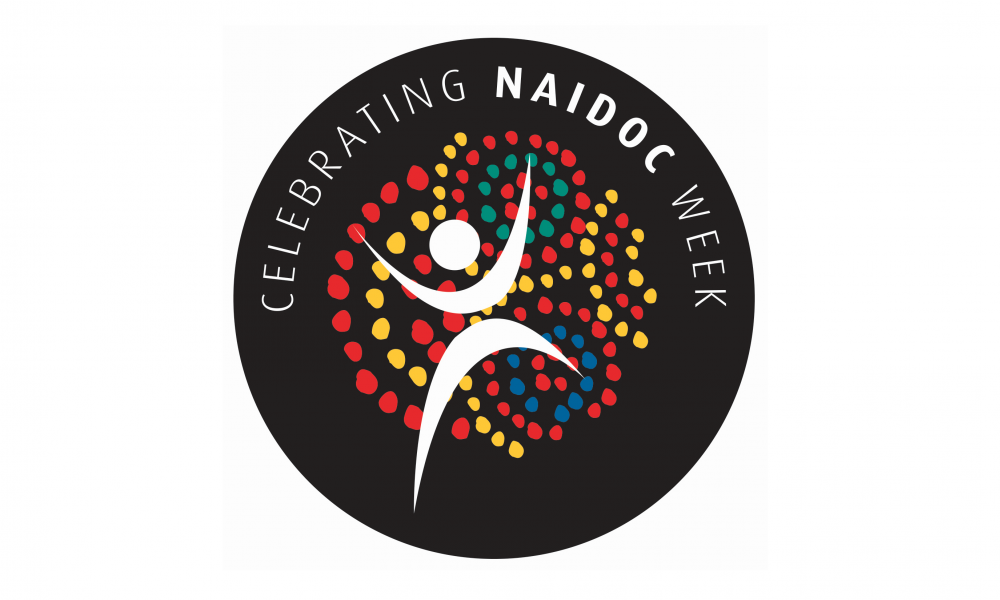
Eldridge Mosby
Eldridge Mosby is an elder on the Torres Strait Island of Poruma, where he is greatly respected for his commitment to education and the revival of language and culture.
Eldridge started teaching at just 15, when community teachers were in short supply on his island. He has been working with students ever since.
Eldridge is passionate about helping young people develop high expectations and a love of learning. His reassurance and encouragement give them the confidence to “have a go”. As a school coordinator for language and culture, he makes singing, dancing, games, story telling and music a big part of everyday island life.
A member of the Buthu Lagau Saral Torres Strait Islander Corporation, Eldridge works to maintain the traditions and language of Poruma Island. He is a tireless champion of his community and always stands ready to help where he can in matters that affect his people.
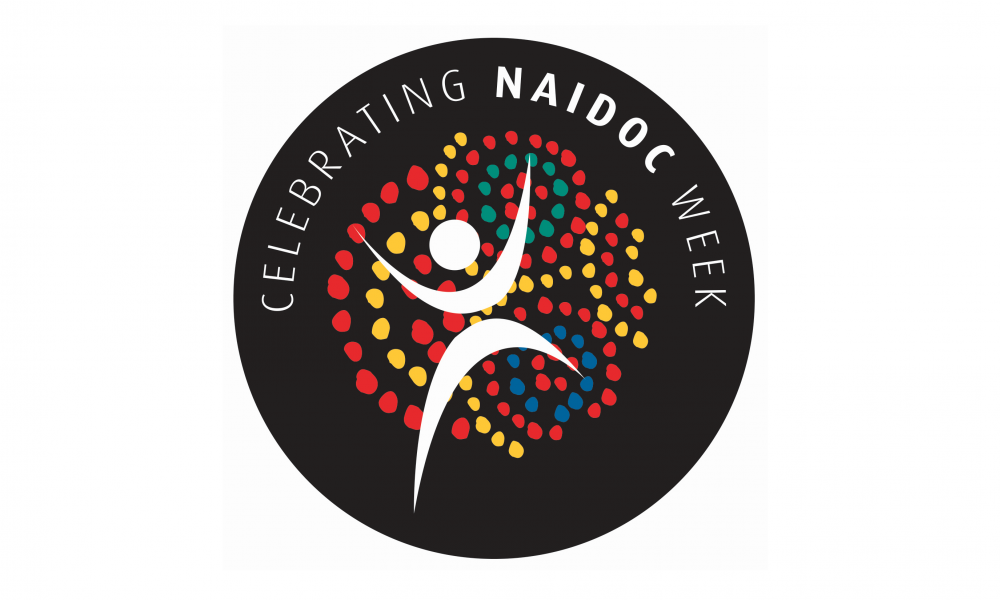
Terri Janke
Terri Janke was born in Cairns in Queensland, of Torres Strait Islander and Cape York Peninsula Aboriginal heritage.
A proud Meriam and Wuthathi woman, Terri is a vocal advocate of stronger intellectual property protection for Indigenous artists.
Admitted to practice in the Supreme Court of New South Wales and the High Court of Australia, she is widely regarded as one of the country’s top lawyers in Indigenous cultural and intellectual property rights.
Terri has served on the boards of many prominent Indigenous and non-Indigenous organisations and is the only Indigenous director on the Board of Tourism Australia.
In April 2008, Terri was invited by the Prime Minister to be a delegate at the Australia 2020 Summit.
As well as writing and speaking internationally about Indigenous cultural and intellectual property, Terri is an accomplished writer of fiction. Her first novel, Butterfly Song, was published in 2005 and she is currently working on a follow-up.
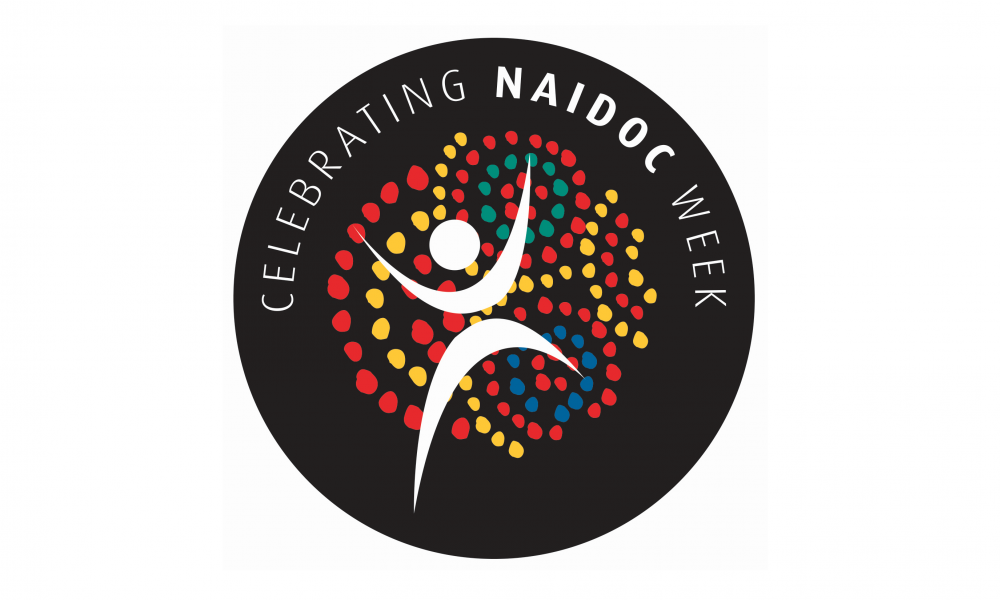
Professor Lester-Irabinna Rigney
Professor Lester-Irabinna Rigney is a Nurungga man who grew up on Point Pearce Mission on the Yorke Peninsula in South Australia. Today he is one of the most influential Indigenous educationalists in Australia.
Even as a young apprentice diesel mechanic, Professor Rigney demonstrated outstanding commitment, winning both the state and national NAIDOC Apprentice of the Year awards in 1985.
Later qualifying as a teacher, he began working in secondary schools in 1989. He has a Masters of Education and a PhD, and is currently Dean of Aboriginal Education and Director of the Wilto Yerlo Centre at the University of Adelaide.
Professor Rigney’s international reputation spans Indigenous education, languages and knowledge transmission. He sits on several high-profile ministerial expert panels and has been a visiting research fellow at Cambridge University in the UK and the University of British Columbia in Canada. In 2009 he received an honorary United Nations award for his work on Indigenous education.
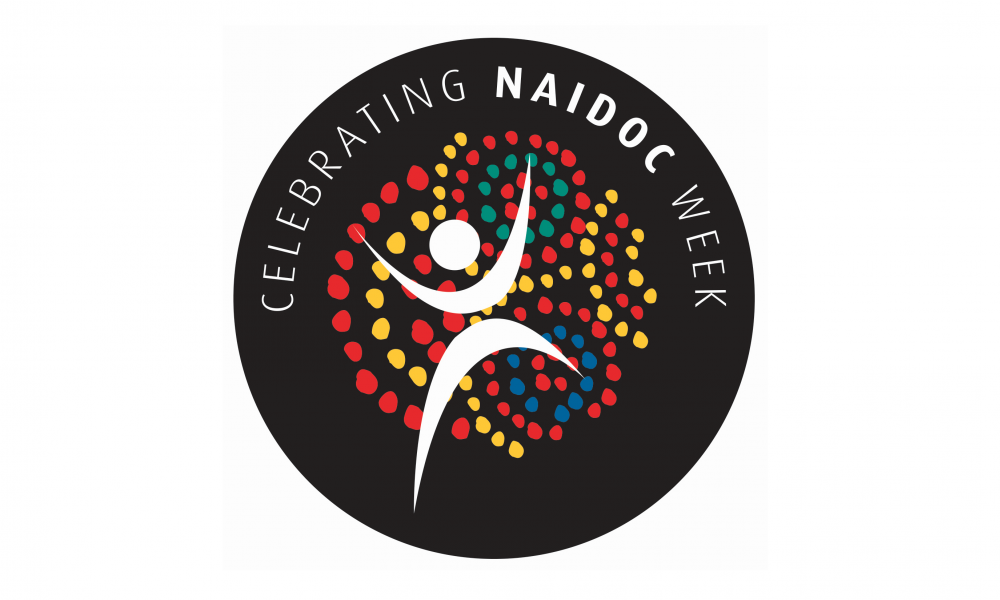
Preston Campbell
Preston Campbell hails from Tinga in New South Wales and is a loved and respected National Rugby League player for the Gold Coast Titans.
Preston’s career highlights include winning the 2003 grand final and leading the Indigenous Dreamtime Team to victory against the New Zealand Maoris in 2008.
In 2010, Preston was the driving force behind a new Indigenous All Stars game. This annual event builds cultural connections across communities and is an important part of the healing process.
Preston says working together to create a better future is what the game is all about.
As an ambassador for the Titians’ Beyond Tomorrow program, Preston encourages year 12 students to make the transition to further education or employment.
Although his career has taken him a long way from Tinga, Preston has never forgotten his home town. He is currently working to make a difference there by helping to develop a community centre.
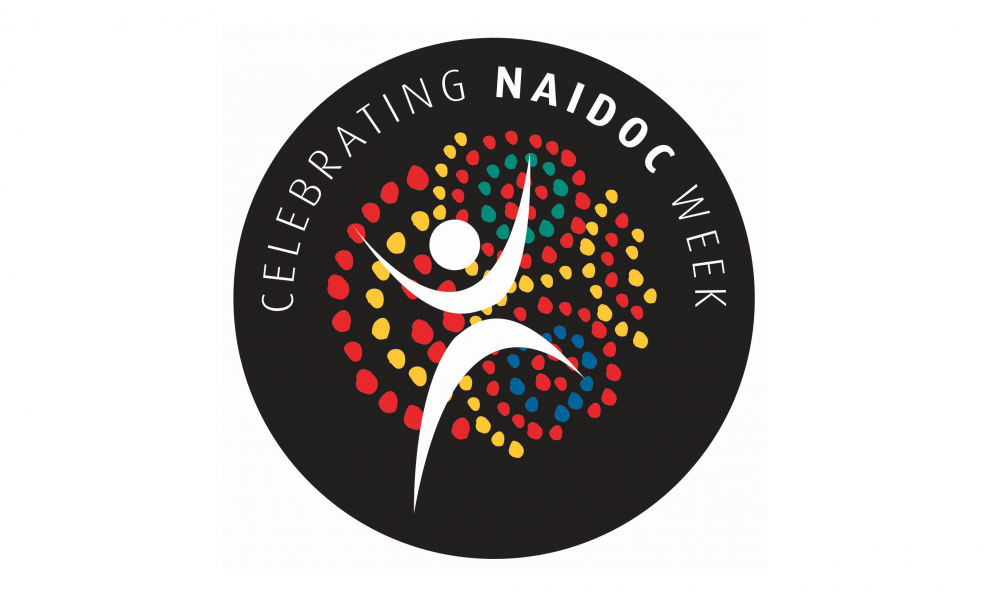
Kiel Williams-Weigel
Twenty-four-year-old Kiel Williams-Weigel was born and raised inBrisbane and is a proud descendant of the Mununjali people of the Beaudesert region.
After immersing himself in Aboriginal and Torres Strait Islander culture, Kiel developed a strong desire for a better life for Indigenous people in contemporary Australia.
He was the first in his family to attend university, graduating with a Bachelor of Education from Griffith University. He is now a literacy coordinator at Clontarf Aboriginal College in Western Australia and a lecturer at the University of Notre Dame, where he helps other teachers understand the needs of Indigenous school students.
Kiel is keen to undertake further study and hopes one day to be a principal in an Indigenous school.
Through his dedication, passion and love for his people, Kiel has influenced many young lives. He is a role model for Indigenous students and an inspiration for other young educators.
2010
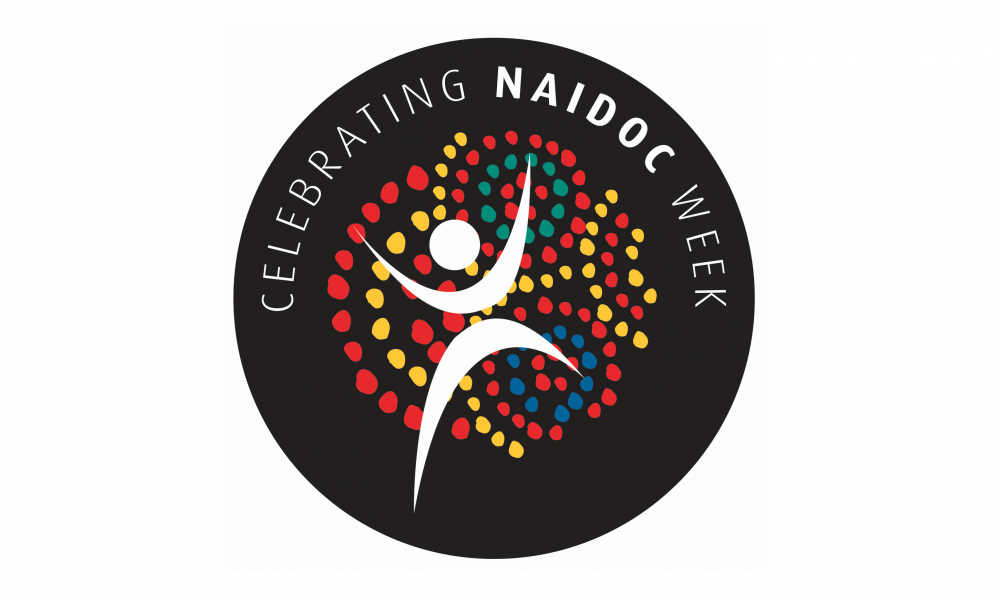
Lucas Kickett
Lucas Kickett, from Narrogin in Western Australia, is an apprentice in Heavy Metal Fabrication at Polytechnic West and works for McDougall Weldments.
Lucas was the first Aboriginal person to take out Polytechnic West’s mainstream award for Apprentice of the Year, going on to receive the 2009 Geoff Gale Award for Student of the Year.
As a basketball coach in his spare time, Lucas tells teenagers to “get a certificate, get some dollars and get respect”. His words echo those of his own late mother, who was his inspiration. She said, “Work hard to achieve your goals.”
If Lucas Kickett’s mum were here today, she would be proud to see the fine example he has set for all Indigenous school kids and apprentices.
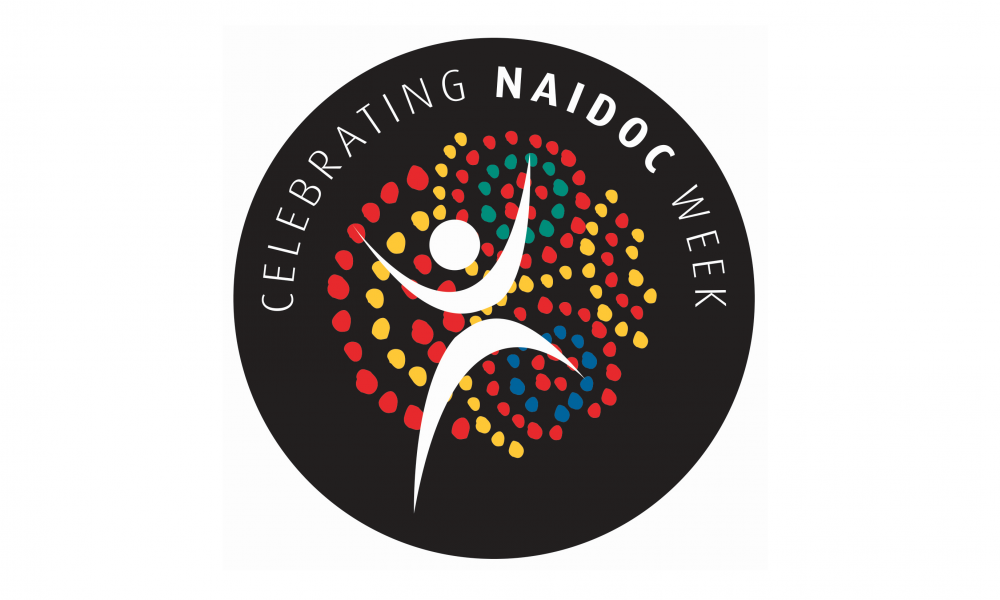
Lewis Langton
Lewis Langton is a visual and performing artist and teacher who lives and works in Canberra.
A Murri artist from Queensland, Lewis describes himself as being a Guugu-Yimidhirr man from Cherbourg Mission in Queensland. Lewis began painting at six, despite being blind in one eye. His murals can be seen throughout Queensland and the ACT.
Lewis is also an award-winning didgeridoo player and inspiring teacher of Aboriginal dance. He is a role model for his students at Weetangera Primary School, who have formed their own Indigenous dance group. He has showcased traditional Aboriginal dance all over the world and has taken young Indigenous dancers to Samoa, the United States, South Korea, Vietnam and Taiwan.
As a multi-talented artist who nurtures and promotes Indigenous culture at home and abroad, Lewis Langton is a true cultural ambassador.
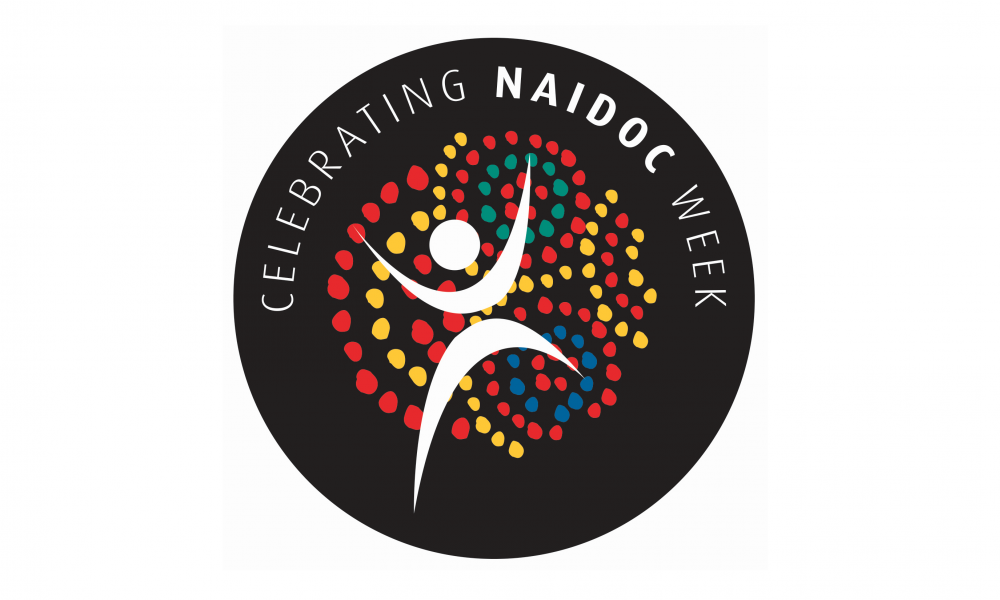
Crazy Ant Management Program
The Crazy Ant Management Program, run by Dhimurru Aboriginal Corporation, works to eradicate yellow crazy ants in the NT.
The yellow crazy ant is listed among the top 100 invasive species in the world. It has reduced the abundance of ant species and other invertebrates in north east Arnhem Land.
Within five years, this program has achieved twice as many eradications as any ant eradication published globally in the past 100 years, over an area five times the size. The ecology of many of the eradication sites has recovered fully within 12 months.
The Crazy Ant Management Program – established, owned and operated by local community – is unprecedented within Australia and recognised globally as the new benchmark for invasive ant management.
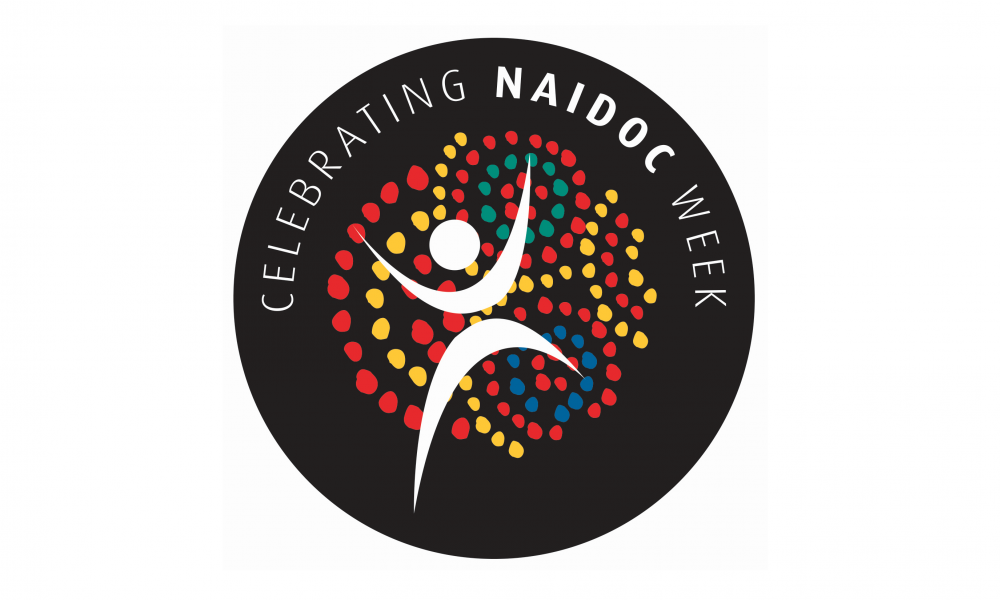
Ali Golding
Auntie Ali Golding is a grassroots Indigenous leader recognised as a valued elder who demonstrates compassion, humility and justice.
A proud Bripi woman, Ali grew up on the Taree Mission in New South Wales.
In the 1980s she became one of the first Aboriginal education assistants at Cleveland High School in Queensland, and in 2004 she graduated from Nungaliya College in Darwin with a Diploma of Theology.
Ali has made important contributions to many national and international forums, including the World Spirit Healing Conference in Canada, International Women’s Day events in parliament, the Women’s Reconciliation Network, the New South Wales Reconciliation Council and AnTAR.
Ali has convened with many dignitaries including Nelson Mandela, Queen Elizabeth the second and Gough Whitlam, just to name a few.
In all that she shares so generously, Auntie Ali Golding reminds us how to stay connected and strong.
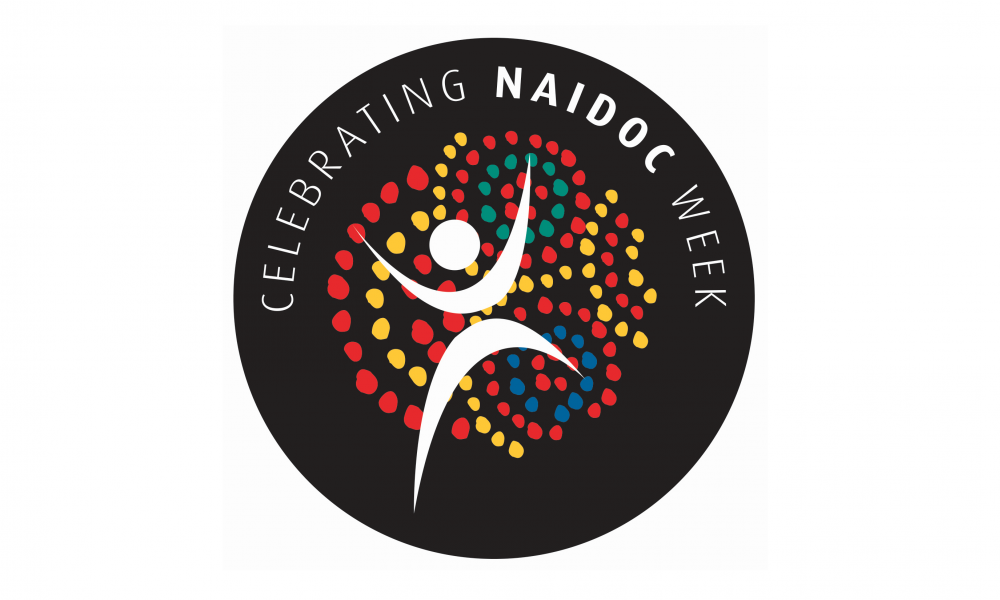
Vince Coulthard
Vince Coulthard has been the Director of South Australia’s only Aboriginal Radio Station, the Umeewarra Aboriginal Media Association, for 16 years and is Director of the National Indigenous Radio Service.
Vince is an Adnyamathanha man who was born in Leigh Creek and grew up on the Nepabunna Mission.
Part of the first South Australian native title claim, Vince has been Vice Chair of the Adnyamathanha Traditional Lands Council for 13 years. In 2009, led by Vince, the Adnyamathanha people won a consent determination over the largest native title claim in the state.
Vince was one of the first Aboriginal rangers employed by National Parks in South Australia and helped bring about the first Indigenous land usage agreement over a national park in South Australia.
He has facilitated many significant cultural events and is founder and director of the Iga Warta community, whose members explain the Dreaming and walk their country with visitors.
Instrumental in setting up the Nunga Court in Port Augusta, Vince continues to contribute as a mediator, elder and cultural mentor.
Vince has received three local NAIDOC awards, a Premier’s Australia Day Award and the Federation Medal.
A tireless champion of Indigenous voices, land rights and justice, Vince Coulthard empowers others to fulfil their dreams and make a difference.
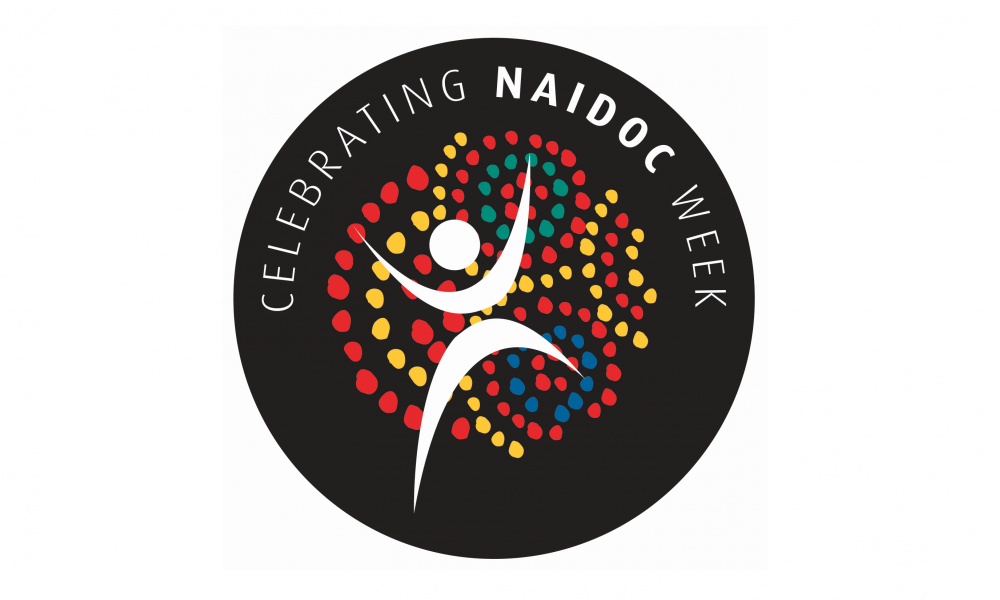
Lester Bostock
Uncle Lester Bostock has overcome personal challenges with dignity to represent the interests of Indigenous people regionally, nationally and internationally.
A Bundjalung man from Box River Reserve in New South Wales, Lester was unable to read or write when he left school at just 13. Undeterred, he returned to education as an adult and became a teacher.
Lester is regarded as a pioneer of Indigenous media in Australia. He helped to set up Radio Redfern, was involved in creating the first Indigenous theatre group, and was the first Aboriginal presenter on SBS Radio.
Suffering from an accident in the 1950s and needing to have his leg amputated, Lester has worked to raise awareness of the unmet needs of Aboriginal people with disabilities.
He has played important roles in many Indigenous disability and community organisations and was part of the 1967 referendum campaign and the Aboriginal Tent Embassy.
An unsung hero, Lester Bostock has made an extraordinary contribution to Aboriginal services in Australia.
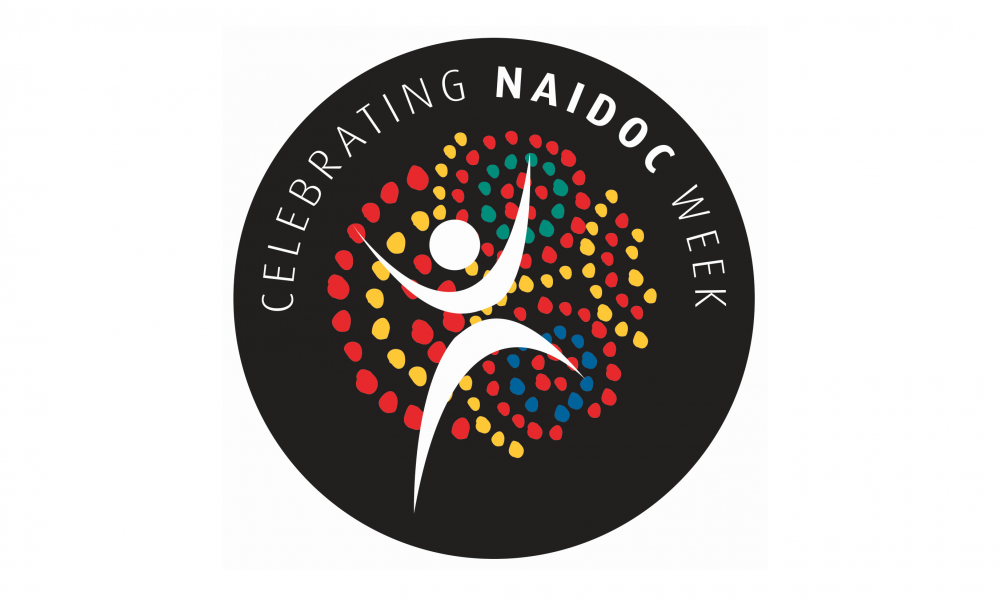
Ali Drummond
Ali Drummond is a much-loved and respected elder in the Torres Strait region and Brisbane. His story is told in the book Life Blong Ali Drummond: A Life in the Torres Strait, published in 2007.
His mother is from the Yadhaigana and Wuthuthi peoples, Cape York Peninsula, Australia and his father from Sarawak, Malaysia.
In World War Two, Ali served in the Civilian Construction Corporation in the Torres Strait, earning a Civilian Service Medal for his contribution.
As a pearl diver, he gained an intimate knowledge of the Torres Strait marine environment, and his advice is often sought by the CSIRO.
In 1998 he was named the National NAIDOC Sportsperson of the Year for his contribution to lawn bowls, and a year later he became Senior Australian Achiever of the Year.
At 92, Ali Drummond is an outstanding role model for healthy ageing and lifetime community service.
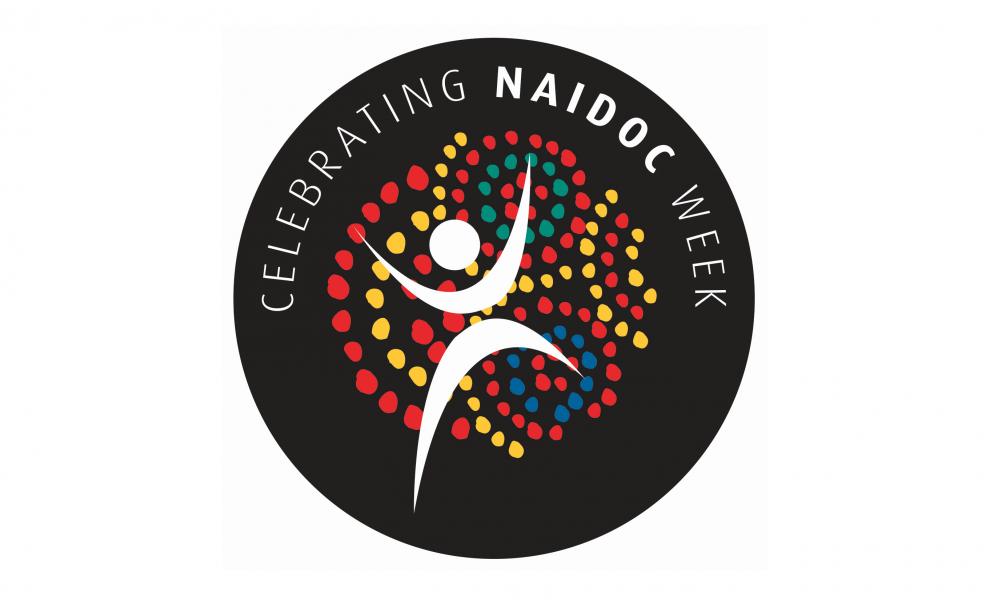
Dennis Eggington
Dennis Eggington has been the Chief Executive Officer of the Aboriginal Legal Service of Western Australia for 14 years.
A Nyungar man, Dennis gained a national perspective on the racism suffered by Indigenous Australians through his work as a teacher in South Australia, the Northern Territory and Western Australia.
In 2007, he was awarded the John Curtin Medal by Curtin University, graduating in 2009 with a Master of Human Rights Education.
Dennis has addressed the United Nations Working Group for the Declaration on the Rights of Indigenous Peoples and recently attended the United Nations Permanent Forum on Indigenous Issues, in New York.
Following the New York forum he said, “The world is watching and we all need to recognise that great nations can only be founded upon recognition, reparation and respect.”
Energised and motivated by his commitment to his people, Dennis Eggington plays a vital role in creating a just Australia for all Indigenous communities and individuals.
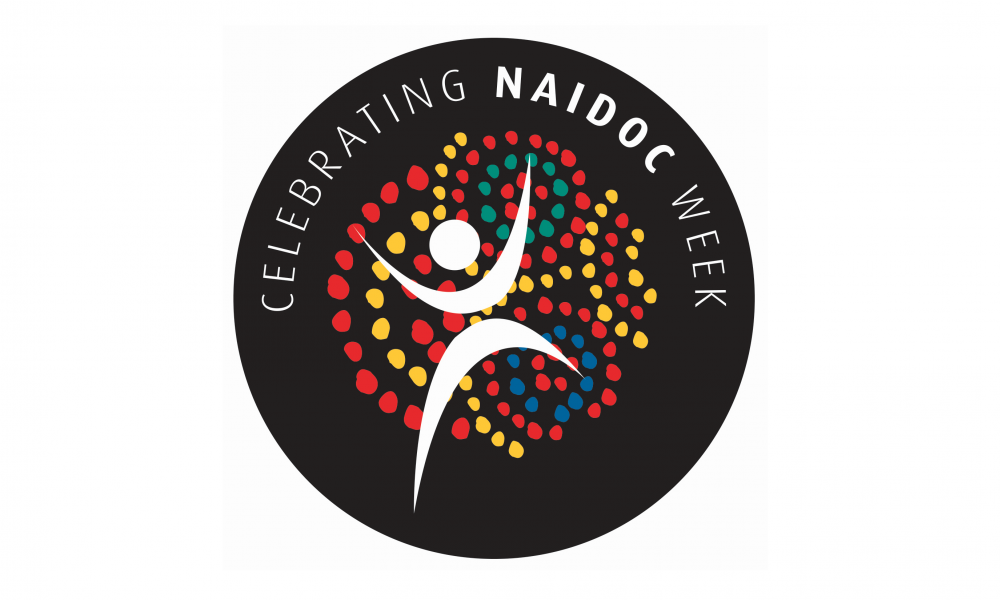
Megan Davis
Megan Davis is Director of the Indigenous Law Centre at the University of New South Wales and is the first aboriginal women to be appointed to a permanent United Nations Forum.
Her traditional country is Warra in Southern Queensland belonging to the Barragum language people.
Among her many achievements, she participated in drafting the United Nations Declaration on the Rights of Indigenous Peoples and is the first Aboriginal woman to be appointed to a permanent United Nations forum. Megan has recently Megan became and independent expert on the United Nations Permanent Forum on Indigenous Issues.
Megan is a leading scholar on Indigenous legal rights and heads a team at the University of New South Wales conducting groundbreaking research into violence against women and children.
As a scholar, lawyer and human rights advocate, Megan Davis is a powerful force in bringing Australian Indigenous issues to the forefront on a national and international stage.
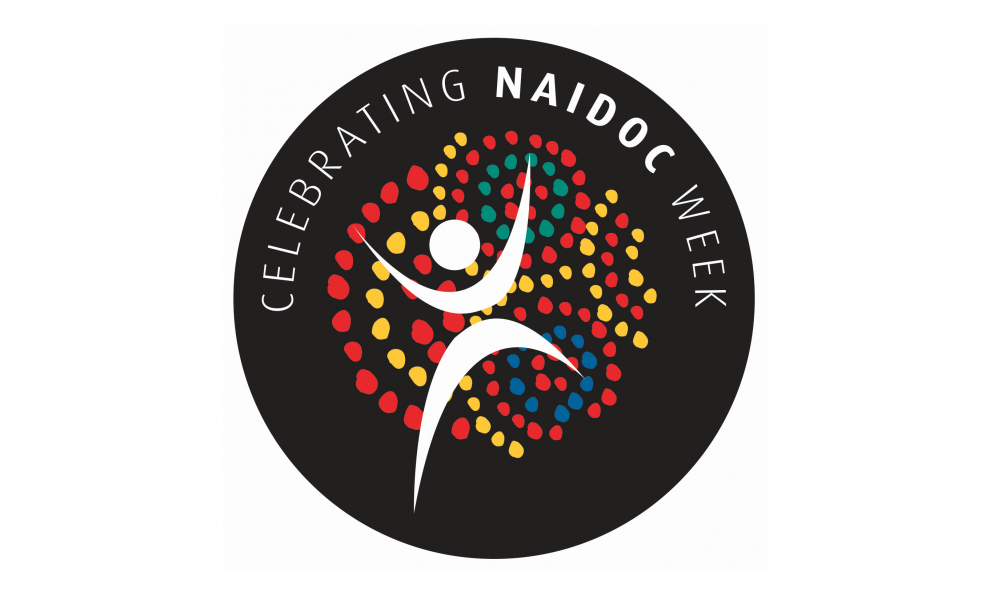
Rohanee Cox
Olympic champion Rohanee Cox is captain of the WNBL team the Townsville Fire.
Rohanee is a Nyulnyul girl who grew up in Broome, Western Australia.
She won a scholarship to the AIS where she where she excelled as one of Australia’s newest talents. Missing her family, Rohanee left the AIS after two years and returned home.
Inspired by the birth of her child Alyriah and watching Cathy Freeman win gold at the 2000 Sydney Olympics, Rohanee decided to pursue her career in basketball once again.
The first Indigenous women to represent Australia at the Olympics at Basketball, Rohanee competed with the Australian Opals in the 2008 Beijing Olympics.
Since Beijing, Rohanee has continued to represent her country. She has won a host of prestigious sporting awards, is an advocate for the “Go for 2&5″ fruit and veg campaign, and is an ambassador for Basketball Australia’s Indigenous talent identification.
As a mother, an Aboriginal woman and an elite sportsperson, Rohanee Cox is a true champion of Indigenous pride.
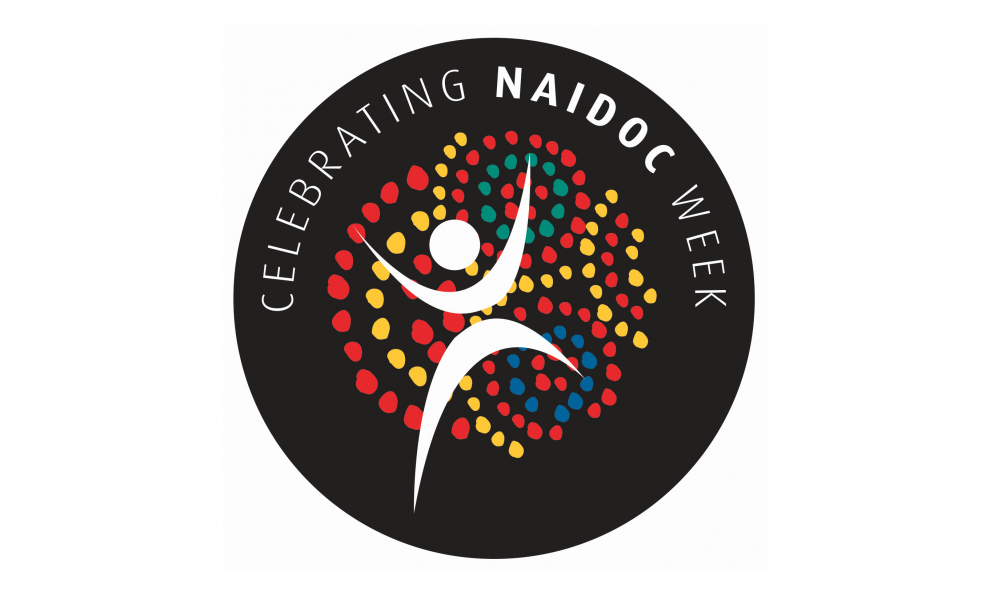
Jessica Smith
Queensland Aboriginal woman Jessica Smith is an Indigenous Support Officer at Lourdes Hill College, where she ensures Indigenous girls are supported in their education, home lives and culture.
As a student herself, Jessica showed outstanding dedication by graduating from Nambour Christian College with top marks while expecting a baby.
Jessica went on to balance work, family and study to complete a Bachelor of Education with first class honours and a Bachelor of Creative Industries with distinction. During this time she also tutored refugee students as a volunteer mentor. Today she is studying for a PhD in Visual Arts.
At 24, Jessica Smith is already a leader, not only to her students, but to her colleagues and the wider Indigenous community.
2009
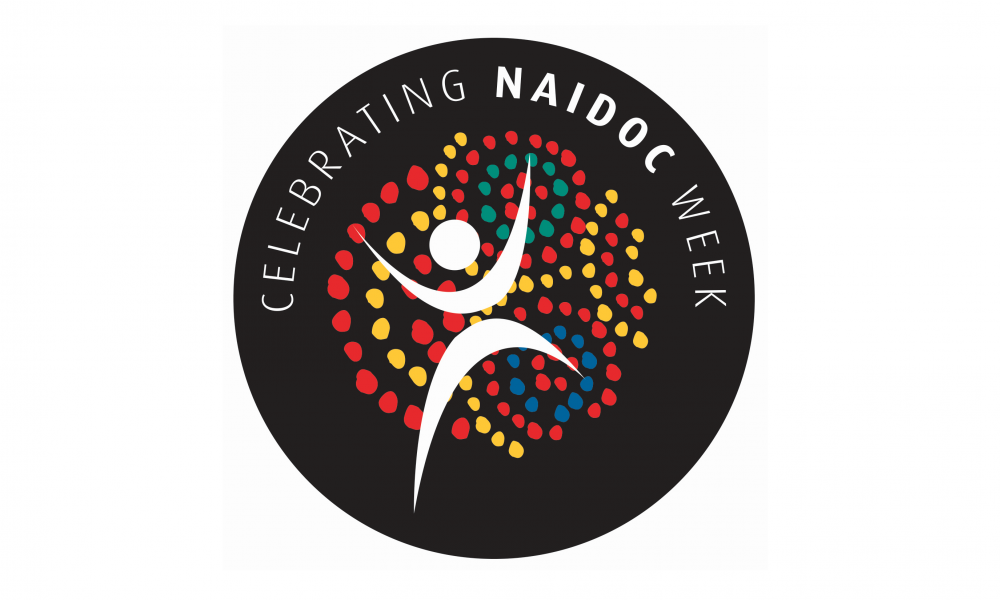
Danny Sebasio
Danny Sebasio started with Ergon Energy as an unskilled Power Station Attendant at Hammond Island. After doing relief work on Thursday Island, Danny realised how much he enjoyed working with the tradesmen and that, with the right training, it was something he could also do.
Danny recently completed his apprenticeship with Ergon Energy. He has received a certificate three in Mechanical Engineering as well as multiple certificates for various crucial OH&S training components.
To complete his apprenticeship, Danny travelled from Hammond Island to Thursday Island by dingy five days a week, spending time away from his family during extended training periods.
Further to his apprenticeship, Danny undertook training to become one of six Indigenous mentors across the state working with Ergon Energy.
Danny wants to contribute personally and professionally to the achievement of upcoming apprentices. He is involved in the Careers Market at Tagai State College and contributed to Ergon Energy’s recruitment strategy of Indigenous apprentices and trainees.
Danny is passionate about the effects of power generation on the environment and communities and was drawn to Ergon Energy to make a difference. He is always pushing for the design and use of new, alternative energy sources to create a greener future for all.
Since completing his apprenticeship, Danny has become a fulltime tradesperson on Thursday Island, contributing to the supply of energy to over 8,000 people in the Torres Strait. Danny wants to continue his work in the Strait, offering continuity of service and making a difference.
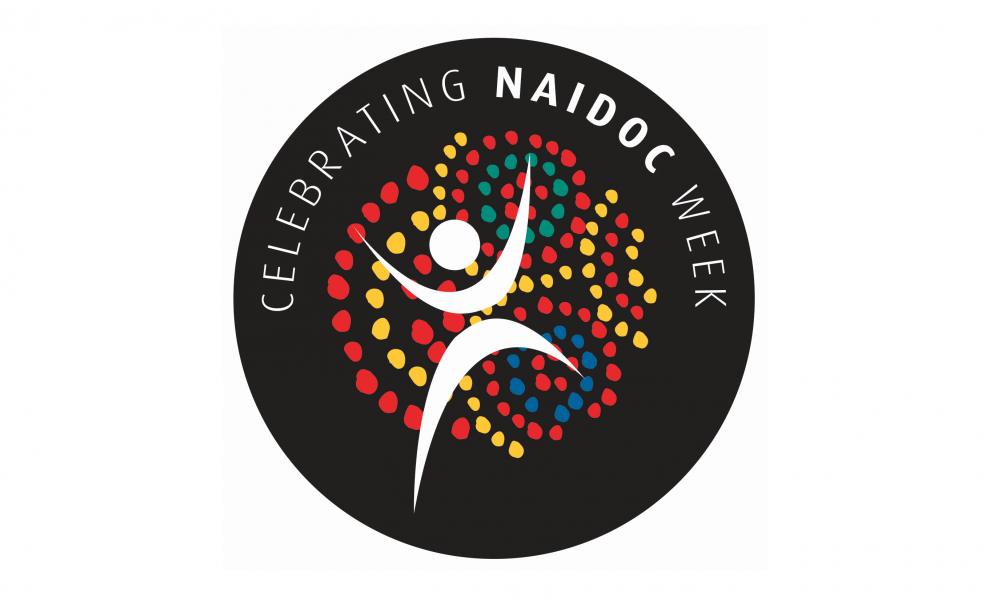
Wayne Quilliam
Wayne Quilliam has been working on the Australian and international scene for more than 15 years, establishing a reputation as one of Australia’s leading photographers.
Wayne is a prolific artist. He has been published in more than 500 publications and has had exhibitions in Europe, USA, Asia, South America and Australia.
In 2008, Wayne was selected as the official photographer to record the Prime Minister’s Motion of Apology to the Stolen Generations. In 2009 Wayne used these images to develop the Sorry…more than a word exhibition, which was opened by the Prime Minister.
His European tour featured 80 images of Indigenous celebrations which are now included in permanent collections throughout Europe and in public displays.
Wayne’s international show, Lowanna, was first opened in Mexico by the Australian Ambassador and is now included in the permanent Australian Embassy Collection. Two alternative series of Lowanna took him again to Europe.
Wayne has also worked with high-profile celebrities, including a photo shoot with actor Russell Crowe and serving as the art ambassador for a tour of Australian rock bands Silverchair and Powderfinger.
Earlier this year, Wayne was a key speaker at the International Photographic Festival in Melbourne, making him the first Indigenous artist to do so.
Currently based in Melbourne, Wayne has spent more than 20 years working with more than 50 different communities throughout Australia, conducting talks and photography workshops in rural, remote and urban areas.
Wayne’s goal is to create opportunities for youth to showcase their talent and culture within Indigenous and mainstream areas.
Taking every experience in his Stride, Wayne follows his own life motto that there isn’t a day that goes by when you haven’t learnt something.
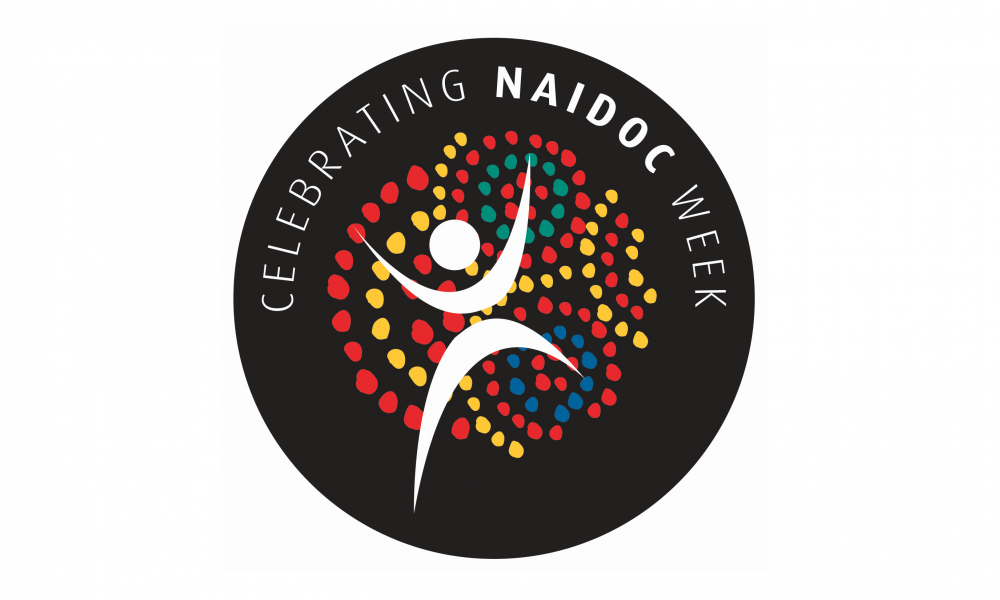
Doris Eaton
Doris Eaton is an Elder and respected law woman of the Nyamal people of the north Pilbara region in Western Australia.
Doris is an active mentor to young people in the community and her own 23 grandchildren, including Brandon Walters who recently starred in the film Australia.
Doris draws her strength from her culture and her family, demonstrating an inspirational capacity for forgiveness, tolerance and persistence.
As a leader in the Pilbara, Doris is an active force in improving her community.
She is the Chairperson of the Pilbara Native Title Service and is the first woman to be elected as co-chairperson of the Yamatji Marla Aboriginal Corporation’s board of directors.
A passionate advocate for women, Doris is also the Chairperson of the Pilbara Indigenous Women’s Aboriginal Corporation, regularly consulted by government, private and industry sectors on a wide range of issues.
Doris has been involved in the Strong Families, Strong Culture health program that promotes traditional cultural approaches to parenting and lifestyle. She was also involved in the development of an antenatal hostel for young Indigenous mothers in remote areas – the first of its kind in Western Australia.
Doris is keen for all her grandchildren to undertake Indigenous education as well as completing their school studies. Doris hopes to pass on her cultural knowledge and leadership skills, actively mentoring the next generation to take up positions of responsibility within the community.
Doris combines mainstream education and cultural pride to forge strong identities in those around her. She representing those “grassroots people” who would otherwise be unrepresented in public forums.
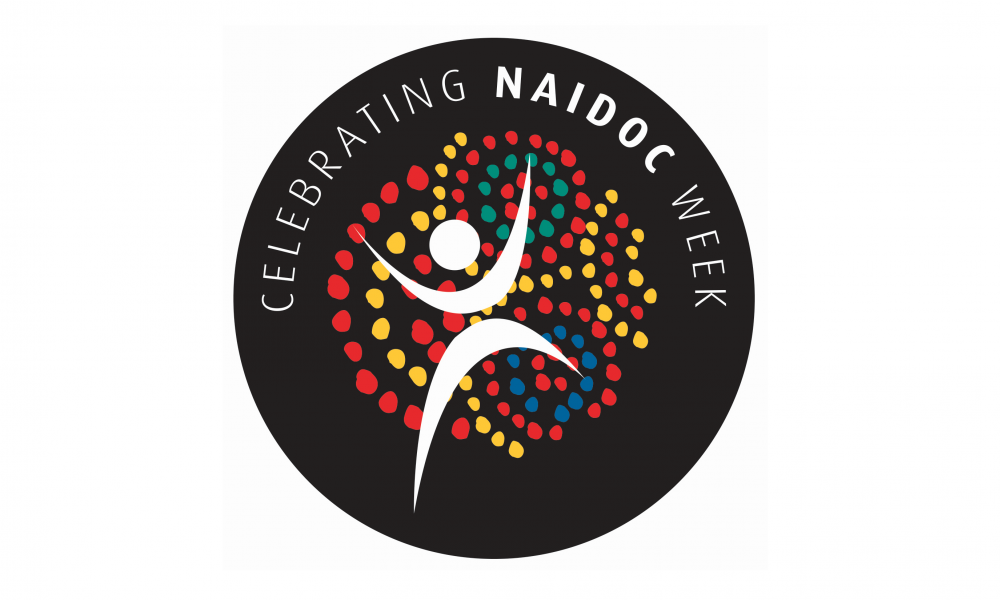
Elsie Heiss
Elsie Heiss, or Aunty Elsie, is a mother of five and grandmother of six living in Sydney. While Aunty Elsie would not define herself as a leader, many follow the wisdom and direction she offers.
Aunty Elsie has worked as a coordinator of the Aboriginal Catholic Church Ministries for the past 20 years. She has built bridges between Aboriginal and non-Aboriginal communities through hundreds of speeches on such topics as Aboriginal spirituality, the Stolen Generations, Reconciliation and justice.
Aunty Elsie’s status in community has been recognised locally and internationally. In 1995, she participated in the official smoking ceremony for Pope John Paul the Second; and in 1998, Aunty Elsie was the only Aboriginal representative at the Synod of Oceania in Rome.
As Chair of the National Aboriginal and Torres Strait Islander Catholic Council, Aunty Elsie played a major role in representing the Aboriginal community during World Youth Day in 2008. She welcomed Pope Benedict the sixteenth and introduced an Indigenous message stick that accompanied the cross on a journey around the country.
Aunty Elsie’s passion is educating the wider Australian community in understanding Aboriginal people, culture and history. Her knowledge and experience has seen her appointed to many boards and committees including the National Aboriginal and Torres Strait Ecumenical council of NSW and Catholic Earth care Australia.
Aunty Elsie’s goal is to mentor a younger person into her high profile positions, particularly her role with the Aboriginal Catholic Church Ministries. Having said this, she has no intention of stopping.
In the future, Aunty Elsie aims to work more with non-Catholic organisations, giving her the chance to bring Indigenous issues to the table to a wider audience and enlighten those she works with along the way.
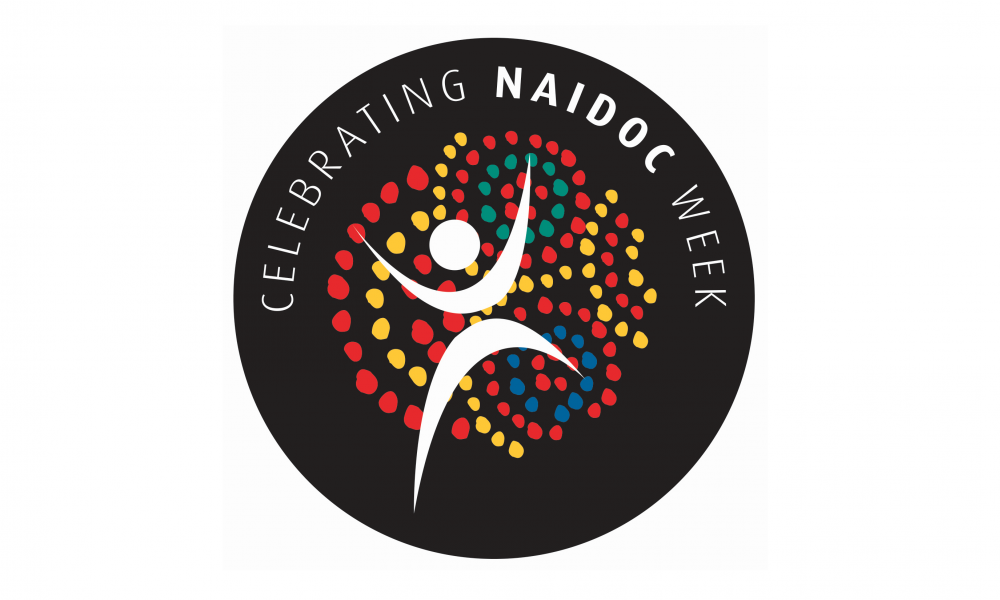
Lowitja O'Donoghue
Born in Indulkana in 1932, Lowitja O’Donoghue was separated from her family at a young age and put in the care of missionaries at Colebrook Children’s home at Quorn.
Lowitja’s career, which spans almost 60 years, began as a nurse at the Royal Adelaide Hospital where, despite the racial discrimination at the time, she reached the position of Charge Sister.
After going to work with the Mother Teresa program in India in 1961, Lowitja returned to Australia to work as a trained nurse and welfare officer in remote Aboriginal communities. It was during her 10 years in this work that she built a reputation for her ability to advocate for justice for Indigenous people. This ability shone through in her campaigning on the 1967 Referendum, a turning point in the relationship between Indigenous and non-Indigenous Australians.
In 1972 Lowitja accepted a position as Senior Liaison Officer for the newly-created Department of Aboriginal Affairs. She saw this as a great opportunity to use her skills, passion and commitment to advance the rights of Indigenous people.
Breaking new ground for Indigenous women at the national level, Lowitja became the fulltime chairperson of the National Aboriginal Conference in 1976. Lowitja continued to take on senior leadership roles and positions among prominent agencies in Aboriginal affairs, including Aboriginals Hostels and the Aboriginal Development Commission.
In 1990 Lowitja was appointed the inaugural chairperson of the Aboriginal and Torres Strait Islander Commission. During her six years as Chairperson of ATSIC, Lowitja won universal admiration for her leadership, tenacity and integrity. A highlight was her pivotal role in the tense and complex negotiations which enabled the creation and passing of Prime Minister Keating’s native title legislation.
In 2000, Lowitja played a key advisory role in the lead up to the Sydney Olympic Games as Chairperson of the Sydney Olympic Games National Indigenous Advisory Committee and a member of the Sydney Olympic Games Volunteers Committee. Lowitja also carried the torch through Uluru during the Australian leg of the relay.
Lowitja’s skills, knowledge and experience continue to be highly sought after by the highest levels of government.
In 2008, Prime Minister Rudd sought Lowitja’s counsel in preparation for the historic Apology to the Stolen Generations.
Lowitja’s many successes and work on behalf of her people have been justly recognised by the large number of awards and honours she has received in her career.
To mention just a few: she was appointed a member of the Order of Australia in 1977, won the Advance Australia award in 1982, was named Australian of the Year in 1984 and became a National Living Treasure in 1998.
These awards acknowledge Lowitja’s distinguished leadership in Indigenous affairs, as well as her extraordinary ability to overcome adversity and to break down the barriers.
History will judge Lowitja as one of the great and sustaining forces for the rights of Aboriginal and Torres Strait Islander people.
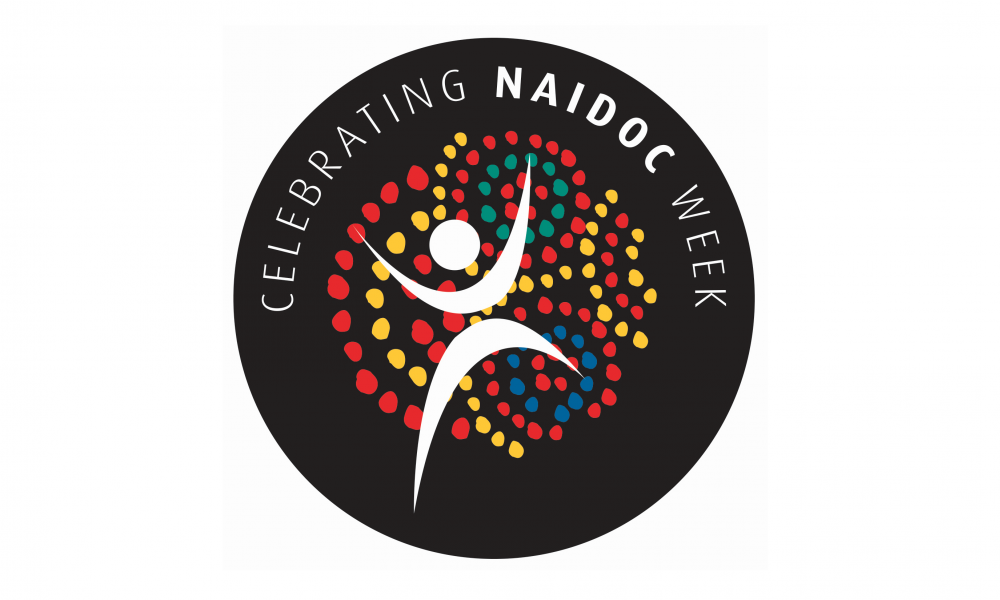
Frank Lampard
A prominent Elder in the Aboriginal community, Frank H Lampard has made a substantial contribution at the state and local level in South Australia.
Frank is the current chairperson of the Aboriginal Legal Rights Movement (ALRM) and Executive Director of the Aboriginal Prisoners and Offenders Support Services Incorporated (APOSS).
Frank sees education as paramount in addressing the various social disadvantages of Indigenous people. He has been on the University of South Australia’s council for nearly 10 years. He is passionate about retaining Aboriginal languages in schools and has pursued rights of students in the tertiary sector as well as those wishing to engage in their culture, language and dance.
Frank has been Chair to the South Australian Aboriginal Training Advisory Committee and Deputy Chair of the National Aboriginal Education Consultative Committee.
Frank was a senior public servant, at one point the Acting Chief Executive, of the Department of Aboriginal Affairs in South Australia.
Frank is passionate about heritage and native title issues. This is demonstrated by his positions of Chair of the South Australia Aboriginal Heritage Committee and as the Native Title Commissioner for the state.
He is a strong advocate for early intervention programs and the reduction of violence against women and children.
At the local level, Frank has dedicated countless hours to Australian football in schools and communities.
Frank is determined for his community to fully recognise the way forward with governments and is there to support this is any way he can.
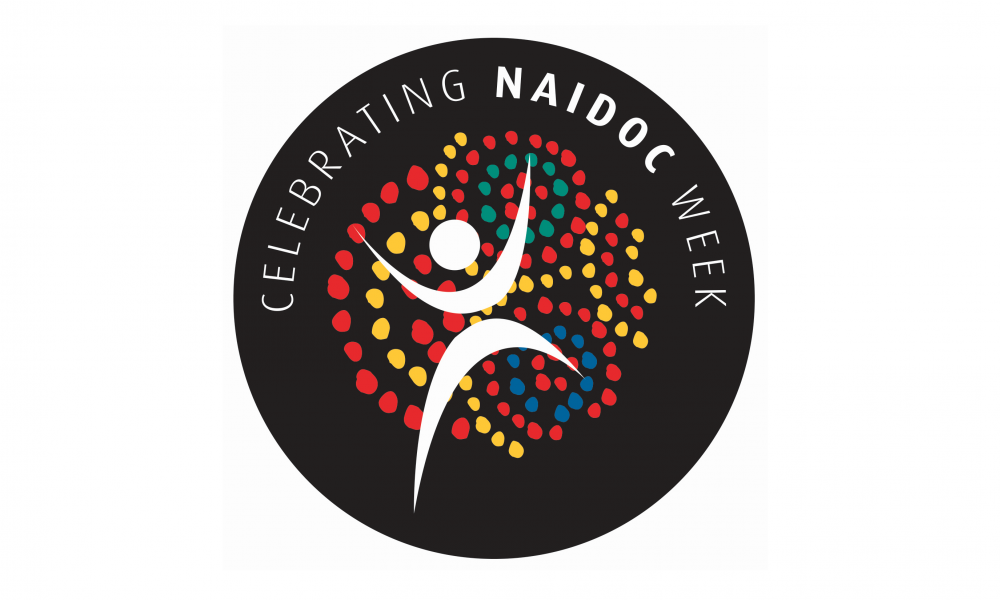
Reg Knox
Reginald Roy Knox, or Uncle Reg, was born in 1934 at Toomelah Aboriginal Mission. He has lived in Logan City for the past 40 years, winning admiration and respect over a long period for his outstanding artwork, contribution to the community and commitment to working with young people.
Uncle Reg’s artistic ability is recognised locally, nationally and internationally with many of his works being sold and shown in galleries here and overseas. Among his many art awards and honours, Uncle Reg was commissioned in 1986 to produce an artwork as a gift for Pope John Paul the Second on his Papal visit to Australia.
Through his art, Uncle Reg has been involved with many institutions including schools, disabled and respite centres, jails and museums. Reg has spent many years working with secondary school students at risk.
A quiet achiever, Uncle Reg has worked voluntarily for many years to assist many community organisations, building bridges between Indigenous and non-Indigenous Australians.
In 1998, Uncle Reg started his own business at the ripe age of 64.When most are thinking of retirement, Uncle Reg felt there was still so much to do and so retirement was not an option for him.
Uncle Reg is one of the few speakers of the Koomiloroi language. His dream is to find funding to record Koomiloroi so that the language is there for the generations to come. He feels that traditional language is an important part of cultural identity.
Uncle Reg’s philosophy is that we are all here together and we should try to put the problems of the past behind us. There is a great future ahead of us all.
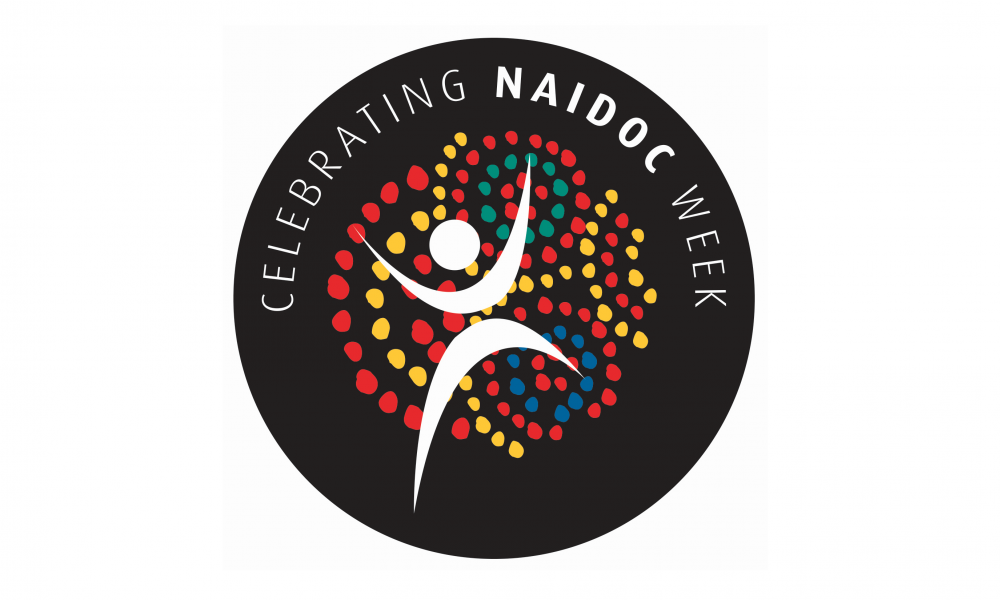
Larissa Behrendt
Lawyer and author Larissa Behrendt is a passionate and articulate advocate for the rights of Aboriginal and Torres Strait Islander people.
Larissa is Professor of Law and Director of Research at the Jumbunna Indigenous House of Learning at Sydney’s University of Technology.
Larissa’s academic achievements alone have made her stand out. After gaining a diploma in practical legal training and graduating from the University of New South Wales Law School in 1992, Larissa went on to graduate from Harvard Law School with a Master and then a Doctorate of Laws.
She is admitted to the NSW and ACT Supreme Courts and is a Judicial Member and Alternate Chair of the Serious Offenders Review Council and a Land Commissioner of the Land and Environment Court.
As well as practising law, Larissa also teaches the subject, finding time to mentor young Aboriginal law students. Her excellence was recognised in 2002 when Larissa was announced co-winner of the inaugural Neville Bonner National Teaching Award.
During the past decade, Larissa has provided a powerful insight on major Indigenous issues and government policies in Indigenous affairs.
She has written books and articles on property law, indigenous rights, dispute resolution and Aboriginal women’s issues. Larissa leads and edits various policy journals out of Jumbunna, and has a regular column in the National Indigenous Times newspaper.
Larissa’s first fiction novel, “Home”, received great reviews for helping people understand the complexity of life for Indigenous people in Australia. The novel won the 2002 David Unaipon Award, the 2005 Commonwealth Writer’s prize for south East Asia and the Pacific best novel award.
Larissa has recently been selected to chair a committee for the Australian Research Council.
Larissa is also the inaugural Chair of National Indigenous Television, Director of Bangarra Dance Theatre and Sydney Writers Festival as well as serving on the board of the Museum of Contemporary Art.
It’s a demanding schedule, but with her talent and drive, you can be sure that Larissa will continue to be at the forefront in the national discussion of Indigenous issues and policies.
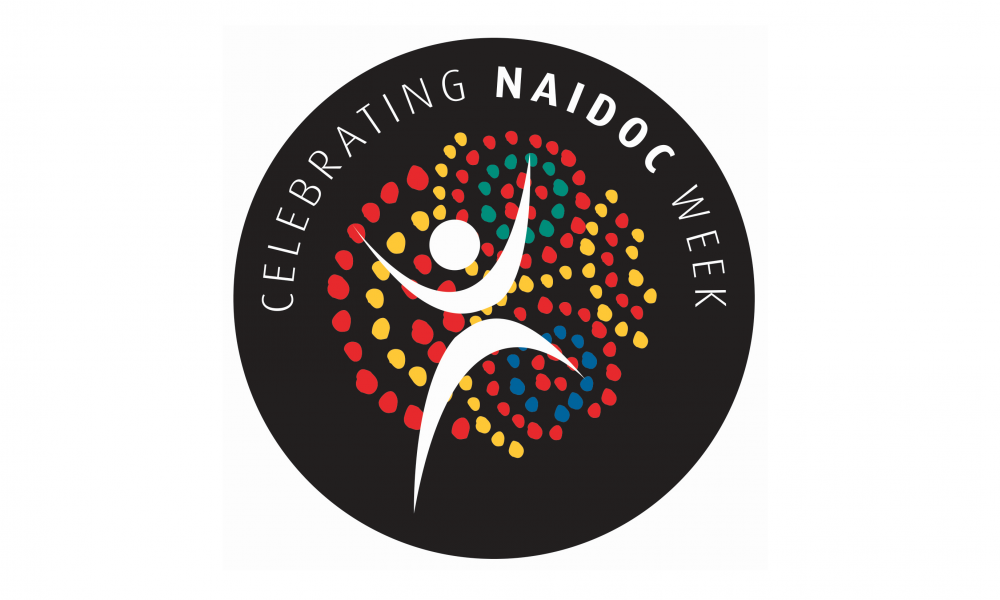
Dr Chelsea Bond
Dr Chelsea Bond is an Aboriginal and South Sea Islander Australian and a descendant of the Munanjahli people of Beaudesert. Born and raised in Brisbane, Chelsea has forged a career in Indigenous health over the past decade working in both the government and university sectors across south-east Queensland.
Chelsea has always been determined to forge her own path. Chelsea first graduated from the University of Queensland with a Bachelor of Applied Health Science in 1998, aged only 19. She went on to graduate with First Class Honours in 2001 for her thesis examining the impact of racism and social exclusion on health outcomes in a rural Aboriginal community.
In 2007, Chelsea was awarded a Doctorate of Philosophy, with a thesis examining the construction of Aboriginality within the public health sector. Her research focused on highlighting the cultural strengths of the community she calls home – Inala.
Her thesis was rated among the top 10 per cent at the University of Queensland in her year.
Over the years Chelsea has won numerous scholarships and awards and has had her work published in many key health and medical research journals.
Chelsea has dedicated a lot of time to voluntary work. She established and continues to manage an Indigenous Community Development association in Inala, providing a range of sporting, cultural and training opportunities.
Chelsea is currently pursuing a post-doctoral fellowship to evaluate the public health benefit of a major community cultural development program including an Indigenous hip hop festival. In the future she hopes to work in Indigenous affairs to continue building upon the strengths of the community sector.
Chelsea believes that her success is not measured by personal achievements and recognition but by the achievements of those around her.
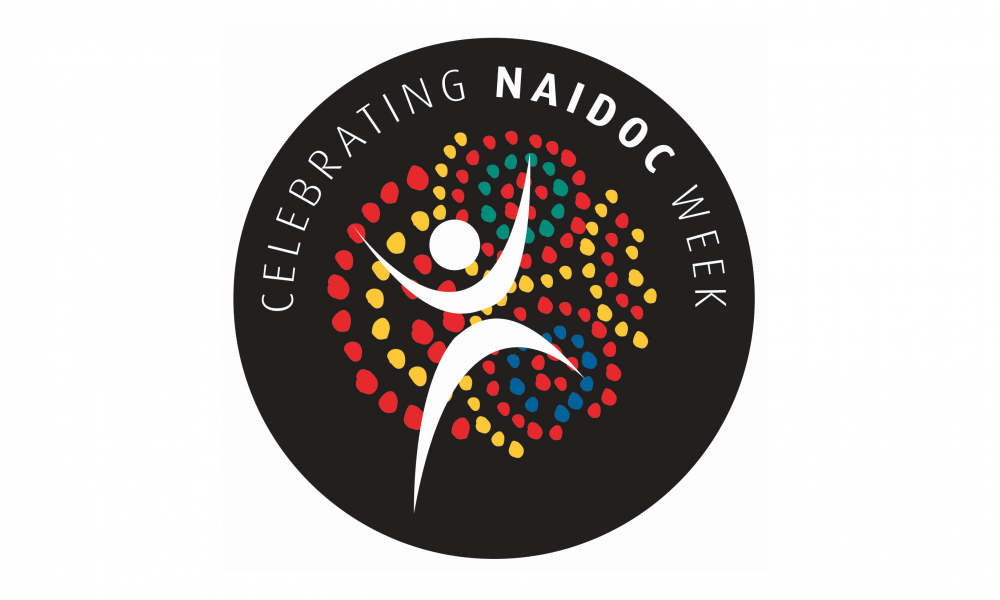
Andrew McLeod
Born and raised in Darwin, Andrew McLeod must rank as one of the greatest ever Indigenous AFL players.
Andrew was drafted by the Fremantle Dockers in 1994. He was traded to the Adelaide Crows in 1995, a decision the Dockers would come to regret big time.
He has thrilled fans with artistry and dash in over 300 AFL games and has played more games than any other Indigenous player. In May 2009 Andrew claimed the all time appearance record for the Adelaide Crows. At 33 he is still going strong.
Andrew was named in the Indigenous Team of the Century and has captained the Indigenous All Stars on three occasions. He has been chosen in the All Australian side five times, including as captain in 2007.
Andrew is a dual premiership player and is the only player to have won consecutive Norm Smith medals for best player on ground in the Adelaide Crow’s Grand Final wins of 1997 and 1998.
He is a champion off the field as well. Passionate about helping the community, and in particular working with kids, Andrew has a “never say no” attitude to the vast number of requests he receives.
Of the countless stories of Andrew’s work in the community, one stands out.
In 2007 Andrew received a letter from an Aboriginal foster boy who had stopped playing football after he experienced racist bullying. Moved by his story, Andrew organised for him to attend an AFL match with his family and meet the boy in person. To this day, they are still in contact.
Andrew’s volunteer work was recognised in 2007 when he won the Variety Heart of Football for his outstanding commitment to children.
Andrew McLeod – a legend on and off the field.

Gemma Benn
Gemma Benn is an inspirational young leader who, through her actions, is showcasing the very best of her generation and what they can offer to the community.
Gemma completed a Bachelor of Arts at Melbourne University and went on to complete a graduate traineeship with the Northern Territory Government. Today, Gemma works in youth policy development within the NT Government
Elected by her peers, Gemma served a 12 month term as deputy chair for the Northern Territory Youth Ministers Round Table of Young Territorians in 2008.
The position gives Gemma another direct avenue to the Northern Territory Government and the opportunity to represent her community in decisions and outcomes that will affect them.
Humble and gracious, Gemma would see herself not as a leader, but simply as ‘doing what she can’. But Gemma is most definitely a leader, a quality that was recognised when Gemma was selected as a delegate at the Prime Minister’s 2020 Youth Summit in 2008.
Gemma’s goal for the future revolves around helping to create an Australia where young people feel valued and cherished with every opportunity to make a contribution to society.
Gemma sees past the divides that exist in society, and instead sees people – people with talents, abilities and visions.
